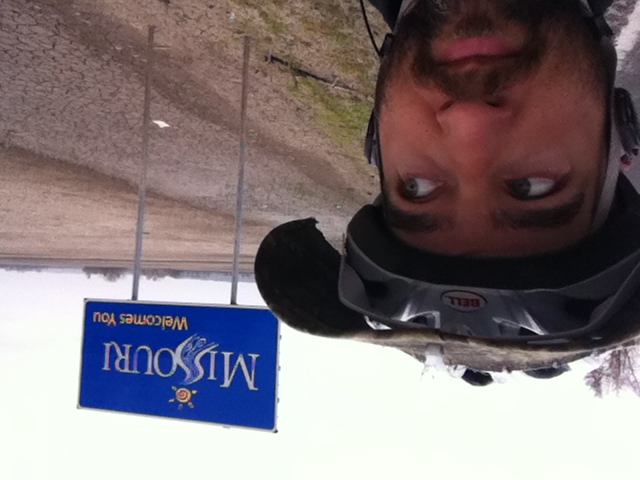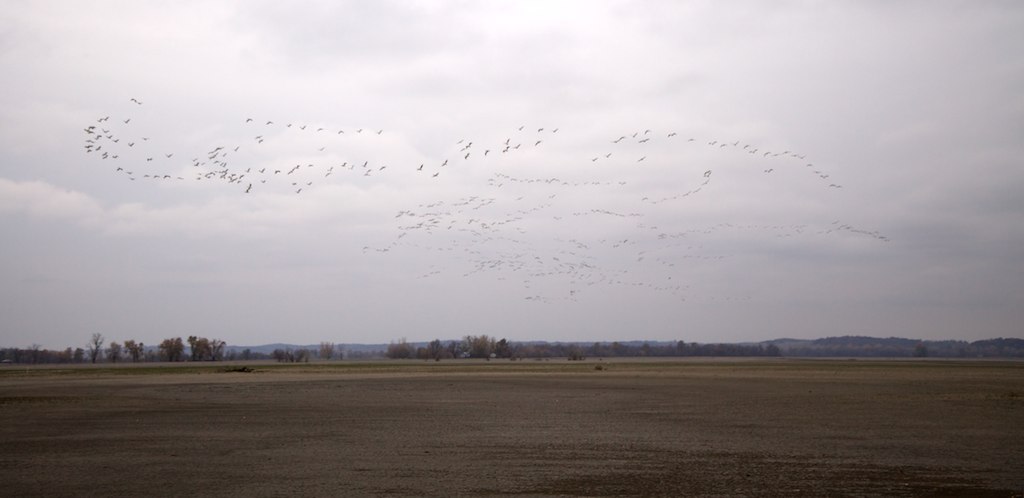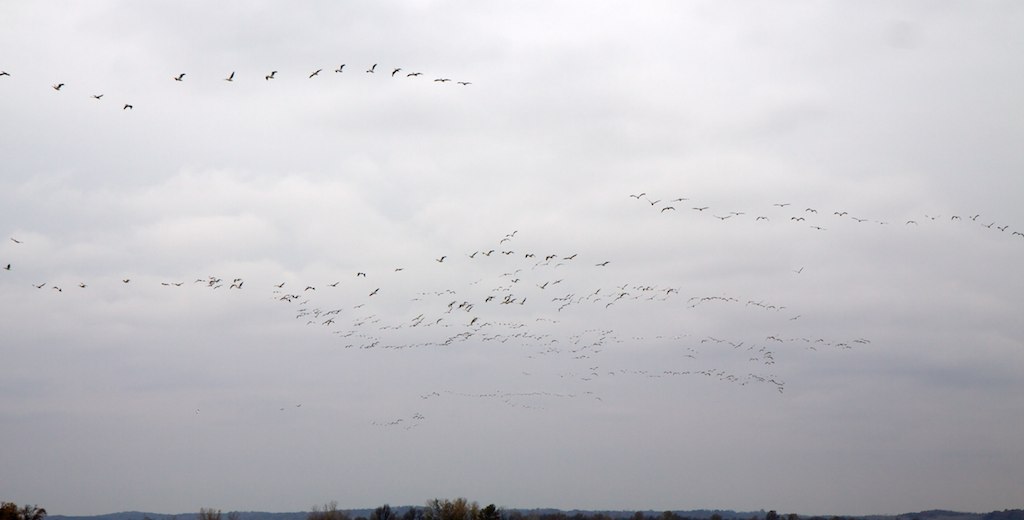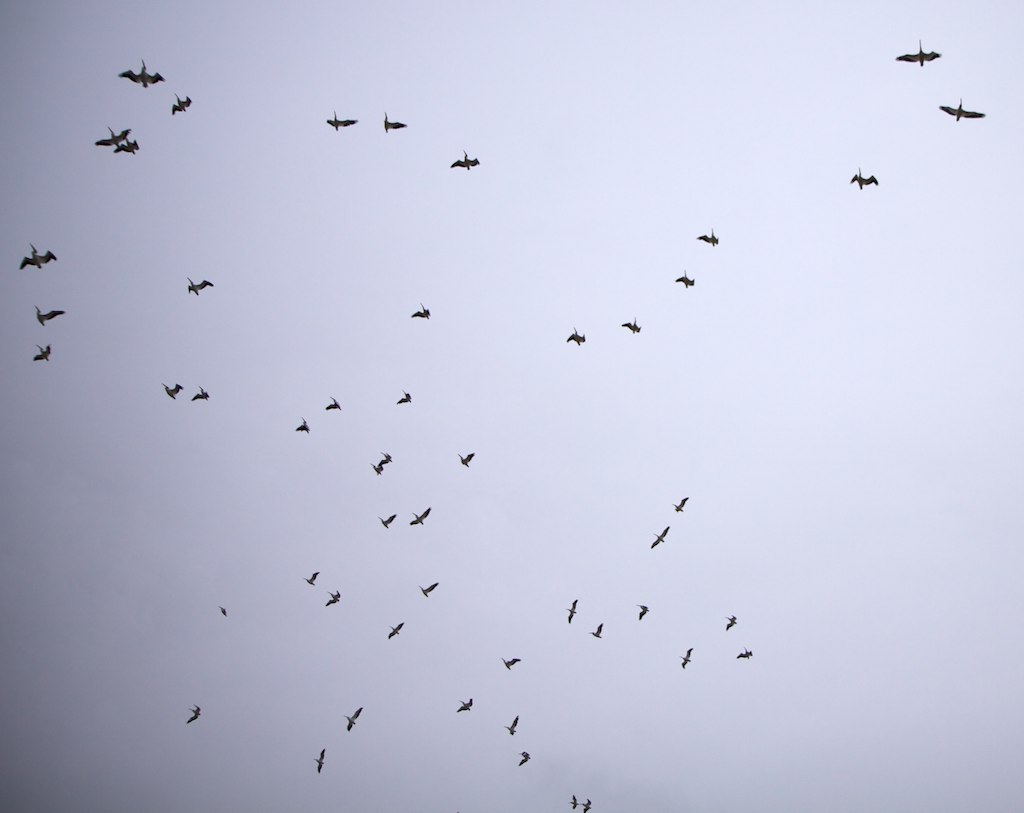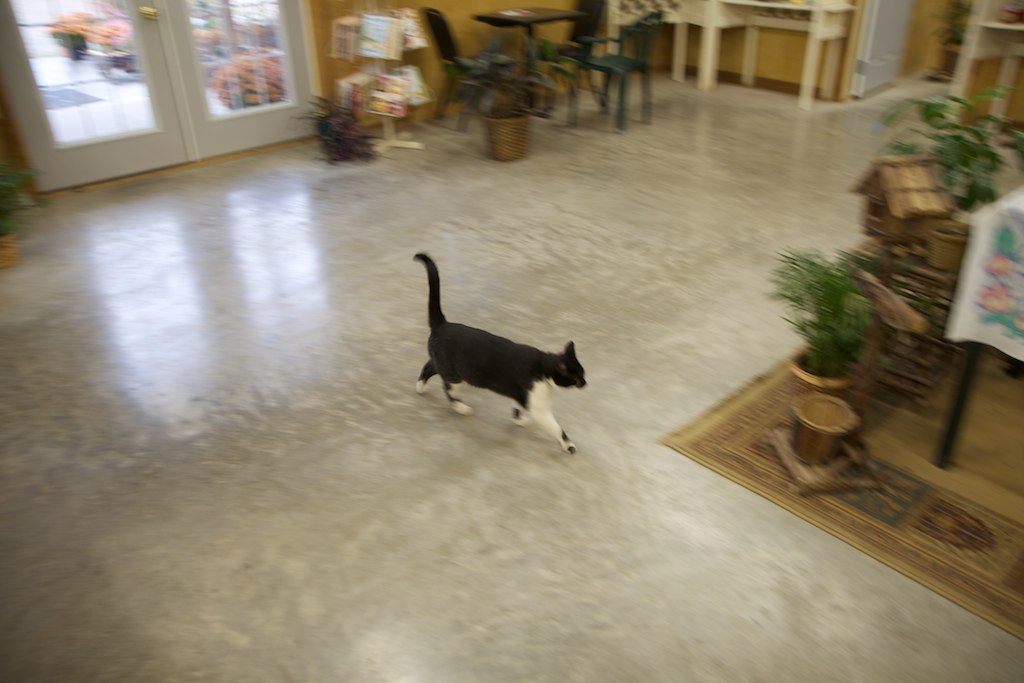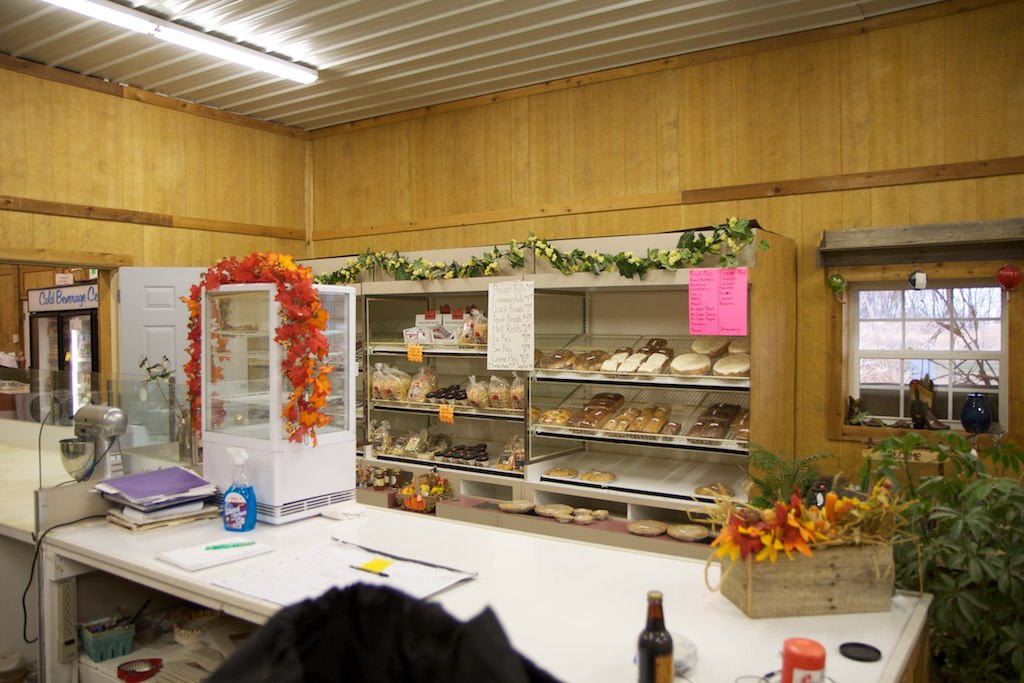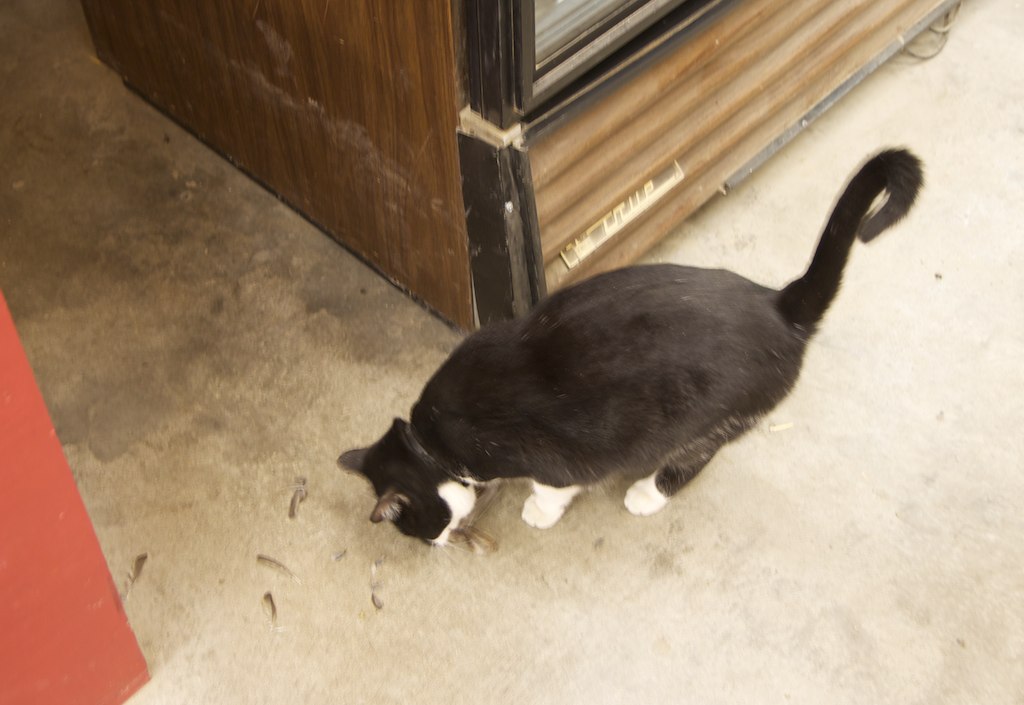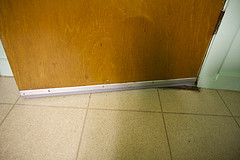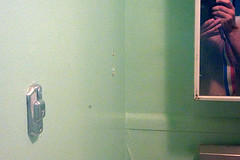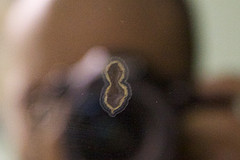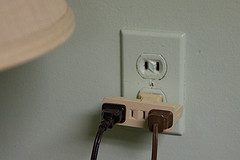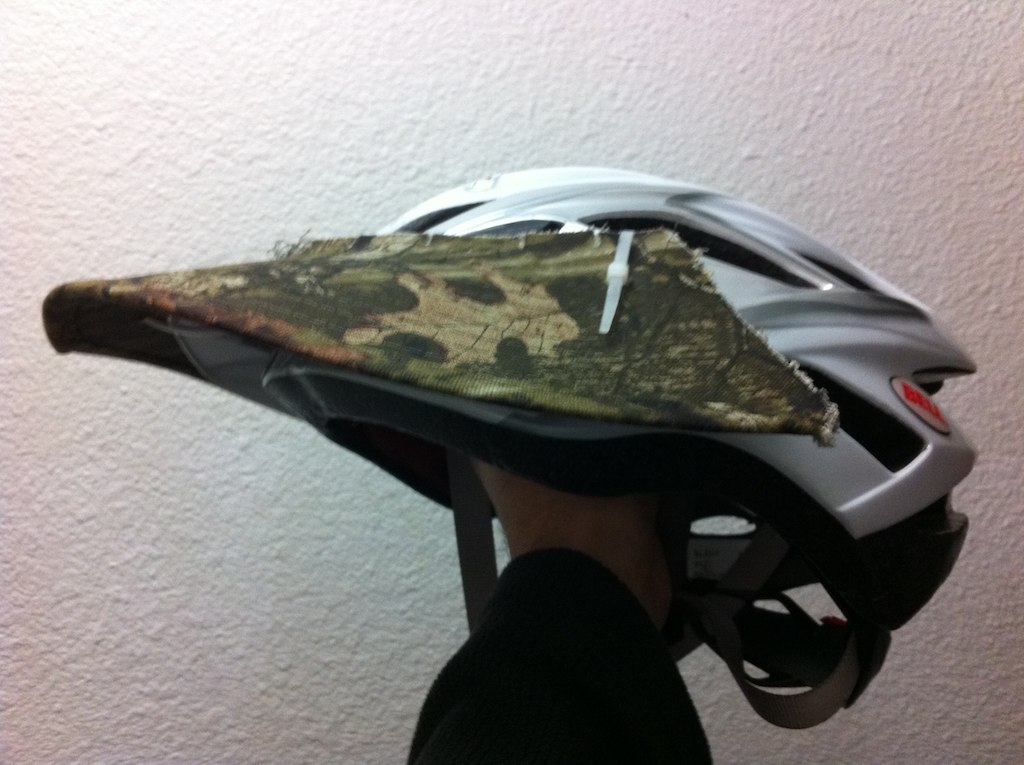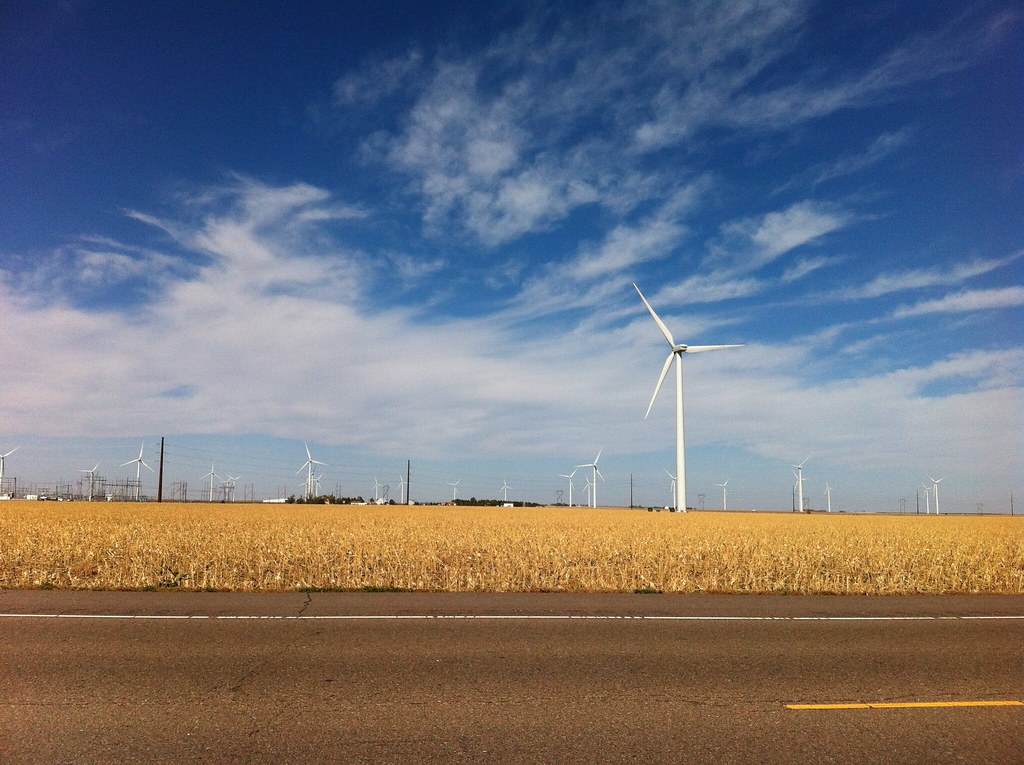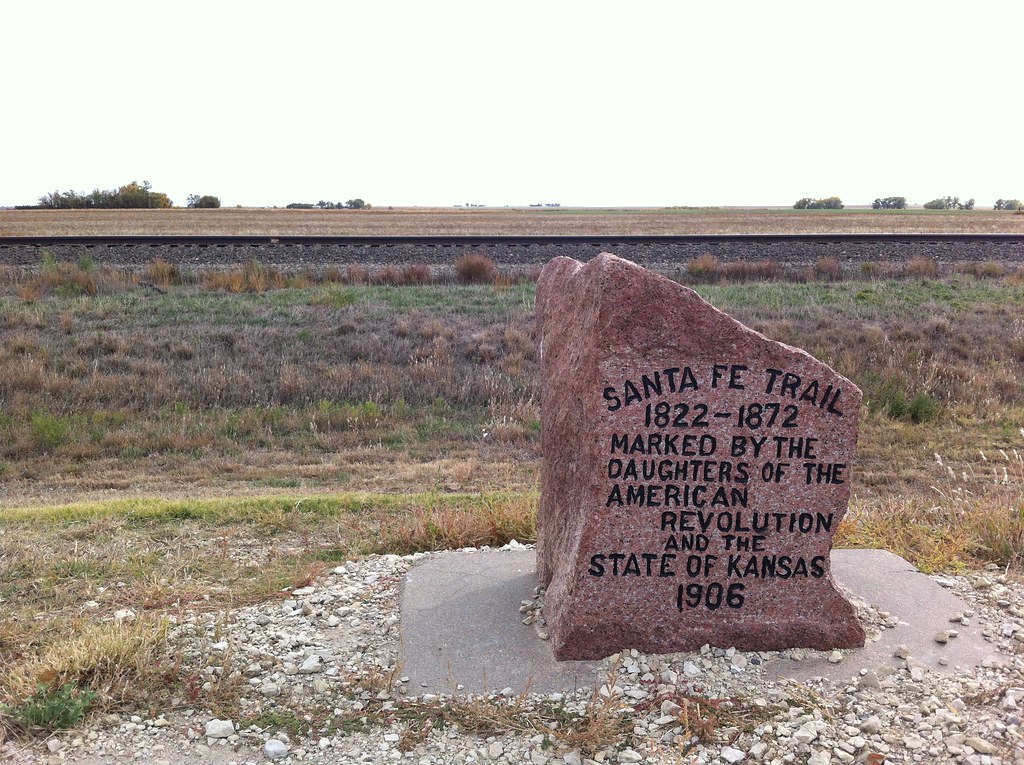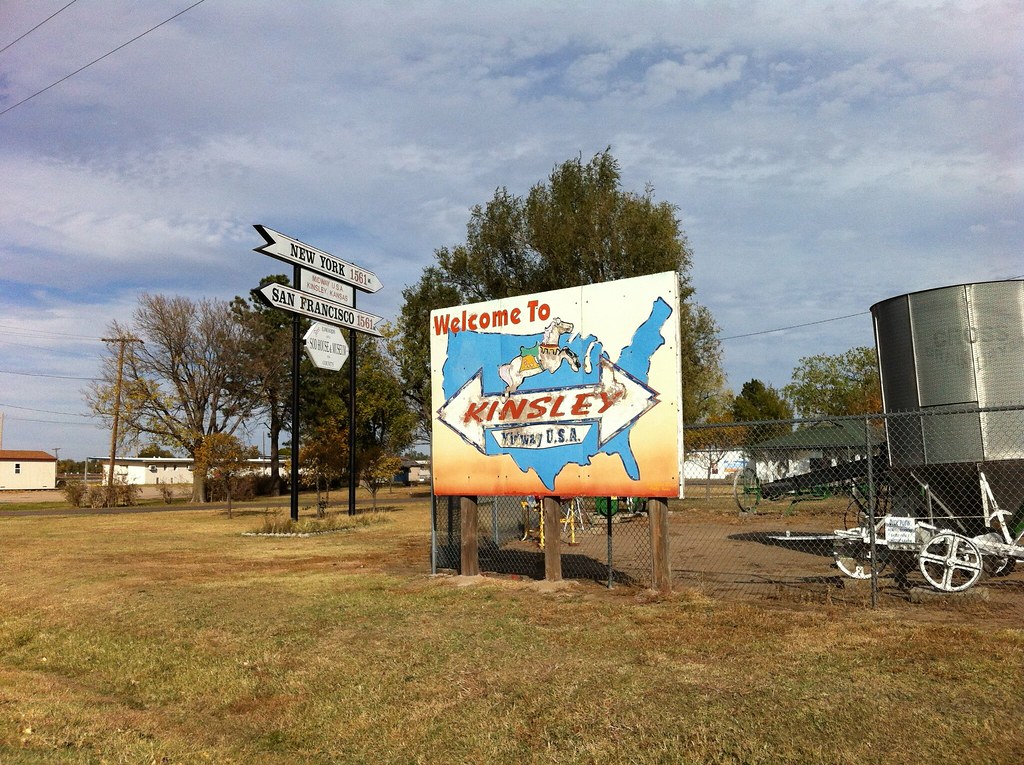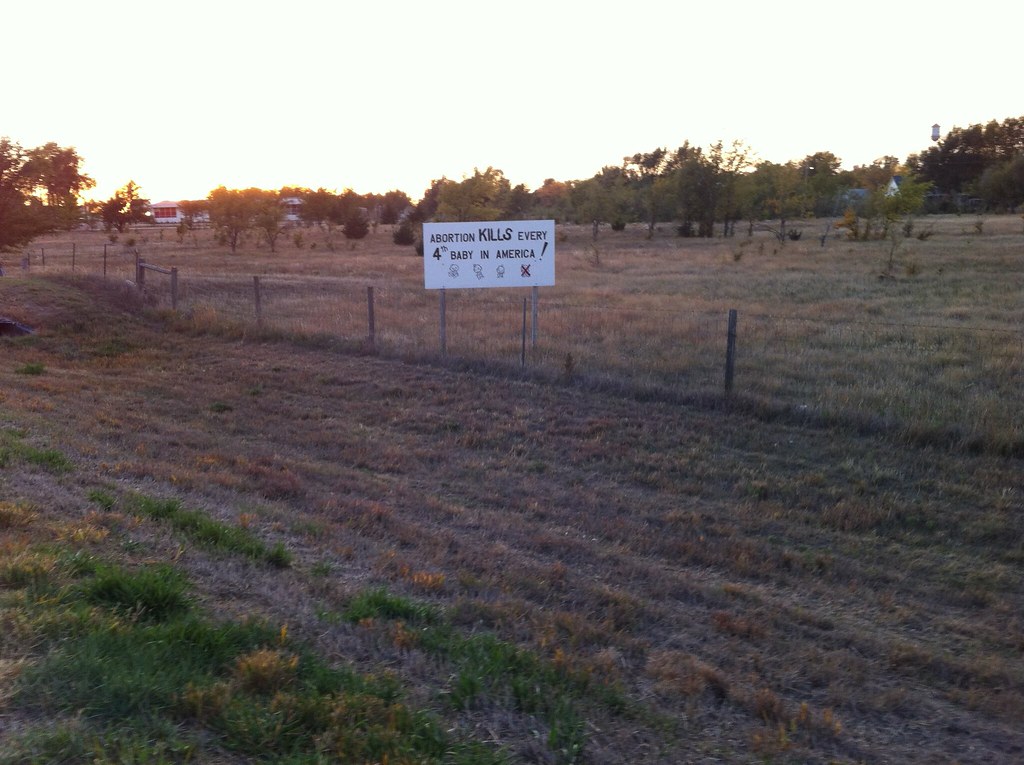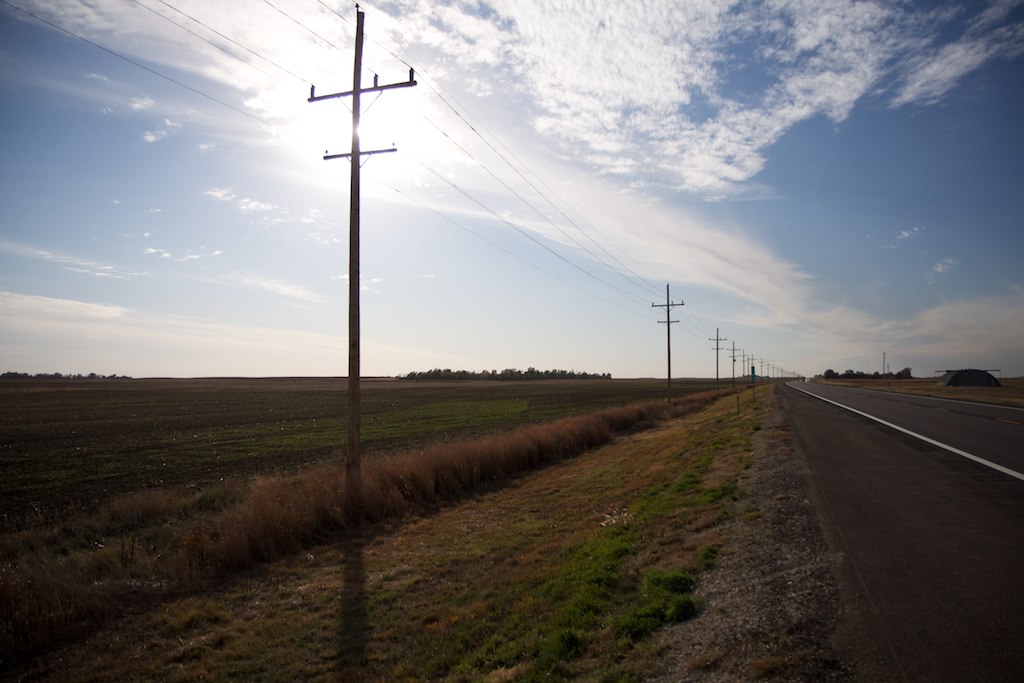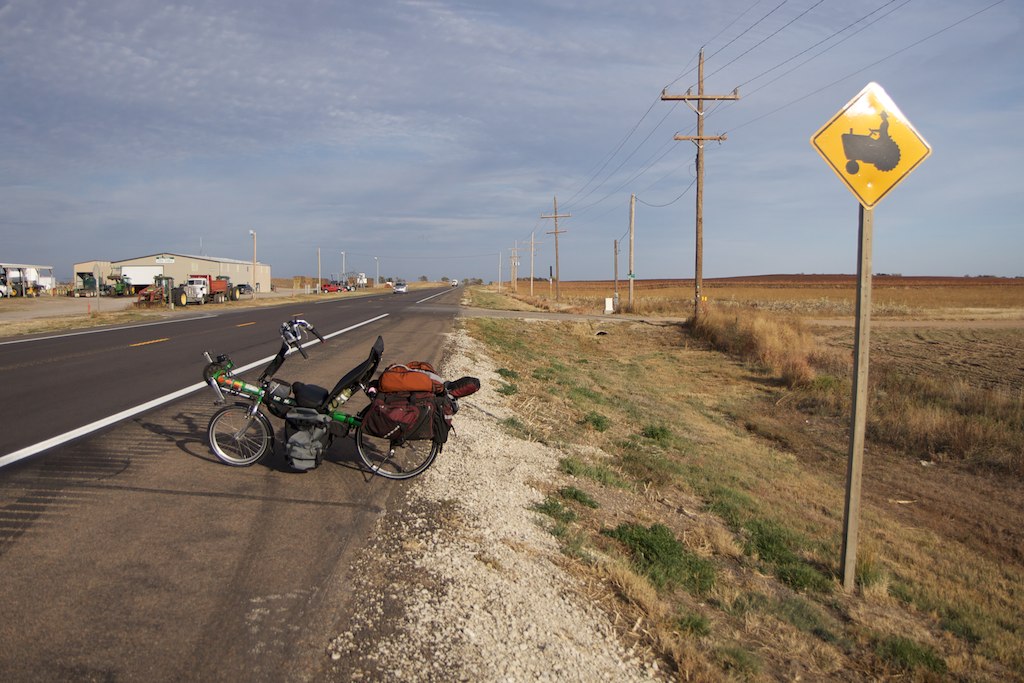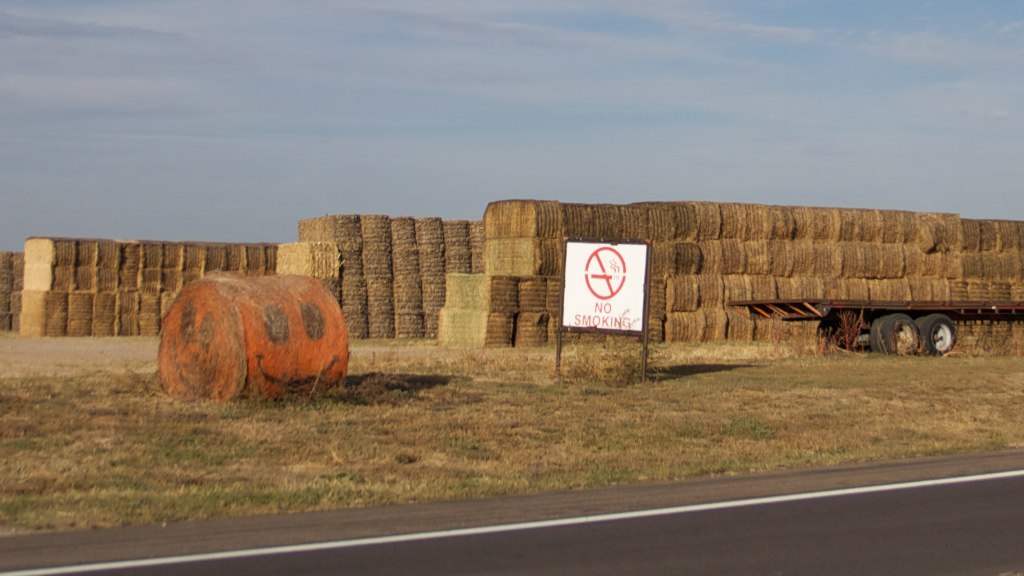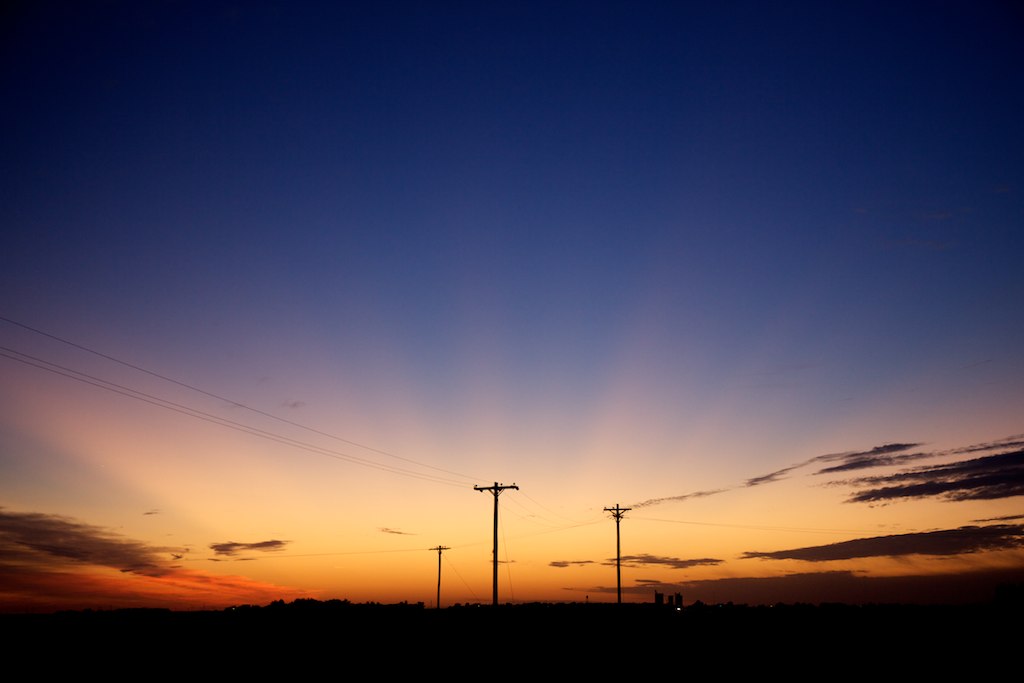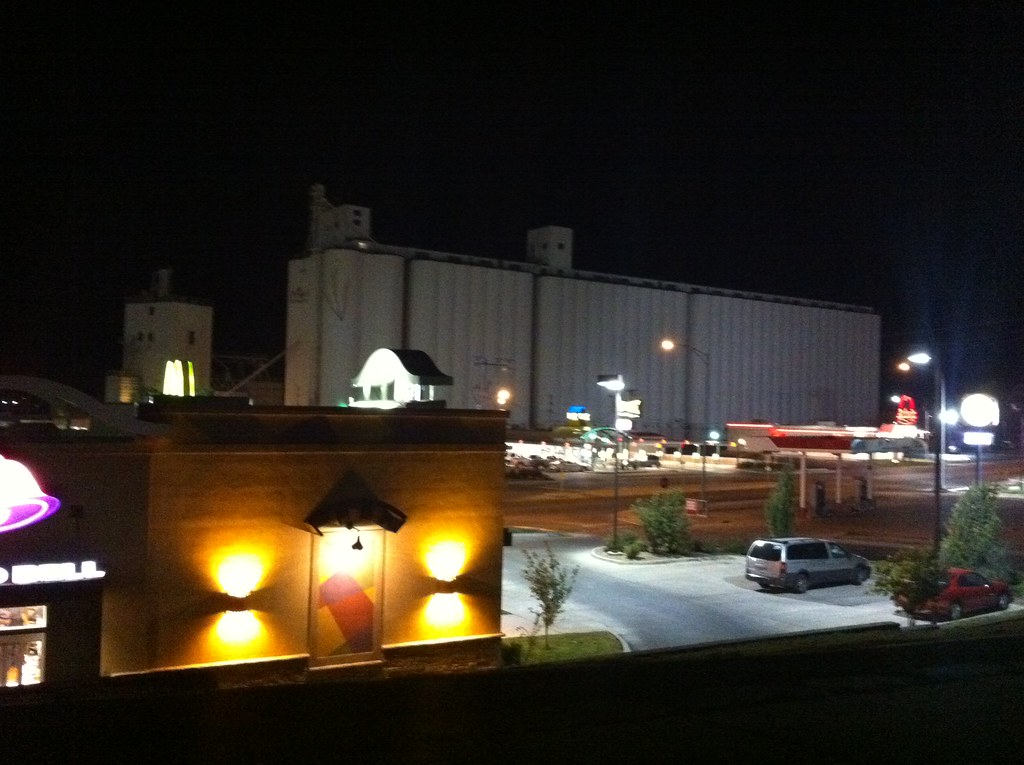Instead, she began asking me all kinds of excited questions about where I was riding from, what my bicycle was called, what the weather had been like, why I had chosen to cross Kansas, et cetera. I was caught off guard. I was also in the middle of an operation on my helmet, and anxious to get on the road, and having trouble hearing the woman over the blast of the cooling fans perched in the outer wall of the lobby. I could tell she was a nice person, and I usually welcomed questions from strangers, but the environment and the timing were all wrong. I was probably rather cold to her.
Eventually she ran out of questions, and held out her hand for a handshake. I shook it, finding it soaked with sweat, and suppressed the urge to wipe my palm on my pants as she stood there. That would have really embarrassed her. Then she waved goodbye and went back inside.
I threw away the scraps from the hat and the ziptie pieces, and briefly considered going back inside to apologize for being so standoffish, but … what would have been the point?
I did have one interesting take-away thought from it, though. Gladwell postulates a “10,000 hour rule”, claiming that to achieve mastery in any field of study, one must practice at least ten thousand hours at it. He also emphasizes the importance of an early start when practicing. During my own childhood, I easily put in at least 10,000 hours learning how to make my Apple ][ computer do tricks, which eventually snowballed into a career. But the thing about computer programming, unlike, say, Malcolm’s examples of Canadian hockey or playing the violin, is that it’s an endlessly expanding field of study. There has been constant, relentless innovation in the computer industry for 40 years, and the fine details of a language or a machine design that were relevant one decade can – and do – become totally irrelevant in the next decade. Ten thousand hours of practice in this industry doesn’t get you a foot in the door so much as a spot on the treadmill.
So for me, and for everyone else in my profession, it’s a process of working a continuous stream of hours, to adapt our “mastery” into a more relevant form. This makes me wonder: Since five years at Apple is at least 10,000 hours, what exactly have I now achieved “mastery” in? Build engineering? Test system design? Database or web programming? What kind of label could I apply to myself? I suspect that the right label doesn’t exist.
We talked for a while about my bike trip, and about the weather. “Okay,” he said, “I was just making sure you didn’t need any help. I’ll leave you be.”
“Thanks for stopping to check,” I said, “I appreciate it. You did the right thing.”
As the rows passed closer I observed that they were at right-angles to the road. Eventually I rolled to a stop, confused, because I could see both rows of blue lights, one ahead of me and one behind, extending directly away to the north, as though they were outlining the edges of a road. But if this was a road, shouldn’t I be in the middle of an intersection? I looked down, and saw that the curb continued without interruption. What was going on?
Later on I discussed the find with Erika and she explained that the blue lights I was staring at were a taxiway, not a runway.
I’m on highway 50, heading east, being buffeted by a freezing 30mph crosswind. It’s late at night and I’m trying to make Hutchison because the motel in Kinsley was closed and St John is 5 miles north straight into the wind. The stars are out above me, but I can see the glow of Hutchison in the far distance, reflected on a layer of clouds.
I keep riding, and riding, and riding. I spot field mice running along the embankment of the road. The temperature drops from 60 to 55 to 50, and the highway traffic gets lighter and lighter until it’s just me. I’m staring down the highway, listening to my audiobook, plugging along at about 7mph in the irregular wind, and suddenly I see three massive forks of lightning crash down out of the sky, 15 miles ahead of me.
They light up the horizon, and for an instant I see a big round hole in the clouds, where they all came from. Then the clouds shimmer with thunder, and I see cross-lightning, arcing down out of the hole and into the opposite cloudbank. WHAM! Then lightning starts smacking into the ground, 10 miles to the north, and 10 miles to the south, and ahead of me. Every five seconds, and WHAM, more lightning.
The wind picks up, and begins flicking raindrops into my face. Not enough to make a rainstorm, but enough to make me blink. The lightning and thunder continue. For the next four hours I push the bike, getting colder, and colder. My face goes numb. My feet go numb. Hunger forces me to stop and eat my remaining chocolate and peanuts and drink water, sitting with my back against the side of the bike as an inefficient windbreak. I look up and see that the clouds have now obscured all the stars. I worry about being struck by lightning. After 17 hours, my GPS runs out of power and quits.
The road changes and I am forced to turn northeast, directly into the headwind. Gusts of freezing air punch right through my sweater as though it were made of fishing net. My pace slows to 5 miles per hour. I begin yelling at the weather. “Think you can stop me? No way! Nnnnoooo… Wwwwaaay!! GRRRRRR!!!!“
Eventually I struggle my way into town and stop at the first restaurant I see – a McDonalds. There I devour two egg sandwiches, barely tasting them, and then ride north straight into the wind for another mile to the motel. By the time I crash into my sleeping bag on top of the bed, it is 6:00am the next day.
Erika says: “Here, in honor of your night out, a snippet of poetry. This is from Hafiz, another Sufi mystic poet, like Rumi.”
{ "lat":[37.754421,37.754421,37.754333,37.754322,37.754295,37.754196,37.754086,37.754066,37.754051,37.754017,37.754002,37.753986,37.753952,37.753918,37.753819,37.753796,37.753761,37.753704,37.753693,37.753693,37.753696,37.753681,37.75367,37.753677,37.753677,37.753685,37.753708,37.753761,37.753849,37.753952,37.754005,37.754055,37.754143,37.754223,37.754272,37.754318,37.754353,37.754387,37.754536,37.754574,37.754612,37.75465,37.754684,37.754921,37.754963,37.755001,37.755032,37.755058,37.755219,37.755245,37.755276,37.755306,37.755333,37.75552,37.755615,37.75565,37.75568,37.755711,37.755741,37.755947,37.755978,37.756012,37.756042,37.756073,37.756214,37.756336,37.7565,37.756668,37.756817,37.756973,37.757164,37.75721,37.757252,37.757298,37.757339,37.757729,37.757751,37.757927,37.757969,37.758007,37.758049,37.758091,37.758358,37.758564,37.758968,37.759338,37.759712,37.759975,37.760376,37.760677,37.761112,37.761158,37.761204,37.76125,37.761295,37.761341,37.761688,37.761986,37.762062,37.762112,37.762161,37.762207,37.762257,37.762619,37.763031,37.763271,37.763321,37.763371,37.76342,37.763466,37.76395,37.764233,37.76445,37.764858,37.765057,37.765411,37.765438,37.765442,37.765579,37.765789,37.766197,37.76656,37.766899,37.767075,37.767151,37.767231,37.767315,37.767399,37.767483,37.767567,37.767765,37.768066,37.768108,37.768219,37.768223,37.768227,37.768223,37.768227,37.768242,37.768265,37.768269,37.768253,37.76825,37.76825,37.768265,37.768288,37.768433,37.768463,37.768471,37.768559,37.7686,37.768684,37.768738,37.768745,37.768757,37.768776,37.768787,37.768806,37.768936,37.76897,37.768974,37.769001,37.769024,37.768986,37.768967,37.768887,37.768871,37.768829,37.76902,37.768799,37.768864,37.76886,37.768845,37.768871,37.768875,37.780071,37.780071,37.780067,37.780067,37.780067,37.780067,37.780067,37.780067,37.780067,37.780064,37.780067,37.780071,37.780071,37.780064,37.780064,37.78006,37.780052,37.780045,37.780037,37.780037,37.780033,37.780033,37.780033,37.780033,37.780037,37.780041,37.780022,37.779987,37.779968,37.779972,37.779961,37.779961,37.779953,37.779922,37.779953,37.779953,37.779968,37.779968,37.779972,37.779968,37.779968,37.77998,37.779987,37.779991,37.779991,37.779987,37.779987,37.779987,37.779984,37.779968,37.779976,37.779964,37.779968,37.779953,37.779957,37.779938,37.779938,37.779922,37.779926,37.779926,37.779926,37.779926,37.77993,37.779926,37.779934,37.77993,37.779922,37.779919,37.779915,37.779915,37.779911,37.779907,37.779907,37.779907,37.779896,37.779892,37.779892,37.779888,37.779884,37.779881,37.779881,37.779884,37.779888,37.779884,37.779884,37.779873,37.779869,37.779873,37.779869,37.779861,37.779861,37.779846,37.77985,37.779839,37.779835,37.779827,37.779823,37.779823,37.779827,37.779827,37.779827,37.779819,37.779804,37.779812,37.779812,37.779808,37.779804,37.779804,37.779808,37.779812,37.779816,37.779819,37.779823,37.779831,37.779827,37.779827,37.779823,37.779819,37.779827,37.779816,37.779808,37.779816,37.779816,37.779819,37.779819,37.779816,37.779808,37.7798,37.779808,37.779804,37.779797,37.779797,37.7798,37.7798,37.779797,37.779797,37.779797,37.779793,37.779797,37.779789,37.779793,37.779793,37.779781,37.779778,37.779774,37.77977,37.77977,37.779774,37.779774,37.77977,37.779755,37.779747,37.779743,37.779739,37.779739,37.779739,37.779736,37.779736,37.77972,37.779709,37.779701,37.779694,37.779686,37.779671,37.779659,37.779655,37.77964,37.779617,37.779606,37.779602,37.779602,37.779594,37.779583,37.779583,37.779591,37.779587,37.779583,37.779575,37.779579,37.779579,37.779583,37.779583,37.779568,37.77956,37.779549,37.779545,37.779549,37.779545,37.779537,37.779533,37.779522,37.779522,37.779507,37.779507,37.779491,37.779488,37.779476,37.779465,37.779453,37.779446,37.779434,37.779423,37.779411,37.779404,37.779408,37.779392,37.779385,37.779385,37.779373,37.779366,37.779354,37.779358,37.779354,37.779354,37.779358,37.779358,37.779346,37.779343,37.779339,37.779339,37.779343,37.779343,37.779343,37.779354,37.779346,37.779343,37.779339,37.779335,37.779335,37.779327,37.779327,37.779327,37.779327,37.779327,37.779324,37.779312,37.779316,37.779316,37.779316,37.779312,37.779312,37.779301,37.779305,37.779301,37.779297,37.779289,37.779289,37.779293,37.779293,37.779289,37.779285,37.779285,37.779278,37.779278,37.779274,37.77927,37.779266,37.77927,37.77927,37.77927,37.779263,37.779255,37.779255,37.779251,37.779247,37.779247,37.779247,37.779247,37.779243,37.779236,37.779232,37.779236,37.779236,37.779228,37.779224,37.779224,37.779209,37.779202,37.779171,37.77916,37.779152,37.779156,37.77916,37.779148,37.779137,37.779148,37.779163,37.779167,37.779171,37.779171,37.779171,37.779167,37.77916,37.779152,37.779152,37.779156,37.779114,37.779102,37.77911,37.779125,37.779114,37.77911,37.779114,37.779129,37.779133,37.779137,37.779129,37.779129,37.779125,37.779118,37.779114,37.779114,37.77911,37.77911,37.77911,37.779114,37.779114,37.779114,37.77911,37.77911,37.77911,37.77911,37.77911,37.77911,37.77911,37.779102,37.779083,37.779079,37.779079,37.779076,37.779076,37.779076,37.779072,37.779076,37.779079,37.779076,37.779072,37.779064,37.779064,37.77906,37.77906,37.779064,37.779053,37.779053,37.779049,37.779045,37.779045,37.779045,37.779041,37.779034,37.77903,37.77903,37.779026,37.77903,37.779034,37.779034,37.77903,37.779026,37.779026,37.779026,37.779026,37.779022,37.779022,37.779022,37.779018,37.779003,37.779003,37.779003,37.778999,37.778996,37.778992,37.778992,37.778988,37.778996,37.778996,37.778996,37.778996,37.778992,37.778988,37.77898,37.77898,37.77898,37.77898,37.77898,37.778976,37.778976,37.778973,37.778965,37.778965,37.778961,37.778961,37.778957,37.778961,37.778954,37.778946,37.778942,37.778934,37.778942,37.778934,37.778923,37.778919,37.778923,37.778915,37.778904,37.778889,37.778881,37.778885,37.778889,37.778881,37.778893,37.778893,37.778893,37.778889,37.778889,37.778885,37.778885,37.778885,37.778885,37.778881,37.778881,37.778881,37.778881,37.778881,37.778873,37.778873,37.778885,37.778896,37.778931,37.778992,37.779076,37.779152,37.779278,37.779373,37.779472,37.779613,37.779747,37.7799,37.780045,37.780064,37.780106,37.780148,37.780186,37.780224,37.780361,37.780529,37.780666,37.780769,37.780869,37.780979,37.781078,37.781193,37.781296,37.781406,37.781494,37.781574,37.781666,37.781765,37.781868,37.781986,37.782059,37.782185,37.782288,37.782402,37.782467,37.782574,37.782642,37.782768,37.782871,37.782982,37.783085,37.783215,37.783337,37.783432,37.783546,37.783588,37.783627,37.783672,37.78371,37.783752,37.783886,37.784031,37.784168,37.784294,37.78442,37.784641,37.784798,37.784935,37.785076,37.785213,37.78537,37.785496,37.785637,37.785751,37.785847,37.785988,37.786121,37.786228,37.78635,37.786495,37.786663,37.786789,37.786922,37.787056,37.787197,37.787319,37.787449,37.787529,37.787674,37.787815,37.787952,37.788113,37.788254,37.788372,37.788517,37.788651,37.788757,37.788933,37.789097,37.789204,37.789387,37.78957,37.7897,37.789818,37.789978,37.790119,37.790253,37.790417,37.790531,37.790672,37.790836,37.790951,37.791183,37.791328,37.791363,37.791405,37.791443,37.791481,37.791519,37.791645,37.791775,37.791901,37.792019,37.792042,37.792057,37.792095,37.79213,37.792171,37.792309,37.792431,37.792465,37.792496,37.79253,37.792568,37.792606,37.792641,37.792694,37.792732,37.79277,37.792809,37.792843,37.792934,37.793087,37.793213,37.7934,37.793495,37.793617,37.793747,37.793839,37.793865,37.793896,37.793926,37.793957,37.794083,37.794224,37.794373,37.794514,37.794586,37.794624,37.794655,37.794689,37.79472,37.794807,37.79488,37.794983,37.795097,37.795155,37.795288,37.795368,37.79546,37.795483,37.79549,37.795502,37.795509,37.795521,37.795528,37.795517,37.795517,37.795517,37.795517,37.795517,37.795517,37.795517,37.795517,37.795517,37.795517,37.795517,37.795517,37.795517,37.795517,37.795517,37.795517,37.795517,37.795517,37.795517,37.795517,37.79554,37.795597,37.795609,37.795609,37.795609,37.795609,37.795609,37.795609,37.795609,37.795609,37.795609,37.795609,37.795628,37.795692,37.795788,37.795891,37.79599,37.796124,37.796307,37.796326,37.79636,37.796394,37.796425,37.796459,37.796593,37.796829,37.797039,37.79718,37.797359,37.797501,37.797653,37.797813,37.797955,37.798138,37.798264,37.798382,37.798515,37.798656,37.798771,37.798927,37.79911,37.799225,37.799316,37.799458,37.799572,37.799694,37.799725,37.799759,37.799786,37.799812,37.799843,37.79998,37.800148,37.800274,37.800407,37.800571,37.800709,37.800873,37.801003,37.801121,37.801258,37.801384,37.801491,37.801632,37.801773,37.801918,37.80212,37.802151,37.802311,37.80249,37.802628,37.802818,37.802959,37.803059,37.803253,37.803276,37.803314,37.803352,37.803387,37.803425,37.803513,37.803703,37.803871,37.803917,37.803959,37.804001,37.804043,37.804218,37.804474,37.804668,37.804886,37.805126,37.805168,37.80521,37.805252,37.805294,37.8055,37.805542,37.805588,37.805634,37.805676,37.805935,37.806087,37.806328,37.806503,37.806675,37.806816,37.80698,37.807076,37.807255,37.807404,37.807423,37.807514,37.807529,37.807682,37.807819,37.808006,37.808151,37.808342,37.808498,37.808643,37.808807,37.808956,37.809132,37.809288,37.809422,37.80946,37.809505,37.809551,37.809589,37.809612,37.80965,37.809692,37.809734,37.80978,37.809822,37.809864,37.809906,37.80994,37.809978,37.810139,37.810291,37.81039,37.810509,37.810631,37.810757,37.810883,37.81102,37.811218,37.811409,37.811581,37.811756,37.811913,37.812092,37.812229,37.812401,37.812546,37.812702,37.812817,37.812939,37.813099,37.813248,37.813465,37.813683,37.813919,37.814083,37.814117,37.814152,37.814186,37.814217,37.814384,37.814598,37.81477,37.814842,37.814877,37.814911,37.814941,37.814976,37.81509,37.815201,37.815327,37.815487,37.815643,37.81583,37.815948,37.816128,37.816269,37.816471,37.816666,37.816818,37.81691,37.816944,37.816978,37.817013,37.817047,37.817074,37.817108,37.817142,37.817173,37.817341,37.817471,37.817646,37.817799,37.818039,37.818245,37.818462,37.818645,37.818787,37.818844,37.818878,37.818916,37.818954,37.818993,37.81921,37.819347,37.819584,37.819683,37.819717,37.819748,37.819778,37.819809,37.819923,37.820091,37.820229,37.820328,37.820446,37.820564,37.820755,37.820972,37.821095,37.82127,37.821396,37.821499,37.821609,37.82172,37.82185,37.822044,37.822235,37.82238,37.822521,37.822628,37.822662,37.822697,37.822731,37.822769,37.822933,37.82312,37.823265,37.82346,37.823612,37.823788,37.823944,37.824047,37.824162,37.824314,37.82449,37.824619,37.824738,37.824883,37.825031,37.825199,37.825298,37.825439,37.825626,37.825775,37.825924,37.826103,37.826229,37.82634,37.826496,37.826614,37.826736,37.826904,37.827049,37.827271,37.827412,37.827576,37.827679,37.827843,37.827953,37.82798,37.828011,37.828041,37.828072,37.828106,37.828274,37.828415,37.828518,37.82864,37.828671,37.828701,37.828716,37.828732,37.828762,37.828922,37.829113,37.829269,37.829361,37.829464,37.829575,37.829716,37.829868,37.829895,37.829929,37.82996,37.82999,37.83009,37.8302,37.830276,37.830307,37.830334,37.83036,37.830387,37.83049,37.830605,37.830788,37.830952,37.831154,37.831314,37.831528,37.83176,37.831913,37.832165,37.832359,37.832531,37.832794,37.833015,37.833046,37.833076,37.833103,37.833134,37.833168,37.833317,37.833519,37.833717,37.833912,37.834133,37.83432,37.83437,37.8344,37.834435,37.834465,37.834499,37.83461,37.834702,37.834831,37.834988,37.835281,37.835476,37.835648,37.835922,37.836193,37.836395,37.836578,37.836796,37.836956,37.837143,37.83728,37.837414,37.837543,37.837658,37.837688,37.837795,37.837936,37.838055,37.8382,37.838295,37.838425,37.838554,37.83868,37.838821,37.838905,37.83902,37.839127,37.839264,37.839413,37.83955,37.839699,37.839836,37.839874,37.839912,37.839954,37.839977,37.840015,37.84005,37.840088,37.840118,37.840279,37.84037,37.840542,37.840649,37.840748,37.840862,37.840992,37.841206,37.841404,37.841557,37.841713,37.841896,37.841946,37.84198,37.842022,37.84206,37.842098,37.842289,37.842403,37.842434,37.842464,37.842491,37.842518,37.842636,37.842773,37.842911,37.843067,37.843193,37.843304,37.843464,37.843586,37.843712,37.843834,37.843983,37.844055,37.844086,37.844116,37.844151,37.844185,37.844318,37.844456,37.844559,37.844643,37.844765,37.844883,37.845066,37.845192,37.845383,37.845551,37.845699,37.845856,37.846004,37.846184,37.846348,37.84655,37.846676,37.846848,37.847,37.847118,37.847271,37.847397,37.847565,37.847641,37.847672,37.847702,37.847733,37.847763,37.847843,37.847916,37.847931,37.847954,37.847977,37.848,37.848019,37.848145,37.84824,37.848251,37.848278,37.848305,37.848331,37.848362,37.848457,37.848541,37.848633,37.848816,37.849041,37.849236,37.849457,37.849636,37.849777,37.849861,37.849892,37.849926,37.849964,37.849995,37.850132,37.85033,37.850479,37.850674,37.850758,37.850918,37.850971,37.851002,37.851032,37.851067,37.851101,37.851276,37.851494,37.851654,37.851776,37.851875,37.852066,37.852207,37.852371,37.852501,37.852623,37.852779,37.852909,37.853062,37.853123,37.853149,37.85318,37.85321,37.853241,37.853416,37.853554,37.853703,37.853828,37.853966,37.854134,37.854271,37.854416,37.85453,37.854614,37.854706,37.854874,37.855003,37.855083,37.855202,37.855274,37.855396,37.855511,37.855625,37.855755,37.855865,37.856007,37.856125,37.856243,37.856361,37.856411,37.856441,37.856449,37.856499,37.856541,37.856579,37.856613,37.856655,37.856693,37.856731,37.856747,37.856766,37.856785,37.856796,37.856842,37.856884,37.856926,37.856964,37.856987,37.85701,37.857063,37.857086,37.857113,37.857151,37.857201,37.857231,37.857277,37.857327,37.857376,37.857433,37.857491,37.857548,37.857605,37.857647,37.857689,37.857727,37.857765,37.8578,37.857868,37.85791,37.857975,37.85807,37.858135,37.8582,37.858257,37.858318,37.858379,37.858448,37.858521,37.858589,37.858646,37.858662,37.858704,37.858757,37.858772,37.858788,37.858803,37.858822,37.858845,37.858932,37.859005,37.859081,37.859131,37.859192,37.859249,37.859325,37.859413,37.859497,37.859577,37.859646,37.859722,37.859753,37.859768,37.859776,37.859791,37.859802,37.859859,37.859924,37.859962,37.860001,37.860046,37.860115,37.860176,37.860214,37.860275,37.86034,37.860401,37.860462,37.8605,37.860546,37.860619,37.86068,37.860725,37.860817,37.860878,37.860966,37.861034,37.86108,37.861126,37.86116,37.86121,37.861263,37.861309,37.861382,37.86142,37.861488,37.861546,37.861603,37.861645,37.861691,37.861794,37.861858,37.861938,37.862007,37.862015,37.86203,37.862045,37.862061,37.862076,37.862148,37.862217,37.862282,37.862335,37.862404,37.862465,37.862545,37.862614,37.862698,37.862759,37.862823,37.862881,37.862938,37.862972,37.863056,37.863117,37.863186,37.863232,37.863285,37.863335,37.863392,37.863434,37.863499,37.863556,37.863602,37.863644,37.863701,37.863766,37.863838,37.863895,37.863914,37.86393,37.863945,37.863964,37.864056,37.864117,37.864189,37.86425,37.864307,37.864372,37.864429,37.864544,37.864658,37.864735,37.864796,37.864876,37.864948,37.864979,37.864994,37.865013,37.865032,37.865051,37.865124,37.865196,37.865273,37.865345,37.865444,37.865482,37.865536,37.865582,37.865589,37.865597,37.865608,37.86562,37.865639,37.865688,37.865746,37.865803,37.865883,37.865936,37.866009,37.866066,37.866119,37.866161,37.866207,37.866261,37.866333,37.866364,37.866375,37.86639,37.866402,37.866413,37.866451,37.866505,37.866554,37.866627,37.866688,37.866753,37.866829,37.866894,37.866947,37.867016,37.867069,37.867134,37.867203,37.867306,37.86734,37.867428,37.867485,37.867531,37.86755,37.867565,37.86758,37.867592,37.867657,37.867718,37.867748,37.867764,37.867783,37.867798,37.867821,37.867924,37.868004,37.868095,37.868149,37.868195,37.86821,37.868225,37.86824,37.868259,37.868324,37.868416,37.868511,37.868576,37.868664,37.868675,37.868698,37.868721,37.86874,37.868771,37.868877,37.868954,37.869015,37.869087,37.869125,37.869221,37.869312,37.86935,37.869366,37.869385,37.869396,37.869411,37.869419,37.869442,37.869473,37.869553,37.869621,37.869709,37.869831,37.869926,37.869953,37.86998,37.870003,37.870029,37.87014,37.870239,37.87035,37.870399,37.870403,37.870415,37.870438,37.870453,37.870476,37.870579,37.870663,37.870743,37.87085,37.870872,37.870968,37.87104,37.871117,37.871193,37.871281,37.871334,37.87138,37.871471,37.871574,37.871643,37.871727,37.871803,37.871899,37.87199,37.872078,37.872108,37.872139,37.872169,37.8722,37.872295,37.87244,37.872547,37.872658,37.872776,37.872864,37.872967,37.873077,37.873199,37.873291,37.873371,37.873383,37.873409,37.873436,37.873466,37.873478,37.873512,37.873539,37.873569,37.8736,37.873722,37.87381,37.873913,37.873955,37.874012,37.874062,37.874069,37.874081,37.8741,37.874111,37.874168,37.874191,37.87426,37.874306,37.874363,37.874393,37.874451,37.874477,37.874504,37.874516,37.874531,37.874535,37.874535,37.874535,37.874535,37.874535,37.874535,37.874535,37.874535,37.874535,37.874535,37.874535,37.874535,37.874535,37.874535,37.874535,37.874535,37.874535,37.874535,37.874535,37.874535,37.874535,37.874535,37.874542,37.874561,37.874573,37.874596,37.874615,37.874645,37.87468,37.874699,37.874699,37.874702,37.87471,37.874729,37.874756,37.874786,37.874786,37.874786,37.87479,37.874798,37.874802,37.874809,37.874821,37.874832,37.874844,37.874874,37.874889,37.874928,37.874962,37.874996,37.875034,37.875042,37.875046,37.87505,37.875057,37.875103,37.875134,37.875172,37.87521,37.875221,37.875229,37.87524,37.875244,37.875278,37.875336,37.875397,37.875423,37.875435,37.875446,37.87545,37.875458,37.875496,37.875523,37.875534,37.875546,37.875549,37.875561,37.875576,37.875587,37.875603,37.875671,37.875721,37.875805,37.875877,37.875946,37.876003,37.87606,37.876137,37.876202,37.876266,37.87632,37.8764,37.87645,37.876507,37.876541,37.876541,37.876541,37.876537,37.876537,37.876537,37.876537,37.876537,37.876537,37.876537,37.876545,37.876591,37.876656,37.876701,37.876717,37.876732,37.876743,37.876755,37.876846,37.876869,37.876953,37.87701,37.877056,37.877064,37.87709,37.877144,37.877193,37.8773,37.877365,37.877384,37.877403,37.877422,37.877445,37.877499,37.877556,37.877609,37.877716,37.877811,37.87793,37.878014,37.878109,37.878132,37.878151,37.878166,37.878181,37.878197,37.878265,37.878365,37.87846,37.87854,37.878624,37.878708,37.87878,37.878876,37.878952,37.879013,37.879093,37.879173,37.879242,37.87933,37.879391,37.879459,37.879532,37.879585,37.879662,37.879749,37.879848,37.879921,37.88002,37.880035,37.880051,37.880066,37.88007,37.880089,37.8801,37.880112,37.880116,37.880119,37.880119,37.880119,37.880116,37.880116,37.880123,37.880154,37.880169,37.88018,37.880192,37.880207,37.880283,37.880363,37.88044,37.88052,37.880577,37.880657,37.880741,37.880791,37.880886,37.880955,37.88102,37.881096,37.88118,37.881279,37.881313,37.88134,37.881447,37.881531,37.881645,37.88166,37.881676,37.881695,37.88171,37.881733,37.881817,37.881912,37.882008,37.882122,37.88213,37.882263,37.882374,37.882492,37.882504,37.882523,37.882538,37.882553,37.882572,37.882641,37.88266,37.882675,37.88269,37.88271,37.882725,37.882805,37.88287,37.88298,37.883053,37.883125,37.883202,37.883274,37.883305,37.8834,37.883438,37.883457,37.883472,37.883492,37.883507,37.883595,37.883671,37.883762,37.883854,37.883968,37.884083,37.884205,37.884308,37.884422,37.884552,37.884613,37.884697,37.884792,37.884888,37.885014,37.885109,37.885128,37.885143,37.885166,37.885181,37.885197,37.885246,37.885338,37.885452,37.885536,37.885555,37.885578,37.885597,37.885609,37.885654,37.885674,37.885685,37.885704,37.885719,37.885845,37.885925,37.885994,37.886051,37.88607,37.886089,37.886108,37.886131,37.886246,37.886353,37.886478,37.886562,37.88662,37.886734,37.886818,37.886879,37.886963,37.887028,37.887119,37.887215,37.887302,37.887367,37.887375,37.887482,37.88755,37.887653,37.887718,37.887821,37.887897,37.887959,37.888012,37.888077,37.888115,37.888191,37.888279,37.888371,37.888435,37.888515,37.888603,37.88868,37.888763,37.888828,37.888905,37.888966,37.88905,37.889137,37.889214,37.889282,37.889347,37.889355,37.889408,37.889423,37.889442,37.889458,37.889473,37.88953,37.889622,37.889648,37.889664,37.889679,37.889694,37.889709,37.889748,37.889759,37.889778,37.889793,37.889812,37.889862,37.889957,37.890038,37.890045,37.890121,37.890217,37.89032,37.890442,37.890564,37.890648,37.890739,37.890827,37.890869,37.890953,37.89106,37.891064,37.891079,37.891094,37.891113,37.891132,37.891224,37.891335,37.891354,37.89146,37.891586,37.891693,37.891827,37.891846,37.891865,37.891872,37.891911,37.891937,37.892025,37.892109,37.892174,37.892262,37.892357,37.892448,37.892529,37.892601,37.892612,37.892681,37.892807,37.89291,37.892929,37.892948,37.892971,37.892994,37.893005,37.893105,37.893181,37.8932,37.893219,37.893242,37.893265,37.893356,37.89344,37.893559,37.893635,37.89373,37.893829,37.893913,37.894024,37.894131,37.894222,37.894344,37.894444,37.89447,37.894493,37.894512,37.894531,37.894623,37.894753,37.894833,37.894966,37.895073,37.895176,37.895256,37.895344,37.895351,37.895416,37.895435,37.895454,37.895473,37.895496,37.895622,37.895718,37.895805,37.895889,37.895973,37.896023,37.896034,37.896049,37.896065,37.89608,37.89613,37.896149,37.896164,37.896179,37.896194,37.896271,37.896355,37.896412,37.896477,37.896545,37.896599,37.896652,37.896717,37.89679,37.896858,37.896915,37.896935,37.896954,37.896973,37.896988,37.897099,37.897194,37.897305,37.897404,37.897472,37.897556,37.897629,37.897705,37.897789,37.897812,37.897823,37.897839,37.897854,37.897869,37.897949,37.898033,37.898113,37.898182,37.898258,37.89835,37.898407,37.898418,37.898438,37.898453,37.898464,37.898567,37.898632,37.898697,37.898773,37.898834,37.898926,37.899002,37.899055,37.899117,37.899204,37.899288,37.899349,37.899403,37.899483,37.899574,37.899647,37.899723,37.899811,37.89983,37.899845,37.899857,37.899868,37.899975,37.900051,37.900143,37.900204,37.90028,37.900387,37.900406,37.900425,37.900444,37.900452,37.900471,37.900486,37.900505,37.900524,37.900589,37.900589,37.90062,37.900669,37.900604,37.900585,37.900539,37.900558,37.900562,37.900562,37.900562,37.900562,37.900562,37.900562,37.90057,37.900623,37.900692,37.900742,37.900757,37.900768,37.900772,37.900818,37.900894,37.900959,37.901024,37.901081,37.901119,37.901134,37.901154,37.901173,37.901192,37.901295,37.901386,37.901394,37.901466,37.90155,37.9016,37.901669,37.90176,37.901779,37.901802,37.901821,37.901844,37.901867,37.901958,37.902027,37.902084,37.902191,37.90226,37.90229,37.902367,37.902374,37.902401,37.902481,37.902504,37.902546,37.902569,37.902592,37.902653,37.90271,37.902771,37.902794,37.902859,37.902874,37.902889,37.902908,37.902927,37.902996,37.903084,37.903187,37.903282,37.903389,37.903503,37.903584,37.903694,37.903805,37.903828,37.903843,37.903862,37.903881,37.903904,37.903946,37.903965,37.903984,37.904007,37.90403,37.904137,37.904148,37.904167,37.90419,37.904209,37.904224,37.904305,37.904327,37.904408,37.904491,37.904564,37.904579,37.904594,37.904613,37.904629,37.904739,37.904846,37.904953,37.905075,37.905174,37.905262,37.905354,37.90543,37.905525,37.905602,37.905704,37.905792,37.90588,37.905952,37.906021,37.906063,37.906082,37.906097,37.906113,37.906136,37.906197,37.906261,37.906345,37.906452,37.906521,37.906631,37.906719,37.906773,37.906864,37.906937,37.907024,37.907074,37.907131,37.907185,37.907207,37.90723,37.907265,37.907322,37.907379,37.907433,37.90744,37.907455,37.907471,37.907478,37.90749,37.907555,37.907574,37.907593,37.907612,37.907631,37.90765,37.907726,37.907795,37.90781,37.907822,37.907837,37.907856,37.907921,37.907982,37.908024,37.908092,37.908134,37.908207,37.908306,37.908329,37.908367,37.908443,37.908516,37.908581,37.908672,37.908726,37.90881,37.908882,37.908978,37.909031,37.909046,37.909065,37.909084,37.909103,37.909172,37.909256,37.909309,37.90934,37.90942,37.90947,37.909546,37.909599,37.909657,37.909676,37.909767,37.909832,37.909904,37.90995,37.909966,37.909981,37.909992,37.910004,37.910065,37.910118,37.910202,37.910309,37.910393,37.910458,37.910507,37.910526,37.910561,37.910648,37.910686,37.91074,37.910797,37.910877,37.910934,37.910984,37.911026,37.911091,37.911152,37.911194,37.91127,37.911327,37.911407,37.911446,37.911518,37.911594,37.911655,37.911743,37.911755,37.91177,37.911781,37.911797,37.911858,37.911945,37.911976,37.912083,37.912136,37.912193,37.912247,37.912296,37.91238,37.912468,37.912548,37.912613,37.912735,37.912838,37.912907,37.912964,37.913029,37.913116,37.913204,37.913273,37.913357,37.913445,37.913494,37.913586,37.913666,37.91375,37.913818,37.91391,37.913994,37.914051,37.914097,37.914146,37.9142,37.914223,37.914246,37.914268,37.914295,37.91444,37.914604,37.914825,37.915146,37.915375,37.9156,37.91573,37.915932,37.916077,37.916058,37.916023,37.915993,37.916,37.916004,37.916008,37.916012,37.91608,37.916199,37.91642,37.916557,37.916618,37.916691,37.916725,37.916744,37.916759,37.916775,37.916843,37.917084,37.917114,37.917099,37.917248,37.917477,37.91761,37.917633,37.91774,37.917809,37.917828,37.917969,37.918064,37.918114,37.918137,37.918156,37.918175,37.918198,37.918262,37.918343,37.918392,37.918423,37.918457,37.918446,37.918434,37.918335,37.91827,37.918259,37.918217,37.918213,37.918194,37.918179,37.918171,37.91819,37.918285,37.91832,37.9184,37.918468,37.918514,37.918556,37.918594,37.918621,37.918621,37.918629,37.918636,37.91864,37.918667,37.918674,37.918697,37.918705,37.918709,37.918709,37.918709,37.918674,37.918667,37.918671,37.918671,37.918667,37.918663,37.918667,37.918667,37.918667,37.918697,37.918694,37.918697,37.918697,37.918724,37.918724,37.91872,37.918716,37.918716,37.91872,37.918716,37.918716,37.918724,37.918724,37.918728,37.91872,37.918716,37.918713,37.918709,37.918713,37.918716,37.918716,37.918705,37.918694,37.91869,37.918682,37.918671,37.918671,37.918674,37.918678,37.918674,37.918674,37.918674,37.918671,37.918682,37.918686,37.918678,37.918674,37.918686,37.918694,37.918686,37.918686,37.918686,37.918674,37.918694,37.91869,37.918686,37.918682,37.918667,37.918667,37.918674,37.918686,37.91872,37.918774,37.91885,37.918961,37.91906,37.919132,37.91925,37.919395,37.919544,37.919704,37.919865,37.919983,37.920109,37.920177,37.920322,37.92041,37.920479,37.920734,37.920925,37.921162,37.921387,37.921593,37.921837,37.922173,37.922356,37.922588,37.922813,37.923,37.923149,37.923279,37.923351,37.923466,37.923641,37.923809,37.924061,37.924274,37.924637,37.924858,37.925049,37.925297,37.925449,37.925575,37.925716,37.925869,37.925926,37.925976,37.926022,37.926067,37.926243,37.926407,37.926613,37.926743,37.926861,37.926949,37.927044,37.927071,37.927174,37.927288,37.927376,37.927471,37.92754,37.927608,37.927658,37.927711,37.927765,37.927822,37.927872,37.927883,37.927879,37.927864,37.927864,37.927868,37.927872,37.927879,37.927864,37.927853,37.927845,37.927841,37.927837,37.927822,37.927834,37.927856,37.927856,37.927856,37.927856,37.927856,37.927856,37.927841,37.927834,37.927826,37.927814,37.927788,37.927792,37.927773,37.927769,37.927769,37.927765,37.927757,37.927773,37.927769,37.927769,37.927769,37.927776,37.927773,37.927765,37.92775,37.927734,37.927734,37.927738,37.927738,37.927731,37.927727,37.927723,37.927719,37.927711,37.927708,37.927696,37.927689,37.927696,37.927692,37.927689,37.927685,37.927685,37.927681,37.927673,37.927666,37.927662,37.927654,37.927658,37.927639,37.927635,37.927628,37.927612,37.927601,37.927593,37.927582,37.927574,37.92757,37.927555,37.927544,37.927528,37.927517,37.927505,37.927498,37.927486,37.927479,37.927479,37.927479,37.927475,37.927475,37.927475,37.927479,37.927471,37.927475,37.927475,37.927475,37.927475,37.927475,37.927475,37.927475,37.927479,37.927479,37.927479,37.927479,37.927479,37.927471,37.927475,37.927475,37.927475,37.927475,37.927475,37.927479,37.927475,37.927479,37.927475,37.927475,37.927475,37.927479,37.927475,37.927475,37.927479,37.927475,37.927471,37.927471,37.927467,37.927464,37.927464,37.92746,37.92746,37.92746,37.927464,37.927464,37.927464,37.927456,37.927452,37.927448,37.927444,37.927441,37.927437,37.927437,37.927441,37.927429,37.927429,37.927429,37.927433,37.927437,37.927444,37.927429,37.927429,37.927425,37.927429,37.927429,37.927448,37.927437,37.927441,37.927437,37.927422,37.927422,37.927418,37.927414,37.92741,37.927402,37.927399,37.927399,37.927395,37.927391,37.927391,37.927387,37.927383,37.92738,37.92738,37.92738,37.927376,37.927376,37.92738,37.92738,37.927368,37.927364,37.927368,37.927368,37.927368,37.927368,37.927368,37.927368,37.927361,37.927361,37.927368,37.927368,37.927361,37.927357,37.927361,37.927364,37.927376,37.927376,37.927372,37.927364,37.927364,37.927341,37.927338,37.927334,37.92733,37.92733,37.92733,37.92733,37.927326,37.927326,37.92733,37.927322,37.927319,37.927322,37.927322,37.927322,37.927322,37.927319,37.927322,37.927315,37.927311,37.927307,37.927307,37.927307,37.927315,37.92733,37.927334,37.927349,37.927368,37.927383,37.927395,37.927399,37.927402,37.927395,37.927399,37.927399,37.927414,37.92741,37.92741,37.927425,37.927429,37.927437,37.927437,37.927437,37.927441,37.927441,37.927444,37.927456,37.927471,37.927486,37.927509,37.927509,37.927517,37.927517,37.927517,37.927517,37.927517,37.927521,37.927517,37.927521,37.927536,37.927555,37.927563,37.927567,37.92757,37.927574,37.927574,37.927574,37.92757,37.927593,37.927608,37.927658,37.92767,37.92767,37.927658,37.92765,37.927589,37.927574,37.927559,37.927559,37.927551,37.927551,37.927551,37.927555,37.927555,37.927551,37.927551,37.927544,37.92754,37.927536,37.927532,37.927532,37.927528,37.927525,37.927521,37.927513,37.927513,37.927509,37.927513,37.927498,37.927498,37.927498,37.927498,37.927494,37.92749,37.927483,37.927483,37.927483,37.927483,37.927475,37.927471,37.927467,37.927464,37.927464,37.92746,37.927456,37.927448,37.927448,37.927452,37.927441,37.927441,37.927437,37.927441,37.927444,37.927437,37.927433,37.927433,37.927425,37.927422,37.927418,37.927414,37.927414,37.92741,37.927422,37.92741,37.927391,37.927406,37.927425,37.927479,37.927574,37.927666,37.927803,37.927959,37.928097,37.928326,37.928555,37.928593,37.928631,37.928669,37.928707,37.928917,37.929211,37.92952,37.929848,37.930237,37.93063,37.930962,37.931248,37.931526,37.931782,37.932087,37.93235,37.932705,37.932888,37.933197,37.933498,37.933804,37.934097,37.934391,37.934734,37.935043,37.935093,37.935139,37.935188,37.935238,37.935482,37.935665,37.935959,37.936138,37.936325,37.936508,37.936691,37.936947,37.937168,37.937439,37.937565,37.937767,37.937965,37.938118,37.938385,37.938641,37.938808,37.938976,37.939232,37.939392,37.93956,37.93985,37.940006,37.940159,37.940273,37.940414,37.940567,37.940693,37.940807,37.940884,37.94096,37.940998,37.94104,37.941074,37.94109,37.941097,37.941105,37.941109,37.94112,37.941128,37.941177,37.941242,37.941307,37.941368,37.94141,37.941467,37.941528,37.941578,37.941608,37.941643,37.941662,37.941704,37.941734,37.941753,37.941761,37.941765,37.941772,37.941776,37.941776,37.941788,37.941795,37.941807,37.941799,37.941795,37.941795,37.941795,37.941803,37.941826,37.941826,37.941803,37.941795,37.941792,37.941799,37.941799,37.941795,37.941799,37.941784,37.941788,37.941792,37.941784,37.941776,37.941772,37.941772,37.941769,37.941769,37.941769,37.941769,37.941765,37.941757,37.941753,37.941753,37.94175,37.941746,37.941746,37.941734,37.941738,37.941738,37.941734,37.941734,37.941727,37.941727,37.941711,37.941715,37.941727,37.941727,37.941727,37.941723,37.941723,37.941723,37.941727,37.941727,37.941727,37.941734,37.941723,37.941727,37.94173,37.941734,37.94173,37.941746,37.941738,37.941734,37.941734,37.941734,37.941734,37.94173,37.94173,37.941738,37.941738,37.941738,37.941742,37.941742,37.941742,37.941734,37.941734,37.941738,37.94173,37.941746,37.941742,37.941746,37.941742,37.941746,37.941734,37.941734,37.941738,37.941738,37.941738,37.941738,37.941742,37.941742,37.941742,37.941742,37.94175,37.941757,37.941761,37.94175,37.941746,37.94175,37.94175,37.94175,37.94175,37.94175,37.941742,37.941753,37.94175,37.941746,37.941753,37.941761,37.941757,37.941765,37.941761,37.941757,37.941761,37.941761,37.941765,37.941761,37.941765,37.941765,37.941765,37.941761,37.941761,37.941765,37.941765,37.941765,37.941761,37.941761,37.941761,37.941769,37.941772,37.94178,37.941776,37.941765,37.941765,37.941757,37.941765,37.941765,37.941761,37.941761,37.941757,37.941757,37.941753,37.941761,37.941772,37.941772,37.941765,37.941769,37.941765,37.941769,37.941776,37.94178,37.941772,37.941772,37.941772,37.941765,37.941772,37.941776,37.941784,37.941772,37.94178,37.94178,37.94178,37.941784,37.941788,37.941795,37.941811,37.941807,37.941807,37.941807,37.941803,37.941792,37.941799,37.941799,37.941788,37.941792,37.941788,37.941788,37.941792,37.941788,37.941792,37.941795,37.941792,37.941795,37.941795,37.941799,37.941799,37.941799,37.941799,37.941799,37.941795,37.941799,37.941803,37.941803,37.941807,37.941811,37.941811,37.941803,37.941807,37.941811,37.941814,37.941811,37.941799,37.941811,37.941818,37.941818,37.941818,37.941818,37.941818,37.941822,37.941818,37.941814,37.941818,37.941818,37.941818,37.941826,37.941826,37.941818,37.941818,37.941826,37.941826,37.941818,37.941811,37.941822,37.941814,37.941818,37.941811,37.941822,37.941818,37.94183,37.941818,37.941826,37.941818,37.941822,37.941826,37.941826,37.941826,37.941826,37.941818,37.941833,37.94183,37.94183,37.94183,37.94183,37.941833,37.941826,37.941826,37.941845,37.941849,37.941856,37.941849,37.941853,37.941853,37.94186,37.941864,37.941872,37.941872,37.941875,37.941875,37.941883,37.941891,37.941891,37.941887,37.941875,37.941891,37.941902,37.941906,37.941906,37.941898,37.941883,37.941898,37.941902,37.941902,37.941898,37.941906,37.941917,37.941921,37.941925,37.941925,37.941925,37.941921,37.941921,37.941921,37.941929,37.941921,37.941925,37.941929,37.941944,37.941944,37.941944,37.941956,37.941959,37.941952,37.941959,37.941971,37.941971,37.941978,37.941975,37.941971,37.941963,37.941963,37.941963,37.94199,37.941998,37.942001,37.942005,37.942009,37.942001,37.942013,37.942013,37.94202,37.942013,37.942017,37.942017,37.94202,37.94202,37.942024,37.942036,37.942051,37.942078,37.942116,37.942169,37.942257,37.942326,37.942364,37.942444,37.942551,37.942642,37.942757,37.942844,37.942951,37.943089,37.943214,37.943333,37.943459,37.943623,37.94376,37.944,37.944221,37.944431,37.944717,37.945038,37.945282,37.945484,37.94582,37.946053,37.946262,37.946312,37.946365,37.946419,37.946468,37.946754,37.947166,37.947453,37.947674,37.947868,37.948006,37.948345,37.948414,37.948467,37.948444,37.948227,37.948051,37.948048,37.948044,37.948017,37.947994,37.947979,37.947918,37.947929,37.948086,37.948261,37.948498,37.948734,37.949009,37.949314,37.949543,37.949718,37.949772,37.949821,37.949875,37.949924,37.950199,37.950459,37.95076,37.951027,37.951313,37.951591,37.951797,37.95211,37.952309,37.952492,37.952682,37.952843,37.952988,37.953094,37.953121,37.95327,37.9534,37.953487,37.953552,37.953613,37.953659,37.953674,37.953712,37.953735,37.953758,37.953777,37.9538,37.953854,37.953903,37.95393,37.953987,37.954048,37.95409,37.954144,37.954174,37.954205,37.954243,37.954292,37.9543,37.954327,37.954338,37.954346,37.954353,37.954357,37.954403,37.95443,37.954464,37.954494,37.954525,37.954578,37.954617,37.954647,37.9547,37.954746,37.954765,37.954792,37.954826,37.954849,37.954895,37.954948,37.955013,37.955044,37.955078,37.955116,37.955154,37.955196,37.955227,37.955273,37.955315,37.955364,37.95541,37.955456,37.955479,37.955486,37.95549,37.955502,37.955505,37.955544,37.955563,37.955612,37.955647,37.955677,37.955711,37.955761,37.955795,37.955837,37.955887,37.955917,37.955975,37.956017,37.956062,37.956093,37.9561,37.956112,37.956154,37.956181,37.956223,37.956257,37.956257,37.956276,37.95628,37.956291,37.956287,37.956287,37.95628,37.956272,37.956264,37.956264,37.956264,37.956264,37.956264,37.956272,37.95628,37.956299,37.956295,37.956295,37.956295,37.956299,37.956299,37.956295,37.956306,37.956306,37.956303,37.95628,37.95628,37.956287,37.956295,37.956295,37.956303,37.956306,37.956295,37.956284,37.956276,37.956276,37.95628,37.956284,37.956287,37.956287,37.956303,37.956291,37.95628,37.956276,37.956291,37.956306,37.956299,37.956299,37.956295,37.956295,37.95631,37.956314,37.95631,37.956318,37.956322,37.956341,37.956333,37.956345,37.956341,37.956337,37.956322,37.956314,37.956329,37.956337,37.956326,37.956322,37.956295,37.956299,37.956306,37.956322,37.956326,37.956318,37.956329,37.956341,37.95636,37.956367,37.956364,37.95636,37.95636,37.956371,37.956371,37.956367,37.95636,37.956383,37.956387,37.956425,37.956429,37.95644,37.956455,37.956467,37.956474,37.956478,37.956478,37.956493,37.956505,37.956509,37.956543,37.956535,37.956524,37.956524,37.956512,37.956501,37.956505,37.956505,37.95652,37.95652,37.956497,37.956497,37.956493,37.95649,37.956493,37.956497,37.956497,37.956509,37.95652,37.956532,37.956535,37.956539,37.956547,37.956543,37.956547,37.956547,37.956566,37.95657,37.956589,37.956593,37.9566,37.956619,37.956635,37.956642,37.956654,37.956646,37.956646,37.956623,37.956623,37.956661,37.956688,37.956699,37.956707,37.956676,37.956631,37.956623,37.956627,37.956642,37.956673,37.956665,37.956676,37.956688,37.956699,37.956692,37.956673,37.956669,37.956665,37.956665,37.956654,37.95665,37.956646,37.956638,37.956638,37.956635,37.956642,37.956646,37.956661,37.956673,37.956676,37.956676,37.956665,37.956642,37.956646,37.956654,37.956646,37.956654,37.95665,37.95665,37.956654,37.95665,37.956635,37.956612,37.956619,37.956619,37.956615,37.956615,37.956612,37.9566,37.956619,37.956627,37.956631,37.956627,37.956619,37.956615,37.956608,37.956589,37.956589,37.956593,37.956593,37.956585,37.956581,37.956593,37.9566,37.9566,37.9566,37.956596,37.9566,37.956604,37.956589,37.956585,37.956581,37.956581,37.956581,37.956581,37.956589,37.956577,37.956566,37.956562,37.956562,37.956566,37.95657,37.956566,37.956558,37.956562,37.956566,37.956554,37.956547,37.956547,37.95652,37.956532,37.956535,37.956539,37.956539,37.956539,37.956539,37.956543,37.956554,37.956566,37.956566,37.956554,37.956558,37.956566,37.956566,37.956566,37.95657,37.956562,37.956573,37.956566,37.956581,37.956596,37.956596,37.956593,37.956589,37.956585,37.956543,37.956516,37.956459,37.956436,37.956421,37.956432,37.956432,37.956432,37.956432,37.956432,37.956432,37.956432,37.956436,37.95644,37.956486,37.956516,37.956532,37.956535,37.956543,37.956539,37.956497,37.956459,37.956459,37.95657,37.956577,37.9566,37.956589,37.956589,37.956593,37.956589,37.956585,37.956577,37.956577,37.956573,37.95657,37.956566,37.95657,37.95657,37.956566,37.95657,37.956573,37.956577,37.956562,37.956566,37.956558,37.956554,37.956551,37.956543,37.956535,37.956532,37.956535,37.956539,37.956535,37.956535,37.956539,37.956543,37.956543,37.956547,37.956551,37.956547,37.956547,37.956551,37.956524,37.956516,37.95649,37.956482,37.95647,37.956459,37.956455,37.956451,37.956451,37.956448,37.956448,37.956436,37.956429,37.95644,37.956432,37.956429,37.956417,37.956409,37.956394,37.95639,37.956375,37.956367,37.95636,37.956352,37.956348,37.956352,37.956345,37.956352,37.956348,37.956333,37.956322,37.956322,37.956322,37.956314,37.956329,37.956348,37.956341,37.956333,37.956333,37.956333,37.956299,37.956295,37.956299,37.956322,37.956337,37.956337,37.956337,37.956322,37.956318,37.956326,37.956322,37.956322,37.956322,37.956322,37.956322,37.956318,37.95631,37.956322,37.956318,37.956322,37.95631,37.956306,37.956303,37.956314,37.956303,37.956318,37.956303,37.956314,37.956303,37.956303,37.956295,37.956303,37.956291,37.956299,37.956306,37.956299,37.956287,37.956303,37.956287,37.956295,37.956284,37.956284,37.956287,37.956284,37.956261,37.956253,37.956253,37.956253,37.956253,37.956257,37.956257,37.956253,37.956249,37.956245,37.956261,37.95628,37.956272,37.956268,37.956276,37.956261,37.956253,37.956261,37.95623,37.956234,37.956226,37.95623,37.956234,37.956238,37.956242,37.956242,37.956238,37.956257,37.956272,37.956249,37.956257,37.956249,37.956245,37.956245,37.956242,37.956219,37.956215,37.956211,37.956211,37.956207,37.956207,37.956211,37.956211,37.956215,37.956211,37.956211,37.956211,37.956223,37.956211,37.956211,37.956207,37.9562,37.9562,37.956207,37.95623,37.956238,37.95623,37.95623,37.95623,37.956223,37.956226,37.956238,37.956226,37.956223,37.956219,37.956226,37.9562,37.956184,37.956188,37.956181,37.956169,37.956173,37.956188,37.956181,37.956173,37.956173,37.956177,37.956177,37.956181,37.956192,37.956207,37.956203,37.956207,37.9562,37.9562,37.956192,37.956203,37.956192,37.956188,37.9562,37.956188,37.956177,37.956181,37.956196,37.956181,37.956173,37.956181,37.956192,37.956169,37.956177,37.956181,37.956177,37.956177,37.956169,37.956173,37.956169,37.956177,37.956173,37.956146,37.956139,37.956139,37.956139,37.956139,37.956139,37.956139,37.956142,37.95615,37.956154,37.956154,37.956158,37.956146,37.956146,37.956146,37.956154,37.956161,37.956169,37.956142,37.956139,37.956139,37.956142,37.95615,37.956158,37.956146,37.956142,37.956146,37.956158,37.956154,37.956142,37.956146,37.956142,37.956142,37.956139,37.956142,37.956142,37.956139,37.956139,37.956131,37.956127,37.956127,37.956127,37.956131,37.956108,37.9561,37.9561,37.9561,37.956093,37.956089,37.956085,37.956081,37.956097,37.956104,37.956089,37.956085,37.956078,37.956078,37.956081,37.956085,37.956081,37.956081,37.956093,37.9561,37.956116,37.956104,37.9561,37.956097,37.956089,37.9561,37.956093,37.956093,37.956097,37.95607,37.956062,37.956062,37.956066,37.956074,37.956062,37.956059,37.956059,37.956055,37.956055,37.956043,37.956043,37.956051,37.956051,37.956051,37.956051,37.956051,37.956051,37.956055,37.956051,37.956039,37.956043,37.956039,37.956043,37.956059,37.956055,37.956055,37.956062,37.956059,37.956059,37.956047,37.956036,37.956032,37.956032,37.956032,37.956032,37.956024,37.956028,37.956024,37.956032,37.956028,37.956032,37.95602,37.95602,37.95602,37.95602,37.95602,37.95602,37.95602,37.95602,37.95602,37.956028,37.956028,37.956028,37.956024,37.95602,37.956024,37.956028,37.956028,37.956024,37.956024,37.956024,37.956017,37.956017,37.956024,37.956024,37.95602,37.95602,37.956024,37.95602,37.95602,37.956017,37.956017,37.95602,37.95602,37.95602,37.956024,37.956024,37.956024,37.955997,37.956001,37.956028,37.956024,37.95602,37.956017,37.956024,37.95602,37.956013,37.95602,37.95602,37.95602,37.956017,37.956017,37.956028,37.95602,37.956013,37.956017,37.956009,37.956017,37.956024,37.956024,37.95602,37.956017,37.956024,37.956032,37.956032,37.956032,37.956036,37.956036,37.956028,37.956028,37.956017,37.95602,37.95602,37.95602,37.95602,37.956017,37.95602,37.95602,37.956024,37.956024,37.956017,37.956024,37.956028,37.956024,37.95602,37.956017,37.95602,37.956013,37.956043,37.956043,37.956043,37.956039,37.956039,37.956036,37.956043,37.956043,37.956043,37.956028,37.956013,37.956017,37.956013,37.956013,37.956036,37.956051,37.956039,37.956051,37.956047,37.956036,37.956024,37.956017,37.956017,37.95602,37.956017,37.956013,37.956009,37.956013,37.956013,37.956017,37.956009,37.956013,37.956005,37.956005,37.956001,37.956001,37.956005,37.956009,37.955997,37.956001,37.95602,37.956024,37.956017,37.956028,37.956036,37.956039,37.956039,37.956036,37.956028,37.956013,37.956001,37.956009,37.955997,37.955994,37.955997,37.955994,37.95599,37.955994,37.955997,37.955997,37.955997,37.955994,37.955997,37.955997,37.956001,37.955997,37.955997,37.955997,37.95602,37.95602,37.956017,37.95602,37.956013,37.956017,37.956009,37.956009,37.956009,37.956013,37.956013,37.956013,37.956013,37.956024,37.95602,37.956017,37.956013,37.956001,37.955997,37.955997,37.955994,37.955982,37.955986,37.955994,37.955986,37.95599,37.955986,37.955982,37.955982,37.955982,37.955986,37.955986,37.955997,37.95599,37.956005,37.956005,37.956001,37.956009,37.956001,37.956005,37.956013,37.956009,37.955997,37.95599,37.955986,37.95599,37.955997,37.955994,37.95599,37.956013,37.956009,37.956005,37.956001,37.95602,37.956028,37.956005,37.955997,37.95599,37.955982,37.955986,37.955994,37.956005,37.956009,37.956017,37.955986,37.955982,37.955975,37.955982,37.956013,37.956009,37.956001,37.956005,37.956001,37.956013,37.956001,37.956001,37.956013,37.956013,37.956005,37.956001,37.955997,37.956013,37.956005,37.956005,37.95599,37.955997,37.955997,37.955975,37.955997,37.955994,37.955986,37.955982,37.955978,37.955978,37.955975,37.955982,37.95599,37.95599,37.955982,37.955978,37.955975,37.955978,37.955975,37.955971,37.955971,37.955948,37.955956,37.955956,37.955959,37.955963,37.955959,37.955978,37.955986,37.955978,37.955971,37.955967,37.955959,37.955956,37.955959,37.955948,37.955952,37.955948,37.955956,37.955948,37.955959,37.955948,37.955967,37.955948,37.955952,37.955944,37.955936,37.955933,37.955948,37.955944,37.95594,37.955921,37.955925,37.955921,37.955925,37.955925,37.955921,37.955921,37.955917,37.955929,37.955917,37.955898,37.955906,37.955914,37.955902,37.955917,37.955894,37.955914,37.955929,37.955914,37.955925,37.955917,37.95591,37.955894,37.955864,37.955868,37.955872,37.955864,37.955868,37.95586,37.955864,37.955864,37.955868,37.955864,37.955868,37.95586,37.95583,37.955833,37.955833,37.955849,37.955849,37.955841,37.955837,37.95583,37.955826,37.955833,37.955833,37.955833,37.95583,37.955818,37.955814,37.95583,37.955837,37.95583,37.955826,37.955822,37.955814,37.955814,37.95583,37.955841,37.955856,37.955837,37.955837,37.955837,37.955833,37.955845,37.955845,37.955849,37.955822,37.955799,37.955803,37.955803,37.955803,37.955803,37.955803,37.955803,37.955799,37.955799,37.955799,37.955799,37.955795,37.955791,37.955795,37.955795,37.955803,37.955791,37.955795,37.955791,37.955784,37.955784,37.955784,37.95578,37.955772,37.95578,37.955788,37.955788,37.955776,37.955772,37.955769,37.955803,37.955795,37.95578,37.955791,37.955776,37.955788,37.955769,37.955765,37.955761,37.955757,37.955761,37.955761,37.955757,37.955742,37.955753,37.955757,37.955757,37.955746,37.95575,37.955738,37.955727,37.955738,37.955753,37.955746,37.955753,37.955746,37.955734,37.955742,37.95573,37.95575,37.95575,37.955734,37.955727,37.955746,37.955742,37.95573,37.95573,37.955727,37.955727,37.955727,37.955727,37.955742,37.955738,37.955727,37.955727,37.955723,37.955711,37.955711,37.955704,37.9557,37.95573,37.95573,37.955715,37.955715,37.955711,37.955704,37.955715,37.955715,37.955715,37.9557,37.955704,37.955708,37.955708,37.9557,37.9557,37.9557,37.955696,37.9557,37.955692,37.955688,37.955688,37.955685,37.955692,37.955692,37.955669,37.955666,37.955666,37.955662,37.955666,37.955662,37.955662,37.955658,37.955647,37.955654,37.955654,37.955662,37.95565,37.955654,37.955654,37.955654,37.95565,37.955643,37.955643,37.955635,37.955639,37.955647,37.955647,37.955643,37.955643,37.955639,37.955639,37.955635,37.955631,37.955631,37.955627,37.955627,37.955624,37.955612,37.955616,37.955608,37.955616,37.955608,37.955612,37.955612,37.95562,37.955616,37.955612,37.955589,37.955593,37.955593,37.955612,37.955631,37.95562,37.955612,37.955616,37.955608,37.955635,37.955669,37.955643,37.955597,37.955605,37.955597,37.955589,37.955597,37.955589,37.955593,37.955585,37.955582,37.955566,37.955555,37.955551,37.955551,37.955547,37.955559,37.955551,37.955544,37.95554,37.955544,37.955544,37.95554,37.955559,37.955566,37.955559,37.95557,37.955566,37.955566,37.955555,37.955547,37.95554,37.95554,37.955536,37.955521,37.955502,37.955505,37.955498,37.955486,37.955502,37.955509,37.955502,37.955509,37.955502,37.955498,37.955502,37.955498,37.955498,37.955505,37.955494,37.955486,37.95549,37.95549,37.955494,37.955498,37.955479,37.955479,37.955486,37.955509,37.955544,37.955544,37.955532,37.955524,37.955509,37.955498,37.95554,37.955482,37.955456,37.955463,37.95546,37.955452,37.955456,37.95546,37.955456,37.955452,37.955448,37.955441,37.955456,37.955441,37.955437,37.955433,37.955437,37.95546,37.95546,37.955513,37.955513,37.955471,37.955482,37.955463,37.955456,37.955456,37.955437,37.955433,37.955452,37.955444,37.955448,37.955471,37.955425,37.955429,37.955429,37.955444,37.955429,37.955448,37.955421,37.955402,37.955391,37.955395,37.955391,37.955395,37.955399,37.955391,37.955387,37.955383,37.955391,37.95541,37.95541,37.955418,37.955406,37.955406,37.955395,37.955387,37.955383,37.955383,37.955395,37.955441,37.955429,37.955391,37.955372,37.955383,37.955418,37.955387,37.955357,37.955357,37.955349,37.955341,37.955334,37.955326,37.955307,37.955296,37.955292,37.955284,37.955265,37.955261,37.955254,37.955254,37.955261,37.955254,37.955242,37.955257,37.955261,37.955265,37.955261,37.95525,37.955254,37.955273,37.955276,37.955273,37.955235,37.955261,37.955265,37.95525,37.955231,37.955231,37.955246,37.955261,37.955238,37.955185,37.955177,37.95517,37.95517,37.955173,37.95517,37.955162,37.955154,37.955158,37.955154,37.955147,37.955151,37.955162,37.955166,37.95517,37.955158,37.955158,37.95517,37.955135,37.95512,37.955109,37.955101,37.95509,37.955093,37.955116,37.955132,37.955135,37.95512,37.955105,37.955105,37.955074,37.955078,37.95507,37.95509,37.955101,37.95509,37.955093,37.955105,37.955086,37.955112,37.955063,37.955055,37.955078,37.955086,37.955078,37.955086,37.95509,37.955109,37.955128,37.955109,37.955124,37.955151,37.955143,37.955132,37.955116,37.955101,37.95512,37.955154,37.955162,37.955147,37.955151,37.955128,37.955093,37.955093,37.955105,37.955097,37.955093,37.955116,37.955109,37.955109,37.955112,37.955112,37.955139,37.955147,37.955143,37.955143,37.955154,37.95517,37.955166,37.955147,37.955181,37.955185,37.955193,37.955189,37.955193,37.955196,37.9552,37.955204,37.955204,37.955215,37.955238,37.955257,37.955265,37.955257,37.955238,37.955223,37.955231,37.955254,37.955261,37.955265,37.95525,37.955235,37.955235,37.955254,37.955273,37.955261,37.955219,37.955215,37.955212,37.955212,37.955212,37.955212,37.955212,37.955204,37.955212,37.955242,37.955235,37.955227,37.9552,37.955189,37.955193,37.955185,37.955193,37.955189,37.955185,37.955185,37.955185,37.955193,37.9552,37.955193,37.955215,37.955204,37.955215,37.955177,37.955196,37.955185,37.9552,37.955189,37.955166,37.955204,37.95517,37.955162,37.955181,37.955189,37.955193,37.955181,37.955166,37.955158,37.955162,37.955162,37.95517,37.955181,37.955181,37.955139,37.955151,37.955139,37.955139,37.95512,37.955109,37.955112,37.95512,37.955124,37.955124,37.95512,37.95512,37.955124,37.955124,37.955124,37.955128,37.955128,37.955128,37.95512,37.955112,37.955112,37.955112,37.955109,37.955109,37.955139,37.955109,37.955105,37.955101,37.955135,37.955116,37.955135,37.955132,37.955101,37.955116,37.955112,37.955109,37.955116,37.955074,37.955097,37.955116,37.955124,37.955116,37.955093,37.955086,37.955109,37.955078,37.955105,37.955082,37.955063,37.955059,37.95507,37.955059,37.955105,37.955059,37.955044,37.95507,37.95509,37.955048,37.95507,37.95509,37.955021,37.955055,37.955067,37.95504,37.955006,37.955006,37.954994,37.955021,37.955009,37.95504,37.955048,37.955006,37.954983,37.954967,37.954967,37.95496,37.954964,37.954964,37.954983,37.954987,37.955006,37.95499,37.954983,37.954975,37.954967,37.954956,37.954952,37.95496,37.954948,37.954971,37.954964,37.954937,37.95496,37.954964,37.954952,37.954922,37.954926,37.954922,37.954922,37.954926,37.954926,37.954918,37.954929,37.954945,37.954933,37.954906,37.954906,37.954906,37.954906,37.954906,37.954903,37.954903,37.954895,37.954887,37.954887,37.95488,37.95488,37.954884,37.954891,37.954903,37.95491,37.954914,37.954903,37.954914,37.954891,37.954884,37.954887,37.95488,37.954876,37.954876,37.954872,37.954872,37.954872,37.954865,37.954853,37.954853,37.954838,37.954865,37.954868,37.954857,37.954865,37.954849,37.954834,37.954838,37.954853,37.95483,37.954826,37.954819,37.954823,37.954815,37.954788,37.954777,37.954773,37.954773,37.954773,37.954773,37.954769,37.954784,37.954842,37.954834,37.954788,37.954762,37.954796,37.954815,37.954781,37.954777,37.954769,37.954773,37.954784,37.954769,37.954754,37.954742,37.954735,37.954727,37.954731,37.954727,37.954731,37.954723,37.954716,37.954712,37.954727,37.954731,37.954723,37.95472,37.954731,37.954727,37.954716,37.954754,37.9548,37.954815,37.954803,37.95472,37.954712,37.954731,37.954723,37.954731,37.954754,37.954784,37.954746,37.954727,37.954762,37.954746,37.954731,37.954727,37.954735,37.954742,37.954765,37.954765,37.954765,37.954765,37.954765,37.954769,37.954781,37.954796,37.954819,37.954788,37.954784,37.954792,37.9548,37.954807,37.954807,37.954807,37.9548,37.954784,37.954796,37.954792,37.954819,37.954834,37.954834,37.954834,37.954834,37.954845,37.954845,37.954876,37.954868,37.954884,37.954887,37.954899,37.954922,37.954918,37.954929,37.954929,37.954941,37.954979,37.954929,37.954979,37.954956,37.954948,37.954967,37.954945,37.954967,37.954987,37.954983,37.95496,37.954941,37.954971,37.954987,37.954975,37.954956,37.954945,37.954945,37.954948,37.954937,37.954971,37.954979,37.954945,37.954956,37.954975,37.954987,37.95499,37.954979,37.954967,37.954967,37.954983,37.95499,37.954987,37.954979,37.95496,37.954967,37.954987,37.954998,37.954983,37.95496,37.954956,37.954964,37.954971,37.954979,37.954975,37.954975,37.954983,37.954956,37.954998,37.954998,37.954956,37.954952,37.954967,37.95496,37.954964,37.954975,37.954979,37.954964,37.954952,37.954945,37.954941,37.954933,37.954941,37.954926,37.954929,37.954933,37.954948,37.954979,37.954971,37.954964,37.954952,37.954941,37.954933,37.954941,37.954956,37.954987,37.95499,37.954975,37.954956,37.954979,37.954956,37.954983,37.954994,37.955017,37.955006,37.954952,37.954967,37.95499,37.954983,37.954945,37.954941,37.954964,37.954994,37.954983,37.954994,37.95496,37.954964,37.954979,37.954987,37.954975,37.954979,37.954967,37.954967,37.954967,37.955006,37.954983,37.954994,37.955025,37.954975,37.954971,37.95499,37.954952,37.954956,37.954952,37.954964,37.955017,37.954994,37.955017,37.954998,37.955013,37.955021,37.955002,37.955009,37.955029,37.955021,37.954983,37.955009,37.955021,37.955009,37.95499,37.954983,37.955025,37.955006,37.955017,37.955006,37.955002,37.955025,37.95499,37.955025,37.955006,37.954994,37.954998,37.955017,37.955025,37.955013,37.954979,37.954987,37.954998,37.955013,37.955025,37.955025,37.955021,37.955002,37.954987,37.954983,37.954987,37.955006,37.955029,37.955036,37.955036,37.955029,37.955017,37.955002,37.95499,37.955002,37.955006,37.955006,37.95499,37.954994,37.955013,37.955032,37.955032,37.955021,37.954994,37.954979,37.954979,37.954998,37.955017,37.955002,37.954987,37.954987,37.954994,37.955029,37.955017,37.95499,37.955032,37.955006,37.955017,37.955021,37.955002,37.955021,37.955006,37.955006,37.955025,37.955006,37.955002,37.955021,37.955013,37.954987,37.955029,37.955044,37.955036,37.955017,37.954998,37.95499,37.954983,37.955025,37.955029,37.954994,37.955021,37.955029,37.955002,37.955009,37.955021,37.955013,37.955006,37.955006,37.955025,37.955036,37.955036,37.955013,37.954983,37.954987,37.954967,37.954975,37.95504,37.955032,37.955025,37.955036,37.955044,37.955021,37.955013,37.955048,37.955044,37.955025,37.95504,37.955032,37.955025,37.955048,37.955013,37.955025,37.955025,37.955017,37.955006,37.955013,37.955021,37.955044,37.955051,37.95504,37.955021,37.955009,37.955025,37.955021,37.955029,37.955051,37.955029,37.955021,37.955013,37.955013,37.955002,37.95499,37.954983,37.954987,37.954987,37.954987,37.955006,37.955017,37.955013,37.955017,37.955021,37.955025,37.955029,37.955025,37.955017,37.955017,37.955017,37.955021,37.955017,37.955021,37.955017,37.955021,37.955017,37.955009,37.955013,37.955017,37.955025,37.95504,37.955055,37.95507,37.955082,37.955101,37.955101,37.955097,37.955086,37.955067,37.95504,37.955021,37.955013,37.955017,37.955025,37.955044,37.955017,37.955032,37.955029,37.955029,37.955025,37.955025,37.955025,37.955032,37.955029,37.955029,37.955029,37.955025,37.955025,37.955029,37.955032,37.955036,37.955032,37.955029,37.955044,37.955029,37.955048,37.955021,37.955029,37.955036,37.955036,37.955051,37.955051,37.955029,37.955048,37.955074,37.955051,37.955048,37.955036,37.955032,37.955036,37.955017,37.955013,37.955009,37.955044,37.955048,37.955055,37.955059,37.955044,37.955051,37.955063,37.95504,37.955067,37.955074,37.955067,37.95507,37.95509,37.95507,37.955044,37.955048,37.95504,37.955051,37.955086,37.95504,37.955082,37.955093,37.955044,37.955067,37.955086,37.955093,37.955086,37.955074,37.955055,37.955044,37.955025,37.95504,37.955059,37.955055,37.955055,37.955059,37.955086,37.95507,37.955067,37.955044,37.955036,37.955059,37.955067,37.955109,37.95509,37.955101,37.955082,37.955097,37.955093,37.955055,37.955074,37.955074,37.955112,37.955082,37.955101,37.95509,37.955093,37.955105,37.95507,37.955074,37.955109,37.955067,37.95507,37.955105,37.955067,37.955093,37.955067,37.955093,37.955105,37.95509,37.955109,37.955078,37.95512,37.955082,37.955082,37.955086,37.955082,37.955093,37.955067,37.955067,37.955067,37.955067,37.955059,37.955063,37.955132,37.955124,37.955078,37.95509,37.955093,37.955105,37.955109,37.955097,37.955086,37.955109,37.955109,37.955082,37.955082,37.955093,37.955101,37.955116,37.955093,37.95512,37.955101,37.955132,37.955093,37.955124,37.955132,37.955135,37.955128,37.955112,37.955101,37.955093,37.955086,37.955086,37.955101,37.955116,37.955135,37.955135,37.955101,37.955109,37.95512,37.955112,37.955128,37.955101,37.955124,37.95512,37.955093,37.955109,37.955097,37.955093,37.95509,37.955086,37.955074,37.955067,37.95507,37.955097,37.955063,37.955067,37.955051,37.955025,37.955002,37.955013,37.954998,37.955009,37.954998,37.954987,37.954983,37.954967,37.954941,37.954929,37.95496,37.954975,37.954975,37.95496,37.954952,37.954945,37.954941,37.954941,37.954933,37.954926,37.954918,37.954918,37.954914,37.95491,37.954884,37.954872,37.954865,37.954865,37.954857,37.954853,37.954849,37.954845,37.954842,37.954823,37.954815,37.954803,37.954796,37.9548,37.954788,37.954796,37.954792,37.954792,37.954792,37.954796,37.9548,37.954815,37.95483,37.954834,37.954868,37.954884,37.954887,37.954891,37.954891,37.954891,37.954906,37.954929,37.954926,37.95496,37.954967,37.954948,37.95496,37.955002,37.954994,37.954979,37.955002,37.954998,37.955013,37.955006,37.955009,37.955017,37.955029,37.95504,37.955032,37.955048,37.955048,37.955067,37.95507,37.955078,37.955097,37.955128,37.955097,37.955124,37.955135,37.955112,37.955086,37.955078,37.955101,37.955097,37.955097,37.955112,37.955116,37.955132,37.955154,37.955158,37.955162,37.955139,37.955158,37.955189,37.955158,37.955173,37.955158,37.955158,37.95517,37.955189,37.955166,37.95517,37.955177,37.95517,37.955162,37.955135,37.955101,37.95512,37.955112,37.955109,37.955124,37.955135,37.955116,37.955109,37.955105,37.955116,37.955112,37.955116,37.955109,37.955101,37.955109,37.955143,37.955143,37.955162,37.955135,37.955143,37.95512,37.955132,37.955112,37.955132,37.95512,37.955151,37.955116,37.95512,37.955105,37.955105,37.955112,37.955116,37.955116,37.955112,37.955116,37.955116,37.955128,37.955074,37.955074,37.95507,37.955063,37.955063,37.955067,37.955059,37.955063,37.955074,37.955101,37.955097,37.955097,37.955128,37.955124,37.955112,37.955109,37.955116,37.955086,37.955112,37.955128,37.95509,37.955128,37.955132,37.955082,37.955063,37.955059,37.955048,37.955051,37.955059,37.955082,37.955109,37.955128,37.95512,37.955086,37.955086,37.95509,37.955101,37.955086,37.955067,37.955082,37.955074,37.955078,37.955086,37.95509,37.95509,37.955086,37.955078,37.955078,37.955074,37.955086,37.955082,37.955086,37.955086,37.955082,37.95509,37.955086,37.955093,37.95509,37.955086,37.955086,37.95509,37.955086,37.955093,37.955093,37.955093,37.955105,37.95509,37.955093,37.955105,37.955101,37.955105,37.955101,37.955109,37.955112,37.955105,37.95512,37.955116,37.95512,37.955105,37.955109,37.955112,37.955116,37.95512,37.955116,37.955124,37.955116,37.95512,37.955112,37.955124,37.955128,37.955128,37.955124,37.955128,37.955124,37.955132,37.955132,37.955143,37.955132,37.955128,37.955128,37.955132,37.955135,37.955139,37.955151,37.955147,37.955143,37.955147,37.955147,37.955154,37.955154,37.955151,37.955154,37.955147,37.955154,37.955151,37.955147,37.955162,37.95517,37.955162,37.955162,37.955166,37.95517,37.955173,37.955173,37.95517,37.95517,37.955181,37.95517,37.955181,37.955208,37.955215,37.955204,37.9552,37.955204,37.955208,37.955208,37.955212,37.955204,37.955208,37.955204,37.955196,37.955181,37.955181,37.955185,37.955189,37.955189,37.955185,37.955189,37.955185,37.955193,37.955196,37.955196,37.9552,37.955208,37.955215,37.955193,37.9552,37.955193,37.955204,37.955223,37.955276,37.955307,37.955303,37.955303,37.955303,37.955288,37.955292,37.955296,37.955288,37.95525,37.955223,37.955212,37.955208,37.955208,37.955212,37.955212,37.955215,37.955231,37.955242,37.95525,37.955265,37.955292,37.955349,37.955383,37.955429,37.955463,37.955505,37.955563,37.955605,37.955643,37.955692,37.95575,37.955788,37.955814,37.955833,37.955849,37.955864,37.955875,37.955921,37.955967,37.956017,37.956062,37.956108,37.956203,37.956261,37.956329,37.95639,37.956459,37.956474,37.95649,37.956501,37.956516,37.9566,37.956703,37.956783,37.956886,37.957008,37.957134,37.957157,37.957176,37.957195,37.957211,37.957272,37.957405,37.957481,37.957561,37.957668,37.957806,37.958008,37.958241,37.958424,37.95863,37.958858,37.959141,37.9594,37.959698,37.959919,37.960117,37.960144,37.960194,37.960247,37.960297,37.960346,37.960583,37.960609,37.960655,37.960701,37.960747,37.960793,37.96104,37.961143,37.961193,37.96125,37.961311,37.961369,37.961594,37.961651,37.961704,37.961765,37.961792,37.961853,37.961914,37.961967,37.962017,37.962254,37.962406,37.962551,37.962688,37.96278,37.962921,37.963036,37.963181,37.963234,37.96323,37.96323,37.96323,37.96323,37.96323,37.963261,37.963287,37.963326,37.963352,37.963375,37.963467,37.9636,37.96373,37.963806,37.963924,37.964024,37.96418,37.964382,37.964516,37.964684,37.964813,37.964973,37.964989,37.965015,37.965042,37.965073,37.965092,37.965111,37.965149,37.96521,37.965302,37.965332,37.965366,37.965401,37.965439,37.965477,37.965668,37.965813,37.965923,37.96603,37.966175,37.966228,37.966263,37.966293,37.966324,37.966354,37.966526,37.966648,37.96682,37.966957,37.967121,37.967194,37.967232,37.96727,37.967304,37.967335,37.967476,37.96751,37.967545,37.967579,37.967617,37.967651,37.9678,37.967945,37.968117,37.96822,37.968246,37.968277,37.968307,37.968342,37.968361,37.968391,37.968422,37.968452,37.968487,37.968639,37.968689,37.968723,37.968758,37.968792,37.968826,37.968861,37.968899,37.969093,37.969208,37.969383,37.969479,37.969563,37.969681,37.969803,37.969944,37.970085,37.970226,37.97036,37.970467,37.970474,37.970497,37.97052,37.970554,37.970589,37.970726,37.970806,37.970921,37.970989,37.971066,37.971191,37.971287,37.97139,37.971531,37.971619,37.971649,37.97168,37.97171,37.971733,37.971848,37.971935,37.972057,37.972195,37.972366,37.972523,37.972656,37.97282,37.972843,37.972858,37.972878,37.9729,37.973007,37.973099,37.973217,37.973293,37.973404,37.973492,37.973591,37.97364,37.973671,37.973701,37.973732,37.973766,37.973869,37.973984,37.974018,37.974056,37.974091,37.974117,37.974171,37.974258,37.97438,37.974457,37.974556,37.974735,37.974873,37.974934,37.974964,37.974995,37.975025,37.975056,37.975182,37.975288,37.975456,37.975567,37.975716,37.975887,37.97604,37.976177,37.976307,37.976437,37.97654,37.976654,37.9767,37.976799,37.976818,37.976856,37.976891,37.976925,37.976948,37.977024,37.977154,37.977276,37.977383,37.977428,37.977478,37.977509,37.977539,37.977566,37.977596,37.977631,37.977665,37.977695,37.977711,37.977726,37.977768,37.977905,37.978046,37.978149,37.978271,37.978287,37.978313,37.978348,37.978382,37.978416,37.978455,37.978474,37.978489,37.978508,37.978539,37.978653,37.978802,37.978935,37.979034,37.979137,37.979233,37.979313,37.979424,37.979511,37.979645,37.97966,37.979694,37.979706,37.979729,37.979744,37.979778,37.979816,37.979851,37.979881,37.979942,37.979961,37.979973,37.979988,37.980011,37.980026,37.980057,37.980091,37.980125,37.980164,37.980259,37.980278,37.980297,37.980316,37.980347,37.980377,37.980434,37.980473,37.980507,37.980541,37.980576,37.980675,37.980774,37.980892,37.980976,37.98111,37.981228,37.981354,37.981503,37.981644,37.981796,37.981953,37.982056,37.982182,37.982288,37.98238,37.982479,37.982548,37.982662,37.982773,37.982876,37.982956,37.983055,37.98312,37.983219,37.983261,37.983326,37.983383,37.983444,37.983505,37.983551,37.983635,37.98365,37.983685,37.983681,37.983677,37.983768,37.983864,37.983955,37.98394,37.98394,37.983955,37.983974,37.983994,37.984009,37.984047,37.984097,37.984188,37.984245,37.984211,37.984249,37.984299,37.984318,37.984337,37.984333,37.984337,37.984344,37.98436,37.984383,37.984409,37.984428,37.984425,37.984413,37.984394,37.984379,37.984367,37.984371,37.984386,37.984383,37.984386,37.984386,37.984386,37.98439,37.984398,37.984402,37.984402,37.984409,37.984425,37.984447,37.98447,37.984482,37.984474,37.984459,37.984451,37.984455,37.984463,37.984482,37.984478,37.984425,37.984432,37.984432,37.984436,37.984436,37.98444,37.984447,37.984447,37.984459,37.98447,37.984497,37.984543,37.98455,37.984516,37.984505,37.984554,37.984547,37.984524,37.984524,37.984497,37.984489,37.984497,37.984516,37.984573,37.984554,37.98455,37.984577,37.984581,37.984631,37.984615,37.984619,37.984612,37.984612,37.984592,37.984627,37.984619,37.984612,37.984608,37.9846,37.98457,37.984566,37.984539,37.984516,37.984493,37.984497,37.984478,37.984474,37.984402,37.984402,37.984413,37.984463,37.984379,37.984344,37.984341,37.984314,37.984322,37.984379,37.984344,37.984291,37.98428,37.984299,37.984318,37.984337,37.984341,37.984337,37.984322,37.984303,37.984291,37.984303,37.984303,37.984264,37.984306,37.984253,37.984234,37.984226,37.984245,37.984188,37.984169,37.9842,37.984203,37.984203,37.984192,37.98418,37.984238,37.984234,37.984226,37.984222,37.984219,37.984219,37.984215,37.984215,37.98418,37.984173,37.984184,37.984196,37.984196,37.984184,37.984165,37.984154,37.984142,37.98415,37.98423,37.984177,37.984138,37.984165,37.984192,37.984222,37.984226,37.984234,37.984234,37.984226,37.984222,37.984215,37.984207,37.984165,37.98415,37.984154,37.984169,37.984154,37.984169,37.984169,37.984165,37.984169,37.984177,37.984192,37.984203,37.984257,37.984226,37.984173,37.984161,37.984173,37.98418,37.984173,37.984211,37.984188,37.984203,37.984261,37.984215,37.98418,37.984184,37.984184,37.984192,37.984188,37.984192,37.984192,37.984196,37.984203,37.984222,37.984295,37.984264,37.984245,37.984234,37.984241,37.984257,37.984261,37.984238,37.984291,37.984299,37.984299,37.984299,37.984299,37.984299,37.98431,37.984299,37.98423,37.984203,37.984207,37.984207,37.984207,37.984211,37.984215,37.984219,37.984219,37.984219,37.984219,37.984219,37.984219,37.984222,37.98423,37.984245,37.984264,37.984276,37.984276,37.98428,37.984287,37.984276,37.984291,37.984295,37.984272,37.98431,37.984356,37.984356,37.98436,37.984364,37.984364,37.98436,37.984356,37.98436,37.984367,37.984344,37.984276,37.984276,37.984329,37.984375,37.984314,37.984276,37.98428,37.984303,37.984337,37.984303,37.984303,37.984383,37.984394,37.984409,37.984394,37.984367,37.984333,37.984303,37.984291,37.984287,37.984291,37.984299,37.984299,37.984303,37.984299,37.984303,37.984314,37.984394,37.984348,37.984306,37.984303,37.984314,37.984306,37.984314,37.984318,37.984318,37.984322,37.984325,37.984329,37.984325,37.984329,37.984325,37.984333,37.984337,37.984333,37.984333,37.984337,37.984341,37.984329,37.984348,37.984329,37.984325,37.984325,37.984329,37.984329,37.984337,37.984337,37.984375,37.984409,37.984375,37.98439,37.984383,37.984379,37.984375,37.984371,37.984371,37.984367,37.984367,37.984375,37.984398,37.984421,37.98444,37.98444,37.98439,37.984379,37.984375,37.984413,37.984459,37.984428,37.984406,37.984394,37.984383,37.984383,37.984383,37.984425,37.984497,37.984467,37.984409,37.984386,37.984375,37.984409,37.984428,37.984417,37.984409,37.984455,37.984489,37.984493,37.984489,37.984482,37.984474,37.984421,37.98439,37.984386,37.984383,37.984379,37.984379,37.984379,37.984383,37.984383,37.984383,37.984375,37.984367,37.984383,37.984455,37.984432,37.984367,37.98436,37.984348,37.984348,37.984341,37.984337,37.984371,37.984428,37.984413,37.984329,37.984333,37.984341,37.984318,37.984322,37.984318,37.984303,37.984314,37.98436,37.984375,37.984367,37.984348,37.984329,37.984314,37.984295,37.984295,37.984295,37.984291,37.984314,37.98439,37.984394,37.98439,37.984383,37.984379,37.984379,37.984379,37.984383,37.984383,37.984383,37.984371,37.984379,37.984383,37.984383,37.984379,37.984367,37.984318,37.984268,37.984261,37.984264,37.984264,37.984276,37.98428,37.984299,37.984287,37.984287,37.984295,37.984306,37.98431,37.984314,37.984325,37.984337,37.984356,37.984383,37.984413,37.984428,37.984383,37.984356,37.984341,37.984333,37.984333,37.984333,37.984337,37.984337,37.984344,37.984367,37.984367,37.984375,37.984371,37.984375,37.984379,37.984383,37.984386,37.984394,37.984406,37.984406,37.984421,37.984417,37.984425,37.984428,37.984436,37.98444,37.984451,37.984459,37.984455,37.984493,37.98455,37.984539,37.984524,37.984501,37.984482,37.98447,37.984467,37.984474,37.984482,37.984482,37.984482,37.984482,37.984489,37.984497,37.984497,37.984512,37.984509,37.984516,37.984539,37.984604,37.98455,37.984585,37.984589,37.984596,37.984646,37.984642,37.984623,37.9846,37.984573,37.98455,37.984543,37.984543,37.984539,37.984581,37.984638,37.984589,37.984554,37.984562,37.984558,37.984558,37.984566,37.984573,37.984566,37.984573,37.984577,37.984589,37.9846,37.984615,37.984669,37.984688,37.984673,37.984676,37.984673,37.984673,37.984676,37.984676,37.984695,37.984695,37.984692,37.984695,37.984695,37.984711,37.984711,37.984692,37.984612,37.984608,37.984631,37.984715,37.984734,37.984726,37.984737,37.98473,37.984726,37.984737,37.984745,37.984745,37.984737,37.984741,37.984756,37.984741,37.98476,37.984756,37.984734,37.984753,37.984787,37.984776,37.984772,37.984772,37.984776,37.984783,37.984776,37.984776,37.984753,37.984753,37.984768,37.98476,37.984722,37.984722,37.984737,37.98473,37.98473,37.984745,37.984749,37.984776,37.984745,37.984756,37.984795,37.984791,37.98476,37.984764,37.984772,37.984779,37.984783,37.984776,37.984791,37.98484,37.984848,37.984848,37.984806,37.984741,37.984741,37.984749,37.984749,37.984753,37.984753,37.98476,37.984756,37.984753,37.984764,37.98476,37.984768,37.984776,37.984787,37.984833,37.984901,37.984901,37.984901,37.984898,37.984894,37.98489,37.984882,37.984894,37.984894,37.984879,37.984848,37.984833,37.98481,37.984802,37.984829,37.984898,37.984875,37.984818,37.984776,37.984764,37.984764,37.984745,37.984764,37.984856,37.984829,37.984776,37.984772,37.984833,37.984837,37.984814,37.984814,37.984741,37.984695,37.984741,37.984814,37.984776,37.984703,37.984688,37.984676,37.984673,37.984676,37.984726,37.984783,37.984715,37.984665,37.984707,37.984768,37.984764,37.984749,37.984753,37.984749,37.984749,37.984749,37.984737,37.984737,37.984737,37.984737,37.984737,37.984734,37.984737,37.984718,37.984711,37.984707,37.984688,37.984699,37.98468,37.984634,37.984589,37.984581,37.984577,37.984577,37.984577,37.984577,37.984566,37.984558,37.984547,37.984539,37.984562,37.984581,37.984608,37.984634,37.984646,37.984642,37.984642,37.984634,37.984623,37.984615,37.984615,37.984615,37.984619,37.984619,37.984612,37.984608,37.984604,37.984623,37.984619,37.984627,37.984623,37.984558,37.984482,37.984528,37.984615,37.984608,37.984566,37.984459,37.984493,37.984612,37.984612,37.984589,37.984558,37.984554,37.984558,37.98455,37.984547,37.984535,37.984543,37.984531,37.984543,37.984539,37.98455,37.984547,37.984547,37.984547,37.984547,37.984554,37.98455,37.984562,37.98457,37.984577,37.984585,37.984585,37.984573,37.984566,37.98457,37.984581,37.984528,37.984474,37.984489,37.984493,37.984505,37.984516,37.984531,37.984531,37.984554,37.98457,37.984585,37.984592,37.984604,37.984615,37.984627,37.984638,37.98465,37.984661,37.984676,37.984703,37.984726,37.984734,37.98473,37.984715,37.984703,37.984676,37.984669,37.98468,37.984684,37.98468,37.984692,37.984699,37.984711,37.984711,37.984722,37.984718,37.984718,37.98473,37.984753,37.984779,37.984825,37.98484,37.98481,37.984783,37.98476,37.984745,37.984737,37.984745,37.984768,37.984798,37.984833,37.984886,37.984863,37.984856,37.984833,37.984814,37.984791,37.984783,37.984787,37.984795,37.984802,37.984821,37.984898,37.984932,37.984909,37.984882,37.984852,37.984825,37.98481,37.984802,37.984806,37.98481,37.984818,37.984829,37.98484,37.984921,37.984928,37.984871,37.984879,37.984871,37.984875,37.984882,37.98489,37.984894,37.984909,37.984917,37.984913,37.984928,37.984932,37.985001,37.985046,37.985027,37.985012,37.984997,37.984982,37.984955,37.984932,37.984936,37.984943,37.984947,37.984951,37.984947,37.984943,37.984943,37.98494,37.98494,37.984943,37.984943,37.984947,37.984955,37.984959,37.98494,37.984947,37.984955,37.984955,37.984951,37.984955,37.984951,37.984947,37.984943,37.98494,37.984936,37.98494,37.98494,37.984947,37.98494,37.98494,37.98494,37.984943,37.984943,37.984951,37.984962,37.985027,37.985046,37.985043,37.985039,37.985043,37.985023,37.985035,37.985043,37.985039,37.984966,37.984936,37.984917,37.984928,37.984928,37.984928,37.984924,37.984924,37.984932,37.984936,37.984928,37.984924,37.984921,37.984924,37.984924,37.984924,37.984924,37.984928,37.984924,37.984921,37.984924,37.98494,37.985004,37.985027,37.985039,37.985039,37.985035,37.98502,37.984997,37.984978,37.984955,37.98494,37.984959,37.984982,37.985008,37.985027,37.985035,37.985035,37.985035,37.985031,37.985031,37.985023,37.985035,37.985035,37.985027,37.98502,37.985023,37.985023,37.985008,37.984936,37.984905,37.984932,37.98502,37.985046,37.985027,37.985027,37.985031,37.985031,37.985031,37.985027,37.985012,37.985012,37.985023,37.985027,37.985008,37.984966,37.984943,37.984928,37.984921,37.984921,37.98494,37.984982,37.985016,37.985039,37.985054,37.985046,37.985043,37.985058,37.985023,37.984947,37.984997,37.985054,37.985058,37.985035,37.984966,37.984993,37.985062,37.985081,37.985062,37.985062,37.985062,37.985065,37.985069,37.985069,37.985065,37.985069,37.985069,37.985069,37.985081,37.985088,37.9851,37.985085,37.985085,37.985069,37.98502,37.984985,37.984985,37.984997,37.985016,37.985035,37.985062,37.985081,37.985107,37.985111,37.985107,37.985096,37.985085,37.985096,37.985104,37.985104,37.985065,37.985039,37.985065,37.985081,37.985092,37.985096,37.985096,37.985111,37.985123,37.985115,37.985115,37.985123,37.985123,37.985123,37.985115,37.985092,37.985054,37.985065,37.985065,37.985069,37.985077,37.985107,37.9851,37.985062,37.985069,37.985115,37.985161,37.985165,37.985161,37.985146,37.985153,37.985153,37.985153,37.985146,37.985138,37.985126,37.985111,37.985069,37.985058,37.985058,37.985065,37.985058,37.985058,37.985054,37.985054,37.985058,37.985077,37.985077,37.985077,37.985096,37.985104,37.985092,37.985085,37.985092,37.985096,37.985092,37.9851,37.985092,37.985096,37.985096,37.985111,37.985096,37.985088,37.985088,37.985077,37.985077,37.985065,37.985054,37.985058,37.985058,37.985054,37.985027,37.985039,37.985077,37.985065,37.985073,37.985096,37.985096,37.985073,37.985073,37.985077,37.985069,37.985073,37.985077,37.985077,37.985085,37.985077,37.985077,37.985073,37.985077,37.985077,37.985081,37.985073,37.985065,37.985065,37.985073,37.985069,37.985077,37.985073,37.985073,37.985081,37.985096,37.985085,37.985077,37.985073,37.985069,37.985077,37.985077,37.985077,37.985081,37.985081,37.9851,37.985096,37.985085,37.985073,37.985085,37.985085,37.985081,37.985085,37.985088,37.985088,37.985088,37.985085,37.985088,37.985088,37.985077,37.985065,37.985069,37.985077,37.985073,37.985062,37.985058,37.985058,37.985054,37.985058,37.985054,37.985058,37.985058,37.985062,37.985062,37.985065,37.985054,37.9851,37.985149,37.985168,37.985157,37.985146,37.985146,37.985142,37.985138,37.985149,37.985138,37.985149,37.985119,37.985039,37.985027,37.985062,37.985138,37.98513,37.985073,37.985031,37.985039,37.985031,37.985027,37.985031,37.985035,37.98505,37.985115,37.985134,37.985119,37.985126,37.985134,37.985119,37.985115,37.985092,37.985058,37.985027,37.985012,37.985008,37.985004,37.985008,37.985012,37.985008,37.98502,37.985039,37.98502,37.985012,37.985023,37.985027,37.985039,37.985035,37.985035,37.985031,37.985031,37.985039,37.985046,37.985043,37.985043,37.985043,37.985027,37.985016,37.985008,37.985001,37.985001,37.984993,37.984989,37.984993,37.985016,37.98502,37.985008,37.985004,37.985004,37.985008,37.985016,37.98502,37.985004,37.985001,37.985008,37.985016,37.985016,37.984993,37.984997,37.984989,37.984993,37.984993,37.984993,37.984993,37.984993,37.984985,37.984985,37.984989,37.984985,37.984982,37.984982,37.984985,37.984985,37.984978,37.984982,37.984997,37.984985,37.984978,37.98497,37.98497,37.984974,37.984978,37.984955,37.984966,37.984951,37.984955,37.984959,37.984947,37.984943,37.98494,37.98494,37.984928,37.984928,37.984909,37.984909,37.984909,37.984898,37.984886,37.984886,37.98489,37.98489,37.98489,37.984894,37.98489,37.984886,37.984924,37.984978,37.984978,37.984959,37.984962,37.984943,37.984898,37.984829,37.984837,37.984825,37.984818,37.984806,37.984795,37.984802,37.984787,37.984783,37.984798,37.984871,37.984886,37.984871,37.984856,37.984859,37.984867,37.984863,37.984848,37.984791,37.984776,37.984768,37.984772,37.984776,37.984783,37.984791,37.984779,37.984791,37.984791,37.984798,37.984821,37.984901,37.984901,37.984898,37.984867,37.984852,37.984833,37.984818,37.984814,37.984852,37.984818,37.984837,37.984856,37.984879,37.984905,37.984917,37.984924,37.984921,37.984917,37.984913,37.984909,37.984917,37.984928,37.984924,37.984936,37.984932,37.984936,37.984932,37.984928,37.984928,37.98494,37.98494,37.98494,37.984936,37.98494,37.984943,37.984943,37.984947,37.984947,37.984943,37.984943,37.98494,37.98494,37.984985,37.984985,37.984955,37.984875,37.984932,37.984966,37.984951,37.984936,37.984943,37.984966,37.984974,37.984974,37.984985,37.984985,37.984989,37.984993,37.984997,37.984993,37.984985,37.98497,37.984947,37.984921,37.984905,37.984894,37.984894,37.984898,37.984905,37.984905,37.984909,37.984917,37.984913,37.984917,37.984917,37.984928,37.984932,37.984936,37.984936], "lon":[-100.035927,-100.035927,-100.035973,-100.035995,-100.036186,-100.036316,-100.036346,-100.036346,-100.036346,-100.036346,-100.036346,-100.036346,-100.036339,-100.036324,-100.036255,-100.035881,-100.035446,-100.034966,-100.034492,-100.034119,-100.033875,-100.033585,-100.03334,-100.033234,-100.033188,-100.033112,-100.033028,-100.032928,-100.032875,-100.03286,-100.032867,-100.032867,-100.032875,-100.032875,-100.032875,-100.032875,-100.032875,-100.032875,-100.032875,-100.032875,-100.032875,-100.032875,-100.032875,-100.032867,-100.032867,-100.032867,-100.032867,-100.032867,-100.03286,-100.03286,-100.032867,-100.032867,-100.032867,-100.03286,-100.03286,-100.03286,-100.03286,-100.032852,-100.032852,-100.032852,-100.032852,-100.032852,-100.032852,-100.032852,-100.032852,-100.032852,-100.032837,-100.032837,-100.032822,-100.032829,-100.032829,-100.032837,-100.032829,-100.032829,-100.032829,-100.032822,-100.032814,-100.032822,-100.032822,-100.032822,-100.032822,-100.032822,-100.032814,-100.032806,-100.032806,-100.032806,-100.032791,-100.032791,-100.032791,-100.032791,-100.032791,-100.032791,-100.032791,-100.032791,-100.032791,-100.032784,-100.032784,-100.032776,-100.032776,-100.032776,-100.032776,-100.032784,-100.032784,-100.032784,-100.032768,-100.032768,-100.032768,-100.032768,-100.032768,-100.032768,-100.032768,-100.032768,-100.032768,-100.032761,-100.032745,-100.032738,-100.03273,-100.03273,-100.032722,-100.032745,-100.032745,-100.032753,-100.032768,-100.032829,-100.032845,-100.032852,-100.032852,-100.032852,-100.032852,-100.032852,-100.03286,-100.032951,-100.032974,-100.033096,-100.033134,-100.033173,-100.033218,-100.033295,-100.033371,-100.033432,-100.033623,-100.033699,-100.033745,-100.033791,-100.033821,-100.033844,-100.034019,-100.034195,-100.034393,-100.034584,-100.034668,-100.03476,-100.034836,-100.034851,-100.034882,-100.034904,-100.034912,-100.034912,-100.034935,-100.035011,-100.035027,-100.03508,-100.035065,-100.035027,-100.035027,-100.035034,-100.035011,-100.035027,-100.034943,-100.034882,-100.034988,-100.034958,-100.034966,-100.035164,-100.035202,-100.024139,-100.024139,-100.024101,-100.023827,-100.023323,-100.023224,-100.023041,-100.022903,-100.022751,-100.022591,-100.022423,-100.022263,-100.022102,-100.021713,-100.021545,-100.021385,-100.021233,-100.02108,-100.0205,-100.020363,-100.020241,-100.020119,-100.019997,-100.019875,-100.019287,-100.018898,-100.018295,-100.017609,-100.017075,-100.016685,-100.016518,-100.016487,-100.016426,-100.016174,-100.015976,-100.015694,-100.015381,-100.015274,-100.015198,-100.015129,-100.015053,-100.014664,-100.014343,-100.014267,-100.014198,-100.014122,-100.014046,-100.013359,-100.01281,-100.012299,-100.01178,-100.011429,-100.010925,-100.010468,-100.009964,-100.009453,-100.009056,-100.008446,-100.008209,-100.008087,-100.007965,-100.007843,-100.007721,-100.007065,-100.006622,-100.006477,-100.006332,-100.00618,-100.006027,-100.005798,-100.005646,-100.005486,-100.005333,-100.00518,-100.004494,-100.003792,-100.003639,-100.003479,-100.003326,-100.003166,-100.003021,-100.002876,-100.002724,-100.002579,-100.002441,-100.001854,-100.001129,-100.000549,-99.999863,-99.999374,-99.998817,-99.998474,-99.998413,-99.998192,-99.997894,-99.997551,-99.997284,-99.997223,-99.997154,-99.997093,-99.997032,-99.996727,-99.996445,-99.996155,-99.996056,-99.995979,-99.995911,-99.995834,-99.995766,-99.995537,-99.995224,-99.994995,-99.994804,-99.994522,-99.994461,-99.9944,-99.994339,-99.994278,-99.993958,-99.993652,-99.993324,-99.993256,-99.993187,-99.993126,-99.993065,-99.992996,-99.992661,-99.992424,-99.992218,-99.991989,-99.99189,-99.991829,-99.99176,-99.991692,-99.991623,-99.991318,-99.991028,-99.990799,-99.990501,-99.990204,-99.989822,-99.989456,-99.989052,-99.988609,-99.988441,-99.988358,-99.988274,-99.988182,-99.988083,-99.98761,-99.987198,-99.986755,-99.986603,-99.986488,-99.986366,-99.986305,-99.986252,-99.98613,-99.985443,-99.985023,-99.984543,-99.983894,-99.983391,-99.982681,-99.982071,-99.9814,-99.98085,-99.980377,-99.979767,-99.979477,-99.979362,-99.979256,-99.979141,-99.979042,-99.978661,-99.977951,-99.977486,-99.977242,-99.977158,-99.977066,-99.976974,-99.976868,-99.976387,-99.975739,-99.975052,-99.974815,-99.974724,-99.974648,-99.974564,-99.97448,-99.974014,-99.973572,-99.972885,-99.972511,-99.971893,-99.971336,-99.97084,-99.970184,-99.969551,-99.968864,-99.96817,-99.967453,-99.966888,-99.966202,-99.965942,-99.965424,-99.964905,-99.964424,-99.963959,-99.96344,-99.96286,-99.962395,-99.962112,-99.962067,-99.962074,-99.961891,-99.961563,-99.961205,-99.960907,-99.960808,-99.960709,-99.960609,-99.960495,-99.960091,-99.95948,-99.959373,-99.959244,-99.959122,-99.959007,-99.95845,-99.958321,-99.958191,-99.958061,-99.957924,-99.957268,-99.956673,-99.956528,-99.956398,-99.956268,-99.956139,-99.955513,-99.955093,-99.954979,-99.954918,-99.954842,-99.954742,-99.954636,-99.954201,-99.953751,-99.953285,-99.953125,-99.952965,-99.952477,-99.952423,-99.952332,-99.95224,-99.952148,-99.952065,-99.951736,-99.951309,-99.950951,-99.950386,-99.949928,-99.949593,-99.949402,-99.949326,-99.949249,-99.949173,-99.949097,-99.948776,-99.948326,-99.947762,-99.947319,-99.946861,-99.946442,-99.946182,-99.945732,-99.945328,-99.944801,-99.944275,-99.943787,-99.94339,-99.943169,-99.942825,-99.942497,-99.942154,-99.941788,-99.941666,-99.941589,-99.941513,-99.941437,-99.94136,-99.940865,-99.940369,-99.94001,-99.939598,-99.939293,-99.939255,-99.939072,-99.938652,-99.938156,-99.937637,-99.937256,-99.93689,-99.936531,-99.93615,-99.935791,-99.935364,-99.934906,-99.934212,-99.934067,-99.933998,-99.933922,-99.933861,-99.933784,-99.933746,-99.93367,-99.933586,-99.933495,-99.933411,-99.933327,-99.93325,-99.933174,-99.93309,-99.933022,-99.932465,-99.931953,-99.931717,-99.931633,-99.931557,-99.93148,-99.931396,-99.930786,-99.93029,-99.929901,-99.929352,-99.928734,-99.928108,-99.928017,-99.927925,-99.927834,-99.927742,-99.927414,-99.926712,-99.926003,-99.925896,-99.925797,-99.925697,-99.925591,-99.925064,-99.924339,-99.92379,-99.9235,-99.923378,-99.923264,-99.923149,-99.923042,-99.922417,-99.921898,-99.921387,-99.921265,-99.92115,-99.921043,-99.920929,-99.920418,-99.919792,-99.919083,-99.918587,-99.918167,-99.917824,-99.917534,-99.917351,-99.917015,-99.916862,-99.916817,-99.916763,-99.916718,-99.916672,-99.916412,-99.916,-99.91571,-99.915657,-99.915604,-99.91555,-99.915504,-99.915154,-99.914833,-99.914551,-99.914101,-99.913574,-99.913124,-99.912712,-99.912308,-99.911705,-99.911194,-99.910851,-99.910545,-99.91008,-99.909523,-99.909027,-99.908546,-99.908119,-99.907562,-99.907097,-99.90641,-99.905991,-99.90551,-99.905106,-99.904701,-99.904472,-99.904373,-99.904266,-99.90416,-99.904106,-99.903999,-99.9039,-99.903809,-99.903709,-99.90313,-99.903023,-99.902916,-99.902809,-99.902702,-99.902084,-99.901619,-99.901093,-99.900833,-99.900459,-99.899933,-99.899475,-99.899071,-99.898643,-99.898369,-99.898132,-99.897781,-99.897484,-99.897171,-99.896866,-99.896828,-99.896751,-99.896675,-99.896606,-99.89653,-99.896286,-99.895981,-99.895714,-99.895531,-99.895378,-99.895149,-99.894966,-99.894768,-99.894585,-99.894371,-99.894203,-99.894058,-99.893898,-99.893669,-99.893501,-99.893272,-99.893135,-99.892921,-99.892708,-99.892517,-99.89241,-99.892212,-99.892082,-99.891876,-99.891647,-99.891464,-99.891281,-99.891037,-99.890793,-99.89064,-99.890419,-99.890343,-99.890266,-99.89019,-99.890114,-99.890038,-99.889778,-99.889481,-99.889183,-99.888916,-99.888664,-99.888252,-99.887924,-99.887634,-99.88736,-99.887123,-99.886833,-99.886581,-99.886292,-99.886093,-99.885887,-99.885612,-99.885353,-99.885124,-99.88485,-99.884552,-99.884239,-99.883987,-99.883713,-99.883461,-99.883171,-99.882919,-99.882652,-99.882492,-99.88221,-99.881927,-99.881668,-99.881332,-99.881058,-99.880814,-99.880539,-99.880257,-99.880005,-99.8797,-99.879387,-99.879173,-99.878822,-99.878464,-99.878227,-99.877983,-99.87767,-99.877396,-99.877144,-99.876823,-99.876617,-99.87632,-99.875984,-99.875755,-99.875298,-99.875038,-99.874962,-99.874886,-99.874817,-99.874741,-99.874672,-99.874428,-99.874199,-99.87397,-99.873734,-99.873688,-99.87365,-99.873566,-99.873474,-99.873398,-99.873154,-99.872917,-99.872841,-99.872772,-99.872704,-99.872635,-99.872581,-99.872513,-99.872398,-99.87233,-99.872261,-99.8722,-99.872124,-99.871918,-99.871635,-99.871399,-99.871056,-99.87085,-99.870605,-99.870369,-99.870171,-99.870102,-99.870041,-99.869972,-99.869904,-99.869675,-99.8694,-99.869125,-99.868843,-99.868713,-99.868645,-99.868576,-99.868515,-99.868454,-99.868286,-99.868134,-99.867928,-99.867714,-99.867584,-99.867317,-99.867195,-99.867012,-99.866943,-99.86692,-99.866905,-99.86689,-99.866882,-99.866913,-99.86692,-99.86692,-99.86692,-99.86692,-99.86692,-99.86692,-99.86692,-99.86692,-99.86692,-99.86692,-99.86692,-99.86692,-99.86692,-99.86692,-99.86692,-99.86692,-99.86692,-99.86692,-99.86692,-99.86692,-99.866867,-99.866714,-99.866692,-99.866692,-99.866692,-99.866692,-99.866692,-99.866692,-99.866692,-99.866692,-99.866692,-99.866692,-99.866653,-99.866508,-99.866333,-99.866135,-99.865936,-99.865669,-99.865318,-99.865288,-99.865227,-99.865166,-99.865105,-99.865036,-99.864769,-99.864311,-99.863899,-99.863625,-99.863281,-99.863014,-99.862709,-99.862411,-99.862114,-99.861763,-99.861519,-99.861282,-99.861046,-99.860756,-99.860542,-99.860237,-99.859901,-99.859634,-99.859436,-99.859177,-99.858963,-99.858742,-99.858681,-99.85862,-99.858559,-99.858498,-99.858429,-99.858147,-99.857834,-99.857574,-99.85733,-99.857002,-99.856735,-99.856415,-99.856163,-99.855934,-99.855675,-99.855431,-99.855217,-99.854935,-99.854675,-99.854393,-99.853996,-99.853928,-99.853622,-99.853264,-99.852997,-99.852646,-99.852364,-99.852165,-99.851799,-99.851753,-99.851685,-99.851608,-99.851532,-99.851463,-99.851265,-99.850906,-99.850601,-99.850517,-99.850433,-99.850342,-99.850258,-99.849907,-99.849419,-99.849037,-99.848595,-99.848137,-99.848053,-99.847969,-99.847885,-99.847801,-99.847412,-99.847321,-99.847229,-99.847145,-99.847061,-99.846565,-99.846268,-99.84581,-99.845474,-99.845139,-99.844864,-99.844559,-99.84436,-99.844002,-99.843727,-99.843697,-99.843529,-99.843506,-99.843201,-99.842926,-99.842567,-99.842285,-99.841927,-99.841599,-99.841324,-99.840996,-99.840698,-99.84034,-99.840042,-99.839775,-99.839691,-99.839615,-99.839531,-99.839447,-99.839409,-99.839325,-99.839249,-99.839165,-99.839081,-99.838997,-99.838913,-99.838837,-99.838768,-99.838699,-99.838379,-99.838112,-99.837906,-99.837669,-99.837433,-99.837189,-99.836937,-99.836662,-99.836281,-99.835907,-99.835564,-99.835236,-99.834915,-99.834579,-99.834274,-99.833961,-99.833702,-99.833397,-99.833168,-99.832932,-99.832619,-99.832321,-99.831894,-99.831474,-99.831017,-99.830688,-99.830627,-99.830559,-99.830498,-99.830429,-99.830101,-99.829712,-99.829369,-99.829231,-99.829163,-99.829102,-99.829033,-99.828972,-99.82872,-99.828514,-99.828278,-99.827972,-99.827652,-99.827309,-99.827057,-99.826698,-99.826431,-99.826057,-99.825668,-99.825363,-99.825195,-99.825127,-99.825066,-99.825005,-99.824936,-99.824875,-99.824806,-99.824738,-99.824677,-99.824341,-99.824081,-99.82373,-99.823425,-99.822975,-99.822571,-99.822159,-99.821785,-99.821526,-99.821411,-99.821335,-99.821266,-99.821198,-99.821121,-99.820702,-99.820419,-99.819977,-99.819786,-99.819717,-99.819656,-99.819588,-99.819527,-99.819321,-99.819008,-99.818726,-99.81852,-99.818291,-99.818054,-99.817688,-99.817291,-99.817024,-99.816689,-99.81646,-99.816238,-99.816032,-99.815796,-99.815559,-99.81517,-99.814804,-99.814529,-99.814262,-99.814034,-99.813965,-99.813896,-99.813828,-99.813759,-99.813446,-99.813087,-99.812798,-99.812416,-99.812103,-99.811783,-99.81147,-99.811256,-99.811035,-99.810753,-99.81041,-99.81015,-99.809906,-99.809639,-99.809349,-99.808998,-99.808762,-99.808472,-99.808128,-99.807854,-99.807564,-99.807205,-99.806961,-99.806747,-99.806435,-99.806213,-99.805984,-99.805687,-99.805412,-99.804985,-99.80471,-99.80442,-99.804207,-99.803871,-99.803658,-99.803604,-99.803543,-99.803474,-99.803406,-99.803337,-99.803032,-99.802757,-99.802551,-99.802322,-99.802261,-99.8022,-99.80217,-99.802139,-99.802086,-99.801773,-99.801407,-99.801102,-99.800926,-99.800728,-99.800491,-99.800232,-99.799934,-99.799881,-99.79982,-99.799759,-99.79969,-99.799477,-99.799271,-99.799133,-99.79908,-99.799019,-99.798965,-99.798912,-99.798698,-99.798492,-99.798126,-99.797813,-99.797417,-99.797112,-99.796677,-99.796234,-99.795929,-99.795433,-99.795074,-99.794731,-99.79422,-99.793793,-99.793739,-99.793686,-99.793633,-99.793571,-99.79351,-99.793221,-99.792824,-99.792435,-99.792046,-99.791634,-99.791267,-99.791168,-99.7911,-99.791039,-99.79097,-99.790909,-99.790703,-99.79052,-99.79026,-99.78997,-99.789391,-99.788994,-99.788673,-99.788132,-99.787605,-99.787209,-99.786842,-99.786423,-99.786118,-99.785736,-99.785469,-99.785225,-99.784966,-99.784744,-99.784691,-99.784485,-99.784195,-99.783966,-99.783707,-99.783508,-99.783257,-99.782997,-99.782761,-99.782478,-99.782318,-99.782104,-99.781868,-99.781609,-99.781326,-99.781067,-99.780769,-99.780495,-99.780426,-99.78035,-99.780273,-99.780228,-99.780151,-99.780075,-99.780006,-99.779938,-99.779655,-99.779449,-99.779121,-99.778915,-99.778748,-99.778496,-99.778244,-99.777832,-99.777435,-99.777145,-99.776855,-99.776489,-99.776382,-99.776314,-99.776237,-99.776161,-99.776093,-99.775719,-99.775497,-99.775436,-99.775375,-99.775314,-99.775261,-99.775024,-99.774765,-99.77449,-99.774193,-99.773956,-99.773735,-99.77343,-99.773193,-99.772942,-99.772682,-99.772392,-99.77224,-99.772179,-99.772118,-99.772057,-99.771996,-99.771744,-99.771484,-99.771271,-99.771111,-99.770874,-99.770638,-99.770287,-99.770042,-99.769684,-99.769379,-99.769104,-99.768837,-99.768578,-99.76828,-99.767998,-99.767662,-99.767464,-99.767197,-99.76696,-99.766762,-99.766525,-99.766342,-99.766106,-99.765999,-99.765953,-99.765915,-99.765869,-99.765823,-99.765678,-99.765594,-99.765579,-99.765556,-99.765533,-99.765503,-99.765465,-99.765289,-99.76516,-99.765144,-99.765114,-99.765083,-99.765045,-99.765015,-99.764862,-99.76474,-99.764618,-99.764366,-99.764053,-99.763779,-99.763481,-99.763237,-99.763046,-99.762924,-99.762871,-99.762817,-99.762772,-99.762726,-99.762535,-99.762276,-99.762062,-99.761795,-99.761681,-99.761467,-99.761398,-99.761345,-99.761299,-99.761253,-99.761208,-99.760979,-99.760658,-99.760399,-99.760231,-99.760086,-99.759758,-99.759514,-99.759254,-99.759041,-99.758827,-99.758583,-99.758362,-99.758125,-99.758011,-99.757957,-99.757896,-99.757843,-99.757782,-99.757439,-99.757156,-99.756866,-99.756607,-99.75631,-99.755959,-99.755661,-99.755318,-99.755058,-99.754829,-99.754601,-99.75412,-99.753761,-99.753548,-99.753181,-99.752945,-99.752655,-99.752335,-99.751945,-99.751518,-99.751114,-99.750618,-99.750122,-99.749611,-99.749115,-99.748833,-99.74868,-99.748642,-99.748421,-99.748215,-99.747971,-99.747742,-99.747528,-99.747345,-99.747093,-99.747017,-99.746941,-99.746864,-99.746796,-99.746529,-99.746307,-99.746117,-99.745857,-99.745705,-99.74556,-99.74527,-99.745125,-99.744972,-99.744789,-99.744553,-99.744354,-99.744034,-99.743813,-99.743546,-99.74324,-99.742935,-99.742615,-99.742332,-99.742096,-99.741852,-99.741669,-99.741486,-99.74128,-99.740921,-99.740654,-99.740303,-99.739799,-99.739395,-99.739059,-99.738708,-99.738426,-99.738106,-99.737709,-99.737366,-99.736969,-99.73661,-99.736526,-99.736336,-99.736046,-99.735947,-99.735847,-99.735741,-99.735634,-99.735535,-99.735115,-99.734634,-99.73423,-99.733963,-99.733612,-99.733299,-99.732834,-99.732368,-99.731903,-99.731483,-99.731125,-99.730721,-99.730553,-99.730469,-99.730392,-99.730316,-99.73024,-99.729919,-99.72963,-99.729401,-99.729172,-99.728935,-99.728615,-99.728256,-99.727997,-99.727654,-99.727325,-99.726974,-99.726677,-99.72644,-99.726173,-99.725761,-99.725479,-99.725166,-99.724686,-99.724365,-99.723938,-99.723518,-99.723183,-99.722977,-99.722755,-99.722473,-99.722168,-99.721939,-99.721634,-99.721405,-99.720963,-99.720619,-99.720329,-99.720078,-99.719765,-99.719261,-99.718849,-99.718407,-99.718025,-99.717979,-99.717896,-99.717804,-99.717728,-99.717644,-99.717278,-99.716904,-99.716576,-99.71627,-99.715912,-99.715553,-99.715134,-99.714752,-99.71434,-99.713989,-99.713615,-99.71328,-99.712959,-99.712753,-99.712334,-99.712006,-99.711632,-99.711403,-99.711113,-99.710838,-99.710495,-99.710258,-99.709915,-99.709648,-99.709358,-99.709122,-99.708778,-99.708382,-99.707977,-99.707657,-99.707565,-99.707474,-99.707375,-99.707275,-99.706787,-99.706474,-99.706131,-99.705803,-99.705467,-99.705093,-99.704765,-99.704147,-99.703537,-99.703133,-99.702789,-99.702377,-99.701973,-99.701805,-99.701706,-99.701607,-99.701508,-99.701408,-99.701035,-99.70063,-99.700233,-99.699806,-99.69931,-99.699081,-99.698769,-99.698486,-99.698441,-99.698357,-99.698273,-99.698196,-99.69812,-99.697891,-99.69754,-99.697197,-99.696823,-99.696533,-99.696144,-99.695824,-99.695518,-99.695305,-99.695007,-99.694702,-99.694336,-99.694176,-99.694115,-99.694046,-99.693985,-99.693916,-99.693703,-99.693443,-99.693146,-99.692795,-99.692406,-99.692078,-99.691628,-99.691307,-99.690979,-99.69059,-99.690292,-99.689903,-99.689529,-99.689026,-99.688843,-99.688438,-99.688042,-99.687775,-99.687691,-99.687614,-99.687538,-99.687462,-99.687149,-99.686821,-99.6866,-99.686508,-99.686417,-99.686317,-99.686218,-99.685669,-99.685257,-99.684776,-99.684456,-99.684196,-99.684113,-99.684021,-99.683929,-99.683838,-99.683464,-99.682961,-99.682434,-99.682037,-99.681572,-99.681519,-99.681412,-99.681297,-99.681183,-99.68103,-99.680473,-99.680061,-99.679688,-99.679321,-99.679062,-99.678596,-99.678154,-99.677864,-99.677773,-99.677673,-99.677574,-99.677521,-99.677475,-99.677376,-99.677162,-99.676727,-99.676315,-99.67588,-99.675255,-99.674683,-99.674538,-99.674393,-99.674248,-99.674103,-99.673546,-99.672981,-99.672379,-99.672142,-99.672081,-99.67202,-99.671852,-99.671783,-99.671661,-99.671143,-99.670692,-99.670311,-99.669884,-99.669739,-99.66935,-99.668983,-99.668709,-99.668373,-99.668068,-99.667862,-99.667641,-99.667336,-99.667,-99.666733,-99.666481,-99.666183,-99.665909,-99.665642,-99.665367,-99.665276,-99.665176,-99.665077,-99.664986,-99.664703,-99.664291,-99.663994,-99.663681,-99.663315,-99.663055,-99.662743,-99.662415,-99.662056,-99.661797,-99.661552,-99.661514,-99.66143,-99.661346,-99.661255,-99.661217,-99.661118,-99.661026,-99.660934,-99.660828,-99.660393,-99.660034,-99.659645,-99.659409,-99.659096,-99.658844,-99.658783,-99.658707,-99.658615,-99.658524,-99.658211,-99.65799,-99.657684,-99.65741,-99.65699,-99.656624,-99.656082,-99.655777,-99.655441,-99.655212,-99.655106,-99.655113,-99.655113,-99.655113,-99.655113,-99.655113,-99.655128,-99.655128,-99.655128,-99.655128,-99.655128,-99.655128,-99.655136,-99.655136,-99.655136,-99.655136,-99.655136,-99.655136,-99.655136,-99.655136,-99.655136,-99.655136,-99.655128,-99.655022,-99.654778,-99.654549,-99.654251,-99.653938,-99.653564,-99.653221,-99.652977,-99.652931,-99.652893,-99.65284,-99.65255,-99.652138,-99.651833,-99.651733,-99.651657,-99.651566,-99.651474,-99.651421,-99.651321,-99.651222,-99.651115,-99.651016,-99.650574,-99.650291,-99.649857,-99.649429,-99.648949,-99.648529,-99.648445,-99.648354,-99.64827,-99.648178,-99.647675,-99.647301,-99.646866,-99.646561,-99.646461,-99.646362,-99.646263,-99.646164,-99.645744,-99.645294,-99.644821,-99.644623,-99.644539,-99.644455,-99.644371,-99.644295,-99.643959,-99.643806,-99.64373,-99.643661,-99.643623,-99.643555,-99.643478,-99.64341,-99.643333,-99.64299,-99.642746,-99.642334,-99.641899,-99.641556,-99.641228,-99.6409,-99.640518,-99.640167,-99.639771,-99.639458,-99.639046,-99.638802,-99.638489,-99.638367,-99.638351,-99.638351,-99.638359,-99.638367,-99.638374,-99.638374,-99.638374,-99.638374,-99.638374,-99.638313,-99.638046,-99.637642,-99.637405,-99.637321,-99.637245,-99.637169,-99.637085,-99.636589,-99.636452,-99.63604,-99.635757,-99.635536,-99.635483,-99.635262,-99.634964,-99.634651,-99.634064,-99.633705,-99.633606,-99.633499,-99.6334,-99.633308,-99.633057,-99.632759,-99.632401,-99.631783,-99.631248,-99.630615,-99.630135,-99.629623,-99.629501,-99.629417,-99.629333,-99.629257,-99.629173,-99.628822,-99.628235,-99.627739,-99.627281,-99.626793,-99.626366,-99.625938,-99.625404,-99.625015,-99.624664,-99.624214,-99.623772,-99.623398,-99.622978,-99.622604,-99.622253,-99.621872,-99.621574,-99.621117,-99.62059,-99.620079,-99.619667,-99.619133,-99.619049,-99.618965,-99.618889,-99.618851,-99.618782,-99.618713,-99.618668,-99.618645,-99.618637,-99.618645,-99.618652,-99.618652,-99.61866,-99.618614,-99.618423,-99.61834,-99.618279,-99.618202,-99.618126,-99.617714,-99.617325,-99.616852,-99.616486,-99.61615,-99.615707,-99.615227,-99.614914,-99.614418,-99.614067,-99.613693,-99.613266,-99.612793,-99.612251,-99.612038,-99.611938,-99.611382,-99.610863,-99.61026,-99.610153,-99.610054,-99.609947,-99.609848,-99.609741,-99.609268,-99.608803,-99.608246,-99.607574,-99.607529,-99.606827,-99.606163,-99.605515,-99.605431,-99.605347,-99.605263,-99.605179,-99.605095,-99.604721,-99.60463,-99.604538,-99.604446,-99.604347,-99.604256,-99.603775,-99.603424,-99.602837,-99.602425,-99.602051,-99.601685,-99.601242,-99.601051,-99.600517,-99.600319,-99.600227,-99.600136,-99.600044,-99.599953,-99.599503,-99.598984,-99.598541,-99.598061,-99.597412,-99.596741,-99.596069,-99.595497,-99.594872,-99.59417,-99.593811,-99.593353,-99.592804,-99.592316,-99.591599,-99.59111,-99.591026,-99.590927,-99.590828,-99.590729,-99.59063,-99.590385,-99.58979,-99.589188,-99.58873,-99.588638,-99.588554,-99.588463,-99.588371,-99.588142,-99.588051,-99.587959,-99.58786,-99.587761,-99.587097,-99.586632,-99.586243,-99.585922,-99.585815,-99.585716,-99.585617,-99.58551,-99.584854,-99.584244,-99.583588,-99.58316,-99.582809,-99.582191,-99.581734,-99.581406,-99.580948,-99.580566,-99.580048,-99.579514,-99.579056,-99.578674,-99.578621,-99.578056,-99.577637,-99.577103,-99.576721,-99.576187,-99.57576,-99.575439,-99.575142,-99.574791,-99.574562,-99.574127,-99.573647,-99.573143,-99.572762,-99.572289,-99.571808,-99.57135,-99.570877,-99.570465,-99.569962,-99.569534,-99.568993,-99.568489,-99.567986,-99.567528,-99.567108,-99.567055,-99.566711,-99.566612,-99.566521,-99.566429,-99.566338,-99.56588,-99.565315,-99.565125,-99.565033,-99.564926,-99.564827,-99.564735,-99.564484,-99.564384,-99.564293,-99.564194,-99.564087,-99.563774,-99.56324,-99.562737,-99.562691,-99.562164,-99.561623,-99.561043,-99.560341,-99.559837,-99.559349,-99.558792,-99.558136,-99.557869,-99.557579,-99.556992,-99.556938,-99.556831,-99.556725,-99.556618,-99.556519,-99.556038,-99.555466,-99.555359,-99.554741,-99.554062,-99.553482,-99.552826,-99.552727,-99.552628,-99.552574,-99.552422,-99.552322,-99.551903,-99.551483,-99.55114,-99.550644,-99.550201,-99.549789,-99.549377,-99.549011,-99.548958,-99.548553,-99.547943,-99.54747,-99.547363,-99.547241,-99.547127,-99.547005,-99.546944,-99.546486,-99.546097,-99.545982,-99.545868,-99.545761,-99.545647,-99.545158,-99.544647,-99.544075,-99.543617,-99.543121,-99.542549,-99.542076,-99.541451,-99.540871,-99.540329,-99.539711,-99.539162,-99.53904,-99.538918,-99.538788,-99.538666,-99.538155,-99.537498,-99.536987,-99.536278,-99.535667,-99.535065,-99.534607,-99.534126,-99.534065,-99.533768,-99.533646,-99.533539,-99.533432,-99.533318,-99.532616,-99.532112,-99.531624,-99.531143,-99.530685,-99.530434,-99.53035,-99.530258,-99.530182,-99.530106,-99.529839,-99.529755,-99.529663,-99.529572,-99.52948,-99.529045,-99.528641,-99.528313,-99.527977,-99.527588,-99.527267,-99.526939,-99.526558,-99.526199,-99.525848,-99.52549,-99.525391,-99.525291,-99.525192,-99.525093,-99.524445,-99.523895,-99.52327,-99.522751,-99.522331,-99.521858,-99.521469,-99.521065,-99.520653,-99.52047,-99.520386,-99.520302,-99.520218,-99.520149,-99.519699,-99.519226,-99.518776,-99.518387,-99.517921,-99.517433,-99.517105,-99.517021,-99.516937,-99.516846,-99.516762,-99.51622,-99.515793,-99.515427,-99.515038,-99.514732,-99.514191,-99.513817,-99.513535,-99.513199,-99.512703,-99.51226,-99.511879,-99.511559,-99.511101,-99.51062,-99.510208,-99.509811,-99.509338,-99.509247,-99.509163,-99.509079,-99.509003,-99.508415,-99.507988,-99.507446,-99.507133,-99.506714,-99.506149,-99.50605,-99.505951,-99.505844,-99.505791,-99.505692,-99.505585,-99.505486,-99.505394,-99.50502,-99.504776,-99.504547,-99.504532,-99.504662,-99.504669,-99.504677,-99.504677,-99.504677,-99.504677,-99.504677,-99.504677,-99.504677,-99.504684,-99.504646,-99.504486,-99.504326,-99.504158,-99.504089,-99.50399,-99.50396,-99.503708,-99.503258,-99.502953,-99.502609,-99.502365,-99.502068,-99.501976,-99.501877,-99.501785,-99.501678,-99.50106,-99.50058,-99.500534,-99.500153,-99.499695,-99.499474,-99.499023,-99.49852,-99.498413,-99.498299,-99.498184,-99.49807,-99.497963,-99.49752,-99.497101,-99.496735,-99.496216,-99.495819,-99.495628,-99.49527,-99.495216,-99.495049,-99.494553,-99.494446,-99.494293,-99.494087,-99.493988,-99.493645,-99.493324,-99.492981,-99.49279,-99.492424,-99.492325,-99.492226,-99.492126,-99.492027,-99.491623,-99.491165,-99.490646,-99.49012,-99.489502,-99.488876,-99.488365,-99.487656,-99.48703,-99.48687,-99.486755,-99.486649,-99.486542,-99.486443,-99.486237,-99.486122,-99.486008,-99.485901,-99.485779,-99.485191,-99.485138,-99.485031,-99.484924,-99.48481,-99.484703,-99.484283,-99.484131,-99.483727,-99.483276,-99.482819,-99.482712,-99.482613,-99.482513,-99.482422,-99.481812,-99.481293,-99.480698,-99.479996,-99.479446,-99.478989,-99.478455,-99.478035,-99.477501,-99.477043,-99.476471,-99.47596,-99.475449,-99.475021,-99.474617,-99.474365,-99.474266,-99.474159,-99.474068,-99.473976,-99.47361,-99.473297,-99.472801,-99.472244,-99.47184,-99.471291,-99.470825,-99.470512,-99.470047,-99.46962,-99.469231,-99.468948,-99.46862,-99.468254,-99.468155,-99.468063,-99.467842,-99.467522,-99.467209,-99.466919,-99.46682,-99.466728,-99.466637,-99.466545,-99.466461,-99.466148,-99.466057,-99.465958,-99.465851,-99.465752,-99.46566,-99.465279,-99.46492,-99.464828,-99.464737,-99.464645,-99.464554,-99.464172,-99.463684,-99.463348,-99.463013,-99.462738,-99.462357,-99.462029,-99.461815,-99.461487,-99.461151,-99.460739,-99.460373,-99.459938,-99.45961,-99.459221,-99.458725,-99.458336,-99.457993,-99.457901,-99.457809,-99.45771,-99.457619,-99.457268,-99.456848,-99.456604,-99.45639,-99.456032,-99.455711,-99.455276,-99.454994,-99.45462,-99.454521,-99.454063,-99.453621,-99.453247,-99.453041,-99.452957,-99.452881,-99.452797,-99.452713,-99.45237,-99.452026,-99.45166,-99.451271,-99.450859,-99.450455,-99.450104,-99.450005,-99.449783,-99.449326,-99.449059,-99.448753,-99.448341,-99.447914,-99.447578,-99.447327,-99.447014,-99.44664,-99.446327,-99.446037,-99.445618,-99.445274,-99.444771,-99.44442,-99.444023,-99.443726,-99.443359,-99.442848,-99.442749,-99.44265,-99.442551,-99.442459,-99.442169,-99.441742,-99.441551,-99.441071,-99.44075,-99.440529,-99.440277,-99.44001,-99.43956,-99.439171,-99.438713,-99.438232,-99.437645,-99.437042,-99.436638,-99.436218,-99.435806,-99.435371,-99.434883,-99.434456,-99.434044,-99.433647,-99.433304,-99.432838,-99.432465,-99.431976,-99.431519,-99.430946,-99.430519,-99.430267,-99.430077,-99.429825,-99.429611,-99.429535,-99.429451,-99.429375,-99.429298,-99.428902,-99.428505,-99.428047,-99.427551,-99.427208,-99.426888,-99.426659,-99.426392,-99.426147,-99.425888,-99.425713,-99.425346,-99.425247,-99.425156,-99.425064,-99.425018,-99.424522,-99.424149,-99.423683,-99.423378,-99.423225,-99.423203,-99.42321,-99.423225,-99.423241,-99.423256,-99.423302,-99.423286,-99.423271,-99.423264,-99.423286,-99.423286,-99.423279,-99.423286,-99.423271,-99.423264,-99.423264,-99.423264,-99.423218,-99.423134,-99.423088,-99.42305,-99.423004,-99.422951,-99.422775,-99.422539,-99.422333,-99.422218,-99.42205,-99.421875,-99.42186,-99.421837,-99.421913,-99.421974,-99.422134,-99.42215,-99.422203,-99.422295,-99.422356,-99.422493,-99.422546,-99.422523,-99.422256,-99.421997,-99.421791,-99.421638,-99.42144,-99.421234,-99.421196,-99.421158,-99.42112,-99.421082,-99.420837,-99.420609,-99.420464,-99.420425,-99.420387,-99.420349,-99.420303,-99.419945,-99.419846,-99.419807,-99.419769,-99.419731,-99.419693,-99.419456,-99.419258,-99.418983,-99.418747,-99.418411,-99.418045,-99.417992,-99.417526,-99.417236,-99.417053,-99.416893,-99.416702,-99.416504,-99.416298,-99.416077,-99.415848,-99.415733,-99.415497,-99.415268,-99.415146,-99.414925,-99.414703,-99.414497,-99.414299,-99.413681,-99.413147,-99.412582,-99.412125,-99.411697,-99.411385,-99.411057,-99.41066,-99.410378,-99.410172,-99.410172,-99.410118,-99.40995,-99.409607,-99.409355,-99.409126,-99.408829,-99.408401,-99.408066,-99.407707,-99.407341,-99.407028,-99.406731,-99.406364,-99.405983,-99.405624,-99.405258,-99.404846,-99.404503,-99.404221,-99.403908,-99.403564,-99.40329,-99.402924,-99.402504,-99.402107,-99.401855,-99.401588,-99.40123,-99.400917,-99.400658,-99.400436,-99.400352,-99.400291,-99.400162,-99.399963,-99.39978,-99.39959,-99.399246,-99.398911,-99.398544,-99.398193,-99.397873,-99.397514,-99.397018,-99.396721,-99.39637,-99.396049,-99.395782,-99.395561,-99.39537,-99.395233,-99.395042,-99.394768,-99.394508,-99.394127,-99.393799,-99.393265,-99.392921,-99.392654,-99.392273,-99.392052,-99.391846,-99.391624,-99.391373,-99.391281,-99.39119,-99.391113,-99.391022,-99.390686,-99.390358,-99.389915,-99.389587,-99.389282,-99.389023,-99.388756,-99.388664,-99.388344,-99.387962,-99.387665,-99.387321,-99.386993,-99.38662,-99.386337,-99.385994,-99.385597,-99.385086,-99.384415,-99.383965,-99.383423,-99.382736,-99.382294,-99.381989,-99.38163,-99.381226,-99.380707,-99.380402,-99.380005,-99.379433,-99.378922,-99.378265,-99.377754,-99.377357,-99.37722,-99.377121,-99.377022,-99.376923,-99.376816,-99.376251,-99.37558,-99.374954,-99.374298,-99.373749,-99.373299,-99.372696,-99.372231,-99.371788,-99.371689,-99.371582,-99.371544,-99.37133,-99.371201,-99.371208,-99.371101,-99.370789,-99.370499,-99.370049,-99.369598,-99.369041,-99.368607,-99.368027,-99.367378,-99.367035,-99.36647,-99.365936,-99.365448,-99.364769,-99.364136,-99.363426,-99.363007,-99.362907,-99.362808,-99.362717,-99.362617,-99.362038,-99.361443,-99.360886,-99.360229,-99.359787,-99.359222,-99.358734,-99.358246,-99.357841,-99.357323,-99.356705,-99.3563,-99.355988,-99.355492,-99.354904,-99.354477,-99.354156,-99.353691,-99.353134,-99.352577,-99.351883,-99.35125,-99.35054,-99.349983,-99.349495,-99.349007,-99.348518,-99.348022,-99.347321,-99.346817,-99.34639,-99.346115,-99.345764,-99.34552,-99.345436,-99.345352,-99.345268,-99.345184,-99.344749,-99.344292,-99.343857,-99.343628,-99.343231,-99.342819,-99.342751,-99.342674,-99.342598,-99.342529,-99.341927,-99.341568,-99.341232,-99.341164,-99.341087,-99.341011,-99.340942,-99.340401,-99.339996,-99.339546,-99.339195,-99.338615,-99.338135,-99.337761,-99.337257,-99.336838,-99.336128,-99.335892,-99.335785,-99.335655,-99.335533,-99.335411,-99.334671,-99.33403,-99.333778,-99.333656,-99.333519,-99.333389,-99.33326,-99.332565,-99.331947,-99.331337,-99.331207,-99.33107,-99.330933,-99.330795,-99.330246,-99.329506,-99.328812,-99.328232,-99.328117,-99.327644,-99.32695,-99.326469,-99.325836,-99.325432,-99.324913,-99.324341,-99.323769,-99.323288,-99.322594,-99.322083,-99.321442,-99.320808,-99.32016,-99.319435,-99.318733,-99.318291,-99.317619,-99.316933,-99.316666,-99.316559,-99.316452,-99.316345,-99.316238,-99.315697,-99.314964,-99.314461,-99.314346,-99.314293,-99.31424,-99.314133,-99.314026,-99.313629,-99.313293,-99.313187,-99.312645,-99.312012,-99.311432,-99.310898,-99.310394,-99.310013,-99.309326,-99.30864,-99.307976,-99.307755,-99.307541,-99.306808,-99.306267,-99.305801,-99.305344,-99.305153,-99.305054,-99.304955,-99.304863,-99.304771,-99.304382,-99.303818,-99.303726,-99.303627,-99.303528,-99.303429,-99.302925,-99.302292,-99.301819,-99.301414,-99.300873,-99.300415,-99.299957,-99.299454,-99.298866,-99.29847,-99.297966,-99.297455,-99.296967,-99.296577,-99.296402,-99.296387,-99.296387,-99.296379,-99.296349,-99.296379,-99.296387,-99.296371,-99.296211,-99.295944,-99.295631,-99.295471,-99.29538,-99.295288,-99.295197,-99.295097,-99.294724,-99.294083,-99.293579,-99.292877,-99.292786,-99.292816,-99.292816,-99.292816,-99.292816,-99.292816,-99.292778,-99.292549,-99.292282,-99.291878,-99.291466,-99.290894,-99.290413,-99.289955,-99.289421,-99.288902,-99.288338,-99.28772,-99.287384,-99.287361,-99.287354,-99.287369,-99.287521,-99.287643,-99.287666,-99.287666,-99.287643,-99.287201,-99.286736,-99.286171,-99.286064,-99.285965,-99.285858,-99.285759,-99.285339,-99.284645,-99.284103,-99.283424,-99.282829,-99.282249,-99.281822,-99.281311,-99.28067,-99.279984,-99.279449,-99.27887,-99.278351,-99.277901,-99.277382,-99.277023,-99.276596,-99.276009,-99.275398,-99.274956,-99.274338,-99.274033,-99.273689,-99.273254,-99.272842,-99.272392,-99.27198,-99.271568,-99.271126,-99.270439,-99.269958,-99.269257,-99.268745,-99.268295,-99.267891,-99.267418,-99.266907,-99.266571,-99.266174,-99.265564,-99.264954,-99.264565,-99.264145,-99.263588,-99.26313,-99.262657,-99.262199,-99.261536,-99.261116,-99.260643,-99.260071,-99.25946,-99.25914,-99.25856,-99.258034,-99.257591,-99.257004,-99.256462,-99.256058,-99.255478,-99.254967,-99.25489,-99.254807,-99.25473,-99.254654,-99.254257,-99.253784,-99.253349,-99.252937,-99.252449,-99.251953,-99.251541,-99.25119,-99.250847,-99.250526,-99.250145,-99.249817,-99.249367,-99.249138,-99.248749,-99.248375,-99.247993,-99.247627,-99.247261,-99.246841,-99.246437,-99.246376,-99.246323,-99.246269,-99.246216,-99.245911,-99.245674,-99.2453,-99.245071,-99.24485,-99.244598,-99.244385,-99.244049,-99.24379,-99.243454,-99.243301,-99.24305,-99.242805,-99.242607,-99.242279,-99.241951,-99.241737,-99.241508,-99.241142,-99.240906,-99.240601,-99.240051,-99.239731,-99.239388,-99.239098,-99.238678,-99.238152,-99.237663,-99.237106,-99.236679,-99.236183,-99.23587,-99.235413,-99.234993,-99.234741,-99.234634,-99.234581,-99.234528,-99.234428,-99.234329,-99.23381,-99.233276,-99.232628,-99.232025,-99.23159,-99.231033,-99.23037,-99.229897,-99.229507,-99.229156,-99.228966,-99.2285,-99.228043,-99.227608,-99.227509,-99.227402,-99.227295,-99.227196,-99.227089,-99.22654,-99.226051,-99.225357,-99.224724,-99.224045,-99.223518,-99.223015,-99.222588,-99.22213,-99.221603,-99.221146,-99.220749,-99.220299,-99.219597,-99.219124,-99.218529,-99.218155,-99.217896,-99.217659,-99.217247,-99.216805,-99.216377,-99.215889,-99.215431,-99.214943,-99.214386,-99.213829,-99.213158,-99.212517,-99.211937,-99.211472,-99.21096,-99.21032,-99.209671,-99.20961,-99.209145,-99.208641,-99.208199,-99.207863,-99.207428,-99.206955,-99.206635,-99.206268,-99.205849,-99.205383,-99.205109,-99.204971,-99.20488,-99.204788,-99.204689,-99.204597,-99.204041,-99.203659,-99.203354,-99.203079,-99.202995,-99.202965,-99.202805,-99.202377,-99.201958,-99.201591,-99.201294,-99.200867,-99.200439,-99.200066,-99.199738,-99.199272,-99.198944,-99.198624,-99.198532,-99.198441,-99.198357,-99.198265,-99.197906,-99.197495,-99.197083,-99.196571,-99.196259,-99.195854,-99.195625,-99.195259,-99.194946,-99.194687,-99.194366,-99.194008,-99.193909,-99.193817,-99.193726,-99.193626,-99.19323,-99.192719,-99.192291,-99.191643,-99.191071,-99.190506,-99.190033,-99.189537,-99.189056,-99.188606,-99.188049,-99.187721,-99.187248,-99.186913,-99.186478,-99.186089,-99.185555,-99.185066,-99.184593,-99.18409,-99.183418,-99.182716,-99.182091,-99.181412,-99.181,-99.180641,-99.180222,-99.179649,-99.17955,-99.179405,-99.179314,-99.179222,-99.179123,-99.179031,-99.178741,-99.178528,-99.177971,-99.177559,-99.177177,-99.176689,-99.176079,-99.175629,-99.175041,-99.174637,-99.174217,-99.173744,-99.173111,-99.172707,-99.172386,-99.171959,-99.171608,-99.170937,-99.170349,-99.169868,-99.169373,-99.168907,-99.168434,-99.167801,-99.167587,-99.167252,-99.16671,-99.166306,-99.165825,-99.165306,-99.164726,-99.164223,-99.163773,-99.163277,-99.162827,-99.162361,-99.162033,-99.161858,-99.161781,-99.161743,-99.161514,-99.161316,-99.160995,-99.160561,-99.159912,-99.159248,-99.158951,-99.158501,-99.157928,-99.15744,-99.156937,-99.156349,-99.155777,-99.155212,-99.154747,-99.154099,-99.153511,-99.153168,-99.15271,-99.152199,-99.152039,-99.151932,-99.151825,-99.151718,-99.151611,-99.15123,-99.150681,-99.150352,-99.150032,-99.149559,-99.149147,-99.148796,-99.148438,-99.147949,-99.147522,-99.147194,-99.146667,-99.14621,-99.145714,-99.145271,-99.145218,-99.14505,-99.144936,-99.144821,-99.144264,-99.143814,-99.143433,-99.143379,-99.14328,-99.142731,-99.142288,-99.141945,-99.141556,-99.141182,-99.140709,-99.140129,-99.139641,-99.139153,-99.138733,-99.138374,-99.137939,-99.137703,-99.137329,-99.137047,-99.136627,-99.136299,-99.135902,-99.135483,-99.135139,-99.135048,-99.134964,-99.134872,-99.134789,-99.134361,-99.134125,-99.133797,-99.133415,-99.133179,-99.132851,-99.132515,-99.132271,-99.131836,-99.131599,-99.131302,-99.130913,-99.130417,-99.130074,-99.129791,-99.129326,-99.128784,-99.128242,-99.127808,-99.12738,-99.126907,-99.126587,-99.126175,-99.125679,-99.125259,-99.124969,-99.124557,-99.124062,-99.123756,-99.123352,-99.122856,-99.122505,-99.122047,-99.121483,-99.12117,-99.120781,-99.120384,-99.120071,-99.119644,-99.119217,-99.119125,-99.119034,-99.118942,-99.118851,-99.118347,-99.117981,-99.117661,-99.11721,-99.11689,-99.116447,-99.115997,-99.115532,-99.115234,-99.114792,-99.114388,-99.113998,-99.113792,-99.113419,-99.113136,-99.112831,-99.112465,-99.11219,-99.111877,-99.111488,-99.111183,-99.110779,-99.110321,-99.10994,-99.109543,-99.109138,-99.10865,-99.108253,-99.107872,-99.107346,-99.106918,-99.106468,-99.105995,-99.105606,-99.105209,-99.104919,-99.104584,-99.104355,-99.104065,-99.103531,-99.102966,-99.1026,-99.102318,-99.101982,-99.101631,-99.101326,-99.101013,-99.100731,-99.100471,-99.100174,-99.099899,-99.099655,-99.099419,-99.099129,-99.0989,-99.098518,-99.098213,-99.097939,-99.097588,-99.097183,-99.096886,-99.096642,-99.096184,-99.095917,-99.095642,-99.095581,-99.095528,-99.095474,-99.095413,-99.095039,-99.094551,-99.0942,-99.093941,-99.093704,-99.093513,-99.093102,-99.09304,-99.093094,-99.093178,-99.093437,-99.093651,-99.093666,-99.093666,-99.093697,-99.093727,-99.093735,-99.093689,-99.093643,-99.093437,-99.093201,-99.092903,-99.092606,-99.09227,-99.091888,-99.091599,-99.09137,-99.091301,-99.09124,-99.091179,-99.091118,-99.090782,-99.090469,-99.090088,-99.089752,-99.089401,-99.089043,-99.088768,-99.08828,-99.087936,-99.087578,-99.087181,-99.086815,-99.086441,-99.086082,-99.085999,-99.08551,-99.085037,-99.084602,-99.084221,-99.083778,-99.083229,-99.082954,-99.082581,-99.082275,-99.082008,-99.081726,-99.081367,-99.080818,-99.080315,-99.079788,-99.07917,-99.078537,-99.078018,-99.077454,-99.077042,-99.076584,-99.076134,-99.075462,-99.075356,-99.07515,-99.07505,-99.074959,-99.07486,-99.074768,-99.074196,-99.073814,-99.073448,-99.073128,-99.072716,-99.072182,-99.071724,-99.07132,-99.070724,-99.070251,-99.069931,-99.069626,-99.069191,-99.068771,-99.068245,-99.067657,-99.066978,-99.066605,-99.066238,-99.065735,-99.065323,-99.064751,-99.06427,-99.063683,-99.063248,-99.062767,-99.062088,-99.061485,-99.061134,-99.061043,-99.060944,-99.060852,-99.06076,-99.060379,-99.060127,-99.059502,-99.059036,-99.058655,-99.05822,-99.05764,-99.057152,-99.056602,-99.05616,-99.05571,-99.055038,-99.054428,-99.053932,-99.053528,-99.053207,-99.052971,-99.052551,-99.052216,-99.051788,-99.051254,-99.050575,-99.049995,-99.049438,-99.049042,-99.048607,-99.04837,-99.04821,-99.04821,-99.048218,-99.048218,-99.048218,-99.048218,-99.048218,-99.048225,-99.048134,-99.047897,-99.047707,-99.047394,-99.047112,-99.04689,-99.046707,-99.046539,-99.046234,-99.045761,-99.045235,-99.044907,-99.044479,-99.044106,-99.043724,-99.04335,-99.042931,-99.042419,-99.042,-99.041412,-99.040703,-99.040657,-99.040558,-99.040459,-99.040359,-99.040268,-99.039719,-99.039162,-99.038506,-99.037994,-99.037651,-99.03717,-99.03672,-99.036057,-99.035614,-99.035118,-99.034607,-99.034142,-99.033875,-99.033379,-99.032967,-99.0327,-99.032219,-99.031616,-99.031197,-99.030678,-99.030319,-99.029976,-99.029518,-99.029137,-99.028595,-99.028252,-99.028015,-99.027573,-99.027138,-99.026779,-99.026505,-99.026039,-99.025558,-99.025208,-99.024818,-99.024582,-99.024292,-99.024193,-99.024086,-99.023781,-99.023735,-99.023628,-99.023415,-99.022903,-99.022346,-99.021957,-99.021614,-99.021172,-99.020714,-99.020355,-99.01989,-99.019791,-99.019348,-99.01902,-99.018639,-99.018234,-99.017731,-99.017372,-99.016869,-99.016312,-99.015747,-99.015221,-99.015175,-99.015022,-99.014557,-99.014153,-99.013672,-99.013046,-99.012878,-99.012772,-99.012718,-99.012657,-99.01255,-99.012444,-99.01181,-99.011223,-99.010696,-99.010277,-99.010033,-99.009842,-99.009644,-99.00959,-99.009209,-99.008881,-99.008545,-99.008354,-99.008026,-99.007721,-99.007408,-99.007225,-99.00695,-99.006699,-99.006538,-99.006332,-99.006302,-99.006233,-99.006256,-99.006294,-99.006348,-99.006371,-99.006256,-99.00621,-99.005836,-99.005501,-99.005226,-99.004936,-99.004433,-99.004166,-99.003754,-99.003281,-99.002739,-99.002579,-99.002495,-99.002419,-99.002342,-99.002266,-99.001877,-99.001488,-99.000778,-99.00032,-98.999756,-98.999245,-98.998962,-98.998596,-98.998291,-98.998055,-98.997772,-98.997437,-98.996964,-98.996597,-98.996216,-98.995514,-98.995049,-98.994698,-98.994225,-98.993919,-98.993446,-98.993095,-98.992661,-98.992203,-98.99173,-98.991364,-98.990898,-98.990555,-98.990326,-98.989998,-98.989716,-98.98938,-98.989059,-98.988586,-98.988159,-98.987915,-98.987404,-98.986877,-98.986832,-98.986366,-98.986313,-98.986008,-98.985573,-98.985466,-98.985367,-98.98526,-98.985153,-98.985046,-98.984543,-98.984024,-98.983551,-98.983444,-98.98288,-98.982422,-98.981972,-98.981239,-98.98085,-98.980469,-98.979965,-98.979568,-98.979248,-98.978889,-98.978607,-98.978218,-98.977554,-98.977135,-98.976578,-98.976151,-98.97567,-98.975143,-98.97477,-98.974678,-98.974586,-98.974495,-98.974403,-98.973816,-98.973503,-98.973099,-98.972771,-98.972244,-98.971786,-98.971375,-98.97097,-98.970451,-98.970093,-98.969643,-98.969292,-98.96875,-98.968483,-98.968063,-98.967781,-98.967552,-98.967194,-98.966988,-98.966827,-98.966736,-98.966675,-98.966675,-98.966682,-98.966705,-98.966698,-98.966698,-98.966698,-98.966698,-98.966698,-98.966751,-98.966774,-98.966827,-98.966881,-98.966835,-98.96666,-98.966614,-98.966576,-98.966553,-98.966507,-98.96656,-98.966576,-98.966599,-98.966591,-98.966537,-98.966301,-98.965988,-98.965782,-98.96553,-98.965157,-98.96489,-98.964691,-98.9645,-98.964172,-98.963905,-98.963623,-98.963417,-98.96312,-98.962868,-98.962677,-98.962418,-98.962074,-98.961685,-98.961014,-98.960571,-98.96003,-98.95948,-98.958771,-98.958298,-98.95787,-98.957474,-98.957039,-98.95694,-98.956848,-98.956749,-98.956657,-98.956558,-98.955833,-98.955246,-98.954681,-98.954521,-98.953918,-98.953484,-98.953056,-98.952621,-98.951981,-98.951309,-98.951149,-98.95105,-98.950951,-98.950844,-98.950745,-98.950218,-98.949631,-98.949272,-98.94873,-98.948227,-98.948006,-98.947609,-98.947144,-98.946754,-98.946114,-98.945717,-98.945183,-98.944786,-98.944496,-98.943977,-98.943604,-98.94323,-98.94281,-98.942566,-98.942329,-98.942017,-98.941673,-98.94117,-98.940659,-98.940262,-98.939949,-98.939575,-98.939003,-98.938698,-98.93837,-98.937767,-98.937248,-98.936913,-98.936615,-98.936295,-98.935936,-98.935585,-98.935081,-98.934814,-98.934654,-98.934425,-98.934242,-98.934021,-98.933777,-98.933548,-98.933235,-98.932892,-98.93251,-98.931953,-98.931572,-98.931152,-98.930649,-98.930283,-98.929863,-98.929588,-98.929253,-98.929024,-98.928726,-98.928268,-98.927979,-98.927597,-98.927299,-98.926826,-98.926567,-98.926361,-98.925819,-98.925354,-98.925064,-98.924477,-98.924004,-98.923576,-98.923042,-98.92231,-98.922035,-98.92157,-98.921097,-98.921043,-98.920929,-98.920822,-98.920715,-98.920609,-98.920303,-98.919983,-98.919601,-98.919174,-98.918945,-98.918419,-98.91803,-98.917824,-98.917473,-98.917107,-98.916809,-98.916405,-98.916084,-98.915619,-98.915451,-98.915375,-98.915291,-98.915207,-98.915131,-98.914955,-98.914642,-98.91433,-98.913956,-98.913727,-98.913467,-98.913254,-98.912971,-98.912605,-98.912155,-98.911774,-98.91172,-98.911568,-98.911461,-98.911354,-98.911308,-98.911209,-98.911118,-98.911034,-98.91095,-98.910629,-98.910385,-98.910164,-98.909889,-98.909416,-98.90905,-98.90876,-98.908501,-98.908318,-98.90815,-98.907898,-98.9077,-98.907425,-98.907089,-98.906784,-98.906555,-98.906357,-98.906158,-98.905807,-98.905586,-98.905258,-98.904831,-98.904442,-98.90403,-98.903656,-98.903252,-98.90284,-98.902466,-98.90242,-98.902344,-98.90226,-98.902176,-98.9021,-98.901878,-98.901421,-98.901016,-98.900642,-98.90023,-98.899895,-98.899422,-98.898918,-98.89856,-98.898033,-98.89769,-98.897339,-98.896912,-98.896584,-98.896324,-98.896057,-98.895927,-98.895599,-98.895142,-98.89476,-98.894348,-98.893875,-98.893509,-98.893166,-98.892738,-98.892212,-98.891861,-98.891518,-98.891159,-98.890991,-98.8909,-98.890816,-98.890724,-98.890633,-98.890167,-98.889786,-98.889458,-98.889099,-98.888847,-98.888451,-98.888,-98.88755,-98.887085,-98.886749,-98.886482,-98.886276,-98.886047,-98.885651,-98.885231,-98.884865,-98.884644,-98.884483,-98.884308,-98.884087,-98.883835,-98.883499,-98.883293,-98.882927,-98.88269,-98.882378,-98.88208,-98.881691,-98.88118,-98.880783,-98.880394,-98.880104,-98.879929,-98.879837,-98.879745,-98.879654,-98.879562,-98.87912,-98.878876,-98.87851,-98.878189,-98.877617,-98.877174,-98.876793,-98.87632,-98.876007,-98.875534,-98.875076,-98.874748,-98.874527,-98.874237,-98.873833,-98.873459,-98.873169,-98.872818,-98.872612,-98.872444,-98.8722,-98.871918,-98.871452,-98.871033,-98.87072,-98.870445,-98.870049,-98.869705,-98.869293,-98.868965,-98.868744,-98.868317,-98.867905,-98.867485,-98.867165,-98.866661,-98.86615,-98.865814,-98.865326,-98.864967,-98.864586,-98.864098,-98.86351,-98.863457,-98.863365,-98.863266,-98.863167,-98.863075,-98.862701,-98.862312,-98.861946,-98.861565,-98.861153,-98.860939,-98.860611,-98.86026,-98.859795,-98.859184,-98.858696,-98.858292,-98.858131,-98.858055,-98.857979,-98.857903,-98.857819,-98.857407,-98.856827,-98.856201,-98.855728,-98.85524,-98.854836,-98.854515,-98.854431,-98.85434,-98.854248,-98.854149,-98.85405,-98.853615,-98.853249,-98.852783,-98.852493,-98.852104,-98.851654,-98.851463,-98.851372,-98.85128,-98.851204,-98.851112,-98.850777,-98.850258,-98.849861,-98.849503,-98.849197,-98.848923,-98.848595,-98.848312,-98.847961,-98.84761,-98.847305,-98.847023,-98.846809,-98.846733,-98.846657,-98.846581,-98.846504,-98.846321,-98.846268,-98.846298,-98.846283,-98.846214,-98.845894,-98.845558,-98.845093,-98.844612,-98.844177,-98.844124,-98.843628,-98.843353,-98.843208,-98.84314,-98.84304,-98.842934,-98.842552,-98.84211,-98.841644,-98.84127,-98.840828,-98.840363,-98.839943,-98.839607,-98.839439,-98.839378,-98.839104,-98.838875,-98.838646,-98.838333,-98.837769,-98.837418,-98.837135,-98.836884,-98.83654,-98.835999,-98.835426,-98.835281,-98.835182,-98.835083,-98.834976,-98.834869,-98.834343,-98.833672,-98.833038,-98.832535,-98.832413,-98.832298,-98.832176,-98.832054,-98.83152,-98.830994,-98.830521,-98.830139,-98.829727,-98.829056,-98.828484,-98.827988,-98.827461,-98.827217,-98.826668,-98.826035,-98.82579,-98.825249,-98.824768,-98.824234,-98.823822,-98.823563,-98.82328,-98.822952,-98.822548,-98.822227,-98.821899,-98.821625,-98.821274,-98.821167,-98.821068,-98.820961,-98.820862,-98.820503,-98.820229,-98.819931,-98.81942,-98.819122,-98.818642,-98.818077,-98.817528,-98.817039,-98.816467,-98.815971,-98.815414,-98.814896,-98.814362,-98.81398,-98.813492,-98.813271,-98.813187,-98.813103,-98.813026,-98.812943,-98.812698,-98.812431,-98.812126,-98.811745,-98.811264,-98.810806,-98.810509,-98.810089,-98.809937,-98.80986,-98.809784,-98.8097,-98.809616,-98.809181,-98.808701,-98.808342,-98.807884,-98.807587,-98.807312,-98.807068,-98.806923,-98.806633,-98.806107,-98.805626,-98.805313,-98.804756,-98.804512,-98.804184,-98.803719,-98.803642,-98.803566,-98.80349,-98.803406,-98.803062,-98.802643,-98.80217,-98.801765,-98.801567,-98.80127,-98.801003,-98.800728,-98.800255,-98.799927,-98.799553,-98.799301,-98.798866,-98.798531,-98.798119,-98.797768,-98.797333,-98.796959,-98.796661,-98.796295,-98.795753,-98.795525,-98.795303,-98.795067,-98.794701,-98.794289,-98.793839,-98.793243,-98.792809,-98.792419,-98.792122,-98.791763,-98.791435,-98.791183,-98.790947,-98.790642,-98.790489,-98.7901,-98.789703,-98.789192,-98.788773,-98.788239,-98.787842,-98.787613,-98.787186,-98.786728,-98.7864,-98.785995,-98.785599,-98.7854,-98.784981,-98.784576,-98.784088,-98.783699,-98.783401,-98.783211,-98.783005,-98.782768,-98.782539,-98.782188,-98.781891,-98.781578,-98.781204,-98.780884,-98.780685,-98.780296,-98.779907,-98.779625,-98.779366,-98.779152,-98.778847,-98.778381,-98.777733,-98.777679,-98.777138,-98.776825,-98.776405,-98.775803,-98.775276,-98.774734,-98.774315,-98.773895,-98.773483,-98.772949,-98.772888,-98.772766,-98.772713,-98.772659,-98.772537,-98.772415,-98.772301,-98.772247,-98.771965,-98.771385,-98.771324,-98.770935,-98.770599,-98.770546,-98.770203,-98.769951,-98.769684,-98.76947,-98.768852,-98.76825,-98.767685,-98.767479,-98.767113,-98.766586,-98.76622,-98.766068,-98.765968,-98.765717,-98.765549,-98.764908,-98.764359,-98.763771,-98.763344,-98.762741,-98.762039,-98.761421,-98.761223,-98.760986,-98.760559,-98.760345,-98.760246,-98.760139,-98.760033,-98.759918,-98.759651,-98.759186,-98.758705,-98.758331,-98.758018,-98.757767,-98.757607,-98.757393,-98.757034,-98.756706,-98.75631,-98.75605,-98.755821,-98.755493,-98.755272,-98.754921,-98.754616,-98.754417,-98.754074,-98.753769,-98.753395,-98.753197,-98.752975,-98.752777,-98.752495,-98.75222,-98.751892,-98.751518,-98.751099,-98.75071,-98.750359,-98.749969,-98.749603,-98.749313,-98.749077,-98.748642,-98.748215,-98.747917,-98.747688,-98.74752,-98.747299,-98.747002,-98.746613,-98.746117,-98.745689,-98.745399,-98.745033,-98.744606,-98.744308,-98.744003,-98.743607,-98.743324,-98.743065,-98.742851,-98.742676,-98.742401,-98.741974,-98.741669,-98.74128,-98.740776,-98.740242,-98.739876,-98.739548,-98.73925,-98.739075,-98.738945,-98.738853,-98.738762,-98.738708,-98.738625,-98.738533,-98.738441,-98.73835,-98.737938,-98.737587,-98.737267,-98.736931,-98.736603,-98.736221,-98.735924,-98.735596,-98.735268,-98.734863,-98.734505,-98.734207,-98.734009,-98.733742,-98.733437,-98.733139,-98.732758,-98.732346,-98.732094,-98.731781,-98.731598,-98.7314,-98.731194,-98.730904,-98.730522,-98.729996,-98.72963,-98.729317,-98.72924,-98.729172,-98.729095,-98.729012,-98.728661,-98.728348,-98.728081,-98.727783,-98.727325,-98.726997,-98.726669,-98.726273,-98.726036,-98.725876,-98.725639,-98.725281,-98.724945,-98.724777,-98.724602,-98.724319,-98.724045,-98.723808,-98.723495,-98.723236,-98.722992,-98.722687,-98.722343,-98.722198,-98.72216,-98.722122,-98.722084,-98.722054,-98.721863,-98.721588,-98.721275,-98.720985,-98.720695,-98.720207,-98.719742,-98.719376,-98.718895,-98.718422,-98.718002,-98.717751,-98.717506,-98.717323,-98.717255,-98.717323,-98.717308,-98.717079,-98.716705,-98.716301,-98.715942,-98.715523,-98.715019,-98.714714,-98.714417,-98.714081,-98.713722,-98.713394,-98.712929,-98.712578,-98.712212,-98.711967,-98.711624,-98.711174,-98.710686,-98.710266,-98.710007,-98.709702,-98.709236,-98.708954,-98.708725,-98.708412,-98.708084,-98.707825,-98.707382,-98.707008,-98.706848,-98.706772,-98.706696,-98.706619,-98.706543,-98.706276,-98.705971,-98.705681,-98.705315,-98.704903,-98.704567,-98.704292,-98.704185,-98.704117,-98.704041,-98.703972,-98.703888,-98.703621,-98.703308,-98.702972,-98.702682,-98.702354,-98.702003,-98.701653,-98.701241,-98.700752,-98.70047,-98.70018,-98.699844,-98.699539,-98.699219,-98.698906,-98.698456,-98.698219,-98.698006,-98.697578,-98.697411,-98.697113,-98.696777,-98.696533,-98.696281,-98.695953,-98.695656,-98.695343,-98.694992,-98.694725,-98.694527,-98.694237,-98.69397,-98.693474,-98.693092,-98.692741,-98.692413,-98.691971,-98.691658,-98.691353,-98.690987,-98.690857,-98.690773,-98.690681,-98.690598,-98.690506,-98.690201,-98.689957,-98.689575,-98.689262,-98.689011,-98.688797,-98.688477,-98.688141,-98.687737,-98.687317,-98.68692,-98.686607,-98.686356,-98.685959,-98.685562,-98.685387,-98.685036,-98.684776,-98.684502,-98.684105,-98.683823,-98.68367,-98.683418,-98.683136,-98.682823,-98.682579,-98.68222,-98.681969,-98.681656,-98.681313,-98.680992,-98.680695,-98.680435,-98.680092,-98.679596,-98.679344,-98.679108,-98.678802,-98.67836,-98.677917,-98.677727,-98.677551,-98.677376,-98.67717,-98.676956,-98.676712,-98.676331,-98.675949,-98.675659,-98.675339,-98.675072,-98.674805,-98.674507,-98.674202,-98.673897,-98.673653,-98.673492,-98.67321,-98.672913,-98.672554,-98.672333,-98.672302,-98.672112,-98.672081,-98.671837,-98.671768,-98.671593,-98.671341,-98.671051,-98.670601,-98.670341,-98.670135,-98.669968,-98.669624,-98.669418,-98.669182,-98.668823,-98.66851,-98.668373,-98.668144,-98.667938,-98.667709,-98.667496,-98.667168,-98.666878,-98.666557,-98.666199,-98.665886,-98.665611,-98.665352,-98.665085,-98.664787,-98.66465,-98.664429,-98.664284,-98.664124,-98.663849,-98.663544,-98.663162,-98.662766,-98.662346,-98.662064,-98.661865,-98.661705,-98.661652,-98.66172,-98.661766,-98.661842,-98.661903,-98.661842,-98.661819,-98.661621,-98.661346,-98.660942,-98.660637,-98.660332,-98.659851,-98.659576,-98.659309,-98.658966,-98.658653,-98.658211,-98.65786,-98.6576,-98.657372,-98.657166,-98.657089,-98.657059,-98.657021,-98.656944,-98.656876,-98.656799,-98.656723,-98.656693,-98.656662,-98.656525,-98.656364,-98.656326,-98.656212,-98.656143,-98.656067,-98.655991,-98.655914,-98.655701,-98.655518,-98.655197,-98.655014,-98.654915,-98.654846,-98.65477,-98.654694,-98.654617,-98.654388,-98.654205,-98.654137,-98.65406,-98.653992,-98.653954,-98.653923,-98.653816,-98.653496,-98.653458,-98.653214,-98.652817,-98.652451,-98.652168,-98.651848,-98.65155,-98.651253,-98.651184,-98.651115,-98.651047,-98.65097,-98.650795,-98.650551,-98.650154,-98.649887,-98.64975,-98.649719,-98.64949,-98.649193,-98.649162,-98.648933,-98.648773,-98.648499,-98.64817,-98.647812,-98.647736,-98.647545,-98.647202,-98.646858,-98.6465,-98.646423,-98.646301,-98.646263,-98.646355,-98.646446,-98.6465,-98.646729,-98.646828,-98.646896,-98.646851,-98.646729,-98.646744,-98.646698,-98.646561,-98.6464,-98.645996,-98.645706,-98.645538,-98.645294,-98.644958,-98.644707,-98.644516,-98.644325,-98.644066,-98.643837,-98.643616,-98.64341,-98.643173,-98.642944,-98.642754,-98.642662,-98.642548,-98.642288,-98.641968,-98.641609,-98.641296,-98.640968,-98.640892,-98.640816,-98.640732,-98.640656,-98.640274,-98.640091,-98.64003,-98.639961,-98.639931,-98.639862,-98.639793,-98.639717,-98.639648,-98.63961,-98.63958,-98.639511,-98.639435,-98.639359,-98.639282,-98.639221,-98.639069,-98.638885,-98.638527,-98.638329,-98.638245,-98.638168,-98.638084,-98.637993,-98.637619,-98.637184,-98.636818,-98.636536,-98.63607,-98.635651,-98.635315,-98.635048,-98.634583,-98.634285,-98.633957,-98.633713,-98.633629,-98.633545,-98.633461,-98.633385,-98.633041,-98.632851,-98.632637,-98.632423,-98.632202,-98.632133,-98.63192,-98.631737,-98.631584,-98.631424,-98.631248,-98.631073,-98.630905,-98.630836,-98.630806,-98.630775,-98.630707,-98.630646,-98.630478,-98.630409,-98.630341,-98.630272,-98.630196,-98.630035,-98.629791,-98.629509,-98.629265,-98.629021,-98.628876,-98.62841,-98.628151,-98.628082,-98.628059,-98.628029,-98.627968,-98.627907,-98.627754,-98.627716,-98.627686,-98.627655,-98.627625,-98.627525,-98.627296,-98.627045,-98.626984,-98.626923,-98.626869,-98.626808,-98.62664,-98.626434,-98.626221,-98.626099,-98.625893,-98.625702,-98.625557,-98.625519,-98.625343,-98.625275,-98.625107,-98.625038,-98.624802,-98.624435,-98.624191,-98.624123,-98.624092,-98.623985,-98.623917,-98.623779,-98.623642,-98.62339,-98.623207,-98.623047,-98.62265,-98.622322,-98.622139,-98.621994,-98.621758,-98.621536,-98.621185,-98.621025,-98.620895,-98.620644,-98.620392,-98.620224,-98.619934,-98.619751,-98.619713,-98.619545,-98.619392,-98.619034,-98.618675,-98.618393,-98.618217,-98.618011,-98.617981,-98.61779,-98.617722,-98.617256,-98.617012,-98.616722,-98.616493,-98.616272,-98.616066,-98.61586,-98.615799,-98.615631,-98.615555,-98.615501,-98.615448,-98.615402,-98.615356,-98.61515,-98.614838,-98.614693,-98.614502,-98.614357,-98.614174,-98.613914,-98.613731,-98.613525,-98.613235,-98.613052,-98.612991,-98.612923,-98.612862,-98.612801,-98.61261,-98.612473,-98.612083,-98.611862,-98.611603,-98.611534,-98.611458,-98.611389,-98.611313,-98.610985,-98.610634,-98.610214,-98.609871,-98.609642,-98.609474,-98.609406,-98.609344,-98.609291,-98.609238,-98.608986,-98.608727,-98.608383,-98.608139,-98.60775,-98.607422,-98.607147,-98.60701,-98.606911,-98.606819,-98.60672,-98.606628,-98.606361,-98.606064,-98.605675,-98.605293,-98.605072,-98.605034,-98.604858,-98.604454,-98.604256,-98.604057,-98.603828,-98.603676,-98.603363,-98.603058,-98.602745,-98.602379,-98.602158,-98.601891,-98.60173,-98.601654,-98.601578,-98.601501,-98.601433,-98.601143,-98.600792,-98.600517,-98.600166,-98.600006,-98.599693,-98.599525,-98.599396,-98.599197,-98.598984,-98.598778,-98.598495,-98.598312,-98.59803,-98.597816,-98.597542,-98.597214,-98.596962,-98.596741,-98.596504,-98.59613,-98.595909,-98.595673,-98.595367,-98.595047,-98.594803,-98.594597,-98.594284,-98.594055,-98.593781,-98.593437,-98.593277,-98.593147,-98.592834,-98.592789,-98.592674,-98.592644,-98.592339,-98.592064,-98.591789,-98.59156,-98.591454,-98.591232,-98.590897,-98.590622,-98.590462,-98.590309,-98.590027,-98.589844,-98.589699,-98.589539,-98.589371,-98.589325,-98.589279,-98.589233,-98.58918,-98.588875,-98.588684,-98.588509,-98.588341,-98.587997,-98.587662,-98.587532,-98.587494,-98.587456,-98.587425,-98.587395,-98.587288,-98.587173,-98.587158,-98.586922,-98.586739,-98.586723,-98.586586,-98.586296,-98.585945,-98.585587,-98.58522,-98.5849,-98.584526,-98.584175,-98.58374,-98.583359,-98.582802,-98.582382,-98.582115,-98.581787,-98.581596,-98.581406,-98.581215,-98.581078,-98.58094,-98.580872,-98.580597,-98.58049,-98.580414,-98.58033,-98.580254,-98.58017,-98.579987,-98.579788,-98.57975,-98.579674,-98.57959,-98.579514,-98.57943,-98.579193,-98.578957,-98.578827,-98.578552,-98.578102,-98.578026,-98.577995,-98.577957,-98.577881,-98.57785,-98.577782,-98.577721,-98.577652,-98.577614,-98.577576,-98.577415,-98.577377,-98.577309,-98.577278,-98.577179,-98.57711,-98.577042,-98.577011,-98.576981,-98.57695,-98.576881,-98.576698,-98.576584,-98.576416,-98.576118,-98.57608,-98.575928,-98.575897,-98.575829,-98.575645,-98.575577,-98.575508,-98.575478,-98.575371,-98.575294,-98.575226,-98.57515,-98.574867,-98.574417,-98.574028,-98.573463,-98.573128,-98.572861,-98.572792,-98.572601,-98.57238,-98.572136,-98.571854,-98.571396,-98.571136,-98.570923,-98.570778,-98.570763,-98.570671,-98.570473,-98.570259,-98.570099,-98.569923,-98.569908,-98.569763,-98.56971,-98.569534,-98.569191,-98.56913,-98.568985,-98.568848,-98.568344,-98.568092,-98.567932,-98.567764,-98.567596,-98.567413,-98.567139,-98.566902,-98.566872,-98.566681,-98.566383,-98.56604,-98.565636,-98.56546,-98.565353,-98.565193,-98.565079,-98.564995,-98.564781,-98.564461,-98.564117,-98.563866,-98.56353,-98.563225,-98.562889,-98.562752,-98.562576,-98.562416,-98.562218,-98.56208,-98.562042,-98.561905,-98.561775,-98.561638,-98.561607,-98.561432,-98.561333,-98.561264,-98.561195,-98.561127,-98.561058,-98.560867,-98.560722,-98.560585,-98.56041,-98.560265,-98.560143,-98.559975,-98.559814,-98.559731,-98.559662,-98.559601,-98.559547,-98.559486,-98.559395,-98.559212,-98.55896,-98.558899,-98.558861,-98.558823,-98.558769,-98.558746,-98.558693,-98.55864,-98.558586,-98.558533,-98.558479,-98.558426,-98.558365,-98.558296,-98.558266,-98.558205,-98.558144,-98.558075,-98.558022,-98.557999,-98.557884,-98.557793,-98.55777,-98.557716,-98.557655,-98.557587,-98.557556,-98.557487,-98.557426,-98.557404,-98.55735,-98.557266,-98.557198,-98.557129,-98.557068,-98.557037,-98.556938,-98.556808,-98.556656,-98.55648,-98.556389,-98.556267,-98.556152,-98.556015,-98.555954,-98.555763,-98.555595,-98.555534,-98.555359,-98.555222,-98.555153,-98.554932,-98.554649,-98.554474,-98.554405,-98.554337,-98.554276,-98.554199,-98.554123,-98.554039,-98.553841,-98.553719,-98.553535,-98.553429,-98.553314,-98.553123,-98.553093,-98.553055,-98.552864,-98.552818,-98.552452,-98.552376,-98.552338,-98.552216,-98.552132,-98.55188,-98.551582,-98.551277,-98.551003,-98.550835,-98.550705,-98.550667,-98.550529,-98.550499,-98.550354,-98.550209,-98.550064,-98.550034,-98.549889,-98.549828,-98.54966,-98.549568,-98.549469,-98.549232,-98.549179,-98.549019,-98.548988,-98.54892,-98.548859,-98.54882,-98.548759,-98.548691,-98.548615,-98.548546,-98.548332,-98.548164,-98.548012,-98.547844,-98.547791,-98.547585,-98.547554,-98.547272,-98.546944,-98.546585,-98.54644,-98.546196,-98.545967,-98.545631,-98.545303,-98.545006,-98.544823,-98.544647,-98.544426,-98.544144,-98.543945,-98.543869,-98.543823,-98.543762,-98.543694,-98.543633,-98.543373,-98.543205,-98.542976,-98.542694,-98.542252,-98.541893,-98.541435,-98.541084,-98.54071,-98.540619,-98.540565,-98.540512,-98.540459,-98.540405,-98.540184,-98.539871,-98.539474,-98.539261,-98.53923,-98.539207,-98.539162,-98.539093,-98.53904,-98.538818,-98.538651,-98.538422,-98.538116,-98.538086,-98.53801,-98.537941,-98.53788,-98.537804,-98.537506,-98.53727,-98.536674,-98.536331,-98.536018,-98.535484,-98.535217,-98.535141,-98.535072,-98.534996,-98.53492,-98.534531,-98.534065,-98.53376,-98.533493,-98.533356,-98.533073,-98.532784,-98.532578,-98.532402,-98.532104,-98.531746,-98.53167,-98.531479,-98.531441,-98.531128,-98.53096,-98.530846,-98.530807,-98.530785,-98.530777,-98.530663,-98.530479,-98.530281,-98.530045,-98.529816,-98.52951,-98.529182,-98.528893,-98.528671,-98.528641,-98.528526,-98.528404,-98.528275,-98.528152,-98.527863,-98.527573,-98.527229,-98.526848,-98.526619,-98.526329,-98.526062,-98.525894,-98.525612,-98.525383,-98.525307,-98.525238,-98.525169,-98.525093,-98.524788,-98.524353,-98.524094,-98.523788,-98.523727,-98.523453,-98.523003,-98.522591,-98.52227,-98.522102,-98.521744,-98.521446,-98.521156,-98.520935,-98.520729,-98.520584,-98.520447,-98.520355,-98.52018,-98.52002,-98.51989,-98.519722,-98.519341,-98.519058,-98.51886,-98.518677,-98.518494,-98.518417,-98.51828,-98.518166,-98.518005,-98.517937,-98.517746,-98.517616,-98.517387,-98.517204,-98.516922,-98.516586,-98.516319,-98.516113,-98.515984,-98.515839,-98.515671,-98.51548,-98.515327,-98.515083,-98.514656,-98.514435,-98.514175,-98.513977,-98.513641,-98.513412,-98.513237,-98.512985,-98.512642,-98.512451,-98.512306,-98.512115,-98.511963,-98.511734,-98.511711,-98.51165,-98.511597,-98.511543,-98.511482,-98.511337,-98.511162,-98.510925,-98.510651,-98.5103,-98.510109,-98.509949,-98.509811,-98.509644,-98.509529,-98.509323,-98.50914,-98.508934,-98.508904,-98.50885,-98.508789,-98.508728,-98.508659,-98.508591,-98.508286,-98.507973,-98.50782,-98.50769,-98.507568,-98.507355,-98.507164,-98.506882,-98.506699,-98.506508,-98.506264,-98.505974,-98.505783,-98.50563,-98.50547,-98.505241,-98.50499,-98.504807,-98.504486,-98.504143,-98.503738,-98.503235,-98.502907,-98.502693,-98.502434,-98.502373,-98.502144,-98.501945,-98.50161,-98.50135,-98.501007,-98.500771,-98.500488,-98.500252,-98.499992,-98.49971,-98.499458,-98.499123,-98.498955,-98.49884,-98.498817,-98.498764,-98.498711,-98.498657,-98.498611,-98.49836,-98.498093,-98.49794,-98.497726,-98.497589,-98.497345,-98.497116,-98.496948,-98.49678,-98.496635,-98.49649,-98.496361,-98.496239,-98.49601,-98.495804,-98.495491,-98.49514,-98.494759,-98.494492,-98.494118,-98.493797,-98.493462,-98.493073,-98.492783,-98.492691,-98.492607,-98.492523,-98.492439,-98.492088,-98.491547,-98.490944,-98.490379,-98.490021,-98.489906,-98.489799,-98.489685,-98.489578,-98.489143,-98.488724,-98.488373,-98.488022,-98.487808,-98.487595,-98.487267,-98.487099,-98.486954,-98.48674,-98.48642,-98.486122,-98.485878,-98.485588,-98.485374,-98.485146,-98.484909,-98.484657,-98.484436,-98.484085,-98.483803,-98.483498,-98.483093,-98.482727,-98.482475,-98.482307,-98.482079,-98.48201,-98.481941,-98.481857,-98.481781,-98.481689,-98.481392,-98.481155,-98.480965,-98.480782,-98.480461,-98.480194,-98.480072,-98.47982,-98.479668,-98.479523,-98.479324,-98.479156,-98.478935,-98.478752,-98.478539,-98.478302,-98.47821,-98.478104,-98.477921,-98.477814,-98.477776,-98.477608,-98.477295,-98.477028,-98.476837,-98.476448,-98.476234,-98.475967,-98.475685,-98.475304,-98.474976,-98.474731,-98.474449,-98.474228,-98.474068,-98.473785,-98.47348,-98.473251,-98.473,-98.472855,-98.472832,-98.472672,-98.472435,-98.472176,-98.471909,-98.471626,-98.471367,-98.471214,-98.470947,-98.470711,-98.470482,-98.470207,-98.46994,-98.469727,-98.469368,-98.469254,-98.469185,-98.469116,-98.46904,-98.468971,-98.468781,-98.468422,-98.468132,-98.46785,-98.467621,-98.467369,-98.467033,-98.466743,-98.466499,-98.466286,-98.466049,-98.465813,-98.465599,-98.465477,-98.465446,-98.465401,-98.465248,-98.465126,-98.464958,-98.464722,-98.464561,-98.464363,-98.464134,-98.464104,-98.463928,-98.463661,-98.463432,-98.463142,-98.463043,-98.46299,-98.462921,-98.462845,-98.462761,-98.462524,-98.462326,-98.462112,-98.461891,-98.461586,-98.461205,-98.460876,-98.46035,-98.459885,-98.459503,-98.459412,-98.45932,-98.459229,-98.459145,-98.458778,-98.458374,-98.458122,-98.45784,-98.457413,-98.457077,-98.45681,-98.456543,-98.456207,-98.45591,-98.455551,-98.455467,-98.455383,-98.455299,-98.455215,-98.454887,-98.454636,-98.45433,-98.454277,-98.45401,-98.453621,-98.453133,-98.452599,-98.452255,-98.451874,-98.45153,-98.451241,-98.450851,-98.450516,-98.450279,-98.450089,-98.449837,-98.449608,-98.449463,-98.449287,-98.449005,-98.448769,-98.448502,-98.448189,-98.448006,-98.44767,-98.447495,-98.447227,-98.44693,-98.446716,-98.446388,-98.446129,-98.445885,-98.44558,-98.445297,-98.445038,-98.444725,-98.444496,-98.444183,-98.443832,-98.443542,-98.443169,-98.442833,-98.442543,-98.442276,-98.442085,-98.441917,-98.441582,-98.441322,-98.440979,-98.440651,-98.440437,-98.440239,-98.439987,-98.439636,-98.43914,-98.43885,-98.438591,-98.438553,-98.438484,-98.438416,-98.438339,-98.438263,-98.437843,-98.437576,-98.437386,-98.437088,-98.436729,-98.436455,-98.436028,-98.435738,-98.435616,-98.435532,-98.435455,-98.435379,-98.435303,-98.434929,-98.434517,-98.434174,-98.433861,-98.433563,-98.433472,-98.43338,-98.433296,-98.433205,-98.433121,-98.432793,-98.432449,-98.432106,-98.431816,-98.431564,-98.431351,-98.431229,-98.431007,-98.430862,-98.430588,-98.430305,-98.430122,-98.429955,-98.42981,-98.429588,-98.42939,-98.429222,-98.429016,-98.428734,-98.428505,-98.428329,-98.428062,-98.427902,-98.427811,-98.42775,-98.427689,-98.427635,-98.427589,-98.427376,-98.427185,-98.426903,-98.426712,-98.426537,-98.426277,-98.426033,-98.42572,-98.425491,-98.42524,-98.425011,-98.424782,-98.424545,-98.424362,-98.42421,-98.424026,-98.423859,-98.423683,-98.423615,-98.423576,-98.423538,-98.4235,-98.423462,-98.423325,-98.423195,-98.42305,-98.42292,-98.422775,-98.422562,-98.422417,-98.422264,-98.422157,-98.422028,-98.421997,-98.421974,-98.421944,-98.421913,-98.421761,-98.421555,-98.42144,-98.421295,-98.42112,-98.420952,-98.420929,-98.420898,-98.420876,-98.420845,-98.420746,-98.420593,-98.420486,-98.420372,-98.420242,-98.420074,-98.419815,-98.419533,-98.419304,-98.419044,-98.41877,-98.418396,-98.418076,-98.417686,-98.417419,-98.417168,-98.417137,-98.417068,-98.417007,-98.416939,-98.416878,-98.416595,-98.416565,-98.416512,-98.416451,-98.416389,-98.416328,-98.416031,-98.415894,-98.415825,-98.415756,-98.415695,-98.415627,-98.415352,-98.415276,-98.415199,-98.415123,-98.415085,-98.415009,-98.41494,-98.414871,-98.414803,-98.414513,-98.414322,-98.414139,-98.413971,-98.413841,-98.413681,-98.413521,-98.41333,-98.413277,-98.413277,-98.413277,-98.413277,-98.413277,-98.413277,-98.413254,-98.413216,-98.41317,-98.413132,-98.413101,-98.412994,-98.412827,-98.412666,-98.412567,-98.41243,-98.412338,-98.41214,-98.411896,-98.411705,-98.411499,-98.411346,-98.411209,-98.411194,-98.411148,-98.411102,-98.411072,-98.411057,-98.411034,-98.410995,-98.410851,-98.410683,-98.410637,-98.410599,-98.410561,-98.410515,-98.410469,-98.41024,-98.410072,-98.409912,-98.409782,-98.409599,-98.409538,-98.409492,-98.409447,-98.409393,-98.40934,-98.409103,-98.408943,-98.408745,-98.408577,-98.408356,-98.408264,-98.408218,-98.40818,-98.408127,-98.408081,-98.407928,-98.407883,-98.407837,-98.407791,-98.407738,-98.407692,-98.407516,-98.407349,-98.407143,-98.407021,-98.406982,-98.406952,-98.406921,-98.406883,-98.406868,-98.40683,-98.406792,-98.406754,-98.406723,-98.406563,-98.406509,-98.406464,-98.406418,-98.406372,-98.406326,-98.406288,-98.406242,-98.405975,-98.405807,-98.405586,-98.405487,-98.405357,-98.40522,-98.405067,-98.404884,-98.404716,-98.404533,-98.404404,-98.404335,-98.40432,-98.404274,-98.404221,-98.404182,-98.404144,-98.403984,-98.403862,-98.403786,-98.403641,-98.403481,-98.403336,-98.403214,-98.403069,-98.402901,-98.402786,-98.402748,-98.40271,-98.402679,-98.402649,-98.402504,-98.402382,-98.402229,-98.402061,-98.401848,-98.401649,-98.40152,-98.401421,-98.401382,-98.401337,-98.401291,-98.401237,-98.401093,-98.401031,-98.400917,-98.400742,-98.40062,-98.40049,-98.400337,-98.400246,-98.4002,-98.400154,-98.400116,-98.400078,-98.399963,-98.39994,-98.399933,-98.399918,-98.399887,-98.399841,-98.39962,-98.399429,-98.399277,-98.399185,-98.399025,-98.398857,-98.398682,-98.398613,-98.398575,-98.398537,-98.398499,-98.398453,-98.398285,-98.398178,-98.397972,-98.397842,-98.397667,-98.397461,-98.397278,-98.397095,-98.39695,-98.396767,-98.396698,-98.396629,-98.396477,-98.396355,-98.396355,-98.396347,-98.396339,-98.396309,-98.396271,-98.396042,-98.395882,-98.395805,-98.395721,-98.395569,-98.39547,-98.395439,-98.395432,-98.395432,-98.395432,-98.395432,-98.395416,-98.395386,-98.39534,-98.395294,-98.395119,-98.394951,-98.394798,-98.394646,-98.394501,-98.394485,-98.394463,-98.394447,-98.394432,-98.394409,-98.394363,-98.39431,-98.394257,-98.394203,-98.39415,-98.394035,-98.39386,-98.393669,-98.393547,-98.393494,-98.393417,-98.39325,-98.393044,-98.392975,-98.392891,-98.392876,-98.392784,-98.392731,-98.392677,-98.392654,-98.392616,-98.392593,-98.392586,-98.392578,-98.392517,-98.392448,-98.392403,-98.392349,-98.392303,-98.392281,-98.392242,-98.392212,-98.392197,-98.392189,-98.392105,-98.392052,-98.391991,-98.391937,-98.391884,-98.391838,-98.391777,-98.391731,-98.391693,-98.391647,-98.391617,-98.39151,-98.391373,-98.391235,-98.391121,-98.390945,-98.3908,-98.390625,-98.390442,-98.390266,-98.39003,-98.389816,-98.389664,-98.389465,-98.389267,-98.389107,-98.388939,-98.388809,-98.388596,-98.388367,-98.388161,-98.387985,-98.387756,-98.387634,-98.387527,-98.387375,-98.387222,-98.387115,-98.386917,-98.38678,-98.386536,-98.386345,-98.38633,-98.386208,-98.386185,-98.386032,-98.385712,-98.385483,-98.3853,-98.385117,-98.385033,-98.384949,-98.384865,-98.384796,-98.384727,-98.384521,-98.3843,-98.384117,-98.383858,-98.383469,-98.383118,-98.38269,-98.382324,-98.382057,-98.381859,-98.381485,-98.381416,-98.381363,-98.381317,-98.381279,-98.381241,-98.38118,-98.381134,-98.381081,-98.38102,-98.380951,-98.380592,-98.380295,-98.380005,-98.379829,-98.379745,-98.379669,-98.379585,-98.379509,-98.37915,-98.378822,-98.378502,-98.378426,-98.378349,-98.378288,-98.37822,-98.378128,-98.378067,-98.377998,-98.377968,-98.37793,-98.377861,-98.377808,-98.377594,-98.377213,-98.377129,-98.377052,-98.376976,-98.3769,-98.376602,-98.376389,-98.375984,-98.375725,-98.375458,-98.375305,-98.37513,-98.374794,-98.374496,-98.374207,-98.374054,-98.373863,-98.373596,-98.373367,-98.373039,-98.372757,-98.372551,-98.372292,-98.372032,-98.371819,-98.371559,-98.371132,-98.370888,-98.370422,-98.370079,-98.369667,-98.369354,-98.368851,-98.368454,-98.368126,-98.367767,-98.367439,-98.367142,-98.366821,-98.36647,-98.366104,-98.365852,-98.365562,-98.365288,-98.365112,-98.365089,-98.36496,-98.364815,-98.364792,-98.364601,-98.36441,-98.364227,-98.363945,-98.363617,-98.363419,-98.363228,-98.363091,-98.362907,-98.362679,-98.362457,-98.362373,-98.362297,-98.362228,-98.36219,-98.362122,-98.362053,-98.361977,-98.361908,-98.361717,-98.361465,-98.361252,-98.361008,-98.360748,-98.36055,-98.36039,-98.360077,-98.359474,-98.359085,-98.358841,-98.358559,-98.358376,-98.358154,-98.35788,-98.357796,-98.357712,-98.35762,-98.357529,-98.35743,-98.357002,-98.356796,-98.356491,-98.35614,-98.356056,-98.355972,-98.355934,-98.355858,-98.355782,-98.35569,-98.355598,-98.355202,-98.354874,-98.354691,-98.354385,-98.354088,-98.354034,-98.353981,-98.353958,-98.353928,-98.353882,-98.353821,-98.353798,-98.353699,-98.35363,-98.353363,-98.35305,-98.352791,-98.352509,-98.352135,-98.351654,-98.351349,-98.351242,-98.351166,-98.351097,-98.351036,-98.350983,-98.350822,-98.350708,-98.35054,-98.350136,-98.349846,-98.34967,-98.349312,-98.349022,-98.348785,-98.348526,-98.348312,-98.348083,-98.34787,-98.347534,-98.347321,-98.347038,-98.346748,-98.34671,-98.346642,-98.346573,-98.346504,-98.346436,-98.346207,-98.346077,-98.346001,-98.345924,-98.345848,-98.345772,-98.345612,-98.345383,-98.345184,-98.34478,-98.344498,-98.344421,-98.344337,-98.344254,-98.344177,-98.343979,-98.343712,-98.343407,-98.343239,-98.343147,-98.343071,-98.342995,-98.342911,-98.342453,-98.342049,-98.341942,-98.341835,-98.341721,-98.341614,-98.341499,-98.3414,-98.341293,-98.341202,-98.34111,-98.341026,-98.340782,-98.340477,-98.340149,-98.33989,-98.339691,-98.339409,-98.33905,-98.338715,-98.338425,-98.338028,-98.337936,-98.337837,-98.337746,-98.337654,-98.337189,-98.336868,-98.336655,-98.336288,-98.336021,-98.335777,-98.335548,-98.335335,-98.335152,-98.334785,-98.334511,-98.334297,-98.33416,-98.333931,-98.333839,-98.333817,-98.333748,-98.333702,-98.333664,-98.333618,-98.333565,-98.333496,-98.333466,-98.333397,-98.333321,-98.333252,-98.333176,-98.332817,-98.33255,-98.332336,-98.332092,-98.331894,-98.331665,-98.331429,-98.331207,-98.33107,-98.330788,-98.330597,-98.330406,-98.330261,-98.330193,-98.330116,-98.330048,-98.329979,-98.329781,-98.329514,-98.329262,-98.329018,-98.328667,-98.328369,-98.328049,-98.32769,-98.327324,-98.326912,-98.326477,-98.326187,-98.325958,-98.325516,-98.325279,-98.325012,-98.324837,-98.324669,-98.324486,-98.32431,-98.324127,-98.324066,-98.324005,-98.323944,-98.323883,-98.323822,-98.32357,-98.32354,-98.323494,-98.323448,-98.323395,-98.323341,-98.323135,-98.322845,-98.322655,-98.322418,-98.322243,-98.322121,-98.322067,-98.322014,-98.32196,-98.321907,-98.32164,-98.321472,-98.321274,-98.32106,-98.320885,-98.32074,-98.320366,-98.320168,-98.320114,-98.319855,-98.319725,-98.319656,-98.319725,-98.319756,-98.319901,-98.320076,-98.320091,-98.320099,-98.320007,-98.319931,-98.319847,-98.319763,-98.319687,-98.319618,-98.319466,-98.319405,-98.319336,-98.319275,-98.319199,-98.319046,-98.318848,-98.318741,-98.31852,-98.318306,-98.317886,-98.31768,-98.317535,-98.317268,-98.317062,-98.316879,-98.316711,-98.316498,-98.316315,-98.316132,-98.315918,-98.315712,-98.315559,-98.315208,-98.314972,-98.314796,-98.314629,-98.314575,-98.314522,-98.314461,-98.3144,-98.314171,-98.313858,-98.313583,-98.313362,-98.313187,-98.312927,-98.312714,-98.312538,-98.312363,-98.312279,-98.312195,-98.312103,-98.312019,-98.311943,-98.311668,-98.311455,-98.311195,-98.311134,-98.311073,-98.311012,-98.310951,-98.310722,-98.310493,-98.310188,-98.309944,-98.309692,-98.309555,-98.309296,-98.309052,-98.308868,-98.308594,-98.308189,-98.307953,-98.307648,-98.307442,-98.307343,-98.307281,-98.307228,-98.307182,-98.307137,-98.307007,-98.306839,-98.30677,-98.306709,-98.306648,-98.30658,-98.306519,-98.30645,-98.306389,-98.306328,-98.306,-98.30571,-98.305374,-98.30513,-98.30481,-98.304611,-98.304443,-98.30423,-98.303963,-98.303703,-98.303459,-98.303215,-98.302856,-98.302628,-98.302376,-98.302055,-98.301674,-98.301338,-98.301277,-98.301041,-98.300858,-98.300659,-98.300568,-98.300507,-98.300446,-98.300377,-98.300301,-98.300194,-98.300133,-98.300079,-98.300034,-98.29998,-98.299774,-98.299469,-98.299255,-98.298996,-98.298721,-98.29847,-98.298203,-98.297951,-98.297676,-98.297264,-98.297096,-98.296944,-98.296791,-98.296593,-98.296501,-98.296448,-98.296394,-98.296341,-98.296272,-98.296196,-98.295952,-98.295631,-98.295494,-98.295341,-98.295105,-98.294899,-98.294731,-98.294693,-98.29451,-98.294212,-98.293953,-98.293678,-98.293617,-98.293549,-98.293495,-98.293442,-98.293396,-98.293251,-98.292992,-98.292725,-98.292534,-98.29248,-98.292427,-98.292366,-98.292305,-98.292015,-98.291664,-98.291367,-98.2911,-98.290894,-98.290543,-98.290253,-98.289986,-98.28965,-98.28933,-98.289024,-98.288773,-98.288551,-98.288269,-98.288071,-98.287827,-98.287544,-98.287224,-98.286896,-98.286423,-98.286194,-98.285934,-98.285515,-98.285179,-98.284813,-98.284546,-98.28434,-98.284164,-98.283936,-98.283661,-98.283371,-98.283035,-98.282722,-98.282372,-98.282036,-98.281776,-98.281639,-98.281616,-98.281448,-98.28141,-98.281197,-98.280975,-98.280739,-98.280479,-98.280243,-98.279961,-98.279732,-98.279465,-98.279274,-98.279015,-98.278725,-98.278465,-98.278267,-98.27816,-98.278091,-98.278023,-98.277946,-98.27787,-98.277641,-98.277397,-98.277,-98.276489,-98.276115,-98.27581,-98.275398,-98.274933,-98.274719,-98.274635,-98.274551,-98.27446,-98.274368,-98.273979,-98.273621,-98.273247,-98.273041,-98.272812,-98.272545,-98.272339,-98.272079,-98.271759,-98.271423,-98.271347,-98.271263,-98.271187,-98.271111,-98.270973,-98.270752,-98.270462,-98.270386,-98.270355,-98.270294,-98.270233,-98.270035,-98.269737,-98.269524,-98.26931,-98.269119,-98.268944,-98.268616,-98.268326,-98.268127,-98.26786,-98.267548,-98.267303,-98.267067,-98.266884,-98.266533,-98.26622,-98.265907,-98.265663,-98.265434,-98.26516,-98.264954,-98.264633,-98.264473,-98.264404,-98.264328,-98.264252,-98.264175,-98.264008,-98.263802,-98.263535,-98.263268,-98.263023,-98.262802,-98.262497,-98.262207,-98.262131,-98.262054,-98.261978,-98.261902,-98.261589,-98.261353,-98.261314,-98.261238,-98.261154,-98.26107,-98.260986,-98.260674,-98.260384,-98.26017,-98.259865,-98.259537,-98.259171,-98.258957,-98.25872,-98.258675,-98.258591,-98.258492,-98.2584,-98.258308,-98.258003,-98.257599,-98.257202,-98.256912,-98.256706,-98.256638,-98.256584,-98.256538,-98.256485,-98.256218,-98.255798,-98.255455,-98.25518,-98.255066,-98.254982,-98.254898,-98.254822,-98.254738,-98.254448,-98.254158,-98.25383,-98.253593,-98.253342,-98.252968,-98.252686,-98.252441,-98.252174,-98.251984,-98.251785,-98.251488,-98.251328,-98.251129,-98.250938,-98.250694,-98.250404,-98.25,-98.24968,-98.249428,-98.249115,-98.248718,-98.248367,-98.248123,-98.247841,-98.247559,-98.247253,-98.246918,-98.24662,-98.246254,-98.24601,-98.245811,-98.24556,-98.245209,-98.244934,-98.244713,-98.244461,-98.244148,-98.243721,-98.243408,-98.243141,-98.242981,-98.242828,-98.242508,-98.242294,-98.242134,-98.241798,-98.241554,-98.241249,-98.240883,-98.240295,-98.239861,-98.239449,-98.239143,-98.23877,-98.238281,-98.237747,-98.237267,-98.236885,-98.236511,-98.23632,-98.23597,-98.235893,-98.235825,-98.235764,-98.235703,-98.23568,-98.235626,-98.235603,-98.235535,-98.235489,-98.23526,-98.235046,-98.234756,-98.234497,-98.234314,-98.234116,-98.233894,-98.233589,-98.233513,-98.233437,-98.233368,-98.233307,-98.233253,-98.233162,-98.232887,-98.232719,-98.232658,-98.232605,-98.232536,-98.232468,-98.232391,-98.232338,-98.232277,-98.232231,-98.232071,-98.231895,-98.231865,-98.231804,-98.23175,-98.231689,-98.231621,-98.231224,-98.231003,-98.230766,-98.230438,-98.230309,-98.230156,-98.229904,-98.229836,-98.229774,-98.229706,-98.229637,-98.229568,-98.229485,-98.229401,-98.229324,-98.229065,-98.228737,-98.228531,-98.228386,-98.228119,-98.227943,-98.22773,-98.227463,-98.227264,-98.22715,-98.22699,-98.2267,-98.226486,-98.226257,-98.225952,-98.225739,-98.225594,-98.225456,-98.225235,-98.225182,-98.225128,-98.225075,-98.225014,-98.224823,-98.224724,-98.22467,-98.224602,-98.224541,-98.224472,-98.224442,-98.224373,-98.224304,-98.224236,-98.224167,-98.224007,-98.223877,-98.22364,-98.223373,-98.222977,-98.222694,-98.222366,-98.222061,-98.22171,-98.221596,-98.221519,-98.221436,-98.221359,-98.221291,-98.221031,-98.220695,-98.220352,-98.220116,-98.219833,-98.219437,-98.219246,-98.21904,-98.218895,-98.218597,-98.218307,-98.218086,-98.217911,-98.217583,-98.217354,-98.217018,-98.216759,-98.216537,-98.216316,-98.216209,-98.216042,-98.215927,-98.215675,-98.215424,-98.215157,-98.214943,-98.21476,-98.214478,-98.21418,-98.213989,-98.213737,-98.213608,-98.213539,-98.213463,-98.213394,-98.213318,-98.213013,-98.212784,-98.212509,-98.212234,-98.211945,-98.211739,-98.211609,-98.211548,-98.211487,-98.211411,-98.21138,-98.211311,-98.21125,-98.211189,-98.211121,-98.210907,-98.210838,-98.21077,-98.210701,-98.210632,-98.210556,-98.21048,-98.210403,-98.210327,-98.210251,-98.209877,-98.209618,-98.209343,-98.208977,-98.208702,-98.208405,-98.20813,-98.207863,-98.207649,-98.207428,-98.207184,-98.207031,-98.20681,-98.20649,-98.206451,-98.20639,-98.206322,-98.206253,-98.206184,-98.205894,-98.205711,-98.205391,-98.205101,-98.204849,-98.204689,-98.204628,-98.204559,-98.204491,-98.204422,-98.204247,-98.20417,-98.204124,-98.204079,-98.204018,-98.203796,-98.203613,-98.203354,-98.203125,-98.202873,-98.202698,-98.20253,-98.202286,-98.201965,-98.201637,-98.201424,-98.201218,-98.200905,-98.200714,-98.200623,-98.200554,-98.200493,-98.200424,-98.200356,-98.200119,-98.199867,-98.199463,-98.199043,-98.198639,-98.198433,-98.198151,-98.19799,-98.197807,-98.197456,-98.197227,-98.197006,-98.1968,-98.196632,-98.196564,-98.196495,-98.196426,-98.196358,-98.196129,-98.196045,-98.195976,-98.195908,-98.195839,-98.195648,-98.195404,-98.195198,-98.194992,-98.194801,-98.194702,-98.194641,-98.194572,-98.194504,-98.194427,-98.194153,-98.19397,-98.193771,-98.193535,-98.193192,-98.192924,-98.192703,-98.192474,-98.192223,-98.191963,-98.191711,-98.191399,-98.191132,-98.190941,-98.190758,-98.19059,-98.190369,-98.190155,-98.18998,-98.189735,-98.189301,-98.189049,-98.188705,-98.188316,-98.188065,-98.187958,-98.187904,-98.187843,-98.18779,-98.187729,-98.187538,-98.187225,-98.186821,-98.186485,-98.186333,-98.186256,-98.18618,-98.186111,-98.18605,-98.185844,-98.185501,-98.185181,-98.184914,-98.184669,-98.184303,-98.183899,-98.183594,-98.183365,-98.183014,-98.182648,-98.182281,-98.181923,-98.181641,-98.181335,-98.181068,-98.180779,-98.180496,-98.180244,-98.180069,-98.17981,-98.179466,-98.179237,-98.179016,-98.178711,-98.178452,-98.178238,-98.177971,-98.177612,-98.17733,-98.177025,-98.176979,-98.176781,-98.176529,-98.1763,-98.175995,-98.175705,-98.175476,-98.175308,-98.17527,-98.17527,-98.17527,-98.17527,-98.17527,-98.17527,-98.175217,-98.175079,-98.174957,-98.174957,-98.174904,-98.174767,-98.174637,-98.174522,-98.174446,-98.174339,-98.174187,-98.174065,-98.173981,-98.173813,-98.173676,-98.173508,-98.173393,-98.173279,-98.17318,-98.173119,-98.173004,-98.172882,-98.172775,-98.172676,-98.1726,-98.172546,-98.172333,-98.172104,-98.171936,-98.171883,-98.171822,-98.171761,-98.1717,-98.171432,-98.171165,-98.170921,-98.17067,-98.170326,-98.169975,-98.169601,-98.169312,-98.168961,-98.168724,-98.168396,-98.168137,-98.168098,-98.168022,-98.167946,-98.167877,-98.167809,-98.167572,-98.167244,-98.167061,-98.166817,-98.166443,-98.166122,-98.16581,-98.165535,-98.165146,-98.164833,-98.164513,-98.164276,-98.164017,-98.163834,-98.163536,-98.163284,-98.163025,-98.162773,-98.16259,-98.162361,-98.162048,-98.161942,-98.161873,-98.161804,-98.161736,-98.161674,-98.161537,-98.161362,-98.161049,-98.160835,-98.160591,-98.160393,-98.160194,-98.160141,-98.160088,-98.160027,-98.159958,-98.159889,-98.159813,-98.159737,-98.15966,-98.159592,-98.15934,-98.159119,-98.158806,-98.158531,-98.158257,-98.157982,-98.157822,-98.157768,-98.1577,-98.157639,-98.157578,-98.157516,-98.157455,-98.157425,-98.157402,-98.157372,-98.15731,-98.157242,-98.157181,-98.157104,-98.157043,-98.156975,-98.156914,-98.156845,-98.156593,-98.156425,-98.156136,-98.155975,-98.155685,-98.155396,-98.155251,-98.155075,-98.154793,-98.154526,-98.154274,-98.154099,-98.153893,-98.153603,-98.153305,-98.153038,-98.152748,-98.152489,-98.152428,-98.152367,-98.152306,-98.152237,-98.152168,-98.151863,-98.151611,-98.151405,-98.151291,-98.151237,-98.151184,-98.151161,-98.1511,-98.150887,-98.150688,-98.150444,-98.150253,-98.150024,-98.149719,-98.14949,-98.149269,-98.14904,-98.148788,-98.148552,-98.148346,-98.148155,-98.147942,-98.147629,-98.14743,-98.147102,-98.146721,-98.146072,-98.14576,-98.145515,-98.144958,-98.14473,-98.144638,-98.144554,-98.144478,-98.144394,-98.144318,-98.144241,-98.143944,-98.143684,-98.143517,-98.14296,-98.142517,-98.142014,-98.141609,-98.141266,-98.140938,-98.140442,-98.139824,-98.139351,-98.138878,-98.138443,-98.138054,-98.137741,-98.13736,-98.136932,-98.136757,-98.136444,-98.135895,-98.135506,-98.135139,-98.13475,-98.134285,-98.13398,-98.133743,-98.133453,-98.132965,-98.132668,-98.132286,-98.131775,-98.131432,-98.131119,-98.13073,-98.130341,-98.130051,-98.129807,-98.129578,-98.12928,-98.128944,-98.128799,-98.128746,-98.128685,-98.128616,-98.128548,-98.128319,-98.128098,-98.127792,-98.127724,-98.127655,-98.127586,-98.12751,-98.127274,-98.127197,-98.127121,-98.127052,-98.126984,-98.126709,-98.126434,-98.126144,-98.125969,-98.125938,-98.125893,-98.125839,-98.125778,-98.125717,-98.125389,-98.125229,-98.125145,-98.125069,-98.124992,-98.124916,-98.124687,-98.124519,-98.124443,-98.124367,-98.12429,-98.124222,-98.124146,-98.123901,-98.123871,-98.123741,-98.123466,-98.123146,-98.122932,-98.122627,-98.122368,-98.122025,-98.121483,-98.120934,-98.120476,-98.119957,-98.11972,-98.119652,-98.119576,-98.119499,-98.119431,-98.119324,-98.119255,-98.119186,-98.11911,-98.119034,-98.118919,-98.118835,-98.118759,-98.118683,-98.118614,-98.11821,-98.11779,-98.117432,-98.117004,-98.116638,-98.116226,-98.115944,-98.11573,-98.115654], "el":[787.8,787.8,787.8,787.8,787.8,787.8,787.8,787.8,787.6,787.2,787.0,787.0,786.6,786.4,786.2,785.8,785.8,785.6,785.6,785.6,785.6,785.6,785.6,785.4,785.2,785.0,784.8,784.6,784.2,783.6,783.4,783.2,782.8,782.8,783.0,783.2,783.2,783.2,783.6,784.0,784.4,784.6,784.8,785.6,786.0,786.4,786.6,787.0,787.8,788.2,788.6,788.8,789.0,789.8,790.0,790.4,790.8,791.0,791.2,792.0,792.4,792.8,793.0,793.2,793.8,794.0,794.0,794.0,794.0,794.0,794.2,794.6,794.8,795.2,795.4,796.0,796.0,796.2,796.6,797.0,797.2,797.4,798.0,798.2,798.2,798.2,798.2,798.2,798.2,798.2,798.2,798.4,798.8,799.0,799.4,799.6,800.2,800.2,800.6,800.8,801.2,801.4,801.6,802.2,802.4,802.6,803.0,803.2,803.4,803.6,804.4,804.4,804.4,804.4,804.4,804.4,804.4,804.4,804.4,804.4,804.4,804.4,804.4,804.2,803.8,803.2,802.6,802.2,801.6,801.4,800.8,800.4,800.4,800.2,800.4,800.6,800.8,801.0,801.2,801.4,801.8,802.0,802.4,802.8,803.0,803.2,803.8,804.0,804.0,804.0,804.0,804.0,804.0,804.2,804.6,805.0,805.2,805.4,805.8,805.8,806.0,806.0,806.0,806.0,806.0,806.0,806.2,806.2,806.2,806.2,814.0,814.0,814.0,814.0,814.0,787.6,787.6,787.6,787.6,787.6,787.4,787.2,786.8,786.4,785.8,785.4,785.0,784.8,784.0,783.6,783.2,782.8,782.6,782.0,781.6,781.2,780.8,780.6,780.2,779.6,779.4,779.4,779.2,779.2,779.2,779.2,779.2,779.2,779.2,779.2,779.2,779.2,779.8,780.2,780.4,780.6,781.0,781.4,781.8,782.2,782.4,782.6,783.4,783.4,783.4,783.4,783.4,783.4,783.4,783.4,783.4,783.4,783.4,783.2,782.8,782.6,782.4,782.2,781.6,781.2,780.8,780.6,780.2,780.0,779.6,779.2,778.8,778.4,778.2,777.4,777.0,776.6,776.2,776.0,775.8,775.4,775.0,774.6,774.2,774.0,773.4,773.0,773.0,772.8,772.8,772.8,772.8,772.8,772.8,772.8,772.8,773.0,773.4,773.8,774.0,774.2,774.8,774.8,775.0,775.2,775.6,776.0,776.2,776.4,776.8,777.2,777.2,777.2,777.6,777.8,778.2,778.4,778.6,779.2,779.2,779.4,779.6,780.0,780.2,780.4,780.6,781.2,781.4,781.4,781.4,781.6,782.0,782.2,782.4,782.6,783.2,783.4,783.4,783.4,783.4,783.4,783.4,783.4,783.4,783.6,784.0,784.4,784.6,784.8,785.2,785.4,785.4,785.2,785.0,784.6,784.6,784.4,784.2,783.6,783.6,783.4,783.4,783.4,783.4,783.4,783.4,783.4,783.4,783.4,783.2,782.8,782.6,782.4,782.2,781.6,781.4,781.4,781.2,780.8,780.6,780.2,780.0,779.6,779.4,779.4,779.2,778.8,778.4,778.2,778.0,777.4,777.2,777.2,777.2,777.2,777.2,777.2,777.2,777.2,777.2,777.2,777.2,777.2,777.2,777.2,777.2,777.2,777.2,777.2,777.2,777.2,777.2,777.2,777.2,777.2,777.2,777.2,777.2,777.0,776.6,776.4,776.0,775.8,775.4,775.0,774.6,774.4,774.0,773.8,773.2,772.8,772.4,772.2,771.8,771.2,770.8,770.4,770.2,769.8,769.6,769.0,768.6,768.2,768.2,768.0,767.8,767.6,767.0,766.8,766.8,766.8,766.8,766.6,766.4,766.2,765.8,765.6,765.4,765.0,764.8,764.8,764.6,764.6,764.6,764.4,764.0,763.8,763.6,763.4,763.0,762.6,762.6,762.6,762.6,762.6,762.6,762.6,762.6,762.6,762.6,762.6,762.6,762.6,762.6,762.6,762.6,762.6,762.8,763.0,763.4,763.6,763.8,764.4,764.6,764.6,764.6,764.6,764.6,764.6,764.6,764.6,764.6,764.6,764.6,764.6,764.6,764.6,764.6,764.6,764.6,764.8,765.2,765.6,765.8,766.0,766.2,766.8,767.2,767.6,767.8,767.8,767.6,767.6,767.4,767.2,767.0,767.0,767.2,767.4,767.8,768.0,768.2,768.8,769.0,769.0,769.0,769.0,768.8,768.4,768.2,768.0,767.8,767.2,767.0,766.8,766.4,766.0,765.8,765.6,765.2,764.8,764.8,764.6,764.2,764.0,763.8,763.6,763.0,762.8,762.6,762.2,762.0,761.8,761.6,761.0,760.8,760.8,760.8,760.8,760.8,760.8,760.8,760.8,761.0,761.4,761.6,761.8,762.0,762.6,762.8,763.0,763.4,763.8,764.0,764.2,764.8,765.0,765.0,765.0,765.0,765.0,765.0,765.0,765.0,765.0,765.0,765.0,765.0,765.0,765.0,765.0,765.0,765.0,765.0,765.0,765.0,765.0,765.0,765.0,765.2,765.6,765.8,766.0,766.0,765.8,765.6,765.4,765.4,765.4,765.6,765.8,766.2,766.2,766.8,767.0,767.0,767.0,767.0,767.0,767.0,767.0,767.0,767.0,767.0,767.0,767.0,767.0,767.0,766.8,766.4,766.2,766.0,765.8,765.4,765.2,765.0,765.0,765.0,765.0,765.0,765.0,765.0,765.0,765.0,765.0,765.0,765.0,765.0,765.0,765.0,765.0,765.0,765.0,765.0,765.0,765.0,765.0,765.0,765.0,765.0,765.0,765.0,765.0,765.0,765.2,765.6,765.8,766.0,766.2,766.6,766.8,767.0,767.0,767.0,767.0,767.0,767.0,767.0,767.0,767.0,767.0,767.0,767.0,767.0,767.0,767.0,767.0,767.0,767.0,767.0,767.0,767.0,767.0,767.0,767.0,767.0,767.0,767.0,767.0,767.0,767.0,767.0,767.0,767.0,767.0,767.0,767.0,767.0,767.0,767.0,767.0,767.0,767.0,767.0,767.0,767.0,767.0,767.0,767.0,767.0,767.0,767.0,767.0,766.8,766.4,766.2,766.0,765.8,765.4,765.2,765.0,765.2,765.4,765.6,766.0,766.2,766.4,766.8,766.8,766.4,766.4,766.4,766.6,766.6,766.8,766.6,766.4,766.2,766.0,765.8,765.4,765.2,765.2,765.2,765.2,765.2,765.2,765.4,765.6,766.0,766.2,766.4,766.8,767.0,767.2,767.2,767.0,766.6,766.4,766.0,765.8,765.4,765.2,765.2,765.2,765.2,765.0,765.0,765.0,765.2,765.6,766.0,766.2,766.4,767.2,767.0,766.6,766.4,766.0,765.8,765.2,765.6,766.0,766.2,766.4,767.0,766.6,766.2,766.0,765.8,765.8,766.0,766.2,766.4,766.6,767.0,767.2,767.0,766.6,766.2,766.0,765.8,765.0,765.4,765.8,766.0,766.2,767.0,767.0,767.0,767.0,767.0,767.0,767.0,766.8,766.4,766.2,765.8,765.8,765.2,765.0,765.0,765.0,765.0,765.0,765.0,765.0,765.0,765.0,765.0,765.0,765.0,765.0,765.0,765.0,765.0,765.0,765.0,765.0,765.0,765.0,764.8,764.4,764.2,763.8,763.8,763.2,763.0,763.0,763.0,763.0,763.0,763.0,763.0,763.0,763.0,763.0,763.0,763.0,763.0,763.0,763.0,763.0,763.0,763.0,763.0,763.0,763.0,763.0,763.0,762.8,762.4,762.0,761.8,761.6,761.2,761.0,760.8,760.4,760.0,759.8,759.6,759.2,759.0,758.8,758.8,758.6,758.2,758.0,757.8,757.6,756.8,756.4,756.2,756.0,755.6,755.0,754.8,754.8,754.8,754.8,754.8,754.8,754.8,754.8,754.8,754.8,754.8,754.8,754.8,754.8,754.8,754.8,754.8,754.8,754.8,754.8,754.8,754.8,754.8,754.8,754.6,754.2,753.8,753.6,753.6,753.8,754.0,754.0,754.0,754.0,753.6,753.4,753.2,753.0,752.6,752.6,752.4,752.4,752.4,752.4,752.4,752.4,752.4,752.4,752.4,752.4,752.4,752.4,752.4,752.4,752.4,752.4,752.4,752.4,752.4,752.4,752.4,752.4,752.4,752.2,751.8,751.6,751.4,751.2,750.6,750.4,750.4,750.6,751.0,751.2,751.4,751.6,752.0,752.2,752.4,752.4,752.4,752.4,752.4,752.4,752.4,752.4,752.4,752.4,752.2,751.6,751.2,751.0,751.0,751.2,751.4,751.4,751.6,751.8,752.0,752.0,752.0,752.0,752.0,752.0,752.0,752.0,751.8,751.4,751.2,750.8,750.6,750.0,750.0,749.8,749.6,749.2,749.0,748.6,748.4,748.0,747.8,747.6,747.6,747.6,747.6,747.6,747.6,747.6,747.6,747.6,747.6,747.6,747.6,747.6,747.6,747.6,747.6,747.6,747.4,747.0,746.6,746.4,746.2,745.6,745.4,745.4,745.4,745.4,745.4,745.4,745.4,745.4,745.4,745.4,745.4,745.4,745.4,745.4,745.4,745.4,745.4,745.4,745.4,745.4,745.4,745.4,745.4,745.4,745.4,745.4,745.4,745.4,745.4,745.4,745.4,745.4,745.4,745.4,745.6,746.0,746.2,746.6,746.8,747.2,747.4,747.6,747.4,747.0,746.8,746.6,746.6,746.4,745.8,745.6,745.6,745.6,745.6,745.6,745.6,745.8,746.2,746.4,746.6,746.8,747.4,747.6,747.4,747.0,746.8,746.6,746.4,746.0,745.8,745.6,745.6,745.6,745.6,745.6,745.6,745.6,745.6,745.6,745.6,745.6,745.6,745.4,745.0,744.8,744.4,744.2,743.8,743.6,743.4,743.4,743.4,743.4,743.2,742.8,742.6,742.4,742.2,741.8,741.6,741.4,741.4,741.4,741.4,741.4,741.4,741.4,741.4,741.4,741.4,741.4,741.4,741.4,741.4,741.4,741.4,741.4,741.4,741.4,741.4,741.4,741.4,741.4,741.4,741.4,741.4,741.4,741.4,741.4,741.4,741.4,741.4,741.4,741.6,742.2,742.6,743.0,743.0,742.8,742.8,742.6,742.6,742.4,742.4,742.4,742.2,742.2,742.2,742.2,742.2,742.2,742.2,742.2,742.2,742.6,742.8,743.2,743.4,743.6,744.2,744.0,743.8,743.4,743.2,743.0,742.6,742.4,742.4,742.4,742.4,742.4,742.4,742.4,742.4,742.4,742.4,742.6,742.8,743.2,743.4,743.6,744.0,744.2,744.2,744.4,744.4,744.4,744.4,744.4,744.4,744.4,744.4,744.4,744.4,744.4,744.4,744.4,744.4,744.4,744.4,744.4,744.4,744.4,744.4,744.6,745.0,745.2,745.4,745.6,746.0,746.2,746.0,745.8,745.4,745.2,745.2,744.6,744.4,744.6,745.0,745.2,745.6,745.6,746.0,746.2,746.4,746.4,746.4,746.4,746.4,746.4,746.4,746.2,745.8,745.6,745.4,745.2,744.6,744.4,744.4,744.4,744.4,744.4,744.6,744.8,745.2,745.4,745.6,746.2,746.4,746.4,746.4,746.4,746.4,746.4,746.4,746.4,746.4,746.4,746.4,746.4,746.2,745.8,745.6,745.2,745.2,744.6,744.4,744.4,744.4,744.2,744.2,744.2,744.2,744.2,744.2,744.2,744.2,744.2,744.2,744.2,744.2,744.2,744.2,744.2,744.2,744.2,744.2,744.2,744.2,744.2,744.2,744.2,744.2,744.2,744.2,744.2,744.2,744.2,744.2,744.0,743.8,743.4,743.2,743.0,742.6,742.4,742.2,742.2,742.2,742.2,742.2,742.2,742.2,742.2,742.2,742.2,742.2,742.2,742.2,742.2,742.2,742.2,742.2,742.2,742.2,742.2,742.2,742.2,742.2,742.2,742.2,742.2,742.2,742.2,742.2,742.2,742.2,742.2,742.2,742.2,742.2,742.2,742.2,742.2,742.0,741.6,741.4,741.2,741.0,740.4,740.2,740.2,740.2,740.2,740.2,740.2,740.2,740.2,740.2,740.2,740.2,739.8,739.4,739.0,738.8,738.4,737.8,737.6,737.6,737.4,737.4,737.4,737.4,737.4,737.4,737.4,737.4,737.4,737.4,737.4,737.4,737.4,737.4,737.4,737.4,737.4,737.4,737.4,737.4,737.4,737.4,737.4,737.4,737.4,737.4,737.4,737.4,737.4,737.4,737.4,737.4,737.4,737.4,737.4,737.2,736.8,736.4,736.2,736.0,735.4,735.2,735.0,735.0,735.0,735.0,735.0,735.0,735.0,735.0,735.0,735.0,735.0,735.0,735.0,735.0,735.0,735.0,735.0,735.0,735.0,735.0,735.0,735.0,735.0,735.0,735.0,735.0,735.0,734.8,734.4,734.2,734.0,733.8,733.2,733.0,733.0,733.0,733.0,733.0,733.0,733.0,733.0,733.0,733.0,733.0,733.0,732.8,732.4,732.0,731.8,731.6,731.2,731.0,731.0,730.8,730.8,730.8,730.8,730.8,730.6,730.2,730.0,729.8,729.6,729.2,728.8,728.8,728.8,728.8,728.8,728.8,728.8,728.8,728.8,728.8,728.8,729.0,729.4,729.6,729.8,730.0,730.4,730.6,730.8,730.8,730.8,730.8,730.8,730.8,730.8,730.8,730.8,730.8,730.8,730.8,730.8,730.8,730.8,730.6,730.2,730.0,729.6,729.4,729.0,728.8,729.0,729.4,729.6,729.8,730.0,730.6,730.8,730.8,730.8,730.6,730.4,730.0,729.8,729.6,729.2,729.0,728.8,728.8,728.8,728.6,728.2,728.0,727.6,727.4,727.0,726.8,726.6,726.6,726.6,726.6,726.6,726.6,726.4,726.0,725.8,725.6,725.6,725.4,725.2,724.8,724.8,724.6,724.6,724.4,724.0,723.8,723.6,723.4,723.0,722.8,722.6,722.4,722.2,722.0,721.8,721.6,721.4,720.8,720.6,720.6,720.6,720.6,720.6,720.6,720.6,720.6,720.6,720.6,720.6,720.6,720.6,720.6,720.6,720.6,720.6,720.6,720.2,719.8,719.6,719.4,719.2,718.8,718.4,718.4,718.2,718.2,718.2,718.2,718.2,718.2,718.2,718.2,718.0,717.6,717.4,717.2,717.2,717.4,717.6,717.6,717.8,718.0,718.0,718.2,718.2,718.2,718.0,717.6,717.2,717.0,716.8,716.4,716.2,716.2,716.2,716.0,716.0,716.0,716.0,716.0,716.0,716.0,716.2,716.6,717.0,717.2,717.4,718.0,717.8,717.4,717.2,717.0,716.2,716.4,716.8,717.2,717.4,717.6,718.2,717.8,717.6,717.2,717.0,716.6,716.4,716.4,716.2,716.2,716.2,716.2,716.2,716.2,716.2,716.2,716.2,716.2,716.2,716.2,716.4,716.8,717.0,717.2,717.2,717.0,716.8,716.8,716.6,716.4,716.4,716.2,716.2,716.2,716.0,715.8,715.4,715.2,715.0,714.4,714.4,714.2,714.0,713.6,713.4,713.2,713.0,712.4,712.2,712.2,712.4,712.8,713.0,713.2,713.4,713.8,713.6,713.2,713.0,713.0,713.0,713.2,713.2,713.2,713.4,713.4,713.6,713.6,713.6,713.6,713.6,713.6,713.6,713.6,713.6,713.6,713.6,713.6,713.8,714.2,714.4,714.6,714.8,715.4,715.2,714.8,714.6,714.4,713.6,713.6,713.6,713.4,713.2,712.8,712.6,712.4,712.0,711.8,711.8,711.8,711.6,711.6,711.6,711.6,711.6,711.6,711.4,711.2,710.8,710.6,710.4,710.0,709.8,709.6,709.6,709.6,709.6,709.6,709.6,709.4,709.0,708.8,708.6,708.4,707.8,707.6,707.6,707.6,707.6,707.6,707.6,707.6,707.6,707.6,707.6,707.6,707.6,707.6,707.6,707.6,707.6,707.6,707.6,707.6,707.6,707.6,707.4,706.8,706.6,706.2,706.4,706.4,706.6,706.6,706.8,707.0,707.4,707.8,708.0,708.2,709.2,709.0,708.6,708.4,708.2,708.0,707.4,707.2,707.2,707.2,707.2,707.2,707.2,707.2,707.2,707.2,707.2,707.2,707.2,707.2,707.2,707.2,707.2,707.2,707.2,706.8,706.4,706.2,706.0,705.6,705.0,704.8,704.8,704.8,704.8,704.8,704.8,704.8,704.6,704.2,704.0,703.8,703.6,703.0,703.2,703.4,703.6,703.8,704.0,704.4,704.6,704.6,704.8,704.8,704.8,704.8,704.8,704.8,704.6,704.2,703.8,703.6,703.4,703.0,702.8,702.8,702.6,702.6,702.6,702.6,702.6,702.6,702.6,702.6,702.6,702.6,702.6,702.6,702.6,702.4,702.2,701.8,701.6,701.4,701.2,700.8,700.6,700.4,700.0,699.8,699.6,699.4,699.2,699.4,699.6,699.8,700.0,700.4,700.6,700.6,700.4,700.0,699.8,699.4,699.4,698.8,698.6,698.6,698.6,698.6,698.6,698.6,698.6,698.6,698.6,698.6,698.6,698.6,698.6,698.6,698.6,698.6,698.6,698.6,698.6,698.6,698.6,698.6,698.6,698.6,698.6,698.6,698.6,698.6,698.6,698.6,698.6,698.6,698.6,698.6,698.6,698.6,698.6,698.6,698.6,698.6,698.6,698.2,698.0,697.6,697.4,697.2,696.6,696.4,696.6,696.8,697.2,697.4,697.6,697.8,697.4,697.2,697.0,697.0,696.6,696.4,696.4,696.4,696.2,696.2,696.2,696.2,696.2,696.2,696.2,696.2,696.2,696.2,696.2,696.0,695.8,695.4,695.2,695.0,694.6,694.4,694.4,694.2,694.2,694.2,694.2,694.4,694.8,695.0,695.4,695.6,696.0,696.2,696.2,696.4,696.4,696.4,696.4,696.4,696.4,696.4,696.4,696.4,696.6,697.0,697.2,697.6,697.6,698.2,698.2,697.8,697.6,697.4,697.2,696.8,696.6,696.6,696.6,696.6,696.4,696.4,696.4,696.4,696.4,696.4,696.2,695.8,695.6,695.4,695.2,694.6,694.4,694.4,694.2,694.2,694.2,694.2,694.2,694.2,694.0,693.6,693.4,693.2,693.0,692.4,692.2,692.2,692.0,692.0,691.8,691.4,691.2,691.0,690.8,690.4,690.8,691.0,691.2,691.2,691.6,691.8,691.8,691.8,692.0,692.0,692.0,692.0,692.0,692.0,691.8,691.4,691.0,690.8,690.6,690.0,690.0,690.0,689.8,689.8,689.8,689.8,689.8,689.8,689.6,689.4,689.0,688.8,688.6,688.0,688.0,687.8,687.8,687.8,687.8,687.6,687.2,686.8,686.6,686.4,685.8,685.6,685.6,685.6,685.6,685.6,685.6,685.6,685.6,685.6,685.6,685.6,685.6,685.6,685.6,685.6,685.6,685.2,685.0,684.6,684.4,684.2,683.6,683.6,683.4,683.4,683.4,683.6,684.0,684.4,684.6,684.4,684.2,684.2,684.0,684.0,683.6,683.6,683.6,683.6,683.6,683.6,683.6,683.4,683.2,683.0,682.6,682.4,682.2,681.4,681.4,681.4,681.4,681.4,681.4,681.4,681.4,681.4,681.4,681.4,681.4,681.4,681.2,680.8,680.6,680.4,680.2,679.6,679.4,679.4,679.4,679.4,679.4,679.4,679.4,679.2,678.8,678.4,678.2,678.0,677.6,677.4,677.4,677.2,677.2,677.2,677.2,677.2,677.2,677.2,677.2,677.2,677.2,677.2,677.2,677.2,677.2,677.2,677.0,676.6,676.4,676.0,675.8,675.4,675.2,675.0,675.0,675.0,675.0,675.0,675.0,675.0,674.8,674.4,674.0,673.8,673.6,673.4,673.6,673.8,674.0,674.2,674.6,674.4,674.0,673.8,673.6,673.4,673.0,673.0,672.8,672.8,672.6,672.2,672.0,671.8,671.6,671.0,670.8,670.8,670.8,670.8,670.8,670.8,670.8,670.8,670.8,670.8,670.8,670.8,670.8,670.8,670.6,670.2,670.0,669.6,669.4,669.0,668.8,668.8,668.8,668.8,668.6,668.6,668.6,668.6,668.6,668.6,668.6,668.6,668.6,668.6,668.6,668.6,668.6,668.6,668.6,668.4,668.2,667.8,667.6,667.4,667.0,667.0,667.4,667.8,668.0,668.2,668.6,668.6,668.2,668.0,667.8,667.6,667.2,667.0,667.0,667.0,666.8,666.8,666.8,666.8,666.8,666.8,666.8,666.8,666.8,666.8,666.8,666.8,666.8,666.6,666.4,666.0,665.8,665.6,665.2,665.0,664.8,664.8,664.8,664.8,664.8,664.8,664.8,664.8,664.8,664.8,664.8,664.6,664.2,663.8,663.6,663.2,662.8,662.6,662.4,662.4,662.4,662.4,662.4,662.4,662.4,662.4,662.4,662.4,662.4,662.4,662.4,662.4,662.4,662.4,662.4,662.4,662.4,662.4,662.4,662.4,662.4,662.4,662.4,662.2,661.8,661.4,661.2,661.0,660.6,660.2,660.2,660.0,660.0,660.0,660.0,660.0,660.0,660.0,660.0,660.0,660.0,660.0,660.0,660.0,660.0,660.0,660.0,660.0,660.0,660.0,660.0,660.0,660.0,660.0,660.0,660.0,660.0,660.0,660.0,660.0,659.8,659.6,659.2,659.0,658.8,658.4,658.2,658.0,658.0,658.0,658.0,658.0,658.0,658.0,658.0,658.0,657.8,657.4,657.2,657.0,656.8,656.4,656.2,656.0,656.0,656.0,655.8,655.4,655.2,655.2,655.0,654.6,654.2,654.0,653.8,653.8,653.8,653.8,653.8,653.8,653.8,653.8,653.8,653.8,654.0,654.4,654.6,654.8,655.0,655.4,655.8,655.8,655.8,655.8,655.8,655.8,655.8,655.8,655.8,655.8,655.8,655.8,655.8,655.8,655.8,655.8,655.8,655.8,655.8,655.8,655.8,655.8,656.0,656.4,656.8,657.0,657.2,657.8,657.8,658.2,658.4,658.8,659.0,659.2,659.8,660.2,660.6,660.8,661.2,661.4,662.0,662.0,662.2,662.2,662.2,662.2,662.2,662.2,662.0,661.4,660.8,660.2,659.6,658.8,658.0,657.4,657.0,656.2,655.6,655.0,654.2,653.6,653.0,652.6,651.6,651.0,650.8,650.6,650.6,650.6,650.6,650.6,650.6,650.6,650.6,650.6,650.6,650.6,650.6,650.6,650.6,650.6,650.6,650.6,650.6,650.6,650.6,650.6,650.6,650.6,650.6,650.6,650.6,650.6,650.6,650.6,650.6,650.6,650.6,650.6,650.6,650.6,650.6,650.6,650.6,650.6,650.6,650.6,650.6,650.6,650.6,650.6,650.6,650.6,650.6,650.6,650.6,650.6,650.6,650.6,650.6,650.6,650.6,650.6,650.6,650.6,650.6,650.6,650.6,650.6,650.6,650.6,650.6,650.6,650.6,650.6,650.6,650.6,650.4,650.0,649.8,649.4,649.4,648.8,648.6,648.6,648.6,648.6,648.6,648.6,648.6,648.6,648.6,648.6,648.6,648.6,648.6,648.6,648.6,648.6,648.6,648.6,648.6,648.6,648.6,648.6,648.6,648.6,648.6,648.6,648.6,648.6,648.6,648.6,648.6,648.6,648.6,648.8,649.0,649.4,649.6,649.8,650.2,650.4,650.6,650.6,650.6,650.6,650.6,650.6,650.6,650.6,650.6,650.6,650.6,650.6,650.6,650.6,650.6,650.6,650.6,650.6,650.6,650.6,650.6,650.6,650.6,650.6,650.6,650.6,650.6,650.6,650.6,650.8,651.2,651.4,651.6,651.8,652.4,652.6,652.6,652.6,652.6,652.6,652.6,652.6,652.6,652.6,652.6,652.6,652.6,652.6,652.6,652.6,652.6,652.6,652.6,652.6,652.6,652.6,652.6,652.6,652.6,652.6,652.6,652.6,652.6,652.6,652.6,652.6,652.6,652.8,653.2,653.6,653.8,654.0,654.6,654.8,654.8,654.8,654.8,655.0,655.4,655.8,656.0,656.2,656.8,657.0,657.2,657.6,657.8,658.0,658.2,658.8,659.0,659.0,659.0,659.0,659.0,659.0,659.0,659.0,659.0,658.8,658.4,658.2,658.0,657.8,657.2,657.0,656.8,656.4,656.2,655.8,655.8,655.2,655.0,654.8,654.4,654.0,653.8,653.6,653.2,653.0,653.0,652.8,652.8,652.8,652.8,652.8,652.8,652.8,652.8,652.8,652.8,652.8,652.8,652.8,652.8,652.8,652.8,652.8,652.8,652.8,652.8,652.8,653.0,653.4,653.8,654.0,654.2,654.8,655.0,654.8,654.4,654.2,654.2,654.0,653.8,653.4,653.2,653.2,653.0,653.0,653.0,653.0,653.0,653.0,653.0,653.0,653.0,653.0,653.0,653.0,653.0,653.0,653.0,652.8,652.4,652.2,651.8,651.6,651.2,651.2,651.6,651.8,652.0,652.2,652.6,652.8,653.0,653.0,653.0,653.0,653.0,653.0,653.0,653.0,653.0,653.0,653.0,653.0,653.0,653.0,653.0,653.0,653.0,653.0,653.0,653.0,653.0,653.0,653.0,652.8,652.4,652.0,651.8,651.6,651.2,651.0,650.8,650.8,650.8,651.0,651.4,651.6,651.8,652.0,652.4,652.6,652.8,652.8,652.8,652.8,652.8,652.8,652.8,652.8,652.8,652.8,652.8,652.8,652.8,652.8,652.8,652.8,652.8,652.8,652.8,652.8,652.8,652.6,652.2,652.0,651.8,651.6,651.0,650.8,650.8,650.8,650.8,650.8,650.8,650.8,650.8,650.8,650.8,650.8,650.8,650.8,650.8,650.8,650.8,650.8,650.8,650.8,650.8,650.8,650.8,650.8,650.8,650.8,650.8,650.8,650.8,650.8,650.8,650.8,650.8,650.8,650.8,650.8,650.8,650.8,650.8,650.8,650.8,650.8,650.8,650.8,650.8,650.8,650.8,650.8,650.8,650.8,650.8,650.8,650.8,650.8,650.8,650.8,650.8,650.8,650.8,650.8,650.4,650.0,649.8,649.6,649.4,648.8,648.6,648.4,648.4,648.4,648.4,648.4,648.4,648.4,648.4,648.4,648.4,648.4,648.4,648.4,648.4,648.4,648.4,648.4,648.4,648.2,647.8,647.6,647.4,647.2,646.6,646.4,646.2,646.2,646.2,646.2,646.2,646.2,646.2,646.2,646.2,646.2,646.2,646.2,646.2,646.2,646.2,646.2,646.2,646.2,646.2,646.2,646.2,646.2,646.2,646.2,646.2,646.2,646.2,646.2,646.2,646.2,646.2,646.2,646.0,645.6,645.4,645.2,645.0,644.8,644.2,644.0,644.0,644.0,644.0,643.8,643.8,643.8,643.8,643.8,643.8,643.8,643.8,643.8,643.6,643.4,643.0,642.8,642.6,642.2,642.0,641.8,641.8,641.8,641.8,641.8,641.8,641.8,641.8,641.8,641.8,641.8,641.8,641.8,641.8,641.8,641.8,641.8,641.8,641.8,641.8,641.8,641.8,641.8,641.8,641.8,641.8,641.8,641.8,641.8,641.8,641.8,641.8,641.8,641.8,641.8,641.8,641.8,641.8,641.8,641.8,641.8,641.8,641.8,641.8,641.6,641.2,641.0,640.8,640.6,640.0,639.8,639.8,639.8,639.8,639.8,639.8,639.8,639.8,639.8,639.8,639.8,639.8,639.8,639.8,639.8,639.8,639.6,639.2,639.0,638.6,638.4,638.0,637.8,637.8,637.6,637.6,637.6,637.6,637.6,637.6,637.6,637.6,637.4,637.2,636.8,636.6,636.4,636.0,635.8,635.6,635.6,635.6,635.6,635.6,635.6,635.6,635.6,635.6,635.6,635.6,635.6,635.6,635.6,635.6,635.6,635.6,635.6,635.6,635.6,635.6,635.6,635.6,635.6,635.6,635.6,635.6,635.4,635.0,634.8,634.4,634.2,633.8,633.6,633.6,633.4,633.4,633.4,633.4,633.4,633.4,633.4,633.4,633.4,633.4,633.4,633.4,633.4,633.4,633.4,633.4,633.4,633.4,633.4,633.4,633.4,633.4,633.4,633.4,633.4,633.4,633.4,633.4,633.4,633.4,633.4,633.4,633.4,633.4,633.4,633.4,633.4,633.4,633.4,633.4,633.4,633.4,633.4,633.4,633.4,633.4,633.4,633.4,633.4,633.4,633.4,633.4,633.4,633.4,633.4,633.4,633.4,633.2,632.8,632.6,632.4,632.2,631.8,631.6,631.4,631.4,631.4,631.4,631.4,631.4,631.4,631.4,631.4,631.4,631.4,631.4,631.2,631.0,630.6,630.4,630.2,629.6,629.6,629.4,629.4,629.4,629.4,629.4,629.4,629.4,629.4,629.4,629.4,629.4,629.4,629.4,629.4,629.4,629.4,629.4,629.4,629.4,629.4,629.4,629.4,629.2,628.8,628.6,628.4,628.2,627.6,627.6,627.4,627.4,627.4,627.4,627.4,627.4,627.4,627.4,627.4,627.4,627.4,627.4,627.4,627.4,627.4,627.4,627.4,627.4,627.4,627.4,627.4,627.4,627.4,627.4,627.4,627.4,627.4,627.4,627.4,627.4,627.4,627.4,627.4,627.4,627.4,627.4,627.4,627.2,626.8,626.6,626.4,626.2,625.6,625.6,625.4,625.4,625.4,625.4,625.4,625.4,625.4,625.4,625.4,625.4,625.4,625.4,625.4,625.4,625.4,625.4,625.4,625.4,625.4,625.4,625.4,625.4,625.4,625.4,625.4,625.4,625.4,625.4,625.4,625.4,625.4,625.4,625.4,625.4,625.4,625.4,625.4,625.4,625.4,625.4,625.4,625.4,625.4,625.4,625.4,625.4,625.4,625.4,625.4,625.4,625.4,625.4,625.4,625.4,625.4,625.4,625.4,625.4,625.4,625.4,625.4,625.4,625.2,624.8,624.6,624.2,624.0,623.4,623.2,623.2,623.2,623.2,623.2,623.2,623.2,623.2,623.2,623.2,623.2,623.2,623.2,623.2,623.2,623.2,623.2,623.2,623.2,623.2,623.2,623.2,623.2,623.2,623.2,623.0,622.6,622.4,622.2,622.0,621.4,621.2,621.2,621.2,621.2,621.2,621.2,621.2,621.2,621.2,621.2,621.2,621.2,621.2,621.2,621.2,621.2,621.2,621.2,621.2,621.2,621.2,621.2,621.2,621.2,621.2,621.2,621.2,621.2,621.2,621.2,621.2,621.2,621.2,621.2,621.2,621.2,621.2,621.2,621.0,620.6,620.4,620.2,620.0,619.4,619.2,619.2,619.2,619.2,619.2,619.2,619.2,619.2,619.2,619.2,619.2,619.2,619.2,619.2,619.2,619.2,619.2,619.2,619.2,619.2,619.2,619.2,619.2,619.2,619.2,619.2,619.2,619.0,618.6,618.2,618.0,617.8,617.4,617.2,617.2,617.0,617.0,617.0,617.0,617.0,617.0,617.0,617.0,617.0,617.0,617.0,617.0,617.0,617.0,617.0,617.0,617.0,617.0,617.0,617.0,617.0,617.0,617.0,617.0,617.0,617.0,616.8,616.4,616.2,616.0,615.8,615.0,615.0,615.0,615.0,615.0,615.0,615.0,615.0,615.0,615.0,615.0,615.0,615.0,615.0,615.0,615.0,615.0,615.0,615.0,615.0,615.0,615.0,614.8,614.4,614.2,613.8,613.6,613.0,612.8,612.8,612.8,612.8,612.8,612.8,612.8,612.8,612.8,612.8,612.8,612.8,612.8,612.8,612.8,612.8,612.8,612.8,612.8,612.8,612.8,612.8,612.8,612.8,612.8,612.8,612.8,612.8,612.8,612.8,612.8,612.8,612.8,612.8,612.8,612.8,612.8,612.8,612.8,612.8,612.8,612.8,612.8,612.8,612.8,612.8,612.8,612.8,612.8,612.8,612.8,612.8,612.8,612.8,612.8,612.8,612.8,612.8,612.8,612.8,612.8,612.8,612.8,612.8,612.8,612.8,612.8,612.6,612.2,612.2,612.0,611.8,611.6,611.0,610.8,610.8,610.8,610.8,610.8,610.8,610.8,610.8,610.8,610.8,610.8,610.8,610.8,610.8,610.8,610.8,610.8,610.8,610.8,610.8,610.8,610.8,610.8,610.8,610.8,610.8,610.8,610.8,610.8,610.8,610.8,610.8,610.8,610.8,610.8,610.8,610.6,610.2,610.0,609.8,609.6,609.0,608.8,608.8,608.8,608.8,608.8,608.8,608.8,608.8,608.8,608.8,608.8,608.8,608.8,608.8,608.8,608.8,608.8,608.8,608.8,608.8,608.8,608.8,608.8,608.8,608.8,608.8,608.8,608.8,608.8,608.8,608.8,608.8,608.8,608.8,608.8,608.8,608.8,608.8,608.8,608.8,608.8,608.8,608.6,608.2,607.8,607.6,607.4,607.0,606.6,606.6,606.6,606.6,606.6,606.6,606.6,606.6,606.6,606.6,606.6,606.6,606.6,606.6,606.6,606.6,606.6,606.6,606.6,606.6,606.6,606.4,606.0,605.8,605.6,605.4,604.8,604.6,604.6,604.6,604.6,604.6,604.6,604.6,604.6,604.6,604.6,604.6,604.6,604.6,604.6,604.6,604.6,604.6,604.6,604.6,604.6,604.6,604.6,604.6,604.6,604.4,604.0,603.8,603.6,603.4,602.6,602.6,602.6,602.6,602.6,602.6,602.6,602.6,602.6,602.6,602.6,602.6,602.6,602.6,602.6,602.6,602.6,602.6,602.6,602.6,602.6,602.6,602.6,602.6,602.6,602.6,602.6,602.6,602.6,602.6,602.6,602.6,602.6,602.6,602.6,602.6,602.6,602.6,602.6,602.6,602.6,602.6,602.8,603.0,603.4,603.6,603.8,604.4,604.4,604.6,604.6,604.6,604.6,604.6,604.6,604.6,604.6,604.4,604.0,603.8,603.4,603.4,602.8,602.6,602.6,602.6,602.6,602.6,602.6,602.6,602.6,602.6,602.6,602.6,602.6,602.6,602.6,602.6,602.6,602.6,602.6,602.6,602.6,602.6,602.6,602.6,602.6,602.6,602.6,602.6,602.6,602.6,602.6,602.6,602.6,602.6,602.6,602.6,602.6,602.6,602.6,602.6,602.6,602.6,602.6,602.6,602.6,602.6,602.6,602.6,602.6,602.6,602.6,602.6,602.6,602.6,602.6,602.6,602.6,602.6,602.6,602.6,602.6,602.6,602.6,602.6,602.6,602.6,602.6,602.6,602.6,602.6,602.6,602.6,602.6,602.6,602.6,602.6,602.4,602.0,601.6,601.4,601.2,600.8,600.6,600.6,600.4,600.4,600.4,600.4,600.4,600.4,600.4,600.4,600.4,600.4,600.4,600.2,599.8,599.6,599.2,599.0,598.6,598.4,598.2,598.2,598.2,598.2,598.2,598.2,598.2,598.2,598.4,598.6,599.2,599.4,599.6,599.4,599.2,599.0,598.8,598.8,598.4,598.4,598.4,598.2,598.2,598.2,598.2,598.2,598.2,598.2,598.2,598.2,598.2,598.2,598.2,598.2,598.2,598.2,598.2,598.2,598.2,598.2,598.2,598.2,598.2,598.2,598.2,598.2,598.0,597.6,597.4,597.2,597.0,596.6,596.2,596.2,596.2,596.2,596.2,596.2,596.2,596.2,596.2,596.2,596.2,596.2,596.2,596.2,596.2,596.2,596.2,596.2,596.2,596.2,596.2,596.2,596.2,596.2,596.2,596.2,596.2,596.2,596.0,595.6,595.2,595.0,594.8,594.4,594.2,594.2,594.2,594.2,594.2,594.2,594.2,594.2,594.2,594.2,594.2,594.2,594.2,594.2,594.2,594.2,594.2,594.2,594.2,594.2,594.2,594.2,594.2,594.2,594.2,594.2,594.2,594.2,594.2,594.2,594.2,594.0,593.6,593.2,593.0,592.8,592.4,592.2,592.2,592.0,592.0,592.0,592.0,592.0,592.0,592.0,592.0,592.0,592.0,592.0,592.0,592.0,592.0,592.0,592.0,592.0,592.0,592.0,592.0,592.0,592.0,592.0,592.0,592.0,592.0,592.0,592.0,592.0,592.0,592.0,592.0,592.0,592.0,592.0,592.0,592.0,592.0,592.0,592.0,591.8,591.4,591.2,591.0,590.8,590.4,590.0,590.0,590.0,590.0,590.0,590.0,590.0,590.0,590.0,590.0,590.0,590.2,590.6,590.8,591.0,591.2,591.8,592.0,592.0,592.0,592.0,592.0,592.0,591.8,591.4,591.2,591.0,590.8,590.2,590.0,590.0,590.0,590.0,590.0,589.8,589.4,589.0,588.8,588.6,588.2,588.0,587.8,587.8,587.8,587.8,587.8,587.8,587.8,587.8,587.8,587.8,587.6,587.2,587.0,586.8,586.6,586.2,586.0,585.8,585.8,585.8,585.8,585.8,585.8,585.8,585.8,585.8,585.8,585.6,585.2,584.8,584.6,584.4,584.0,583.8,583.6,583.6,583.6,583.6,583.6,583.6,583.6,583.6,583.6,583.6,583.6,583.6,583.6,583.6,583.6,583.6,583.6,583.6,583.6,583.4,583.0,582.8,582.6,582.4,581.8,581.6,581.6,581.4,581.0,580.8,580.6,580.4,579.8,579.6,579.6,579.6,579.6,579.6,579.6,579.6,579.6,579.6,579.6,579.6,579.6,579.6,579.6,579.6,579.6,579.6,579.6,579.6,579.6,579.6,579.6,579.6,579.4,579.0,578.6,578.4,578.2,577.6,577.4,577.4,577.2,577.2,577.2,577.2,577.2,577.2,577.2,577.2,577.2,577.2,577.2,577.2,577.2,577.0,576.8,576.4,576.2,576.0,575.6,575.4,575.4,575.2,575.2,575.2,575.2,575.2,575.4,575.8,576.2,576.4,576.6,577.0,577.2,577.4,577.4,577.4,577.4,577.4,577.4,577.4,577.4,577.4,577.4,577.4,577.4,577.4,577.6,578.0,578.2,578.4,578.6,579.0,579.4,579.4,579.4,579.4,579.4,579.4,579.4,579.4,579.4,579.4,579.4,579.4,579.4,579.4,579.4,579.4,579.4,579.4,579.4,579.4,579.4,579.4,579.4,579.4,579.4,579.4,579.4,579.4,579.4,579.4,579.4,579.4,579.4,579.4,579.4,579.4,579.4,579.4,579.4,579.4,579.4,579.4,579.4,579.4,579.4,579.4,579.4,579.4,579.4,579.4,579.4,579.4,579.4,579.4,579.4,579.4,579.4,579.4,579.4,579.4,579.4,579.4,579.4,579.4,579.4,579.4,579.4,579.4,579.4,579.4,579.4,579.4,579.4,579.4,579.4,579.4,579.4,579.4,579.4,579.4,579.4,579.4,579.4,579.4,579.2,579.0,578.8,578.6,578.4,578.2,578.0,577.8,577.6,577.6,577.4,577.4,577.4,577.4,577.4,577.4,577.4,577.4,577.4,577.4,577.4,577.4,577.4,577.4,577.4,577.4,577.4,577.4,577.4,577.4,577.4,577.4,577.4,577.4,577.4,577.4,577.4,577.4,577.2,576.8,576.6,576.4,576.2,575.8,575.6,575.4,575.4,575.4,575.4,575.4,575.4,575.4,575.4,575.4,575.4,575.4,575.4,575.4,575.4,575.4,575.4,575.4,575.4,575.4,575.4,575.4,575.4,575.4,575.4,575.4,575.4,575.4,575.4,575.4,575.4,575.4,575.4,575.4,575.4,575.4,575.4,575.4,575.4,575.4,575.4,575.4,575.4,575.4,575.4,575.4,575.4,575.4,575.4,575.4,575.4,575.4,575.4,575.4,575.4,575.4,575.4,575.4,575.4,575.4,575.4,575.4,575.4,575.4,575.6,576.0,576.2,576.2,576.0,575.8,575.6,575.6,575.2,575.2,575.2,575.0,575.0,575.0,575.0,575.0,575.0,575.0,575.0,575.0,575.0,575.0,575.0,575.0,575.0,575.0,575.0,575.0,575.0,575.0,575.0,575.0,575.0,575.0,575.0,574.8,574.6,574.2,574.0,573.8,573.4,573.2,573.0,573.0,573.0,573.0,573.0,573.0,573.0,573.0,573.0,573.0,573.0,573.0,573.0,573.0,573.0,573.0,573.0,573.0,573.0,573.0,573.0,573.2,573.6,574.0,574.4,574.6,575.0,575.4,575.4,575.4,575.4,575.4,575.4,575.4,575.4,575.4,575.4,575.4,575.4,575.4,575.4,575.4,575.4,575.4,575.4,575.4,575.4,575.4,575.4,575.4,575.4,575.4,575.4,575.4,575.4,575.4,575.4,575.4,575.4,575.4,575.4,575.4,575.4,575.4,575.4,575.4,575.4,575.4,575.4,575.4,575.4,575.4,575.2,574.8,574.6,574.4,574.2,573.6,573.4,573.4,573.4,573.2,573.2,573.2,573.4,573.8,574.2,574.4,574.6,575.0,575.2,575.4,575.4,575.4,575.4,575.4,575.4,575.4,575.4,575.4,575.4,575.4,575.4,575.4,575.4,575.4,575.4,575.4,575.4,575.4,575.4,575.4,575.4,575.4,575.4,575.4,575.4,575.4,575.4,575.4,575.4,575.4,575.4,575.4,575.4,575.4,575.4,575.4,575.4,575.2,574.8,574.6,574.4,574.2,573.8,573.6,573.4,573.4,573.4,573.4,573.4,573.4,573.4,573.4,573.4,573.4,573.4,573.4,573.4,573.4,573.4,573.4,573.4,573.4,573.4,573.4,573.4,573.4,573.4,573.4,573.4,573.4,573.4,573.4,573.4,573.4,573.4,573.4,573.4,573.4,573.4,573.4,573.4,573.4,573.4,573.4,573.4,573.4,573.4,573.4,573.4,573.4,573.4,573.4,573.4,573.4,573.4,573.4,573.4,573.4,573.4,573.4,573.4,573.4,573.4,573.4,573.4,573.4,573.4,573.4,573.4,573.4,573.4,573.4,573.4,573.4,573.4,573.4,573.4,573.4,573.4,573.4,573.4,573.4,573.4,573.4,573.4,573.4,573.4,573.4,573.4,573.4,573.4,573.4,573.4,573.4,573.4,573.4,573.4,573.4,573.4,573.4,573.4,573.4,573.4,573.4,573.4,573.4,573.4,573.4,573.4,573.4,573.4,573.4,573.4,573.4,573.4,573.4,573.4,573.4,573.4,573.4,573.4,573.4,573.4,573.4,573.4,573.4,573.4,573.4,573.2,573.0,572.8,572.8,572.8,573.0,573.0,573.0,573.0,573.2,573.0,572.8,572.6,572.8,573.0,573.0,573.2,573.4,573.4,573.4,573.4,573.2,572.8,572.6,572.4,572.2,571.8,571.8,572.0,572.2,572.4,572.6,572.6,572.8,573.0,573.2,573.2,573.2,573.2,573.2,573.2,573.2,573.0,572.6,572.4,572.2,571.8,571.6,571.2,571.2,571.0,571.0,571.0,571.0,571.0,571.0,571.0,571.0,571.0,571.0,571.0,571.0,571.0,571.0,571.0,571.0,571.0,571.0,571.0,571.0,571.0,571.0,571.0,571.0,571.0,571.0,571.0,571.0,571.0,571.0,571.0,571.0,571.0,571.0,571.0,571.0,571.0,571.0,571.0,571.0,571.0,571.0,571.0,571.0,571.0,571.0,571.0,571.0,571.0,571.0,571.0,571.0,570.8,570.4,570.2,570.0,569.8,569.2,569.0,568.6,568.2,568.4,568.6,568.8,568.8,568.4,568.2,568.2,568.2,568.4,568.6,568.6,568.8,569.0,569.0,569.2,569.0,568.6,568.4,568.2,568.0,567.4,567.2,567.2,567.2,567.2,567.2,567.2,567.2,567.2,567.2,567.2,567.0,566.6,566.2,566.0,565.8,565.4,565.2,565.2,565.2,565.2,565.2,565.2,565.2,565.2,565.2,565.2,565.2,564.8,564.6,564.4,564.2,564.0,563.8,563.8,564.0,564.2,564.4,564.6,564.8,565.0,565.0,565.0,565.2,565.2,565.2,565.0,564.6,564.4,564.2,564.0,563.8,563.8,564.2,564.4,564.6,564.8,565.2,565.4,565.4,565.0,564.6,564.4,564.2,563.8,563.6,563.6,563.4,563.4,563.4,563.4,563.4,563.4,563.4,563.4,563.4,563.4,563.4,563.2,562.8,562.8,562.4,562.2,562.0,561.8,561.6,561.6,561.4,561.4,561.4,561.4,561.4,561.4,561.4,561.4,561.4,561.4,561.4,561.4,561.4,561.4,561.4,561.4,561.4,561.4,561.4,561.4,561.4,561.4,561.4,561.4,561.4,561.4,561.4,561.4,561.4,561.4,561.4,561.4,561.4,561.4,561.4,561.6,562.0,562.4,562.6,562.8,563.4,563.6,563.6,563.6,563.6,563.6,563.6,563.6,563.6,563.6,563.8,564.2,564.4,564.8,564.8,565.2,565.4,565.6,565.6,565.4,565.2,564.8,564.6,564.4,564.0,563.8,563.6,563.6,563.6,563.4,563.0,562.8,562.6,562.4,562.0,561.8,561.6,561.6,561.6,561.6,561.6,561.4,561.0,560.6,560.4,560.2,559.8,559.6,559.4,559.4,559.4,559.4,559.4,559.4,559.4,559.4,559.4,559.4,559.4,559.4,559.4,559.4,559.4,559.4,559.2,558.8,558.6,558.4,558.2,557.6,557.4,557.4,557.4,557.4,557.4,557.4,557.4,557.4,557.4,557.4,557.4,557.4,557.4,557.4,557.4,557.4,557.4,557.4,557.4,557.4,557.4,557.4,557.4,557.4,557.4,557.4,557.4,557.4,557.4,557.4,557.4,557.4,557.4,557.4,557.4,557.4,557.4,557.4,557.4,557.4,557.4,557.4,557.4,557.4,557.4,557.4,557.4,557.4,557.4,557.4,557.6,558.0,558.2,558.4,558.6,559.2,559.4,559.4,559.4,559.4,559.4,559.2,559.0,558.6,558.4,558.2,557.8,557.6,557.4,557.4,557.4,557.4,557.4,557.4,557.4,557.4,557.4,557.4,557.4,557.4,557.4,557.4,557.4,557.4,557.4,557.4,557.4,557.4,557.4,557.4,557.4,557.4,557.4,557.2,556.8,556.6,556.4,556.2,555.8,555.6,555.8,556.0,556.4,556.6,556.8,557.0,557.2,557.4,557.4,557.2,556.8,556.6,556.6,556.4,556.4,556.6,556.8,556.8,557.0,557.0,557.2,557.0,556.6,556.4,556.6,556.8,556.8,557.0,557.0,557.0,557.0,557.2,557.2,557.2,557.2,557.2,557.2,557.2,557.2,557.2,557.0,556.6,556.4,556.6,556.6,556.6,556.6,556.8,556.8,556.8,556.8,556.8,556.8,556.8,556.8,556.8,556.8,556.8,556.8,556.8,556.8,556.8,556.8,556.8,556.8,556.8,556.8,556.8,556.8,556.8,556.8,556.8,556.8,556.8,556.8,556.8,556.8,556.8,556.8,556.8,556.8,556.8,556.8,556.8,556.8,556.8,556.8,556.8,556.8,556.8,556.8,556.8,556.8,556.8,556.8,556.8,556.8,556.8,556.8,556.8,556.8,556.8,556.8,556.8,556.8,556.8,556.8,556.8,556.8,556.8,556.8,556.8,556.6,556.4,556.0,555.8,555.6,555.2,555.0,555.0,555.0,554.8,554.8,554.8,554.8,555.0,555.4,555.6,555.8,556.0,556.2,556.6,556.8,556.6,556.2,556.0,555.8,555.8,556.2,556.4,556.4,556.6,556.4,556.2,556.0,555.8,555.8,556.0,556.2,556.4,556.6,556.6,556.8,556.8,556.6,556.2,556.0,555.8,556.0,556.2,556.4,556.4,556.2,555.8,555.8,556.0,556.2,556.2,556.4,556.6,556.6,556.8,556.8,556.8,556.8,556.8,556.8,556.8,556.8,556.8,556.8,556.8,556.8,556.8,556.8,556.6,556.2,556.2,556.4,556.4,556.6,556.6,556.8,556.8,556.8,556.8,556.8,557.0,557.0,557.0,557.0,557.0,556.8,556.4,556.2,555.8,555.6,555.2,555.0,554.8,554.8,554.8,554.8,554.8,554.8,554.8,554.8,554.8,554.8,554.8,554.8,554.8,554.8,554.8,554.8,554.8,554.8,554.8,555.0,555.2,555.6,555.4,555.4,555.2,555.2,555.0,555.0,554.8,554.8,554.8,554.8,554.8,554.8,554.8,554.8,554.8,554.8,554.8,554.8,554.8,554.8,554.8,554.8,554.8,554.8,554.8,554.8,555.0,555.4,555.6,555.8,556.0,556.6,556.8,556.8,556.8,556.8,556.8,556.8,556.8,556.8,556.6,556.4,556.0,555.8,555.6,555.2,555.0,554.8,554.8,555.0,555.4,555.6,556.0,556.2,556.6,556.8,557.0,557.0,556.8,556.4,556.2,555.8,555.8,555.2,555.0,555.0,555.0,555.0,555.0,554.8,554.4,554.0,553.8,553.6,553.0,552.8,552.8,552.8,552.8,552.8,552.8,552.8,552.8,552.8,552.8,552.8,552.8,552.8,552.8,552.8,552.8,552.8,552.8,552.8,552.8,552.8,552.8,552.8,552.8,552.8,552.8,552.8,552.8,552.8,552.8,552.8,552.8,552.8,552.8,552.8,552.8,552.8,552.8,552.8,552.8,552.8,552.8,552.6,552.2,552.0,551.8,551.6,551.0,550.8,550.8,550.8,550.8,550.8,550.8,550.8,550.8,550.8,550.8,550.8,550.8,550.8,550.8,550.8,550.8,550.8,550.8,550.8,550.8,550.8,550.8,550.8,550.8,550.8,550.8,550.8,550.8,550.8,550.8,550.8,550.8,550.8,550.8,550.8,550.8,550.8,550.8,550.8,550.8,550.8,550.8,550.8,550.8,550.8,550.8,550.8,550.8,550.8,550.8,550.8,550.8,550.8,550.8,550.8,550.8,550.8,550.8,550.8,550.6,550.2,549.8,549.6,549.4,549.0,548.8,548.8,548.6,548.6,548.6,548.6,548.6,548.6,548.6,548.6,548.6,548.6,548.6,548.8,549.2,549.4,549.6,549.8,550.4,550.6,550.6,550.6,550.6,550.6,550.6,550.6,550.6,550.6,550.6,550.6,550.6,550.6,550.6,550.6,550.6,550.6,550.6,550.6,550.6,550.6,550.6,550.6,550.6,550.6,550.6,550.6,550.6,550.6,550.6,550.6,550.6,550.6,550.6,550.6,550.6,550.6,550.6,550.6,550.8,551.2,551.6,551.8,552.0,552.4,552.6,552.8,552.8,552.8,552.8,552.8,552.8,552.8,552.8,552.8,552.8,552.8,552.8,552.8,552.8,552.8,552.8,552.8,552.8,552.8,552.8,552.8,552.6,552.2,552.0,551.6,551.4,551.0,550.8,550.8,550.6,550.4,550.0,549.8,549.6,549.4,548.8,548.6,548.6,548.6,548.6,548.6,548.6,548.6,548.6,548.6,548.6,548.6,548.6,548.6,548.6,548.6,548.6,548.6,548.6,548.6,548.6,548.6,548.6,548.6,548.6,548.6,548.6,548.4,548.0,547.6,547.4,547.2,546.8,546.6,546.4,546.4,546.4,546.4,546.4,546.4,546.4,546.4,546.4,546.4,546.4,546.4,546.4,546.4,546.4,546.4,546.4,546.4,546.4,546.4,546.4,546.4,546.4,546.4,546.4,546.4,546.4,546.4,546.4,546.4,546.4,546.4,546.4,546.4,546.4,546.4,546.4,546.4,546.4,546.4,546.4,546.4,546.4,546.4,546.4,546.4,546.4,546.4,546.4,546.4,546.4,546.4,546.4,546.2,545.8,545.6,545.4,545.2,544.8,544.4,544.4,544.4,544.4,544.4,544.4,544.4,544.4,544.4,544.4,544.4,544.4,544.4,544.4,544.4,544.4,544.4,544.4,544.4,544.4,544.4,544.4,544.4,544.4,544.4,544.4,544.4,544.2,543.8,543.6,543.2,543.2,542.8,542.6,542.4,542.4,542.4,542.4,542.4,542.4,542.4,542.2,541.8,541.4,541.2,541.0,540.6,540.4,540.4,540.4,540.2,540.2,540.2,540.2,540.2,540.2,540.0,539.8,539.4,539.2,539.0,538.6,538.4,538.4,538.4,538.2,538.2,538.2,538.2,538.2,538.2,538.2,538.2,538.2,538.2,538.2,538.2,538.2,538.2,538.2,538.2,538.2,538.2,538.2,538.2,538.2,538.2,538.2,538.2,538.2,538.2,538.2,538.2,538.2,538.2,538.2,538.2,538.2,538.2,538.2,538.2,538.2,538.2,538.2,538.2,538.2,538.2,538.2,538.2,538.2,538.2,538.2,538.2,538.2,538.2,538.2,538.2,538.2,538.2,538.0,537.6,537.4,537.2,537.0,536.4,536.2,536.2,536.0,536.0,536.0,536.0,536.0,535.8,535.4,535.2,535.0,534.8,534.4,534.2,534.0,534.0,534.0,533.8,533.4,533.2,533.0,532.8,532.2,532.0,532.0,532.0,532.0,532.0,532.0,532.0,532.0,532.0,532.0,532.0,532.0,532.0,532.0,532.0,532.0,532.0,532.0,532.0,532.0,532.0,532.0,532.2,532.6,532.8,533.0,533.2,533.8,534.0,534.0,534.0,534.0,534.0,534.0,534.0,534.0,534.0,534.0,534.0,534.0,534.0,534.0,534.0,534.0,534.0,534.2,534.6,535.0,535.2,535.4,535.8,536.0,536.2,536.2,536.2,536.2,536.2,536.2,536.2,536.4,536.8,537.0,537.4,537.6,538.0,538.2,538.4,538.4,538.4,538.6,539.0,539.2,539.4,539.6,540.0,540.2,540.4,540.4,540.4,540.4,540.4,540.4,540.4,540.4,540.4,540.4,540.4,540.4,540.4,540.4,540.2,539.8,539.6,539.4,539.2,538.6,538.4,538.0,537.6,537.4,537.2,536.6,536.2,535.8,535.4,535.2,535.0,534.2,533.8,533.4,533.0,532.8,532.2,531.6,531.4,531.0,530.2,529.8,529.8,529.8,529.8,529.6,529.6,529.6,529.6,529.8,530.2,530.6,530.8,531.0,531.6,531.2,531.0,530.6,530.6,530.2,529.8,529.8,529.8,529.8,529.8,529.8,529.8,529.8,529.8,529.8,529.8,529.8,530.0,530.4,530.6,530.8,531.0,531.2,531.4,531.8,531.6,531.2,531.0,530.8,530.6,530.2,530.0,530.0,530.0,530.0,530.2,530.6,530.8,531.2,531.4,531.8,532.0,532.2,532.2,532.2,532.0,531.6,531.2,531.0,530.8,530.2,530.4,530.8,531.0,531.2,531.4,531.8,532.0,532.2,532.0,531.6,531.2,531.0,530.8,531.0,531.2,531.4,531.4,531.6,531.8,532.2,532.6,532.6,532.6,532.6,532.4,532.4,532.2,532.2,532.2,532.2,532.2,532.2,532.2,532.2,532.2,532.2,532.2,532.2,532.4,532.8,533.0,533.2,533.4,534.0,534.0,534.2,534.2,534.2,534.2,534.2,534.2,534.2,534.0,533.6,533.4,533.0,532.8,532.4,532.2,532.0,532.0,532.0,532.0,532.0,532.2,532.6,532.8,533.2,533.4,533.8,534.0,534.2,534.2,534.2,534.2,534.2,534.0,533.6,533.4,533.2,533.0,532.6,532.6,533.0,533.2,533.4,533.6,534.0,534.2,534.2,534.2,534.2,534.2,534.2,534.0,533.8,533.4,533.2,533.0,532.6,532.4,532.2,532.2,532.2,532.2,532.2,532.2,532.2,532.2,532.2,532.2,532.2,532.2,532.4,532.8,533.2,533.6,533.8,534.4,534.6,534.6,534.6,534.6,534.4,534.0,533.8,533.6,533.4,533.4,533.6,533.8,533.8,534.0,534.2,534.4,534.4,534.4,534.4,534.2,534.0,533.6,533.4,533.2,533.2,533.4,533.6,533.8,534.0,534.2,534.4,534.4,534.4,534.4,534.4,534.4,534.4,534.4,534.4,534.4,534.6,535.0,535.4,535.2,535.0,535.0,534.8,534.6,534.6,534.6,535.0,535.2,535.4,535.4,535.0,535.0,534.8,534.6,534.4,534.6,534.8,535.2,535.4,535.4,535.4,535.2,535.0,534.8,534.6,534.4,534.2,534.2,534.2,534.0,534.0,534.0,534.0,534.0,534.0,534.0,534.0,534.0,534.0,534.0,534.0,534.0,534.0,534.0,534.0,534.0,534.0,534.0,534.0,534.0,534.0,534.0,534.0,534.0,534.0,534.0,534.0,534.0,534.0,534.0,534.0,534.0,534.0,534.0,533.8,533.6,533.2,533.0,532.8,532.4,532.2,532.2,532.0,532.0,532.0,532.0,532.0,532.0,532.0,532.0,531.8,531.4,531.2,530.8,530.6,530.8,531.0,531.2,531.4,531.6,532.0,532.2,532.2,532.0,531.6,531.4,531.2,531.0,530.4,530.2,530.0,529.6,529.2,529.0,528.8,528.8,529.0,529.2,529.4,529.4,529.6,529.6,529.8,529.8,529.6,529.2,529.0,528.8,528.4,528.2,528.2,528.2,528.2,528.2,528.2,528.2,528.2,528.2,528.2,528.2,528.2,528.2,528.2,528.2,528.2,528.2,528.2,528.2,528.2,528.2,528.2,528.2,528.2,528.2,528.2,528.2,528.2,528.2,528.2,528.2,528.2,528.2,528.2,528.2,528.2,528.2,528.2,528.2,528.2,528.2,528.2,528.2,528.2,528.2,528.2,528.2,528.2,528.2,528.2,528.2,528.2,528.2,527.8,527.6,527.2,527.0,527.2,527.4,527.6,527.8,527.8,528.0,528.2,528.2,528.4,528.4,528.4,528.4,528.4,528.4,528.4,528.4,528.4,528.4,528.4,528.4,528.2,527.8,527.4,527.2,527.0,526.4,526.2,526.2,526.0,525.6,525.2,525.4,525.4,525.6,525.6,525.6,525.8,526.0,526.0,526.0,525.8,525.4,525.2,525.0,525.0,525.0,525.2,525.2,525.6,525.6,525.8,526.0,526.0,526.2,526.2,526.2,526.2,525.8,525.4,525.2,524.8,524.6,524.2,524.0,523.8,523.8,523.8,523.8,523.8,523.8,523.8,523.8,523.8,523.8,523.8,523.8,523.8,523.8,523.8,523.4,523.2,522.8,522.6,522.4,521.8,522.0,522.2,522.4,522.6,522.8,523.0,523.2,523.4,523.4,523.2,522.8,522.4,522.2,522.0,521.6,521.4,521.2,521.0,520.6,520.4,520.0,519.8,519.4,519.4,520.0,520.2,520.4,520.2,520.0,519.8,519.2,518.8,518.6,518.2,517.8,517.4,517.2,517.2,517.2,517.2,517.2,517.2,517.2,517.0,516.6,516.2,516.0,515.8,515.2,515.2,515.0,515.0,515.0,515.0,515.0,515.0,515.0,515.0,515.0,515.0,515.0,515.0,515.0,515.0,515.0,515.0,515.2,515.6,516.0,516.2,516.2,516.0,515.8,515.8,515.6,515.4,515.4,515.4,515.4,515.4,515.4,515.4,515.4,515.4,515.4,515.4,515.4,515.2,514.8,514.4,514.2,514.0,513.6,513.4,513.4,513.4,513.2,513.2,513.2,513.2,513.2,513.2,513.2,513.2,513.2,513.2,513.2,513.2,513.2,513.2,513.2,513.2,513.2,513.4,513.8,514.2,514.4,514.6,515.0,514.8,514.6,514.4,514.2,514.0,513.6,513.4,513.4,513.4,513.4,513.6,514.0,514.2,514.4,514.6,515.2,515.4,515.4,515.4,515.4,515.4,515.4,515.4,515.4,515.4,515.4,515.4,515.4,515.4,515.4,515.4,515.4,515.4,515.4,515.2,514.8,514.6,514.4,514.2,514.0,514.2,514.4,514.6,514.8,515.0,515.2,515.2,515.2,515.4,515.4,515.4,515.4,515.4,515.4,515.4,515.4,515.4,515.4,515.4,515.4,515.4,515.4,515.4,515.4,515.4,515.6,516.0,516.2,516.4,516.6,517.0,517.4,517.4,517.4,517.4,517.4,517.4,517.4,517.4,517.2,517.0,516.6,516.4,516.2,515.8,515.6,515.6,516.0,516.2,516.4,516.6,517.2,517.2,517.4,517.4,517.4,517.4,517.4,517.4,517.4,517.4,517.4,517.4,517.4,517.4,517.2,516.8,516.6,516.4,516.2,516.0,516.0,516.2,516.4,516.6,516.6,516.4,516.2,516.0,516.0,515.6,515.4,515.4,515.4,515.4,515.4,515.4,515.4,515.4,515.4,515.4,515.4,515.4,515.4,515.4,515.4,515.4,515.4,515.4,515.4,515.4,515.4,515.6,516.0,516.2,516.6,516.8,516.8,516.4,516.2,516.0,516.0,515.6,515.4,515.4,515.4,515.4,515.4,515.4,515.4,515.4,515.4,515.4,515.4,515.4,515.4,515.4,515.6,516.0,516.4,516.8,517.0,517.4,517.8,517.8,517.8,517.8,517.8,517.8,517.8,517.8,517.8,518.0,518.0,517.6,517.4,517.0,516.8,516.6,516.2,516.0,516.0,516.0,516.4,516.8,517.0,517.2,517.6,517.8,517.8,518.0,518.0,518.0,518.0,518.0,518.0,518.0,518.0,518.0,518.0,518.0,518.0,518.0,518.0,518.0,518.0,518.0,518.0,518.0,518.0,518.0,518.0,518.0,518.0,518.0,518.0,518.0,518.0,518.0,518.0,518.0,518.0,518.0,518.0,518.0,518.0,518.0,518.0,518.0,518.0,518.0,518.0,518.0,518.0,518.0,518.0,518.0,518.0,518.0,518.0,517.8,517.4,517.0,516.8,516.6,516.2,516.0,515.8,515.8,515.8,515.8,515.8,515.8,515.6,515.2,515.0,514.6,514.4,514.0,513.8,513.6,513.6,513.6,513.6,513.6,513.6,513.6,513.8,514.2,514.4,514.8,514.8,515.2,515.4,515.4,515.0,514.8,514.4,514.4,514.0,513.8,513.6,513.6,513.6,513.6,513.6,513.6,513.6,513.6,513.6,513.6,513.6,513.6,513.6,513.6,513.6,513.6,513.6,513.6,513.6,513.6,513.2,512.8,512.6,512.2,512.0,511.6,511.4,511.2,511.2,511.0,511.0,511.0,510.8,510.4,510.2,510.0,509.8,509.4,509.2,509.4,509.6,510.0,510.2,510.4,510.8,511.0,511.0,511.0,511.0,511.0,511.0,511.0,510.8,510.4,510.2,510.0,509.8,509.4,509.0,509.0,509.0,508.8,508.4,508.0,507.8,507.6,507.2,506.8,506.8,506.8,507.0,507.4,507.6,507.8,508.0,508.4,508.6,508.8,508.8,508.8,508.8,508.8,508.8,508.8,508.8,508.8,508.8,508.8,508.8,508.8,508.8,508.8,508.8,508.8,508.8,508.8,508.8,508.8,508.8,508.8,508.8,508.8,508.8,508.8,508.8,508.8,508.8,508.8,508.8,508.8,508.8,508.8,508.8,508.8,508.8,508.8,508.8,508.8,508.8,508.8,508.8,508.8,508.8,508.8,508.8,508.8,508.8,508.8,508.8,508.8,508.8,508.8,508.8,508.8,508.8,508.8,508.8,508.6,508.2,507.8,507.6,507.6,507.8,507.8,508.0,508.2,508.4,508.6,508.6,508.6,508.6,508.6,508.6,508.6,508.4,508.0,507.6,507.4,507.2,506.8,506.6,506.6,507.0,507.2,507.4,507.4,507.2,507.0,506.8,506.6,506.4,506.2,506.4,506.8,507.0,507.2,507.4,508.0,508.2,508.2,508.2,508.2,508.2,508.2,508.4,508.8,509.2,509.2,508.8,508.8,508.6,508.4,508.2,508.0,508.0,508.0,508.0,508.0,508.0,508.0,508.0,508.0,508.0,508.0,508.0,508.0,508.0,508.0,508.0,508.0,508.2,508.6,508.8,509.2,509.4,509.8,509.6,509.2,509.0,508.8,508.6,508.6,508.8,509.0,509.2,509.2,509.6,509.6,509.8,509.8,509.8,509.8,509.8,509.8,509.8,509.6,509.2,509.0,508.6,508.6,508.0,507.8,507.8,507.8,507.8,507.8,507.8,507.8,507.8,507.8,507.8,507.8,507.8,507.8,507.8,507.8,507.8,507.8,507.8,507.8,507.8,507.8,507.8,507.8,507.8,507.8,507.8,507.8,507.8,507.8,507.8,507.4,507.2,506.8,506.6,506.4,505.8,505.6,505.6,505.6,505.6,505.6,505.2,504.8,504.6,504.2,504.4,504.6,504.8,504.8,505.0,505.2,505.0,504.6,504.2,504.0,504.0,504.2,504.4,504.4,504.6,504.8,505.0,505.0,505.0,505.0,505.0,505.0,505.0,505.0,505.0,505.0,505.0,505.0,505.0,504.8,504.4,504.0,503.8,503.6,503.0,502.8,502.8,502.8,502.8,503.0,503.2,503.6,503.8,504.0,504.4,503.8,503.6,503.4,503.2,502.8,502.6,502.6,502.6,502.6,502.6,502.6,502.6,502.6,502.6,502.6,502.6,502.6,502.6,502.2,502.0,501.6,501.4,501.2,500.8,500.6,500.4,500.4,500.4,500.4,500.4,500.4,500.4,500.4,500.4,500.4,500.4,500.2,499.8,499.4,499.2,499.0,498.8,499.0,499.2,499.4,499.6,499.8,500.0,500.2,500.2,500.2,500.0,499.6,499.2,499.0,498.8,498.4,498.2,498.0,498.0,498.0,498.0,498.0,498.0,498.0,498.0,498.0,498.0,498.0,498.0,498.0,498.0,498.0,498.0,498.0,498.0,498.0,498.0,498.0,498.0,498.0,498.2,498.6,498.8,499.0,499.2,499.6,500.0,500.0,500.0,499.8,499.4,499.2,498.8,498.6,498.2,498.0,497.8,497.8,497.8,497.8,497.8,497.8,497.8,497.8,497.8,497.8,497.8,497.8,497.8,497.8,497.8,497.8,497.8,497.8,497.8,497.8,497.8,497.8,497.8,497.8,497.8,497.8,497.8,497.8,497.8,497.8,497.8,497.8,497.8,497.8,497.8,497.8,497.8,497.8,498.0,498.4,498.6,498.8,499.0,499.4,499.6,499.8,499.8,499.8,499.8,499.8,499.8,499.8,499.8,499.8,499.8,499.8,499.8,499.8,499.8,499.8,499.8,499.8,499.8,499.8,499.8,499.8,499.8,499.8,499.8,499.8,499.8,499.6,499.2,499.0,498.8,498.6,498.0,498.0,497.8,497.8,497.8,497.8,497.8,497.8,497.8,497.8,497.8,497.8,497.6,497.2,497.0,496.8,496.6,496.2,495.8,495.8,495.8,495.8,495.8,495.8,495.8,495.8,495.8,495.8,495.8,495.8,495.8,495.8,495.8,495.8,495.8,495.8,495.8,495.8,495.6,495.2,494.8,494.6,494.4,494.0,493.8,493.6,493.6,493.6,493.6,493.6,493.8,494.2,494.6,494.8,494.8,494.6,494.4,494.4,494.2,494.0,493.8,493.8,493.8,493.8,493.8,494.0,494.2,494.6,494.8,495.0,494.8,494.6,494.6,494.4,494.6,494.8,495.0,495.2,495.2,495.0,494.8,494.6,494.4,494.2,494.0,494.0,494.0,494.0,494.0,494.0,494.0,494.0,494.0,494.0,494.0,494.0,494.0,494.0,494.0,494.0,494.0,494.2,494.6,495.0,495.2,495.4,496.0,496.2,496.4,496.2,495.8,495.4,495.2,495.0,494.4,494.2,494.2,494.2,494.2,494.2,494.2,494.2,494.2,494.2,494.2,494.2,494.2,494.2,494.2,494.2,494.2,494.2,494.2,494.2,494.2,494.2,494.0,493.6,493.4,493.6,493.8,493.8,494.0,494.2,494.2,494.2,494.4,494.4,494.4,494.4,494.4,494.4,494.4,494.4,494.4,494.4,494.4,494.4,494.4,494.4,494.4,494.4,494.4,494.4,494.4,494.4,494.4,494.4,494.4,494.4,494.4,494.4,494.4,494.4,494.4,494.4,494.4,494.4,494.4,494.4,494.4,494.4,494.4,494.4,494.6,495.0,495.2,495.4,495.6,496.0,496.2,496.2,495.8,495.4,495.2,495.0,494.8,495.0,495.2,495.4,495.6,495.8,496.0,496.2,496.2,496.4,496.6,497.0,497.2,497.4,497.8,497.8,497.4,497.2,497.0,496.8,496.4,496.4,496.6,496.8,497.0,497.4,497.4,497.8,498.0,498.0,498.2,498.2,498.2,498.2,498.2,498.2,498.2,498.2,498.2,498.2,498.0,497.6,497.4,497.2,497.0,497.0,497.2,497.4,497.6,497.6,497.6,497.4,497.2,497.0,496.8,496.4,496.2,496.2,496.2,496.2,496.2,496.2,496.2,496.2], "t":["2011-10-25T15:54:10+00:00","2011-10-25T15:54:10+00:00","2011-10-25T15:54:15+00:00","2011-10-25T15:54:16+00:00","2011-10-25T15:54:22+00:00","2011-10-25T15:54:27+00:00","2011-10-25T15:54:31+00:00","2011-10-25T15:54:32+00:00","2011-10-25T15:54:33+00:00","2011-10-25T15:54:35+00:00","2011-10-25T15:54:36+00:00","2011-10-25T15:54:37+00:00","2011-10-25T15:54:39+00:00","2011-10-25T15:54:41+00:00","2011-10-25T15:54:46+00:00","2011-10-25T15:54:55+00:00","2011-10-25T15:55:03+00:00","2011-10-25T15:55:12+00:00","2011-10-25T15:55:21+00:00","2011-10-25T15:55:29+00:00","2011-10-25T15:55:35+00:00","2011-10-25T15:55:42+00:00","2011-10-25T15:55:48+00:00","2011-10-25T15:55:51+00:00","2011-10-25T15:55:52+00:00","2011-10-25T15:55:54+00:00","2011-10-25T15:55:55+00:00","2011-10-25T15:55:57+00:00","2011-10-25T15:55:59+00:00","2011-10-25T15:56:01+00:00","2011-10-25T15:56:02+00:00","2011-10-25T15:56:03+00:00","2011-10-25T15:56:05+00:00","2011-10-25T15:56:07+00:00","2011-10-25T15:56:09+00:00","2011-10-25T15:56:11+00:00","2011-10-25T15:56:13+00:00","2011-10-25T15:56:15+00:00","2011-10-25T15:56:24+00:00","2011-10-25T15:56:26+00:00","2011-10-25T15:56:28+00:00","2011-10-25T15:56:30+00:00","2011-10-25T15:56:32+00:00","2011-10-25T15:56:44+00:00","2011-10-25T15:56:46+00:00","2011-10-25T15:56:48+00:00","2011-10-25T15:56:50+00:00","2011-10-25T15:56:52+00:00","2011-10-25T15:57:03+00:00","2011-10-25T15:57:05+00:00","2011-10-25T15:57:07+00:00","2011-10-25T15:57:09+00:00","2011-10-25T15:57:11+00:00","2011-10-25T15:57:23+00:00","2011-10-25T15:57:29+00:00","2011-10-25T15:57:31+00:00","2011-10-25T15:57:33+00:00","2011-10-25T15:57:35+00:00","2011-10-25T15:57:37+00:00","2011-10-25T15:57:50+00:00","2011-10-25T15:57:52+00:00","2011-10-25T15:57:54+00:00","2011-10-25T15:57:56+00:00","2011-10-25T15:57:58+00:00","2011-10-25T15:58:07+00:00","2011-10-25T15:58:15+00:00","2011-10-25T15:58:25+00:00","2011-10-25T15:58:35+00:00","2011-10-25T15:58:44+00:00","2011-10-25T15:58:53+00:00","2011-10-25T15:59:02+00:00","2011-10-25T15:59:04+00:00","2011-10-25T15:59:06+00:00","2011-10-25T15:59:08+00:00","2011-10-25T15:59:10+00:00","2011-10-25T15:59:28+00:00","2011-10-25T15:59:29+00:00","2011-10-25T15:59:37+00:00","2011-10-25T15:59:39+00:00","2011-10-25T15:59:41+00:00","2011-10-25T15:59:43+00:00","2011-10-25T15:59:45+00:00","2011-10-25T15:59:57+00:00","2011-10-25T16:00:06+00:00","2011-10-25T16:00:22+00:00","2011-10-25T16:00:37+00:00","2011-10-25T16:00:52+00:00","2011-10-25T16:01:03+00:00","2011-10-25T16:01:20+00:00","2011-10-25T16:01:33+00:00","2011-10-25T16:01:52+00:00","2011-10-25T16:01:54+00:00","2011-10-25T16:01:56+00:00","2011-10-25T16:01:58+00:00","2011-10-25T16:02:00+00:00","2011-10-25T16:02:02+00:00","2011-10-25T16:02:17+00:00","2011-10-25T16:02:30+00:00","2011-10-25T16:02:33+00:00","2011-10-25T16:02:35+00:00","2011-10-25T16:02:37+00:00","2011-10-25T16:02:39+00:00","2011-10-25T16:02:41+00:00","2011-10-25T16:02:56+00:00","2011-10-25T16:03:13+00:00","2011-10-25T16:03:23+00:00","2011-10-25T16:03:25+00:00","2011-10-25T16:03:27+00:00","2011-10-25T16:03:29+00:00","2011-10-25T16:03:31+00:00","2011-10-25T16:03:51+00:00","2011-10-25T16:04:03+00:00","2011-10-25T16:04:12+00:00","2011-10-25T16:04:29+00:00","2011-10-25T16:04:37+00:00","2011-10-25T16:04:52+00:00","2011-10-25T16:04:56+00:00","2011-10-25T16:05:05+00:00","2011-10-25T16:05:10+00:00","2011-10-25T16:05:17+00:00","2011-10-25T16:05:32+00:00","2011-10-25T16:05:45+00:00","2011-10-25T16:05:56+00:00","2011-10-25T16:06:01+00:00","2011-10-25T16:06:03+00:00","2011-10-25T16:06:05+00:00","2011-10-25T16:06:07+00:00","2011-10-25T16:06:09+00:00","2011-10-25T16:06:11+00:00","2011-10-25T16:06:13+00:00","2011-10-25T16:06:18+00:00","2011-10-25T16:06:25+00:00","2011-10-25T16:06:26+00:00","2011-10-25T16:06:30+00:00","2011-10-25T16:06:31+00:00","2011-10-25T16:06:32+00:00","2011-10-25T16:06:33+00:00","2011-10-25T16:06:35+00:00","2011-10-25T16:06:37+00:00","2011-10-25T16:06:39+00:00","2011-10-25T16:06:46+00:00","2011-10-25T16:06:49+00:00","2011-10-25T16:06:51+00:00","2011-10-25T16:06:53+00:00","2011-10-25T16:06:55+00:00","2011-10-25T16:06:57+00:00","2011-10-25T16:07:08+00:00","2011-10-25T16:07:16+00:00","2011-10-25T16:07:25+00:00","2011-10-25T16:07:35+00:00","2011-10-25T16:07:40+00:00","2011-10-25T16:07:48+00:00","2011-10-25T16:07:54+00:00","2011-10-25T16:07:55+00:00","2011-10-25T16:07:57+00:00","2011-10-25T16:07:59+00:00","2011-10-25T16:08:01+00:00","2011-10-25T16:08:03+00:00","2011-10-25T16:08:10+00:00","2011-10-25T16:08:15+00:00","2011-10-25T16:08:16+00:00","2011-10-25T16:08:20+00:00","2011-10-25T16:08:23+00:00","2011-10-25T16:08:27+00:00","2011-10-25T16:08:28+00:00","2011-10-25T16:08:36+00:00","2011-10-25T16:08:52+00:00","2011-10-25T16:09:00+00:00","2011-10-25T16:11:12+00:00","2011-10-25T16:12:22+00:00","2011-10-25T16:52:48+00:00","2011-10-25T16:52:54+00:00","2011-10-25T16:53:03+00:00","2011-10-25T16:53:22+00:00","2011-10-25T16:53:56+00:00","2011-10-25T17:16:29+00:00","2011-10-25T17:16:31+00:00","2011-10-25T17:16:41+00:00","2011-10-25T17:16:47+00:00","2011-10-25T17:16:54+00:00","2011-10-25T17:16:55+00:00","2011-10-25T17:16:57+00:00","2011-10-25T17:16:59+00:00","2011-10-25T17:17:01+00:00","2011-10-25T17:17:03+00:00","2011-10-25T17:17:05+00:00","2011-10-25T17:17:07+00:00","2011-10-25T17:17:09+00:00","2011-10-25T17:17:14+00:00","2011-10-25T17:17:16+00:00","2011-10-25T17:17:18+00:00","2011-10-25T17:17:20+00:00","2011-10-25T17:17:22+00:00","2011-10-25T17:17:30+00:00","2011-10-25T17:17:32+00:00","2011-10-25T17:17:34+00:00","2011-10-25T17:17:36+00:00","2011-10-25T17:17:38+00:00","2011-10-25T17:17:40+00:00","2011-10-25T17:17:50+00:00","2011-10-25T17:17:57+00:00","2011-10-25T17:18:08+00:00","2011-10-25T17:18:20+00:00","2011-10-25T17:18:30+00:00","2011-10-25T17:18:39+00:00","2011-10-25T17:18:44+00:00","2011-10-25T17:18:48+00:00","2011-10-25T17:18:56+00:00","2011-10-25T17:19:02+00:00","2011-10-25T17:19:07+00:00","2011-10-25T17:19:14+00:00","2011-10-25T17:19:23+00:00","2011-10-25T17:19:25+00:00","2011-10-25T17:19:27+00:00","2011-10-25T17:19:29+00:00","2011-10-25T17:19:31+00:00","2011-10-25T17:19:42+00:00","2011-10-25T17:19:51+00:00","2011-10-25T17:19:53+00:00","2011-10-25T17:19:55+00:00","2011-10-25T17:19:57+00:00","2011-10-25T17:19:59+00:00","2011-10-25T17:20:17+00:00","2011-10-25T17:20:30+00:00","2011-10-25T17:20:43+00:00","2011-10-25T17:20:54+00:00","2011-10-25T17:21:02+00:00","2011-10-25T17:21:13+00:00","2011-10-25T17:21:23+00:00","2011-10-25T17:21:34+00:00","2011-10-25T17:21:45+00:00","2011-10-25T17:21:54+00:00","2011-10-25T17:22:05+00:00","2011-10-25T17:22:09+00:00","2011-10-25T17:22:11+00:00","2011-10-25T17:22:13+00:00","2011-10-25T17:22:15+00:00","2011-10-25T17:22:17+00:00","2011-10-25T17:22:27+00:00","2011-10-25T17:22:33+00:00","2011-10-25T17:22:35+00:00","2011-10-25T17:22:37+00:00","2011-10-25T17:22:39+00:00","2011-10-25T17:22:41+00:00","2011-10-25T17:22:44+00:00","2011-10-25T17:22:46+00:00","2011-10-25T17:22:48+00:00","2011-10-25T17:22:50+00:00","2011-10-25T17:22:52+00:00","2011-10-25T17:23:01+00:00","2011-10-25T17:23:10+00:00","2011-10-25T17:23:12+00:00","2011-10-25T17:23:14+00:00","2011-10-25T17:23:16+00:00","2011-10-25T17:23:18+00:00","2011-10-25T17:23:20+00:00","2011-10-25T17:23:22+00:00","2011-10-25T17:23:24+00:00","2011-10-25T17:23:26+00:00","2011-10-25T17:23:28+00:00","2011-10-25T17:23:37+00:00","2011-10-25T17:23:49+00:00","2011-10-25T17:23:59+00:00","2011-10-25T17:24:11+00:00","2011-10-25T17:24:20+00:00","2011-10-25T17:24:32+00:00","2011-10-25T17:24:42+00:00","2011-10-25T17:24:44+00:00","2011-10-25T17:24:52+00:00","2011-10-25T17:25:02+00:00","2011-10-25T17:25:13+00:00","2011-10-25T17:25:22+00:00","2011-10-25T17:25:24+00:00","2011-10-25T17:25:26+00:00","2011-10-25T17:25:28+00:00","2011-10-25T17:25:30+00:00","2011-10-25T17:25:40+00:00","2011-10-25T17:25:48+00:00","2011-10-25T17:25:57+00:00","2011-10-25T17:26:00+00:00","2011-10-25T17:26:02+00:00","2011-10-25T17:26:04+00:00","2011-10-25T17:26:06+00:00","2011-10-25T17:26:08+00:00","2011-10-25T17:26:15+00:00","2011-10-25T17:26:25+00:00","2011-10-25T17:26:32+00:00","2011-10-25T17:26:38+00:00","2011-10-25T17:26:47+00:00","2011-10-25T17:26:49+00:00","2011-10-25T17:26:51+00:00","2011-10-25T17:26:53+00:00","2011-10-25T17:26:55+00:00","2011-10-25T17:27:05+00:00","2011-10-25T17:27:14+00:00","2011-10-25T17:27:24+00:00","2011-10-25T17:27:26+00:00","2011-10-25T17:27:28+00:00","2011-10-25T17:27:30+00:00","2011-10-25T17:27:32+00:00","2011-10-25T17:27:34+00:00","2011-10-25T17:27:44+00:00","2011-10-25T17:27:51+00:00","2011-10-25T17:27:58+00:00","2011-10-25T17:28:05+00:00","2011-10-25T17:28:08+00:00","2011-10-25T17:28:10+00:00","2011-10-25T17:28:12+00:00","2011-10-25T17:28:14+00:00","2011-10-25T17:28:16+00:00","2011-10-25T17:28:26+00:00","2011-10-25T17:28:35+00:00","2011-10-25T17:28:43+00:00","2011-10-25T17:28:52+00:00","2011-10-25T17:29:00+00:00","2011-10-25T17:29:10+00:00","2011-10-25T17:29:19+00:00","2011-10-25T17:29:28+00:00","2011-10-25T17:29:38+00:00","2011-10-25T17:29:42+00:00","2011-10-25T17:29:44+00:00","2011-10-25T17:29:46+00:00","2011-10-25T17:29:48+00:00","2011-10-25T17:29:50+00:00","2011-10-25T17:30:00+00:00","2011-10-25T17:30:09+00:00","2011-10-25T17:30:20+00:00","2011-10-25T17:30:23+00:00","2011-10-25T17:30:25+00:00","2011-10-25T17:30:27+00:00","2011-10-25T17:30:28+00:00","2011-10-25T17:30:29+00:00","2011-10-25T17:30:31+00:00","2011-10-25T17:30:42+00:00","2011-10-25T17:30:50+00:00","2011-10-25T17:30:59+00:00","2011-10-25T17:31:11+00:00","2011-10-25T17:31:21+00:00","2011-10-25T17:31:35+00:00","2011-10-25T17:31:47+00:00","2011-10-25T17:32:00+00:00","2011-10-25T17:32:11+00:00","2011-10-25T17:32:20+00:00","2011-10-25T17:32:31+00:00","2011-10-25T17:32:36+00:00","2011-10-25T17:32:38+00:00","2011-10-25T17:32:40+00:00","2011-10-25T17:32:42+00:00","2011-10-25T17:32:44+00:00","2011-10-25T17:32:52+00:00","2011-10-25T17:33:05+00:00","2011-10-25T17:33:14+00:00","2011-10-25T17:33:19+00:00","2011-10-25T17:33:21+00:00","2011-10-25T17:33:23+00:00","2011-10-25T17:33:25+00:00","2011-10-25T17:33:27+00:00","2011-10-25T17:33:36+00:00","2011-10-25T17:33:49+00:00","2011-10-25T17:34:03+00:00","2011-10-25T17:34:08+00:00","2011-10-25T17:34:10+00:00","2011-10-25T17:34:12+00:00","2011-10-25T17:34:14+00:00","2011-10-25T17:34:16+00:00","2011-10-25T17:34:26+00:00","2011-10-25T17:34:35+00:00","2011-10-25T17:34:49+00:00","2011-10-25T17:34:57+00:00","2011-10-25T17:35:09+00:00","2011-10-25T17:35:20+00:00","2011-10-25T17:35:30+00:00","2011-10-25T17:35:43+00:00","2011-10-25T17:35:55+00:00","2011-10-25T17:36:08+00:00","2011-10-25T17:36:21+00:00","2011-10-25T17:36:35+00:00","2011-10-25T17:36:47+00:00","2011-10-25T17:37:02+00:00","2011-10-25T17:37:08+00:00","2011-10-25T17:37:19+00:00","2011-10-25T17:37:30+00:00","2011-10-25T17:37:41+00:00","2011-10-25T17:37:52+00:00","2011-10-25T17:38:04+00:00","2011-10-25T17:38:17+00:00","2011-10-25T17:38:28+00:00","2011-10-25T17:38:36+00:00","2011-10-25T17:38:41+00:00","2011-10-25T17:39:28+00:00","2011-10-25T17:39:34+00:00","2011-10-25T17:39:44+00:00","2011-10-25T17:39:54+00:00","2011-10-25T17:40:01+00:00","2011-10-25T17:40:03+00:00","2011-10-25T17:40:05+00:00","2011-10-25T17:40:07+00:00","2011-10-25T17:40:09+00:00","2011-10-25T17:40:16+00:00","2011-10-25T17:40:25+00:00","2011-10-25T17:40:27+00:00","2011-10-25T17:40:29+00:00","2011-10-25T17:40:31+00:00","2011-10-25T17:40:33+00:00","2011-10-25T17:40:42+00:00","2011-10-25T17:40:44+00:00","2011-10-25T17:40:46+00:00","2011-10-25T17:40:48+00:00","2011-10-25T17:40:50+00:00","2011-10-25T17:41:00+00:00","2011-10-25T17:41:09+00:00","2011-10-25T17:41:11+00:00","2011-10-25T17:41:13+00:00","2011-10-25T17:41:15+00:00","2011-10-25T17:41:17+00:00","2011-10-25T17:41:27+00:00","2011-10-25T17:41:34+00:00","2011-10-25T17:41:36+00:00","2011-10-25T17:41:37+00:00","2011-10-25T17:41:39+00:00","2011-10-25T17:41:40+00:00","2011-10-25T17:41:42+00:00","2011-10-25T17:41:50+00:00","2011-10-25T17:41:58+00:00","2011-10-25T17:42:07+00:00","2011-10-25T17:42:10+00:00","2011-10-25T17:42:13+00:00","2011-10-25T17:42:22+00:00","2011-10-25T17:42:23+00:00","2011-10-25T17:42:25+00:00","2011-10-25T17:42:27+00:00","2011-10-25T17:42:29+00:00","2011-10-25T17:42:31+00:00","2011-10-25T17:42:39+00:00","2011-10-25T17:42:48+00:00","2011-10-25T17:42:55+00:00","2011-10-25T17:43:06+00:00","2011-10-25T17:43:16+00:00","2011-10-25T17:43:24+00:00","2011-10-25T17:43:29+00:00","2011-10-25T17:43:31+00:00","2011-10-25T17:43:33+00:00","2011-10-25T17:43:35+00:00","2011-10-25T17:43:37+00:00","2011-10-25T17:43:44+00:00","2011-10-25T17:43:52+00:00","2011-10-25T17:44:02+00:00","2011-10-25T17:44:10+00:00","2011-10-25T17:44:19+00:00","2011-10-25T17:44:27+00:00","2011-10-25T17:44:32+00:00","2011-10-25T17:44:41+00:00","2011-10-25T17:44:49+00:00","2011-10-25T17:45:01+00:00","2011-10-25T17:45:14+00:00","2011-10-25T17:45:27+00:00","2011-10-25T17:45:37+00:00","2011-10-25T17:45:43+00:00","2011-10-25T17:45:52+00:00","2011-10-25T17:45:59+00:00","2011-10-25T17:46:07+00:00","2011-10-25T17:46:17+00:00","2011-10-25T17:46:20+00:00","2011-10-25T17:46:22+00:00","2011-10-25T17:46:24+00:00","2011-10-25T17:46:26+00:00","2011-10-25T17:46:28+00:00","2011-10-25T17:46:40+00:00","2011-10-25T17:46:52+00:00","2011-10-25T17:47:01+00:00","2011-10-25T17:47:12+00:00","2011-10-25T17:47:20+00:00","2011-10-25T17:47:21+00:00","2011-10-25T17:47:25+00:00","2011-10-25T17:47:34+00:00","2011-10-25T17:47:46+00:00","2011-10-25T17:47:58+00:00","2011-10-25T17:48:06+00:00","2011-10-25T17:48:16+00:00","2011-10-25T17:48:26+00:00","2011-10-25T17:48:36+00:00","2011-10-25T17:48:46+00:00","2011-10-25T17:48:57+00:00","2011-10-25T17:49:09+00:00","2011-10-25T17:49:28+00:00","2011-10-25T17:49:32+00:00","2011-10-25T17:49:34+00:00","2011-10-25T17:49:36+00:00","2011-10-25T17:49:38+00:00","2011-10-25T17:49:40+00:00","2011-10-25T17:49:41+00:00","2011-10-25T17:49:43+00:00","2011-10-25T17:49:45+00:00","2011-10-25T17:49:47+00:00","2011-10-25T17:49:49+00:00","2011-10-25T17:49:51+00:00","2011-10-25T17:49:53+00:00","2011-10-25T17:49:55+00:00","2011-10-25T17:49:57+00:00","2011-10-25T17:49:59+00:00","2011-10-25T17:50:13+00:00","2011-10-25T17:50:26+00:00","2011-10-25T17:50:32+00:00","2011-10-25T17:50:34+00:00","2011-10-25T17:50:36+00:00","2011-10-25T17:50:38+00:00","2011-10-25T17:50:40+00:00","2011-10-25T17:50:55+00:00","2011-10-25T17:51:07+00:00","2011-10-25T17:51:16+00:00","2011-10-25T17:51:28+00:00","2011-10-25T17:51:42+00:00","2011-10-25T17:51:55+00:00","2011-10-25T17:51:57+00:00","2011-10-25T17:51:59+00:00","2011-10-25T17:52:01+00:00","2011-10-25T17:52:03+00:00","2011-10-25T17:52:10+00:00","2011-10-25T17:52:24+00:00","2011-10-25T17:52:38+00:00","2011-10-25T17:52:40+00:00","2011-10-25T17:52:42+00:00","2011-10-25T17:52:44+00:00","2011-10-25T17:52:46+00:00","2011-10-25T17:52:55+00:00","2011-10-25T17:53:06+00:00","2011-10-25T17:53:15+00:00","2011-10-25T17:53:20+00:00","2011-10-25T17:53:22+00:00","2011-10-25T17:53:24+00:00","2011-10-25T17:53:26+00:00","2011-10-25T17:53:28+00:00","2011-10-25T17:53:39+00:00","2011-10-25T17:53:48+00:00","2011-10-25T17:53:57+00:00","2011-10-25T17:53:59+00:00","2011-10-25T17:54:01+00:00","2011-10-25T17:54:03+00:00","2011-10-25T17:54:05+00:00","2011-10-25T17:54:14+00:00","2011-10-25T17:54:25+00:00","2011-10-25T17:54:38+00:00","2011-10-25T17:54:48+00:00","2011-10-25T17:54:58+00:00","2011-10-25T17:55:07+00:00","2011-10-25T17:55:16+00:00","2011-10-25T17:55:24+00:00","2011-10-25T17:55:38+00:00","2011-10-25T17:55:44+00:00","2011-10-25T17:55:46+00:00","2011-10-25T17:55:48+00:00","2011-10-25T17:55:50+00:00","2011-10-25T17:55:52+00:00","2011-10-25T17:56:03+00:00","2011-10-25T17:56:21+00:00","2011-10-25T17:56:33+00:00","2011-10-25T17:56:35+00:00","2011-10-25T17:56:37+00:00","2011-10-25T17:56:39+00:00","2011-10-25T17:56:41+00:00","2011-10-25T17:56:55+00:00","2011-10-25T17:57:08+00:00","2011-10-25T17:57:18+00:00","2011-10-25T17:57:31+00:00","2011-10-25T17:57:45+00:00","2011-10-25T17:57:55+00:00","2011-10-25T17:58:04+00:00","2011-10-25T17:58:12+00:00","2011-10-25T17:58:24+00:00","2011-10-25T17:58:34+00:00","2011-10-25T17:58:43+00:00","2011-10-25T17:58:50+00:00","2011-10-25T17:59:00+00:00","2011-10-25T17:59:11+00:00","2011-10-25T17:59:21+00:00","2011-10-25T17:59:31+00:00","2011-10-25T17:59:40+00:00","2011-10-25T17:59:52+00:00","2011-10-25T18:00:02+00:00","2011-10-25T18:00:16+00:00","2011-10-25T18:00:25+00:00","2011-10-25T18:00:35+00:00","2011-10-25T18:00:44+00:00","2011-10-25T18:00:53+00:00","2011-10-25T18:00:58+00:00","2011-10-25T18:01:00+00:00","2011-10-25T18:01:02+00:00","2011-10-25T18:01:04+00:00","2011-10-25T18:01:05+00:00","2011-10-25T18:01:07+00:00","2011-10-25T18:01:09+00:00","2011-10-25T18:01:11+00:00","2011-10-25T18:01:13+00:00","2011-10-25T18:01:25+00:00","2011-10-25T18:01:27+00:00","2011-10-25T18:01:29+00:00","2011-10-25T18:01:31+00:00","2011-10-25T18:01:33+00:00","2011-10-25T18:01:45+00:00","2011-10-25T18:01:55+00:00","2011-10-25T18:02:07+00:00","2011-10-25T18:02:14+00:00","2011-10-25T18:02:24+00:00","2011-10-25T18:02:37+00:00","2011-10-25T18:02:47+00:00","2011-10-25T18:02:56+00:00","2011-10-25T18:03:06+00:00","2011-10-25T18:03:14+00:00","2011-10-25T18:03:21+00:00","2011-10-25T18:03:30+00:00","2011-10-25T18:03:38+00:00","2011-10-25T18:03:47+00:00","2011-10-25T18:03:55+00:00","2011-10-25T18:03:56+00:00","2011-10-25T18:03:58+00:00","2011-10-25T18:04:00+00:00","2011-10-25T18:04:02+00:00","2011-10-25T18:04:04+00:00","2011-10-25T18:04:11+00:00","2011-10-25T18:04:21+00:00","2011-10-25T18:04:30+00:00","2011-10-25T18:04:38+00:00","2011-10-25T18:04:46+00:00","2011-10-25T18:04:56+00:00","2011-10-25T18:05:04+00:00","2011-10-25T18:05:12+00:00","2011-10-25T18:05:19+00:00","2011-10-25T18:05:27+00:00","2011-10-25T18:05:34+00:00","2011-10-25T18:05:40+00:00","2011-10-25T18:05:47+00:00","2011-10-25T18:05:56+00:00","2011-10-25T18:06:04+00:00","2011-10-25T18:06:13+00:00","2011-10-25T18:06:19+00:00","2011-10-25T18:06:26+00:00","2011-10-25T18:06:33+00:00","2011-10-25T18:06:41+00:00","2011-10-25T18:06:46+00:00","2011-10-25T18:06:54+00:00","2011-10-25T18:07:00+00:00","2011-10-25T18:07:09+00:00","2011-10-25T18:07:18+00:00","2011-10-25T18:07:24+00:00","2011-10-25T18:07:32+00:00","2011-10-25T18:07:38+00:00","2011-10-25T18:07:46+00:00","2011-10-25T18:07:51+00:00","2011-10-25T18:07:57+00:00","2011-10-25T18:07:58+00:00","2011-10-25T18:08:01+00:00","2011-10-25T18:08:03+00:00","2011-10-25T18:08:05+00:00","2011-10-25T18:08:06+00:00","2011-10-25T18:08:13+00:00","2011-10-25T18:08:21+00:00","2011-10-25T18:08:30+00:00","2011-10-25T18:08:38+00:00","2011-10-25T18:08:45+00:00","2011-10-25T18:08:57+00:00","2011-10-25T18:09:06+00:00","2011-10-25T18:09:13+00:00","2011-10-25T18:09:21+00:00","2011-10-25T18:09:28+00:00","2011-10-25T18:09:37+00:00","2011-10-25T18:09:45+00:00","2011-10-25T18:09:52+00:00","2011-10-25T18:09:58+00:00","2011-10-25T18:10:04+00:00","2011-10-25T18:10:12+00:00","2011-10-25T18:10:20+00:00","2011-10-25T18:10:28+00:00","2011-10-25T18:10:35+00:00","2011-10-25T18:10:44+00:00","2011-10-25T18:10:54+00:00","2011-10-25T18:11:00+00:00","2011-10-25T18:11:09+00:00","2011-10-25T18:11:15+00:00","2011-10-25T18:11:25+00:00","2011-10-25T18:11:32+00:00","2011-10-25T18:11:41+00:00","2011-10-25T18:11:47+00:00","2011-10-25T18:11:57+00:00","2011-10-25T18:12:06+00:00","2011-10-25T18:12:16+00:00","2011-10-25T18:12:26+00:00","2011-10-25T18:12:36+00:00","2011-10-25T18:12:44+00:00","2011-10-25T18:12:52+00:00","2011-10-25T18:13:01+00:00","2011-10-25T18:13:07+00:00","2011-10-25T18:13:16+00:00","2011-10-25T18:13:25+00:00","2011-10-25T18:13:31+00:00","2011-10-25T18:13:40+00:00","2011-10-25T18:13:50+00:00","2011-10-25T18:13:57+00:00","2011-10-25T18:14:04+00:00","2011-10-25T18:14:13+00:00","2011-10-25T18:14:19+00:00","2011-10-25T18:14:27+00:00","2011-10-25T18:14:36+00:00","2011-10-25T18:14:42+00:00","2011-10-25T18:14:50+00:00","2011-10-25T18:14:59+00:00","2011-10-25T18:15:05+00:00","2011-10-25T18:15:17+00:00","2011-10-25T18:15:24+00:00","2011-10-25T18:15:25+00:00","2011-10-25T18:15:28+00:00","2011-10-25T18:15:30+00:00","2011-10-25T18:15:32+00:00","2011-10-25T18:15:34+00:00","2011-10-25T18:15:41+00:00","2011-10-25T18:15:48+00:00","2011-10-25T18:15:55+00:00","2011-10-25T18:16:02+00:00","2011-10-25T18:16:03+00:00","2011-10-25T18:16:04+00:00","2011-10-25T18:16:06+00:00","2011-10-25T18:16:08+00:00","2011-10-25T18:16:10+00:00","2011-10-25T18:16:15+00:00","2011-10-25T18:16:21+00:00","2011-10-25T18:16:24+00:00","2011-10-25T18:16:26+00:00","2011-10-25T18:16:28+00:00","2011-10-25T18:16:30+00:00","2011-10-25T18:16:32+00:00","2011-10-25T18:16:34+00:00","2011-10-25T18:16:36+00:00","2011-10-25T18:16:39+00:00","2011-10-25T18:16:41+00:00","2011-10-25T18:16:43+00:00","2011-10-25T18:16:45+00:00","2011-10-25T18:16:51+00:00","2011-10-25T18:16:59+00:00","2011-10-25T18:17:06+00:00","2011-10-25T18:17:16+00:00","2011-10-25T18:17:22+00:00","2011-10-25T18:17:29+00:00","2011-10-25T18:17:36+00:00","2011-10-25T18:17:42+00:00","2011-10-25T18:17:44+00:00","2011-10-25T18:17:46+00:00","2011-10-25T18:17:48+00:00","2011-10-25T18:17:50+00:00","2011-10-25T18:17:57+00:00","2011-10-25T18:18:04+00:00","2011-10-25T18:18:13+00:00","2011-10-25T18:18:21+00:00","2011-10-25T18:18:25+00:00","2011-10-25T18:18:27+00:00","2011-10-25T18:18:29+00:00","2011-10-25T18:18:31+00:00","2011-10-25T18:18:33+00:00","2011-10-25T18:18:40+00:00","2011-10-25T18:18:46+00:00","2011-10-25T18:18:53+00:00","2011-10-25T18:19:01+00:00","2011-10-25T18:19:06+00:00","2011-10-25T18:19:15+00:00","2011-10-25T18:19:20+00:00","2011-10-25T18:19:28+00:00","2011-10-25T18:19:33+00:00","2011-10-25T18:19:35+00:00","2011-10-25T18:19:37+00:00","2011-10-25T18:19:39+00:00","2011-10-25T18:19:41+00:00","2011-10-25T18:20:40+00:00","2011-10-25T18:25:58+00:00","2011-10-25T18:26:00+00:00","2011-10-25T18:26:02+00:00","2011-10-25T18:26:04+00:00","2011-10-25T18:26:06+00:00","2011-10-25T18:28:22+00:00","2011-10-25T18:28:24+00:00","2011-10-25T18:28:26+00:00","2011-10-25T18:28:28+00:00","2011-10-25T18:28:30+00:00","2011-10-25T18:29:46+00:00","2011-10-25T18:29:48+00:00","2011-10-25T18:29:50+00:00","2011-10-25T18:29:52+00:00","2011-10-25T18:29:54+00:00","2011-10-25T18:29:59+00:00","2011-10-25T18:30:01+00:00","2011-10-25T18:30:03+00:00","2011-10-25T18:30:05+00:00","2011-10-25T18:30:07+00:00","2011-10-25T18:30:24+00:00","2011-10-25T18:30:32+00:00","2011-10-25T18:31:26+00:00","2011-10-25T18:31:28+00:00","2011-10-25T18:31:30+00:00","2011-10-25T18:31:32+00:00","2011-10-25T18:31:34+00:00","2011-10-25T18:32:23+00:00","2011-10-25T18:32:25+00:00","2011-10-25T18:32:27+00:00","2011-10-25T18:32:29+00:00","2011-10-25T18:32:31+00:00","2011-10-25T18:32:59+00:00","2011-10-25T18:33:06+00:00","2011-10-25T18:33:13+00:00","2011-10-25T18:33:21+00:00","2011-10-25T18:33:28+00:00","2011-10-25T18:33:36+00:00","2011-10-25T18:33:47+00:00","2011-10-25T18:33:48+00:00","2011-10-25T18:33:50+00:00","2011-10-25T18:33:52+00:00","2011-10-25T18:33:54+00:00","2011-10-25T18:33:56+00:00","2011-10-25T18:34:05+00:00","2011-10-25T18:34:19+00:00","2011-10-25T18:34:32+00:00","2011-10-25T18:34:40+00:00","2011-10-25T18:34:50+00:00","2011-10-25T18:34:58+00:00","2011-10-25T18:35:07+00:00","2011-10-25T18:35:16+00:00","2011-10-25T18:35:24+00:00","2011-10-25T18:35:34+00:00","2011-10-25T18:35:41+00:00","2011-10-25T18:35:48+00:00","2011-10-25T18:35:56+00:00","2011-10-25T18:36:05+00:00","2011-10-25T18:36:13+00:00","2011-10-25T18:36:24+00:00","2011-10-25T18:36:35+00:00","2011-10-25T18:36:43+00:00","2011-10-25T18:36:49+00:00","2011-10-25T18:36:57+00:00","2011-10-25T18:37:04+00:00","2011-10-25T18:37:11+00:00","2011-10-25T18:37:13+00:00","2011-10-25T18:37:15+00:00","2011-10-25T18:37:17+00:00","2011-10-25T18:37:19+00:00","2011-10-25T18:37:21+00:00","2011-10-25T18:37:30+00:00","2011-10-25T18:37:40+00:00","2011-10-25T18:37:48+00:00","2011-10-25T18:37:56+00:00","2011-10-25T18:38:06+00:00","2011-10-25T18:38:14+00:00","2011-10-25T18:38:24+00:00","2011-10-25T18:38:33+00:00","2011-10-25T18:38:41+00:00","2011-10-25T18:38:50+00:00","2011-10-25T18:38:58+00:00","2011-10-25T18:39:05+00:00","2011-10-25T18:39:14+00:00","2011-10-25T18:39:22+00:00","2011-10-25T18:39:31+00:00","2011-10-25T18:39:43+00:00","2011-10-25T18:39:45+00:00","2011-10-25T18:39:54+00:00","2011-10-25T18:40:05+00:00","2011-10-25T18:40:13+00:00","2011-10-25T18:40:23+00:00","2011-10-25T18:40:33+00:00","2011-10-25T18:40:40+00:00","2011-10-25T18:40:50+00:00","2011-10-25T18:40:51+00:00","2011-10-25T18:40:53+00:00","2011-10-25T18:40:55+00:00","2011-10-25T18:40:57+00:00","2011-10-25T18:40:59+00:00","2011-10-25T18:41:05+00:00","2011-10-25T18:41:16+00:00","2011-10-25T18:41:24+00:00","2011-10-25T18:41:26+00:00","2011-10-25T18:41:28+00:00","2011-10-25T18:41:30+00:00","2011-10-25T18:41:32+00:00","2011-10-25T18:41:40+00:00","2011-10-25T18:41:51+00:00","2011-10-25T18:42:00+00:00","2011-10-25T18:42:11+00:00","2011-10-25T18:42:22+00:00","2011-10-25T18:42:24+00:00","2011-10-25T18:42:26+00:00","2011-10-25T18:42:28+00:00","2011-10-25T18:42:30+00:00","2011-10-25T18:42:39+00:00","2011-10-25T18:42:41+00:00","2011-10-25T18:42:43+00:00","2011-10-25T18:42:45+00:00","2011-10-25T18:42:47+00:00","2011-10-25T18:42:59+00:00","2011-10-25T18:43:07+00:00","2011-10-25T18:43:18+00:00","2011-10-25T18:43:27+00:00","2011-10-25T18:43:36+00:00","2011-10-25T18:43:44+00:00","2011-10-25T18:43:53+00:00","2011-10-25T18:43:59+00:00","2011-10-25T18:44:09+00:00","2011-10-25T18:44:17+00:00","2011-10-25T18:44:18+00:00","2011-10-25T18:44:23+00:00","2011-10-25T18:44:24+00:00","2011-10-25T18:44:33+00:00","2011-10-25T18:44:41+00:00","2011-10-25T18:44:51+00:00","2011-10-25T18:44:59+00:00","2011-10-25T18:45:09+00:00","2011-10-25T18:45:18+00:00","2011-10-25T18:45:26+00:00","2011-10-25T18:45:35+00:00","2011-10-25T18:45:44+00:00","2011-10-25T18:45:54+00:00","2011-10-25T18:46:02+00:00","2011-10-25T18:46:09+00:00","2011-10-25T18:46:11+00:00","2011-10-25T18:46:13+00:00","2011-10-25T18:46:15+00:00","2011-10-25T18:46:17+00:00","2011-10-25T18:46:18+00:00","2011-10-25T18:46:20+00:00","2011-10-25T18:46:22+00:00","2011-10-25T18:46:24+00:00","2011-10-25T18:46:26+00:00","2011-10-25T18:46:28+00:00","2011-10-25T18:46:30+00:00","2011-10-25T18:46:32+00:00","2011-10-25T18:46:34+00:00","2011-10-25T18:46:36+00:00","2011-10-25T18:46:45+00:00","2011-10-25T18:46:53+00:00","2011-10-25T18:47:00+00:00","2011-10-25T18:47:08+00:00","2011-10-25T18:47:16+00:00","2011-10-25T18:47:24+00:00","2011-10-25T18:47:32+00:00","2011-10-25T18:47:41+00:00","2011-10-25T18:47:53+00:00","2011-10-25T18:48:04+00:00","2011-10-25T18:48:14+00:00","2011-10-25T18:48:24+00:00","2011-10-25T18:48:33+00:00","2011-10-25T18:48:43+00:00","2011-10-25T18:48:52+00:00","2011-10-25T18:49:01+00:00","2011-10-25T18:49:09+00:00","2011-10-25T18:49:19+00:00","2011-10-25T18:49:27+00:00","2011-10-25T18:49:34+00:00","2011-10-25T18:49:42+00:00","2011-10-25T18:49:50+00:00","2011-10-25T18:50:02+00:00","2011-10-25T18:50:14+00:00","2011-10-25T18:50:28+00:00","2011-10-25T18:50:38+00:00","2011-10-25T18:50:40+00:00","2011-10-25T18:50:42+00:00","2011-10-25T18:50:44+00:00","2011-10-25T18:50:46+00:00","2011-10-25T18:50:56+00:00","2011-10-25T18:51:08+00:00","2011-10-25T18:51:18+00:00","2011-10-25T18:51:22+00:00","2011-10-25T18:51:24+00:00","2011-10-25T18:51:26+00:00","2011-10-25T18:51:28+00:00","2011-10-25T18:51:30+00:00","2011-10-25T18:51:38+00:00","2011-10-25T18:51:45+00:00","2011-10-25T18:51:53+00:00","2011-10-25T18:52:03+00:00","2011-10-25T18:52:12+00:00","2011-10-25T18:52:21+00:00","2011-10-25T18:52:29+00:00","2011-10-25T18:52:39+00:00","2011-10-25T18:52:47+00:00","2011-10-25T18:52:58+00:00","2011-10-25T18:53:09+00:00","2011-10-25T18:53:18+00:00","2011-10-25T18:53:23+00:00","2011-10-25T18:53:25+00:00","2011-10-25T18:53:27+00:00","2011-10-25T18:53:29+00:00","2011-10-25T18:53:31+00:00","2011-10-25T18:53:33+00:00","2011-10-25T18:53:35+00:00","2011-10-25T18:53:37+00:00","2011-10-25T18:53:39+00:00","2011-10-25T18:53:49+00:00","2011-10-25T18:53:57+00:00","2011-10-25T18:54:08+00:00","2011-10-25T18:54:17+00:00","2011-10-25T18:54:30+00:00","2011-10-25T18:54:41+00:00","2011-10-25T18:54:52+00:00","2011-10-25T18:55:03+00:00","2011-10-25T18:55:10+00:00","2011-10-25T18:55:13+00:00","2011-10-25T18:55:15+00:00","2011-10-25T18:55:17+00:00","2011-10-25T18:55:19+00:00","2011-10-25T18:55:21+00:00","2011-10-25T18:55:33+00:00","2011-10-25T18:55:41+00:00","2011-10-25T18:55:54+00:00","2011-10-25T18:56:00+00:00","2011-10-25T18:56:02+00:00","2011-10-25T18:56:04+00:00","2011-10-25T18:56:06+00:00","2011-10-25T18:56:08+00:00","2011-10-25T18:56:15+00:00","2011-10-25T18:56:25+00:00","2011-10-25T18:56:34+00:00","2011-10-25T18:56:41+00:00","2011-10-25T18:56:48+00:00","2011-10-25T18:56:55+00:00","2011-10-25T18:57:06+00:00","2011-10-25T18:57:18+00:00","2011-10-25T18:57:26+00:00","2011-10-25T18:57:37+00:00","2011-10-25T18:57:44+00:00","2011-10-25T18:57:51+00:00","2011-10-25T18:57:59+00:00","2011-10-25T18:58:07+00:00","2011-10-25T18:58:15+00:00","2011-10-25T18:58:27+00:00","2011-10-25T18:58:38+00:00","2011-10-25T18:58:47+00:00","2011-10-25T18:58:56+00:00","2011-10-25T18:59:03+00:00","2011-10-25T18:59:05+00:00","2011-10-25T18:59:07+00:00","2011-10-25T18:59:09+00:00","2011-10-25T18:59:11+00:00","2011-10-25T18:59:20+00:00","2011-10-25T18:59:31+00:00","2011-10-25T18:59:40+00:00","2011-10-25T18:59:51+00:00","2011-10-25T19:00:00+00:00","2011-10-25T19:00:10+00:00","2011-10-25T19:00:20+00:00","2011-10-25T19:00:27+00:00","2011-10-25T19:00:34+00:00","2011-10-25T19:00:43+00:00","2011-10-25T19:00:54+00:00","2011-10-25T19:01:02+00:00","2011-10-25T19:01:11+00:00","2011-10-25T19:01:20+00:00","2011-10-25T19:01:29+00:00","2011-10-25T19:01:39+00:00","2011-10-25T19:01:46+00:00","2011-10-25T19:01:55+00:00","2011-10-25T19:02:06+00:00","2011-10-25T19:02:15+00:00","2011-10-25T19:02:26+00:00","2011-10-25T19:02:39+00:00","2011-10-25T19:02:48+00:00","2011-10-25T19:02:56+00:00","2011-10-25T19:03:08+00:00","2011-10-25T19:03:17+00:00","2011-10-25T19:03:26+00:00","2011-10-25T19:03:38+00:00","2011-10-25T19:03:47+00:00","2011-10-25T19:04:01+00:00","2011-10-25T19:04:10+00:00","2011-10-25T19:04:20+00:00","2011-10-25T19:04:27+00:00","2011-10-25T19:04:38+00:00","2011-10-25T19:04:46+00:00","2011-10-25T19:04:48+00:00","2011-10-25T19:04:50+00:00","2011-10-25T19:04:52+00:00","2011-10-25T19:04:54+00:00","2011-10-25T19:04:56+00:00","2011-10-25T19:05:06+00:00","2011-10-25T19:05:15+00:00","2011-10-25T19:05:22+00:00","2011-10-25T19:05:30+00:00","2011-10-25T19:05:32+00:00","2011-10-25T19:05:34+00:00","2011-10-25T19:05:35+00:00","2011-10-25T19:05:36+00:00","2011-10-25T19:05:38+00:00","2011-10-25T19:05:49+00:00","2011-10-25T19:06:02+00:00","2011-10-25T19:06:13+00:00","2011-10-25T19:06:20+00:00","2011-10-25T19:06:28+00:00","2011-10-25T19:06:37+00:00","2011-10-25T19:06:45+00:00","2011-10-25T19:06:55+00:00","2011-10-25T19:06:57+00:00","2011-10-25T19:06:59+00:00","2011-10-25T19:07:01+00:00","2011-10-25T19:07:03+00:00","2011-10-25T19:07:10+00:00","2011-10-25T19:07:17+00:00","2011-10-25T19:07:22+00:00","2011-10-25T19:07:24+00:00","2011-10-25T19:07:26+00:00","2011-10-25T19:07:28+00:00","2011-10-25T19:07:30+00:00","2011-10-25T19:07:37+00:00","2011-10-25T19:07:43+00:00","2011-10-25T19:07:53+00:00","2011-10-25T19:08:02+00:00","2011-10-25T19:08:13+00:00","2011-10-25T19:08:22+00:00","2011-10-25T19:08:35+00:00","2011-10-25T19:08:49+00:00","2011-10-25T19:08:58+00:00","2011-10-25T19:09:12+00:00","2011-10-25T19:09:22+00:00","2011-10-25T19:09:32+00:00","2011-10-25T19:09:47+00:00","2011-10-25T19:10:00+00:00","2011-10-25T19:10:02+00:00","2011-10-25T19:10:04+00:00","2011-10-25T19:10:06+00:00","2011-10-25T19:10:08+00:00","2011-10-25T19:10:10+00:00","2011-10-25T19:10:19+00:00","2011-10-25T19:10:31+00:00","2011-10-25T19:10:42+00:00","2011-10-25T19:10:53+00:00","2011-10-25T19:11:05+00:00","2011-10-25T19:11:16+00:00","2011-10-25T19:11:19+00:00","2011-10-25T19:11:21+00:00","2011-10-25T19:11:23+00:00","2011-10-25T19:11:25+00:00","2011-10-25T19:11:27+00:00","2011-10-25T19:11:34+00:00","2011-10-25T19:11:41+00:00","2011-10-25T19:11:49+00:00","2011-10-25T19:11:57+00:00","2011-10-25T19:12:12+00:00","2011-10-25T19:12:23+00:00","2011-10-25T19:12:32+00:00","2011-10-25T19:12:46+00:00","2011-10-25T19:13:00+00:00","2011-10-25T19:13:11+00:00","2011-10-25T19:13:21+00:00","2011-10-25T19:13:33+00:00","2011-10-25T19:13:42+00:00","2011-10-25T19:13:53+00:00","2011-10-25T19:14:02+00:00","2011-10-25T19:14:11+00:00","2011-10-25T19:14:21+00:00","2011-10-25T19:14:29+00:00","2011-10-25T19:14:31+00:00","2011-10-25T19:14:39+00:00","2011-10-25T19:14:49+00:00","2011-10-25T19:14:57+00:00","2011-10-25T19:15:06+00:00","2011-10-25T19:15:13+00:00","2011-10-25T19:15:22+00:00","2011-10-25T19:15:31+00:00","2011-10-25T19:15:39+00:00","2011-10-25T19:15:48+00:00","2011-10-25T19:15:54+00:00","2011-10-25T19:16:02+00:00","2011-10-25T19:16:10+00:00","2011-10-25T19:16:18+00:00","2011-10-25T19:16:27+00:00","2011-10-25T19:16:36+00:00","2011-10-25T19:16:45+00:00","2011-10-25T19:16:53+00:00","2011-10-25T19:16:55+00:00","2011-10-25T19:16:57+00:00","2011-10-25T19:16:59+00:00","2011-10-25T19:17:00+00:00","2011-10-25T19:17:02+00:00","2011-10-25T19:17:04+00:00","2011-10-25T19:17:06+00:00","2011-10-25T19:17:08+00:00","2011-10-25T19:17:18+00:00","2011-10-25T19:17:25+00:00","2011-10-25T19:17:36+00:00","2011-10-25T19:17:43+00:00","2011-10-25T19:17:49+00:00","2011-10-25T19:17:58+00:00","2011-10-25T19:18:07+00:00","2011-10-25T19:18:21+00:00","2011-10-25T19:18:34+00:00","2011-10-25T19:18:43+00:00","2011-10-25T19:18:52+00:00","2011-10-25T19:19:03+00:00","2011-10-25T19:19:06+00:00","2011-10-25T19:19:08+00:00","2011-10-25T19:19:10+00:00","2011-10-25T19:19:12+00:00","2011-10-25T19:19:14+00:00","2011-10-25T19:19:25+00:00","2011-10-25T19:19:32+00:00","2011-10-25T19:19:34+00:00","2011-10-25T19:19:36+00:00","2011-10-25T19:19:38+00:00","2011-10-25T19:19:40+00:00","2011-10-25T19:19:48+00:00","2011-10-25T19:19:57+00:00","2011-10-25T19:20:06+00:00","2011-10-25T19:20:17+00:00","2011-10-25T19:20:26+00:00","2011-10-25T19:20:34+00:00","2011-10-25T19:20:45+00:00","2011-10-25T19:20:53+00:00","2011-10-25T19:21:02+00:00","2011-10-25T19:21:11+00:00","2011-10-25T19:21:21+00:00","2011-10-25T19:21:26+00:00","2011-10-25T19:21:28+00:00","2011-10-25T19:21:30+00:00","2011-10-25T19:21:32+00:00","2011-10-25T19:21:34+00:00","2011-10-25T19:21:42+00:00","2011-10-25T19:21:51+00:00","2011-10-25T19:21:58+00:00","2011-10-25T19:22:04+00:00","2011-10-25T19:22:13+00:00","2011-10-25T19:22:21+00:00","2011-10-25T19:22:33+00:00","2011-10-25T19:22:40+00:00","2011-10-25T19:22:51+00:00","2011-10-25T19:23:01+00:00","2011-10-25T19:23:10+00:00","2011-10-25T19:23:19+00:00","2011-10-25T19:23:28+00:00","2011-10-25T19:23:38+00:00","2011-10-25T19:23:47+00:00","2011-10-25T19:23:58+00:00","2011-10-25T19:24:05+00:00","2011-10-25T19:24:14+00:00","2011-10-25T19:24:24+00:00","2011-10-25T19:24:33+00:00","2011-10-25T19:24:43+00:00","2011-10-25T19:24:52+00:00","2011-10-25T19:25:03+00:00","2011-10-25T19:25:08+00:00","2011-10-25T19:25:10+00:00","2011-10-25T19:25:12+00:00","2011-10-25T19:25:14+00:00","2011-10-25T19:25:16+00:00","2011-10-25T19:25:23+00:00","2011-10-25T19:25:29+00:00","2011-10-25T19:25:30+00:00","2011-10-25T19:25:32+00:00","2011-10-25T19:25:34+00:00","2011-10-25T19:25:36+00:00","2011-10-25T19:25:38+00:00","2011-10-25T19:25:49+00:00","2011-10-25T19:25:57+00:00","2011-10-25T19:25:58+00:00","2011-10-25T19:26:00+00:00","2011-10-25T19:26:02+00:00","2011-10-25T19:26:04+00:00","2011-10-25T19:26:06+00:00","2011-10-25T19:26:13+00:00","2011-10-25T19:26:20+00:00","2011-10-25T19:26:28+00:00","2011-10-25T19:26:38+00:00","2011-10-25T19:26:51+00:00","2011-10-25T19:27:02+00:00","2011-10-25T19:27:15+00:00","2011-10-25T19:27:26+00:00","2011-10-25T19:27:35+00:00","2011-10-25T19:27:40+00:00","2011-10-25T19:27:42+00:00","2011-10-25T19:27:44+00:00","2011-10-25T19:27:46+00:00","2011-10-25T19:27:48+00:00","2011-10-25T19:27:56+00:00","2011-10-25T19:28:07+00:00","2011-10-25T19:28:16+00:00","2011-10-25T19:28:28+00:00","2011-10-25T19:28:34+00:00","2011-10-25T19:28:44+00:00","2011-10-25T19:28:47+00:00","2011-10-25T19:28:49+00:00","2011-10-25T19:28:51+00:00","2011-10-25T19:28:53+00:00","2011-10-25T19:28:55+00:00","2011-10-25T19:29:05+00:00","2011-10-25T19:29:17+00:00","2011-10-25T19:29:26+00:00","2011-10-25T19:29:34+00:00","2011-10-25T19:29:41+00:00","2011-10-25T19:29:53+00:00","2011-10-25T19:30:02+00:00","2011-10-25T19:30:11+00:00","2011-10-25T19:30:19+00:00","2011-10-25T19:30:27+00:00","2011-10-25T19:30:36+00:00","2011-10-25T19:30:44+00:00","2011-10-25T19:30:54+00:00","2011-10-25T19:30:58+00:00","2011-10-25T19:31:00+00:00","2011-10-25T19:31:02+00:00","2011-10-25T19:31:04+00:00","2011-10-25T19:31:06+00:00","2011-10-25T19:31:18+00:00","2011-10-25T19:31:28+00:00","2011-10-25T19:31:38+00:00","2011-10-25T19:31:47+00:00","2011-10-25T19:31:57+00:00","2011-10-25T19:32:09+00:00","2011-10-25T19:32:19+00:00","2011-10-25T19:32:31+00:00","2011-10-25T19:32:40+00:00","2011-10-25T19:32:48+00:00","2011-10-25T19:32:57+00:00","2011-10-25T19:33:12+00:00","2011-10-25T19:33:24+00:00","2011-10-25T19:33:31+00:00","2011-10-25T19:33:42+00:00","2011-10-25T19:33:49+00:00","2011-10-25T19:33:58+00:00","2011-10-25T19:34:07+00:00","2011-10-25T19:34:17+00:00","2011-10-25T19:34:27+00:00","2011-10-25T19:34:37+00:00","2011-10-25T19:34:48+00:00","2011-10-25T19:35:00+00:00","2011-10-25T19:35:12+00:00","2011-10-25T19:35:23+00:00","2011-10-25T19:35:31+00:00","2011-10-25T19:35:38+00:00","2011-10-25T19:36:31+00:00","2011-10-25T19:36:38+00:00","2011-10-25T19:36:45+00:00","2011-10-25T19:36:53+00:00","2011-10-25T19:37:01+00:00","2011-10-25T19:37:09+00:00","2011-10-25T19:37:16+00:00","2011-10-25T19:37:23+00:00","2011-10-25T19:37:25+00:00","2011-10-25T19:37:27+00:00","2011-10-25T19:37:29+00:00","2011-10-25T19:37:31+00:00","2011-10-25T19:37:39+00:00","2011-10-25T19:37:48+00:00","2011-10-25T19:37:55+00:00","2011-10-25T19:38:04+00:00","2011-10-25T19:38:13+00:00","2011-10-25T19:38:19+00:00","2011-10-25T19:38:29+00:00","2011-10-25T19:38:35+00:00","2011-10-25T19:38:42+00:00","2011-10-25T19:38:49+00:00","2011-10-25T19:38:57+00:00","2011-10-25T19:39:03+00:00","2011-10-25T19:39:11+00:00","2011-10-25T19:39:18+00:00","2011-10-25T19:39:27+00:00","2011-10-25T19:39:36+00:00","2011-10-25T19:39:44+00:00","2011-10-25T19:39:53+00:00","2011-10-25T19:40:01+00:00","2011-10-25T19:40:09+00:00","2011-10-25T19:40:17+00:00","2011-10-25T19:40:24+00:00","2011-10-25T19:40:32+00:00","2011-10-25T19:40:38+00:00","2011-10-25T19:40:47+00:00","2011-10-25T19:40:54+00:00","2011-10-25T19:41:02+00:00","2011-10-25T19:41:13+00:00","2011-10-25T19:41:22+00:00","2011-10-25T19:41:31+00:00","2011-10-25T19:41:40+00:00","2011-10-25T19:41:47+00:00","2011-10-25T19:41:55+00:00","2011-10-25T19:42:04+00:00","2011-10-25T19:42:12+00:00","2011-10-25T19:42:21+00:00","2011-10-25T19:42:29+00:00","2011-10-25T19:42:31+00:00","2011-10-25T19:42:35+00:00","2011-10-25T19:42:41+00:00","2011-10-25T19:42:43+00:00","2011-10-25T19:42:45+00:00","2011-10-25T19:42:47+00:00","2011-10-25T19:42:49+00:00","2011-10-25T19:42:51+00:00","2011-10-25T19:43:00+00:00","2011-10-25T19:43:10+00:00","2011-10-25T19:43:19+00:00","2011-10-25T19:43:26+00:00","2011-10-25T19:43:36+00:00","2011-10-25T19:43:43+00:00","2011-10-25T19:43:53+00:00","2011-10-25T19:44:03+00:00","2011-10-25T19:44:13+00:00","2011-10-25T19:44:22+00:00","2011-10-25T19:44:30+00:00","2011-10-25T19:44:39+00:00","2011-10-25T19:44:43+00:00","2011-10-25T19:44:45+00:00","2011-10-25T19:44:47+00:00","2011-10-25T19:44:49+00:00","2011-10-25T19:44:51+00:00","2011-10-25T19:45:00+00:00","2011-10-25T19:45:08+00:00","2011-10-25T19:45:15+00:00","2011-10-25T19:45:22+00:00","2011-10-25T19:45:29+00:00","2011-10-25T19:45:38+00:00","2011-10-25T19:45:48+00:00","2011-10-25T19:45:55+00:00","2011-10-25T19:46:03+00:00","2011-10-25T19:46:11+00:00","2011-10-25T19:46:20+00:00","2011-10-25T19:46:28+00:00","2011-10-25T19:46:36+00:00","2011-10-25T19:46:44+00:00","2011-10-25T19:46:54+00:00","2011-10-25T19:47:01+00:00","2011-10-25T19:47:09+00:00","2011-10-25T19:47:21+00:00","2011-10-25T19:47:29+00:00","2011-10-25T19:47:39+00:00","2011-10-25T19:47:49+00:00","2011-10-25T19:47:58+00:00","2011-10-25T19:48:06+00:00","2011-10-25T19:48:13+00:00","2011-10-25T19:48:20+00:00","2011-10-25T19:48:28+00:00","2011-10-25T19:48:34+00:00","2011-10-25T19:48:42+00:00","2011-10-25T19:48:48+00:00","2011-10-25T19:48:59+00:00","2011-10-25T19:49:07+00:00","2011-10-25T19:49:14+00:00","2011-10-25T19:49:21+00:00","2011-10-25T19:49:29+00:00","2011-10-25T19:49:39+00:00","2011-10-25T19:49:48+00:00","2011-10-25T19:49:57+00:00","2011-10-25T19:50:05+00:00","2011-10-25T19:50:06+00:00","2011-10-25T19:50:08+00:00","2011-10-25T19:50:10+00:00","2011-10-25T19:50:12+00:00","2011-10-25T19:50:14+00:00","2011-10-25T19:50:22+00:00","2011-10-25T19:50:30+00:00","2011-10-25T19:50:38+00:00","2011-10-25T19:50:45+00:00","2011-10-25T19:50:53+00:00","2011-10-25T19:51:01+00:00","2011-10-25T19:51:09+00:00","2011-10-25T19:51:17+00:00","2011-10-25T19:51:26+00:00","2011-10-25T19:51:34+00:00","2011-10-25T19:51:43+00:00","2011-10-25T19:51:51+00:00","2011-10-25T19:51:59+00:00","2011-10-25T19:52:04+00:00","2011-10-25T19:52:14+00:00","2011-10-25T19:52:22+00:00","2011-10-25T19:52:32+00:00","2011-10-25T19:52:39+00:00","2011-10-25T19:52:47+00:00","2011-10-25T19:52:54+00:00","2011-10-25T19:53:03+00:00","2011-10-25T19:53:09+00:00","2011-10-25T19:53:18+00:00","2011-10-25T19:53:25+00:00","2011-10-25T19:53:33+00:00","2011-10-25T19:53:40+00:00","2011-10-25T19:53:48+00:00","2011-10-25T19:53:56+00:00","2011-10-25T19:54:04+00:00","2011-10-25T19:54:11+00:00","2011-10-25T19:54:13+00:00","2011-10-25T19:54:15+00:00","2011-10-25T19:54:17+00:00","2011-10-25T19:54:19+00:00","2011-10-25T19:54:29+00:00","2011-10-25T19:54:36+00:00","2011-10-25T19:54:43+00:00","2011-10-25T19:54:50+00:00","2011-10-25T19:54:58+00:00","2011-10-25T19:55:07+00:00","2011-10-25T19:55:15+00:00","2011-10-25T19:55:30+00:00","2011-10-25T19:55:44+00:00","2011-10-25T19:55:53+00:00","2011-10-25T19:56:01+00:00","2011-10-25T19:56:10+00:00","2011-10-25T19:56:20+00:00","2011-10-25T19:56:24+00:00","2011-10-25T19:56:26+00:00","2011-10-25T19:56:28+00:00","2011-10-25T19:56:30+00:00","2011-10-25T19:56:32+00:00","2011-10-25T19:56:40+00:00","2011-10-25T19:56:50+00:00","2011-10-25T19:56:59+00:00","2011-10-25T19:57:08+00:00","2011-10-25T19:57:19+00:00","2011-10-25T19:57:25+00:00","2011-10-25T19:57:34+00:00","2011-10-25T19:57:42+00:00","2011-10-25T19:57:43+00:00","2011-10-25T19:57:45+00:00","2011-10-25T19:57:47+00:00","2011-10-25T19:57:49+00:00","2011-10-25T19:57:51+00:00","2011-10-25T19:57:58+00:00","2011-10-25T19:58:08+00:00","2011-10-25T19:58:16+00:00","2011-10-25T19:58:25+00:00","2011-10-25T19:58:32+00:00","2011-10-25T19:58:42+00:00","2011-10-25T19:58:51+00:00","2011-10-25T19:59:00+00:00","2011-10-25T19:59:07+00:00","2011-10-25T19:59:16+00:00","2011-10-25T19:59:26+00:00","2011-10-25T19:59:37+00:00","2011-10-25T19:59:42+00:00","2011-10-25T19:59:44+00:00","2011-10-25T19:59:46+00:00","2011-10-25T19:59:48+00:00","2011-10-25T19:59:50+00:00","2011-10-25T19:59:57+00:00","2011-10-25T20:00:05+00:00","2011-10-25T20:00:15+00:00","2011-10-25T20:00:25+00:00","2011-10-25T20:00:35+00:00","2011-10-25T20:00:43+00:00","2011-10-25T20:00:53+00:00","2011-10-25T20:01:00+00:00","2011-10-25T20:01:08+00:00","2011-10-25T20:01:17+00:00","2011-10-25T20:01:24+00:00","2011-10-25T20:01:33+00:00","2011-10-25T20:01:41+00:00","2011-10-25T20:01:52+00:00","2011-10-25T20:01:56+00:00","2011-10-25T20:02:05+00:00","2011-10-25T20:02:14+00:00","2011-10-25T20:02:20+00:00","2011-10-25T20:02:22+00:00","2011-10-25T20:02:24+00:00","2011-10-25T20:02:26+00:00","2011-10-25T20:02:28+00:00","2011-10-25T20:02:36+00:00","2011-10-25T20:02:44+00:00","2011-10-25T20:02:49+00:00","2011-10-25T20:02:51+00:00","2011-10-25T20:02:53+00:00","2011-10-25T20:02:55+00:00","2011-10-25T20:02:57+00:00","2011-10-25T20:03:08+00:00","2011-10-25T20:03:17+00:00","2011-10-25T20:03:27+00:00","2011-10-25T20:03:34+00:00","2011-10-25T20:03:40+00:00","2011-10-25T20:03:42+00:00","2011-10-25T20:03:44+00:00","2011-10-25T20:03:46+00:00","2011-10-25T20:03:48+00:00","2011-10-25T20:03:56+00:00","2011-10-25T20:04:06+00:00","2011-10-25T20:04:16+00:00","2011-10-25T20:04:24+00:00","2011-10-25T20:04:33+00:00","2011-10-25T20:04:34+00:00","2011-10-25T20:04:36+00:00","2011-10-25T20:04:38+00:00","2011-10-25T20:04:40+00:00","2011-10-25T20:04:42+00:00","2011-10-25T20:04:51+00:00","2011-10-25T20:04:59+00:00","2011-10-25T20:05:06+00:00","2011-10-25T20:05:13+00:00","2011-10-25T20:05:18+00:00","2011-10-25T20:05:27+00:00","2011-10-25T20:05:36+00:00","2011-10-25T20:05:42+00:00","2011-10-25T20:05:44+00:00","2011-10-25T20:05:46+00:00","2011-10-25T20:05:48+00:00","2011-10-25T20:05:49+00:00","2011-10-25T20:05:50+00:00","2011-10-25T20:05:52+00:00","2011-10-25T20:05:56+00:00","2011-10-25T20:06:04+00:00","2011-10-25T20:06:11+00:00","2011-10-25T20:06:17+00:00","2011-10-25T20:06:26+00:00","2011-10-25T20:06:34+00:00","2011-10-25T20:06:36+00:00","2011-10-25T20:06:38+00:00","2011-10-25T20:06:40+00:00","2011-10-25T20:06:42+00:00","2011-10-25T20:06:50+00:00","2011-10-25T20:06:58+00:00","2011-10-25T20:07:07+00:00","2011-10-25T20:07:11+00:00","2011-10-25T20:07:12+00:00","2011-10-25T20:07:13+00:00","2011-10-25T20:07:16+00:00","2011-10-25T20:07:17+00:00","2011-10-25T20:07:19+00:00","2011-10-25T20:07:28+00:00","2011-10-25T20:07:36+00:00","2011-10-25T20:07:43+00:00","2011-10-25T20:07:51+00:00","2011-10-25T20:07:54+00:00","2011-10-25T20:08:02+00:00","2011-10-25T20:08:10+00:00","2011-10-25T20:08:16+00:00","2011-10-25T20:08:23+00:00","2011-10-25T20:08:31+00:00","2011-10-25T20:08:36+00:00","2011-10-25T20:08:41+00:00","2011-10-25T20:08:49+00:00","2011-10-25T20:08:57+00:00","2011-10-25T20:09:03+00:00","2011-10-25T20:09:09+00:00","2011-10-25T20:09:16+00:00","2011-10-25T20:09:22+00:00","2011-10-25T20:09:28+00:00","2011-10-25T20:09:34+00:00","2011-10-25T20:09:36+00:00","2011-10-25T20:09:38+00:00","2011-10-25T20:09:40+00:00","2011-10-25T20:09:42+00:00","2011-10-25T20:09:48+00:00","2011-10-25T20:09:57+00:00","2011-10-25T20:10:04+00:00","2011-10-25T20:10:11+00:00","2011-10-25T20:10:19+00:00","2011-10-25T20:10:25+00:00","2011-10-25T20:10:32+00:00","2011-10-25T20:10:39+00:00","2011-10-25T20:10:47+00:00","2011-10-25T20:10:53+00:00","2011-10-25T20:10:59+00:00","2011-10-25T20:11:00+00:00","2011-10-25T20:11:02+00:00","2011-10-25T20:11:04+00:00","2011-10-25T20:11:06+00:00","2011-10-25T20:11:07+00:00","2011-10-25T20:11:09+00:00","2011-10-25T20:11:11+00:00","2011-10-25T20:11:13+00:00","2011-10-25T20:11:15+00:00","2011-10-25T20:11:24+00:00","2011-10-25T20:11:32+00:00","2011-10-25T20:11:40+00:00","2011-10-25T20:11:45+00:00","2011-10-25T20:11:52+00:00","2011-10-25T20:11:58+00:00","2011-10-25T20:12:00+00:00","2011-10-25T20:12:02+00:00","2011-10-25T20:12:04+00:00","2011-10-25T20:12:06+00:00","2011-10-25T20:12:13+00:00","2011-10-25T20:12:19+00:00","2011-10-25T20:12:26+00:00","2011-10-25T20:12:32+00:00","2011-10-25T20:12:41+00:00","2011-10-25T20:12:49+00:00","2011-10-25T20:13:00+00:00","2011-10-25T20:13:07+00:00","2011-10-25T20:13:17+00:00","2011-10-25T20:13:26+00:00","2011-10-25T20:13:32+00:00","2011-10-25T20:14:26+00:00","2011-10-25T20:14:28+00:00","2011-10-25T20:14:30+00:00","2011-10-25T20:14:32+00:00","2011-10-25T20:14:34+00:00","2011-10-25T20:18:56+00:00","2011-10-25T20:18:58+00:00","2011-10-25T20:19:00+00:00","2011-10-25T20:19:02+00:00","2011-10-25T20:19:04+00:00","2011-10-25T20:20:28+00:00","2011-10-25T20:21:30+00:00","2011-10-25T20:21:32+00:00","2011-10-25T20:21:34+00:00","2011-10-25T20:21:36+00:00","2011-10-25T20:21:38+00:00","2011-10-25T20:22:21+00:00","2011-10-25T20:22:23+00:00","2011-10-25T20:22:25+00:00","2011-10-25T20:22:27+00:00","2011-10-25T20:22:29+00:00","2011-10-25T20:22:39+00:00","2011-10-25T20:22:45+00:00","2011-10-25T20:22:52+00:00","2011-10-25T20:22:58+00:00","2011-10-25T20:23:06+00:00","2011-10-25T20:23:14+00:00","2011-10-25T20:23:23+00:00","2011-10-25T20:23:33+00:00","2011-10-25T20:23:41+00:00","2011-10-25T20:23:45+00:00","2011-10-25T20:26:39+00:00","2011-10-25T20:26:43+00:00","2011-10-25T20:26:51+00:00","2011-10-25T20:27:01+00:00","2011-10-25T20:27:09+00:00","2011-10-25T20:27:12+00:00","2011-10-25T20:27:14+00:00","2011-10-25T20:27:16+00:00","2011-10-25T20:27:18+00:00","2011-10-25T20:27:19+00:00","2011-10-25T20:27:21+00:00","2011-10-25T20:27:23+00:00","2011-10-25T20:27:25+00:00","2011-10-25T20:27:27+00:00","2011-10-25T20:27:36+00:00","2011-10-25T20:27:42+00:00","2011-10-25T20:27:52+00:00","2011-10-25T20:28:02+00:00","2011-10-25T20:28:12+00:00","2011-10-25T20:28:21+00:00","2011-10-25T20:28:23+00:00","2011-10-25T20:28:25+00:00","2011-10-25T20:28:27+00:00","2011-10-25T20:28:29+00:00","2011-10-25T20:28:40+00:00","2011-10-25T20:28:48+00:00","2011-10-25T20:28:57+00:00","2011-10-25T20:29:03+00:00","2011-10-25T20:29:05+00:00","2011-10-25T20:29:07+00:00","2011-10-25T20:29:09+00:00","2011-10-25T20:29:11+00:00","2011-10-25T20:29:20+00:00","2011-10-25T20:29:30+00:00","2011-10-25T20:29:41+00:00","2011-10-25T20:29:46+00:00","2011-10-25T20:29:48+00:00","2011-10-25T20:29:50+00:00","2011-10-25T20:29:52+00:00","2011-10-25T20:29:54+00:00","2011-10-25T20:30:02+00:00","2011-10-25T20:30:06+00:00","2011-10-25T20:30:08+00:00","2011-10-25T20:30:10+00:00","2011-10-25T20:30:11+00:00","2011-10-25T20:30:13+00:00","2011-10-25T20:30:15+00:00","2011-10-25T20:30:17+00:00","2011-10-25T20:30:19+00:00","2011-10-25T20:30:28+00:00","2011-10-25T20:30:35+00:00","2011-10-25T20:30:46+00:00","2011-10-25T20:30:57+00:00","2011-10-25T20:31:06+00:00","2011-10-25T20:31:15+00:00","2011-10-25T20:31:24+00:00","2011-10-25T20:31:34+00:00","2011-10-25T20:31:43+00:00","2011-10-25T20:31:53+00:00","2011-10-25T20:32:01+00:00","2011-10-25T20:32:11+00:00","2011-10-25T20:32:18+00:00","2011-10-25T20:32:30+00:00","2011-10-25T20:32:37+00:00","2011-10-25T20:32:39+00:00","2011-10-25T20:32:41+00:00","2011-10-25T20:32:43+00:00","2011-10-25T20:32:45+00:00","2011-10-25T20:33:06+00:00","2011-10-25T20:33:08+00:00","2011-10-25T20:33:10+00:00","2011-10-25T20:33:12+00:00","2011-10-25T20:33:14+00:00","2011-10-25T20:34:51+00:00","2011-10-25T20:34:59+00:00","2011-10-25T20:35:09+00:00","2011-10-25T20:35:14+00:00","2011-10-25T20:35:16+00:00","2011-10-25T20:35:18+00:00","2011-10-25T20:35:20+00:00","2011-10-25T20:35:22+00:00","2011-10-25T20:35:33+00:00","2011-10-25T20:35:36+00:00","2011-10-25T20:35:45+00:00","2011-10-25T20:35:53+00:00","2011-10-25T20:36:01+00:00","2011-10-25T20:36:21+00:00","2011-10-25T20:36:28+00:00","2011-10-25T20:36:35+00:00","2011-10-25T20:36:42+00:00","2011-10-25T20:36:54+00:00","2011-10-25T20:37:01+00:00","2011-10-25T20:37:03+00:00","2011-10-25T20:37:05+00:00","2011-10-25T20:37:07+00:00","2011-10-25T20:37:09+00:00","2011-10-25T20:37:15+00:00","2011-10-25T20:37:22+00:00","2011-10-25T20:37:31+00:00","2011-10-25T20:37:45+00:00","2011-10-25T20:37:57+00:00","2011-10-25T20:38:11+00:00","2011-10-25T20:38:22+00:00","2011-10-25T20:38:34+00:00","2011-10-25T20:38:37+00:00","2011-10-25T20:38:39+00:00","2011-10-25T20:38:41+00:00","2011-10-25T20:38:43+00:00","2011-10-25T20:38:45+00:00","2011-10-25T20:38:54+00:00","2011-10-25T20:39:09+00:00","2011-10-25T20:39:21+00:00","2011-10-25T20:39:32+00:00","2011-10-25T20:39:44+00:00","2011-10-25T20:39:54+00:00","2011-10-25T20:40:04+00:00","2011-10-25T20:40:16+00:00","2011-10-25T20:40:25+00:00","2011-10-25T20:40:34+00:00","2011-10-25T20:40:45+00:00","2011-10-25T20:40:56+00:00","2011-10-25T20:41:05+00:00","2011-10-25T20:41:16+00:00","2011-10-25T20:41:26+00:00","2011-10-25T20:41:35+00:00","2011-10-25T20:41:45+00:00","2011-10-25T20:41:53+00:00","2011-10-25T20:42:04+00:00","2011-10-25T20:42:17+00:00","2011-10-25T20:42:29+00:00","2011-10-25T20:42:38+00:00","2011-10-25T20:42:50+00:00","2011-10-25T20:42:52+00:00","2011-10-25T20:42:54+00:00","2011-10-25T20:42:56+00:00","2011-10-25T20:42:57+00:00","2011-10-25T20:42:59+00:00","2011-10-25T20:43:01+00:00","2011-10-25T20:43:03+00:00","2011-10-25T20:43:05+00:00","2011-10-25T20:43:07+00:00","2011-10-25T20:43:09+00:00","2011-10-25T20:43:11+00:00","2011-10-25T20:43:13+00:00","2011-10-25T20:43:15+00:00","2011-10-25T20:45:48+00:00","2011-10-25T20:45:54+00:00","2011-10-25T20:45:56+00:00","2011-10-25T20:45:58+00:00","2011-10-25T20:46:00+00:00","2011-10-25T20:46:02+00:00","2011-10-25T20:46:12+00:00","2011-10-25T20:46:21+00:00","2011-10-25T20:46:31+00:00","2011-10-25T20:46:39+00:00","2011-10-25T20:46:47+00:00","2011-10-25T20:46:57+00:00","2011-10-25T20:47:08+00:00","2011-10-25T20:47:15+00:00","2011-10-25T20:47:26+00:00","2011-10-25T20:47:34+00:00","2011-10-25T20:47:43+00:00","2011-10-25T20:47:52+00:00","2011-10-25T20:48:02+00:00","2011-10-25T20:48:13+00:00","2011-10-25T20:48:17+00:00","2011-10-25T20:48:19+00:00","2011-10-25T20:48:30+00:00","2011-10-25T20:48:40+00:00","2011-10-25T20:48:52+00:00","2011-10-25T20:48:54+00:00","2011-10-25T20:48:56+00:00","2011-10-25T20:48:58+00:00","2011-10-25T20:49:00+00:00","2011-10-25T20:49:02+00:00","2011-10-25T20:49:12+00:00","2011-10-25T20:49:23+00:00","2011-10-25T20:49:36+00:00","2011-10-25T20:49:51+00:00","2011-10-25T20:49:52+00:00","2011-10-25T20:50:08+00:00","2011-10-25T20:50:23+00:00","2011-10-25T20:50:37+00:00","2011-10-25T20:50:39+00:00","2011-10-25T20:50:41+00:00","2011-10-25T20:50:43+00:00","2011-10-25T20:50:45+00:00","2011-10-25T20:50:47+00:00","2011-10-25T20:50:56+00:00","2011-10-25T20:50:58+00:00","2011-10-25T20:51:00+00:00","2011-10-25T20:51:02+00:00","2011-10-25T20:51:04+00:00","2011-10-25T20:51:06+00:00","2011-10-25T20:51:16+00:00","2011-10-25T20:51:24+00:00","2011-10-25T20:51:37+00:00","2011-10-25T20:51:46+00:00","2011-10-25T20:51:54+00:00","2011-10-25T20:52:02+00:00","2011-10-25T20:52:12+00:00","2011-10-25T20:52:16+00:00","2011-10-25T20:52:27+00:00","2011-10-25T20:52:31+00:00","2011-10-25T20:52:33+00:00","2011-10-25T20:52:35+00:00","2011-10-25T20:52:37+00:00","2011-10-25T20:52:39+00:00","2011-10-25T20:52:49+00:00","2011-10-25T20:53:00+00:00","2011-10-25T20:53:09+00:00","2011-10-25T20:53:19+00:00","2011-10-25T20:53:32+00:00","2011-10-25T20:53:45+00:00","2011-10-25T20:53:58+00:00","2011-10-25T20:54:09+00:00","2011-10-25T20:54:21+00:00","2011-10-25T20:54:35+00:00","2011-10-25T20:54:42+00:00","2011-10-25T20:54:51+00:00","2011-10-25T20:55:02+00:00","2011-10-25T20:55:12+00:00","2011-10-25T20:55:27+00:00","2011-10-25T20:55:37+00:00","2011-10-25T20:55:39+00:00","2011-10-25T20:55:41+00:00","2011-10-25T20:55:43+00:00","2011-10-25T20:55:45+00:00","2011-10-25T20:55:47+00:00","2011-10-25T20:55:52+00:00","2011-10-25T20:56:04+00:00","2011-10-25T20:56:16+00:00","2011-10-25T20:56:25+00:00","2011-10-25T20:56:27+00:00","2011-10-25T20:56:29+00:00","2011-10-25T20:56:31+00:00","2011-10-25T20:56:33+00:00","2011-10-25T20:56:38+00:00","2011-10-25T20:56:40+00:00","2011-10-25T20:56:42+00:00","2011-10-25T20:56:44+00:00","2011-10-25T20:56:46+00:00","2011-10-25T20:56:59+00:00","2011-10-25T20:57:08+00:00","2011-10-25T20:57:16+00:00","2011-10-25T20:57:22+00:00","2011-10-25T20:57:24+00:00","2011-10-25T20:57:26+00:00","2011-10-25T20:57:28+00:00","2011-10-25T20:57:30+00:00","2011-10-25T20:57:43+00:00","2011-10-25T20:57:55+00:00","2011-10-25T20:58:09+00:00","2011-10-25T20:58:19+00:00","2011-10-25T20:58:28+00:00","2011-10-25T20:58:42+00:00","2011-10-25T20:58:52+00:00","2011-10-25T20:58:59+00:00","2011-10-25T20:59:09+00:00","2011-10-25T20:59:17+00:00","2011-10-25T20:59:28+00:00","2011-10-25T20:59:40+00:00","2011-10-25T20:59:50+00:00","2011-10-25T20:59:58+00:00","2011-10-25T20:59:59+00:00","2011-10-25T21:00:11+00:00","2011-10-25T21:00:20+00:00","2011-10-25T21:00:31+00:00","2011-10-25T21:00:39+00:00","2011-10-25T21:00:51+00:00","2011-10-25T21:01:01+00:00","2011-10-25T21:01:09+00:00","2011-10-25T21:01:17+00:00","2011-10-25T21:01:26+00:00","2011-10-25T21:01:32+00:00","2011-10-25T21:01:43+00:00","2011-10-25T21:01:55+00:00","2011-10-25T21:02:07+00:00","2011-10-25T21:02:16+00:00","2011-10-25T21:02:27+00:00","2011-10-25T21:02:38+00:00","2011-10-25T21:02:49+00:00","2011-10-25T21:03:00+00:00","2011-10-25T21:03:10+00:00","2011-10-25T21:03:22+00:00","2011-10-25T21:03:32+00:00","2011-10-25T21:03:45+00:00","2011-10-25T21:03:57+00:00","2011-10-25T21:04:08+00:00","2011-10-25T21:04:19+00:00","2011-10-25T21:04:28+00:00","2011-10-25T21:04:29+00:00","2011-10-25T21:04:36+00:00","2011-10-25T21:04:38+00:00","2011-10-25T21:04:40+00:00","2011-10-25T21:04:42+00:00","2011-10-25T21:04:44+00:00","2011-10-25T21:04:54+00:00","2011-10-25T21:05:07+00:00","2011-10-25T21:05:11+00:00","2011-10-25T21:05:13+00:00","2011-10-25T21:05:15+00:00","2011-10-25T21:05:17+00:00","2011-10-25T21:05:19+00:00","2011-10-25T21:05:24+00:00","2011-10-25T21:05:26+00:00","2011-10-25T21:05:28+00:00","2011-10-25T21:05:30+00:00","2011-10-25T21:05:32+00:00","2011-10-25T21:05:38+00:00","2011-10-25T21:05:49+00:00","2011-10-25T21:05:59+00:00","2011-10-25T21:06:00+00:00","2011-10-25T21:06:10+00:00","2011-10-25T21:06:21+00:00","2011-10-25T21:06:33+00:00","2011-10-25T21:06:47+00:00","2011-10-25T21:06:58+00:00","2011-10-25T21:07:08+00:00","2011-10-25T21:07:19+00:00","2011-10-25T21:07:32+00:00","2011-10-25T21:07:37+00:00","2011-10-25T21:07:43+00:00","2011-10-25T21:07:54+00:00","2011-10-25T21:07:55+00:00","2011-10-25T21:07:57+00:00","2011-10-25T21:07:59+00:00","2011-10-25T21:08:01+00:00","2011-10-25T21:08:03+00:00","2011-10-25T21:08:12+00:00","2011-10-25T21:08:23+00:00","2011-10-25T21:08:25+00:00","2011-10-25T21:08:37+00:00","2011-10-25T21:08:48+00:00","2011-10-25T21:08:59+00:00","2011-10-25T21:09:12+00:00","2011-10-25T21:09:14+00:00","2011-10-25T21:09:16+00:00","2011-10-25T21:09:17+00:00","2011-10-25T21:09:20+00:00","2011-10-25T21:09:22+00:00","2011-10-25T21:09:31+00:00","2011-10-25T21:09:40+00:00","2011-10-25T21:09:48+00:00","2011-10-25T21:09:59+00:00","2011-10-25T21:10:09+00:00","2011-10-25T21:10:18+00:00","2011-10-25T21:10:27+00:00","2011-10-25T21:10:35+00:00","2011-10-25T21:10:36+00:00","2011-10-25T21:10:44+00:00","2011-10-25T21:10:56+00:00","2011-10-25T21:11:06+00:00","2011-10-25T21:11:08+00:00","2011-10-25T21:11:10+00:00","2011-10-25T21:11:12+00:00","2011-10-25T21:11:14+00:00","2011-10-25T21:11:15+00:00","2011-10-25T21:11:23+00:00","2011-10-25T21:11:30+00:00","2011-10-25T21:11:32+00:00","2011-10-25T21:11:34+00:00","2011-10-25T21:11:36+00:00","2011-10-25T21:11:38+00:00","2011-10-25T21:11:47+00:00","2011-10-25T21:11:56+00:00","2011-10-25T21:12:06+00:00","2011-10-25T21:12:14+00:00","2011-10-25T21:12:23+00:00","2011-10-25T21:12:33+00:00","2011-10-25T21:12:41+00:00","2011-10-25T21:12:51+00:00","2011-10-25T21:13:01+00:00","2011-10-25T21:13:10+00:00","2011-10-25T21:13:20+00:00","2011-10-25T21:13:29+00:00","2011-10-25T21:13:31+00:00","2011-10-25T21:13:33+00:00","2011-10-25T21:13:35+00:00","2011-10-25T21:13:37+00:00","2011-10-25T21:13:45+00:00","2011-10-25T21:13:55+00:00","2011-10-25T21:14:03+00:00","2011-10-25T21:14:14+00:00","2011-10-25T21:14:24+00:00","2011-10-25T21:14:34+00:00","2011-10-25T21:14:42+00:00","2011-10-25T21:14:51+00:00","2011-10-25T21:14:52+00:00","2011-10-25T21:14:57+00:00","2011-10-25T21:14:59+00:00","2011-10-25T21:15:01+00:00","2011-10-25T21:15:03+00:00","2011-10-25T21:15:05+00:00","2011-10-25T21:15:17+00:00","2011-10-25T21:15:26+00:00","2011-10-25T21:15:35+00:00","2011-10-25T21:15:44+00:00","2011-10-25T21:15:53+00:00","2011-10-25T21:15:58+00:00","2011-10-25T21:16:00+00:00","2011-10-25T21:16:02+00:00","2011-10-25T21:16:04+00:00","2011-10-25T21:16:06+00:00","2011-10-25T21:16:13+00:00","2011-10-25T21:16:15+00:00","2011-10-25T21:16:17+00:00","2011-10-25T21:16:19+00:00","2011-10-25T21:16:21+00:00","2011-10-25T21:16:31+00:00","2011-10-25T21:16:40+00:00","2011-10-25T21:16:47+00:00","2011-10-25T21:16:55+00:00","2011-10-25T21:17:04+00:00","2011-10-25T21:17:11+00:00","2011-10-25T21:17:18+00:00","2011-10-25T21:17:26+00:00","2011-10-25T21:17:33+00:00","2011-10-25T21:17:40+00:00","2011-10-25T21:17:47+00:00","2011-10-25T21:17:49+00:00","2011-10-25T21:17:51+00:00","2011-10-25T21:17:53+00:00","2011-10-25T21:17:55+00:00","2011-10-25T21:18:08+00:00","2011-10-25T21:18:19+00:00","2011-10-25T21:18:32+00:00","2011-10-25T21:18:43+00:00","2011-10-25T21:18:52+00:00","2011-10-25T21:19:03+00:00","2011-10-25T21:19:12+00:00","2011-10-25T21:19:21+00:00","2011-10-25T21:19:30+00:00","2011-10-25T21:19:34+00:00","2011-10-25T21:19:36+00:00","2011-10-25T21:19:38+00:00","2011-10-25T21:19:40+00:00","2011-10-25T21:19:42+00:00","2011-10-25T21:19:53+00:00","2011-10-25T21:20:04+00:00","2011-10-25T21:20:14+00:00","2011-10-25T21:20:23+00:00","2011-10-25T21:20:34+00:00","2011-10-25T21:20:45+00:00","2011-10-25T21:20:52+00:00","2011-10-25T21:20:54+00:00","2011-10-25T21:20:56+00:00","2011-10-25T21:20:58+00:00","2011-10-25T21:21:00+00:00","2011-10-25T21:21:12+00:00","2011-10-25T21:21:22+00:00","2011-10-25T21:21:32+00:00","2011-10-25T21:21:42+00:00","2011-10-25T21:21:49+00:00","2011-10-25T21:22:01+00:00","2011-10-25T21:22:10+00:00","2011-10-25T21:22:19+00:00","2011-10-25T21:22:27+00:00","2011-10-25T21:22:38+00:00","2011-10-25T21:22:48+00:00","2011-10-25T21:22:56+00:00","2011-10-25T21:23:03+00:00","2011-10-25T21:23:14+00:00","2011-10-25T21:23:25+00:00","2011-10-25T21:23:34+00:00","2011-10-25T21:23:43+00:00","2011-10-25T21:23:54+00:00","2011-10-25T21:23:56+00:00","2011-10-25T21:23:58+00:00","2011-10-25T21:24:00+00:00","2011-10-25T21:24:02+00:00","2011-10-25T21:24:16+00:00","2011-10-25T21:24:26+00:00","2011-10-25T21:24:38+00:00","2011-10-25T21:24:45+00:00","2011-10-25T21:24:54+00:00","2011-10-25T21:25:06+00:00","2011-10-25T21:25:08+00:00","2011-10-25T21:25:10+00:00","2011-10-25T21:25:12+00:00","2011-10-25T21:25:13+00:00","2011-10-25T21:25:15+00:00","2011-10-25T21:25:17+00:00","2011-10-25T21:25:19+00:00","2011-10-25T21:25:21+00:00","2011-10-25T21:25:29+00:00","2011-10-25T21:25:35+00:00","2011-10-25T21:25:41+00:00","2011-10-25T21:25:46+00:00","2011-10-25T21:25:51+00:00","2011-10-25T21:25:52+00:00","2011-10-25T21:25:58+00:00","2011-10-25T21:26:19+00:00","2011-10-25T21:27:37+00:00","2011-10-25T21:27:39+00:00","2011-10-25T21:27:41+00:00","2011-10-25T21:27:43+00:00","2011-10-25T21:27:45+00:00","2011-10-25T21:31:36+00:00","2011-10-25T21:31:40+00:00","2011-10-25T21:31:47+00:00","2011-10-25T21:31:55+00:00","2011-10-25T21:32:02+00:00","2011-10-25T21:32:05+00:00","2011-10-25T21:32:11+00:00","2011-10-25T21:32:13+00:00","2011-10-25T21:32:21+00:00","2011-10-25T21:32:32+00:00","2011-10-25T21:32:39+00:00","2011-10-25T21:32:47+00:00","2011-10-25T21:32:52+00:00","2011-10-25T21:32:58+00:00","2011-10-25T21:33:00+00:00","2011-10-25T21:33:02+00:00","2011-10-25T21:33:04+00:00","2011-10-25T21:33:06+00:00","2011-10-25T21:33:18+00:00","2011-10-25T21:33:28+00:00","2011-10-25T21:33:29+00:00","2011-10-25T21:33:36+00:00","2011-10-25T21:33:43+00:00","2011-10-25T21:33:47+00:00","2011-10-25T21:33:55+00:00","2011-10-25T21:34:04+00:00","2011-10-25T21:34:06+00:00","2011-10-25T21:34:08+00:00","2011-10-25T21:34:10+00:00","2011-10-25T21:34:12+00:00","2011-10-25T21:34:14+00:00","2011-10-25T21:34:22+00:00","2011-10-25T21:34:30+00:00","2011-10-25T21:34:37+00:00","2011-10-25T21:34:47+00:00","2011-10-25T21:34:55+00:00","2011-10-25T21:34:59+00:00","2011-10-25T21:35:06+00:00","2011-10-25T21:35:07+00:00","2011-10-25T21:35:10+00:00","2011-10-25T21:35:19+00:00","2011-10-25T21:35:21+00:00","2011-10-25T21:35:24+00:00","2011-10-25T21:35:28+00:00","2011-10-25T21:35:30+00:00","2011-10-25T21:35:37+00:00","2011-10-25T21:35:44+00:00","2011-10-25T21:35:51+00:00","2011-10-25T21:35:55+00:00","2011-10-25T21:36:02+00:00","2011-10-25T21:36:04+00:00","2011-10-25T21:36:06+00:00","2011-10-25T21:36:08+00:00","2011-10-25T21:36:10+00:00","2011-10-25T21:36:18+00:00","2011-10-25T21:36:27+00:00","2011-10-25T21:36:38+00:00","2011-10-25T21:36:48+00:00","2011-10-25T21:36:59+00:00","2011-10-25T21:37:10+00:00","2011-10-25T21:37:19+00:00","2011-10-25T21:37:31+00:00","2011-10-25T21:37:42+00:00","2011-10-25T21:37:45+00:00","2011-10-25T21:37:47+00:00","2011-10-25T21:37:49+00:00","2011-10-25T21:37:51+00:00","2011-10-25T21:37:53+00:00","2011-10-25T21:37:57+00:00","2011-10-25T21:37:59+00:00","2011-10-25T21:38:01+00:00","2011-10-25T21:38:03+00:00","2011-10-25T21:38:05+00:00","2011-10-25T21:38:15+00:00","2011-10-25T21:38:16+00:00","2011-10-25T21:38:18+00:00","2011-10-25T21:38:20+00:00","2011-10-25T21:38:22+00:00","2011-10-25T21:38:24+00:00","2011-10-25T21:38:32+00:00","2011-10-25T21:38:35+00:00","2011-10-25T21:38:43+00:00","2011-10-25T21:38:52+00:00","2011-10-25T21:39:01+00:00","2011-10-25T21:39:03+00:00","2011-10-25T21:39:05+00:00","2011-10-25T21:39:07+00:00","2011-10-25T21:39:09+00:00","2011-10-25T21:39:22+00:00","2011-10-25T21:39:33+00:00","2011-10-25T21:39:45+00:00","2011-10-25T21:39:59+00:00","2011-10-25T21:40:10+00:00","2011-10-25T21:40:20+00:00","2011-10-25T21:40:32+00:00","2011-10-25T21:40:42+00:00","2011-10-25T21:40:54+00:00","2011-10-25T21:41:04+00:00","2011-10-25T21:41:16+00:00","2011-10-25T21:41:27+00:00","2011-10-25T21:41:38+00:00","2011-10-25T21:41:47+00:00","2011-10-25T21:41:56+00:00","2011-10-25T21:42:01+00:00","2011-10-25T21:42:03+00:00","2011-10-25T21:42:05+00:00","2011-10-25T21:42:07+00:00","2011-10-25T21:42:09+00:00","2011-10-25T21:42:16+00:00","2011-10-25T21:42:22+00:00","2011-10-25T21:42:32+00:00","2011-10-25T21:42:43+00:00","2011-10-25T21:42:51+00:00","2011-10-25T21:43:02+00:00","2011-10-25T21:43:11+00:00","2011-10-25T21:43:17+00:00","2011-10-25T21:43:26+00:00","2011-10-25T21:43:35+00:00","2011-10-25T21:43:43+00:00","2011-10-25T21:43:49+00:00","2011-10-25T21:43:56+00:00","2011-10-25T21:44:04+00:00","2011-10-25T21:44:06+00:00","2011-10-25T21:44:08+00:00","2011-10-25T21:44:13+00:00","2011-10-25T21:44:20+00:00","2011-10-25T21:44:27+00:00","2011-10-25T21:44:33+00:00","2011-10-25T21:44:35+00:00","2011-10-25T21:44:37+00:00","2011-10-25T21:44:39+00:00","2011-10-25T21:44:41+00:00","2011-10-25T21:44:43+00:00","2011-10-25T21:44:50+00:00","2011-10-25T21:44:52+00:00","2011-10-25T21:44:54+00:00","2011-10-25T21:44:56+00:00","2011-10-25T21:44:58+00:00","2011-10-25T21:45:00+00:00","2011-10-25T21:45:08+00:00","2011-10-25T21:45:16+00:00","2011-10-25T21:45:18+00:00","2011-10-25T21:45:20+00:00","2011-10-25T21:45:22+00:00","2011-10-25T21:45:24+00:00","2011-10-25T21:45:32+00:00","2011-10-25T21:45:42+00:00","2011-10-25T21:45:49+00:00","2011-10-25T21:45:56+00:00","2011-10-25T21:46:02+00:00","2011-10-25T21:46:10+00:00","2011-10-25T21:46:17+00:00","2011-10-25T21:46:22+00:00","2011-10-25T21:46:30+00:00","2011-10-25T21:46:39+00:00","2011-10-25T21:46:48+00:00","2011-10-25T21:46:56+00:00","2011-10-25T21:47:05+00:00","2011-10-25T21:47:12+00:00","2011-10-25T21:47:20+00:00","2011-10-25T21:47:30+00:00","2011-10-25T21:47:38+00:00","2011-10-25T21:47:45+00:00","2011-10-25T21:47:47+00:00","2011-10-25T21:47:49+00:00","2011-10-25T21:47:51+00:00","2011-10-25T21:47:53+00:00","2011-10-25T21:48:00+00:00","2011-10-25T21:48:09+00:00","2011-10-25T21:48:16+00:00","2011-10-25T21:48:22+00:00","2011-10-25T21:48:30+00:00","2011-10-25T21:48:37+00:00","2011-10-25T21:48:46+00:00","2011-10-25T21:48:52+00:00","2011-10-25T21:49:00+00:00","2011-10-25T21:49:02+00:00","2011-10-25T21:49:11+00:00","2011-10-25T21:49:20+00:00","2011-10-25T21:49:28+00:00","2011-10-25T21:49:33+00:00","2011-10-25T21:49:35+00:00","2011-10-25T21:49:37+00:00","2011-10-25T21:49:39+00:00","2011-10-25T21:49:41+00:00","2011-10-25T21:49:49+00:00","2011-10-25T21:49:57+00:00","2011-10-25T21:50:05+00:00","2011-10-25T21:50:13+00:00","2011-10-25T21:50:21+00:00","2011-10-25T21:50:29+00:00","2011-10-25T21:50:36+00:00","2011-10-25T21:50:38+00:00","2011-10-25T21:50:42+00:00","2011-10-25T21:50:51+00:00","2011-10-25T21:50:58+00:00","2011-10-25T21:51:07+00:00","2011-10-25T21:51:17+00:00","2011-10-25T21:51:27+00:00","2011-10-25T21:51:35+00:00","2011-10-25T21:51:43+00:00","2011-10-25T21:51:52+00:00","2011-10-25T21:52:01+00:00","2011-10-25T21:52:09+00:00","2011-10-25T21:52:17+00:00","2011-10-25T21:52:27+00:00","2011-10-25T21:52:35+00:00","2011-10-25T21:52:46+00:00","2011-10-25T21:52:54+00:00","2011-10-25T21:53:03+00:00","2011-10-25T21:53:10+00:00","2011-10-25T21:53:17+00:00","2011-10-25T21:53:27+00:00","2011-10-25T21:53:29+00:00","2011-10-25T21:53:31+00:00","2011-10-25T21:53:33+00:00","2011-10-25T21:53:35+00:00","2011-10-25T21:53:41+00:00","2011-10-25T21:53:50+00:00","2011-10-25T21:53:54+00:00","2011-10-25T21:54:04+00:00","2011-10-25T21:54:12+00:00","2011-10-25T21:54:19+00:00","2011-10-25T21:54:28+00:00","2011-10-25T21:54:36+00:00","2011-10-25T21:54:48+00:00","2011-10-25T21:54:58+00:00","2011-10-25T21:55:09+00:00","2011-10-25T21:55:20+00:00","2011-10-25T21:55:34+00:00","2011-10-25T21:55:48+00:00","2011-10-25T21:55:58+00:00","2011-10-25T21:56:08+00:00","2011-10-25T21:56:18+00:00","2011-10-25T21:56:29+00:00","2011-10-25T21:56:41+00:00","2011-10-25T21:56:51+00:00","2011-10-25T21:57:00+00:00","2011-10-25T21:57:09+00:00","2011-10-25T21:57:18+00:00","2011-10-25T21:57:28+00:00","2011-10-25T21:57:37+00:00","2011-10-25T21:57:48+00:00","2011-10-25T21:57:58+00:00","2011-10-25T21:58:11+00:00","2011-10-25T21:58:21+00:00","2011-10-25T21:58:28+00:00","2011-10-25T21:58:36+00:00","2011-10-25T21:58:43+00:00","2011-10-25T21:58:48+00:00","2011-10-25T21:58:50+00:00","2011-10-25T21:58:52+00:00","2011-10-25T21:58:54+00:00","2011-10-25T21:58:56+00:00","2011-10-25T21:59:06+00:00","2011-10-25T21:59:16+00:00","2011-10-25T21:59:28+00:00","2011-10-25T21:59:42+00:00","2011-10-25T21:59:52+00:00","2011-10-25T22:00:03+00:00","2011-10-25T22:00:11+00:00","2011-10-25T22:00:21+00:00","2011-10-25T22:00:29+00:00","2011-10-25T22:00:35+00:00","2011-10-25T22:00:39+00:00","2011-10-25T22:00:46+00:00","2011-10-25T22:00:48+00:00","2011-10-25T22:00:50+00:00","2011-10-25T22:00:52+00:00","2011-10-25T22:00:53+00:00","2011-10-25T22:01:03+00:00","2011-10-25T22:01:12+00:00","2011-10-25T22:01:23+00:00","2011-10-25T22:01:31+00:00","2011-10-25T22:01:36+00:00","2011-10-25T22:01:40+00:00","2011-10-25T22:01:42+00:00","2011-10-25T22:01:43+00:00","2011-10-25T22:01:44+00:00","2011-10-25T22:01:45+00:00","2011-10-25T22:01:48+00:00","2011-10-25T22:01:56+00:00","2011-10-25T22:02:00+00:00","2011-10-25T22:04:37+00:00","2011-10-25T22:04:45+00:00","2011-10-25T22:04:55+00:00","2011-10-25T22:05:02+00:00","2011-10-25T22:05:23+00:00","2011-10-25T22:05:31+00:00","2011-10-25T22:05:37+00:00","2011-10-25T22:07:07+00:00","2011-10-25T22:07:16+00:00","2011-10-25T22:07:22+00:00","2011-10-25T22:07:26+00:00","2011-10-25T22:07:28+00:00","2011-10-25T22:07:30+00:00","2011-10-25T22:07:32+00:00","2011-10-25T22:07:34+00:00","2011-10-25T22:07:41+00:00","2011-10-25T22:07:50+00:00","2011-10-25T22:07:58+00:00","2011-10-25T22:08:05+00:00","2011-10-25T22:08:14+00:00","2011-10-25T22:08:23+00:00","2011-10-25T22:08:24+00:00","2011-10-25T22:08:30+00:00","2011-10-25T22:08:36+00:00","2011-10-25T22:08:39+00:00","2011-10-25T22:08:48+00:00","2011-10-25T22:08:49+00:00","2011-10-25T22:08:54+00:00","2011-10-25T22:09:00+00:00","2011-10-25T22:09:03+00:00","2011-10-25T22:09:09+00:00","2011-10-25T22:09:14+00:00","2011-10-25T22:09:16+00:00","2011-10-25T22:09:27+00:00","2011-10-25T22:09:37+00:00","2011-10-25T22:09:46+00:00","2011-10-25T22:09:54+00:00","2011-10-25T22:10:04+00:00","2011-10-25T22:10:14+00:00","2011-10-25T22:10:16+00:00","2011-10-25T22:10:18+00:00","2011-10-25T22:10:20+00:00","2011-10-25T22:10:22+00:00","2011-10-25T22:10:34+00:00","2011-10-25T22:10:45+00:00","2011-10-25T22:10:52+00:00","2011-10-25T22:10:54+00:00","2011-10-25T22:10:56+00:00","2011-10-25T22:10:58+00:00","2011-10-25T22:11:00+00:00","2011-10-25T22:11:17+00:00","2011-10-25T22:11:22+00:00","2011-10-25T22:11:24+00:00","2011-10-25T22:11:26+00:00","2011-10-25T22:11:28+00:00","2011-10-25T22:11:30+00:00","2011-10-25T22:11:41+00:00","2011-10-25T22:11:50+00:00","2011-10-25T22:12:03+00:00","2011-10-25T22:12:13+00:00","2011-10-25T22:12:22+00:00","2011-10-25T22:12:30+00:00","2011-10-25T22:12:31+00:00","2011-10-25T22:12:39+00:00","2011-10-25T22:12:42+00:00","2011-10-25T22:12:44+00:00","2011-10-25T22:12:46+00:00","2011-10-25T22:12:48+00:00","2011-10-25T22:12:50+00:00","2011-10-25T22:12:52+00:00","2011-10-25T22:12:54+00:00","2011-10-25T22:12:56+00:00","2011-10-25T22:12:57+00:00","2011-10-25T22:12:59+00:00","2011-10-25T22:13:01+00:00","2011-10-25T22:13:02+00:00","2011-10-25T22:13:04+00:00","2011-10-25T22:13:06+00:00","2011-10-25T22:13:08+00:00","2011-10-25T22:13:10+00:00","2011-10-25T22:13:17+00:00","2011-10-25T22:13:24+00:00","2011-10-25T22:13:32+00:00","2011-10-25T22:13:39+00:00","2011-10-25T22:13:47+00:00","2011-10-25T22:13:52+00:00","2011-10-25T22:13:59+00:00","2011-10-25T22:14:08+00:00","2011-10-25T22:14:15+00:00","2011-10-25T22:14:22+00:00","2011-10-25T22:14:27+00:00","2011-10-25T22:14:34+00:00","2011-10-25T22:14:39+00:00","2011-10-25T22:14:47+00:00","2011-10-25T22:14:54+00:00","2011-10-25T22:15:00+00:00","2011-10-25T22:15:07+00:00","2011-10-25T22:15:18+00:00","2011-10-25T22:15:25+00:00","2011-10-25T22:15:32+00:00","2011-10-25T22:15:40+00:00","2011-10-25T22:15:46+00:00","2011-10-25T22:15:51+00:00","2011-10-25T22:15:58+00:00","2011-10-25T22:16:06+00:00","2011-10-25T22:16:13+00:00","2011-10-25T22:16:20+00:00","2011-10-25T22:16:29+00:00","2011-10-25T22:16:36+00:00","2011-10-25T22:16:42+00:00","2011-10-25T22:16:49+00:00","2011-10-25T22:16:57+00:00","2011-10-25T22:17:03+00:00","2011-10-25T22:17:10+00:00","2011-10-25T22:17:18+00:00","2011-10-25T22:17:26+00:00","2011-10-25T22:17:32+00:00","2011-10-25T22:17:38+00:00","2011-10-25T22:17:46+00:00","2011-10-25T22:17:54+00:00","2011-10-25T22:18:03+00:00","2011-10-25T22:18:14+00:00","2011-10-25T22:18:21+00:00","2011-10-25T22:18:27+00:00","2011-10-25T22:18:34+00:00","2011-10-25T22:18:42+00:00","2011-10-25T22:18:48+00:00","2011-10-25T22:18:53+00:00","2011-10-25T22:19:03+00:00","2011-10-25T22:19:12+00:00","2011-10-25T22:19:22+00:00","2011-10-25T22:19:32+00:00","2011-10-25T22:19:41+00:00","2011-10-25T22:19:51+00:00","2011-10-25T22:20:04+00:00","2011-10-25T22:20:12+00:00","2011-10-25T22:20:22+00:00","2011-10-25T22:20:31+00:00","2011-10-25T22:20:39+00:00","2011-10-25T22:20:46+00:00","2011-10-25T22:20:54+00:00","2011-10-25T22:21:01+00:00","2011-10-25T22:21:07+00:00","2011-10-25T22:21:14+00:00","2011-10-25T22:21:20+00:00","2011-10-25T22:21:31+00:00","2011-10-25T22:21:39+00:00","2011-10-25T22:21:50+00:00","2011-10-25T22:21:59+00:00","2011-10-25T22:22:07+00:00","2011-10-25T22:22:17+00:00","2011-10-25T22:22:23+00:00","2011-10-25T22:22:28+00:00","2011-10-25T22:22:34+00:00","2011-10-25T22:22:40+00:00","2011-10-25T22:22:42+00:00","2011-10-25T22:22:44+00:00","2011-10-25T22:22:46+00:00","2011-10-25T22:22:48+00:00","2011-10-25T22:22:56+00:00","2011-10-25T22:23:05+00:00","2011-10-25T22:23:15+00:00","2011-10-25T22:23:22+00:00","2011-10-25T22:23:29+00:00","2011-10-25T22:23:35+00:00","2011-10-25T22:23:41+00:00","2011-10-25T22:23:43+00:00","2011-10-25T22:23:50+00:00","2011-10-25T22:23:58+00:00","2011-10-25T22:24:04+00:00","2011-10-25T22:24:12+00:00","2011-10-25T22:24:21+00:00","2011-10-25T22:24:30+00:00","2011-10-25T22:24:37+00:00","2011-10-25T22:24:46+00:00","2011-10-25T22:24:56+00:00","2011-10-25T22:25:06+00:00","2011-10-25T22:25:19+00:00","2011-10-25T22:25:28+00:00","2011-10-25T22:25:38+00:00","2011-10-25T22:25:51+00:00","2011-10-25T22:26:01+00:00","2011-10-25T22:26:09+00:00","2011-10-25T22:26:17+00:00","2011-10-25T22:26:25+00:00","2011-10-25T22:26:35+00:00","2011-10-25T22:26:43+00:00","2011-10-25T22:26:51+00:00","2011-10-25T22:27:02+00:00","2011-10-25T22:27:13+00:00","2011-10-25T22:27:27+00:00","2011-10-25T22:27:38+00:00","2011-10-25T22:27:47+00:00","2011-10-25T22:27:50+00:00","2011-10-25T22:27:52+00:00","2011-10-25T22:27:54+00:00","2011-10-25T22:27:56+00:00","2011-10-25T22:27:58+00:00","2011-10-25T22:28:09+00:00","2011-10-25T22:28:17+00:00","2011-10-25T22:28:26+00:00","2011-10-25T22:28:36+00:00","2011-10-25T22:28:46+00:00","2011-10-25T22:28:55+00:00","2011-10-25T22:29:08+00:00","2011-10-25T22:29:19+00:00","2011-10-25T22:29:31+00:00","2011-10-25T22:29:34+00:00","2011-10-25T22:29:39+00:00","2011-10-25T22:38:23+00:00","2011-10-25T22:38:30+00:00","2011-10-25T22:38:35+00:00","2011-10-25T22:41:20+00:00","2011-10-25T22:41:26+00:00","2011-10-25T22:41:34+00:00","2011-10-25T22:41:41+00:00","2011-10-25T22:41:51+00:00","2011-10-25T22:42:01+00:00","2011-10-25T22:42:13+00:00","2011-10-25T22:42:22+00:00","2011-10-25T22:42:34+00:00","2011-10-25T22:42:47+00:00","2011-10-25T22:42:54+00:00","2011-10-25T22:43:06+00:00","2011-10-25T22:43:17+00:00","2011-10-25T22:43:27+00:00","2011-10-25T22:43:41+00:00","2011-10-25T22:43:54+00:00","2011-10-25T22:44:09+00:00","2011-10-25T22:44:18+00:00","2011-10-25T22:44:20+00:00","2011-10-25T22:44:22+00:00","2011-10-25T22:44:24+00:00","2011-10-25T22:44:26+00:00","2011-10-25T22:44:38+00:00","2011-10-25T22:44:50+00:00","2011-10-25T22:45:01+00:00","2011-10-25T22:45:14+00:00","2011-10-25T22:45:23+00:00","2011-10-25T22:45:34+00:00","2011-10-25T22:45:43+00:00","2011-10-25T22:45:52+00:00","2011-10-25T22:46:00+00:00","2011-10-25T22:46:11+00:00","2011-10-25T22:46:25+00:00","2011-10-25T22:46:34+00:00","2011-10-25T22:46:41+00:00","2011-10-25T22:46:51+00:00","2011-10-25T22:47:02+00:00","2011-10-25T22:47:11+00:00","2011-10-25T22:47:19+00:00","2011-10-25T22:47:28+00:00","2011-10-25T22:47:38+00:00","2011-10-25T22:47:48+00:00","2011-10-25T22:47:59+00:00","2011-10-25T22:48:10+00:00","2011-10-25T22:48:22+00:00","2011-10-25T22:48:32+00:00","2011-10-25T22:48:41+00:00","2011-10-25T22:48:50+00:00","2011-10-25T22:48:59+00:00","2011-10-25T22:49:08+00:00","2011-10-25T22:49:21+00:00","2011-10-25T22:49:31+00:00","2011-10-25T22:49:41+00:00","2011-10-25T22:49:49+00:00","2011-10-25T22:49:58+00:00","2011-10-25T22:50:04+00:00","2011-10-25T22:50:06+00:00","2011-10-25T22:50:08+00:00","2011-10-25T22:50:10+00:00","2011-10-25T22:50:12+00:00","2011-10-25T22:50:23+00:00","2011-10-25T22:50:34+00:00","2011-10-25T22:50:45+00:00","2011-10-25T22:50:51+00:00","2011-10-25T22:51:02+00:00","2011-10-25T22:51:14+00:00","2011-10-25T22:51:16+00:00","2011-10-25T22:51:18+00:00","2011-10-25T22:51:20+00:00","2011-10-25T22:51:22+00:00","2011-10-25T22:51:39+00:00","2011-10-25T22:51:49+00:00","2011-10-25T22:51:59+00:00","2011-10-25T22:52:01+00:00","2011-10-25T22:52:03+00:00","2011-10-25T22:52:05+00:00","2011-10-25T22:52:07+00:00","2011-10-25T22:52:21+00:00","2011-10-25T22:52:32+00:00","2011-10-25T22:52:45+00:00","2011-10-25T22:52:54+00:00","2011-10-25T22:53:08+00:00","2011-10-25T22:53:19+00:00","2011-10-25T22:53:27+00:00","2011-10-25T22:53:38+00:00","2011-10-25T22:53:47+00:00","2011-10-25T22:53:59+00:00","2011-10-25T22:54:02+00:00","2011-10-25T22:54:04+00:00","2011-10-25T22:54:06+00:00","2011-10-25T22:54:08+00:00","2011-10-25T22:54:10+00:00","2011-10-25T22:54:22+00:00","2011-10-25T22:54:32+00:00","2011-10-25T22:54:36+00:00","2011-10-25T22:54:38+00:00","2011-10-25T22:54:40+00:00","2011-10-25T22:54:42+00:00","2011-10-25T22:54:44+00:00","2011-10-25T22:54:55+00:00","2011-10-25T22:55:05+00:00","2011-10-25T22:55:15+00:00","2011-10-25T22:55:17+00:00","2011-10-25T22:55:19+00:00","2011-10-25T22:55:21+00:00","2011-10-25T22:55:23+00:00","2011-10-25T22:55:31+00:00","2011-10-25T22:55:42+00:00","2011-10-25T22:55:53+00:00","2011-10-25T22:56:03+00:00","2011-10-25T22:56:05+00:00","2011-10-25T22:56:14+00:00","2011-10-25T22:56:27+00:00","2011-10-25T22:56:36+00:00","2011-10-25T22:56:48+00:00","2011-10-25T22:56:56+00:00","2011-10-25T22:57:06+00:00","2011-10-25T22:57:17+00:00","2011-10-25T22:57:28+00:00","2011-10-25T22:57:37+00:00","2011-10-25T22:57:50+00:00","2011-10-25T22:58:00+00:00","2011-10-25T22:58:12+00:00","2011-10-25T22:58:24+00:00","2011-10-25T22:58:36+00:00","2011-10-25T22:58:49+00:00","2011-10-25T22:59:02+00:00","2011-10-25T22:59:10+00:00","2011-10-25T22:59:22+00:00","2011-10-25T22:59:35+00:00","2011-10-25T22:59:40+00:00","2011-10-25T22:59:42+00:00","2011-10-25T22:59:44+00:00","2011-10-25T22:59:46+00:00","2011-10-25T22:59:48+00:00","2011-10-25T22:59:58+00:00","2011-10-25T23:00:11+00:00","2011-10-25T23:00:20+00:00","2011-10-25T23:00:22+00:00","2011-10-25T23:00:23+00:00","2011-10-25T23:00:24+00:00","2011-10-25T23:00:26+00:00","2011-10-25T23:00:28+00:00","2011-10-25T23:00:35+00:00","2011-10-25T23:00:41+00:00","2011-10-25T23:00:43+00:00","2011-10-25T23:00:52+00:00","2011-10-25T23:01:03+00:00","2011-10-25T23:01:13+00:00","2011-10-25T23:01:22+00:00","2011-10-25T23:01:31+00:00","2011-10-25T23:01:38+00:00","2011-10-25T23:01:50+00:00","2011-10-25T23:02:02+00:00","2011-10-25T23:02:14+00:00","2011-10-25T23:02:18+00:00","2011-10-25T23:02:22+00:00","2011-10-25T23:02:35+00:00","2011-10-25T23:02:45+00:00","2011-10-25T23:02:54+00:00","2011-10-25T23:03:03+00:00","2011-10-25T23:03:07+00:00","2011-10-25T23:03:09+00:00","2011-10-25T23:03:11+00:00","2011-10-25T23:03:13+00:00","2011-10-25T23:03:15+00:00","2011-10-25T23:03:23+00:00","2011-10-25T23:03:34+00:00","2011-10-25T23:03:36+00:00","2011-10-25T23:03:38+00:00","2011-10-25T23:03:40+00:00","2011-10-25T23:03:42+00:00","2011-10-25T23:03:52+00:00","2011-10-25T23:04:04+00:00","2011-10-25T23:04:13+00:00","2011-10-25T23:04:21+00:00","2011-10-25T23:04:32+00:00","2011-10-25T23:04:42+00:00","2011-10-25T23:04:52+00:00","2011-10-25T23:05:03+00:00","2011-10-25T23:05:16+00:00","2011-10-25T23:05:25+00:00","2011-10-25T23:05:36+00:00","2011-10-25T23:05:48+00:00","2011-10-25T23:06:00+00:00","2011-10-25T23:06:10+00:00","2011-10-25T23:06:17+00:00","2011-10-25T23:06:37+00:00","2011-10-25T23:06:49+00:00","2011-10-25T23:07:51+00:00","2011-10-25T23:07:57+00:00","2011-10-25T23:08:16+00:00","2011-10-25T23:08:25+00:00","2011-10-25T23:13:23+00:00","2011-10-25T23:13:32+00:00","2011-10-25T23:13:40+00:00","2011-10-25T23:13:48+00:00","2011-10-25T23:13:52+00:00","2011-10-25T23:13:54+00:00","2011-10-25T23:13:56+00:00","2011-10-25T23:13:58+00:00","2011-10-25T23:14:00+00:00","2011-10-25T23:14:08+00:00","2011-10-25T23:14:21+00:00","2011-10-25T23:14:31+00:00","2011-10-25T23:14:46+00:00","2011-10-25T23:14:49+00:00","2011-10-25T23:15:50+00:00","2011-10-25T23:15:52+00:00","2011-10-25T23:15:54+00:00","2011-10-25T23:15:56+00:00","2011-10-25T23:15:58+00:00","2011-10-25T23:16:04+00:00","2011-10-25T23:16:12+00:00","2011-10-25T23:16:21+00:00","2011-10-25T23:16:31+00:00","2011-10-25T23:16:40+00:00","2011-10-25T23:16:52+00:00","2011-10-25T23:17:02+00:00","2011-10-25T23:17:12+00:00","2011-10-25T23:17:23+00:00","2011-10-25T23:17:34+00:00","2011-10-25T23:17:45+00:00","2011-10-25T23:17:57+00:00","2011-10-25T23:18:04+00:00","2011-10-25T23:18:05+00:00","2011-10-25T23:18:08+00:00","2011-10-25T23:18:09+00:00","2011-10-25T23:18:17+00:00","2011-10-25T23:18:25+00:00","2011-10-25T23:18:26+00:00","2011-10-25T23:18:30+00:00","2011-10-25T23:18:31+00:00","2011-10-25T23:18:40+00:00","2011-10-25T23:18:49+00:00","2011-10-25T23:19:00+00:00","2011-10-25T23:19:02+00:00","2011-10-25T23:19:04+00:00","2011-10-25T23:19:06+00:00","2011-10-25T23:19:08+00:00","2011-10-25T23:19:16+00:00","2011-10-25T23:19:29+00:00","2011-10-25T23:19:39+00:00","2011-10-25T23:19:52+00:00","2011-10-25T23:20:04+00:00","2011-10-25T23:20:16+00:00","2011-10-25T23:20:25+00:00","2011-10-25T23:20:36+00:00","2011-10-25T23:20:50+00:00","2011-10-25T23:21:04+00:00","2011-10-25T23:21:15+00:00","2011-10-25T23:21:27+00:00","2011-10-25T23:21:38+00:00","2011-10-25T23:21:47+00:00","2011-10-25T23:21:58+00:00","2011-10-25T23:22:07+00:00","2011-10-25T23:22:17+00:00","2011-10-25T23:22:30+00:00","2011-10-25T23:22:44+00:00","2011-10-25T23:22:54+00:00","2011-10-25T23:23:08+00:00","2011-10-25T23:23:15+00:00","2011-10-25T23:23:23+00:00","2011-10-25T23:23:33+00:00","2011-10-25T23:23:42+00:00","2011-10-25T23:23:52+00:00","2011-10-25T23:24:02+00:00","2011-10-25T23:24:11+00:00","2011-10-25T23:24:20+00:00","2011-10-25T23:24:33+00:00","2011-10-25T23:24:42+00:00","2011-10-25T23:24:55+00:00","2011-10-25T23:25:05+00:00","2011-10-25T23:25:14+00:00","2011-10-25T23:25:22+00:00","2011-10-25T23:25:32+00:00","2011-10-25T23:25:43+00:00","2011-10-25T23:25:50+00:00","2011-10-25T23:25:58+00:00","2011-10-25T23:26:10+00:00","2011-10-25T23:26:22+00:00","2011-10-25T23:26:30+00:00","2011-10-25T23:26:39+00:00","2011-10-25T23:26:51+00:00","2011-10-25T23:27:01+00:00","2011-10-25T23:27:11+00:00","2011-10-25T23:27:21+00:00","2011-10-25T23:27:35+00:00","2011-10-25T23:27:44+00:00","2011-10-25T23:27:54+00:00","2011-10-25T23:28:06+00:00","2011-10-25T23:28:19+00:00","2011-10-25T23:28:26+00:00","2011-10-25T23:28:38+00:00","2011-10-25T23:28:49+00:00","2011-10-25T23:28:59+00:00","2011-10-25T23:29:12+00:00","2011-10-25T23:29:24+00:00","2011-10-25T23:29:33+00:00","2011-10-25T23:29:46+00:00","2011-10-25T23:29:58+00:00","2011-10-25T23:30:00+00:00","2011-10-25T23:30:02+00:00","2011-10-25T23:30:04+00:00","2011-10-25T23:30:06+00:00","2011-10-25T23:30:16+00:00","2011-10-25T23:30:28+00:00","2011-10-25T23:30:40+00:00","2011-10-25T23:30:52+00:00","2011-10-25T23:31:06+00:00","2011-10-25T23:31:21+00:00","2011-10-25T23:31:34+00:00","2011-10-25T23:31:45+00:00","2011-10-25T23:31:57+00:00","2011-10-25T23:32:08+00:00","2011-10-25T23:32:21+00:00","2011-10-25T23:32:32+00:00","2011-10-25T23:32:47+00:00","2011-10-25T23:32:55+00:00","2011-10-25T23:33:08+00:00","2011-10-25T23:33:21+00:00","2011-10-25T23:33:34+00:00","2011-10-25T23:33:46+00:00","2011-10-25T23:33:58+00:00","2011-10-25T23:34:12+00:00","2011-10-25T23:34:25+00:00","2011-10-25T23:34:27+00:00","2011-10-25T23:34:29+00:00","2011-10-25T23:34:31+00:00","2011-10-25T23:34:33+00:00","2011-10-25T23:34:44+00:00","2011-10-25T23:34:53+00:00","2011-10-25T23:35:07+00:00","2011-10-25T23:35:15+00:00","2011-10-25T23:35:24+00:00","2011-10-25T23:35:34+00:00","2011-10-25T23:35:43+00:00","2011-10-25T23:35:55+00:00","2011-10-25T23:36:05+00:00","2011-10-25T23:36:17+00:00","2011-10-25T23:36:23+00:00","2011-10-25T23:36:33+00:00","2011-10-25T23:36:41+00:00","2011-10-25T23:36:48+00:00","2011-10-25T23:37:00+00:00","2011-10-25T23:37:12+00:00","2011-10-25T23:37:20+00:00","2011-10-25T23:37:28+00:00","2011-10-25T23:37:41+00:00","2011-10-25T23:37:48+00:00","2011-10-25T23:37:57+00:00","2011-10-25T23:38:14+00:00","2011-10-25T23:38:24+00:00","2011-10-25T23:38:34+00:00","2011-10-25T23:38:42+00:00","2011-10-25T23:38:52+00:00","2011-10-25T23:39:04+00:00","2011-10-25T23:39:15+00:00","2011-10-25T23:39:28+00:00","2011-10-25T23:39:37+00:00","2011-10-25T23:39:48+00:00","2011-10-25T23:39:55+00:00","2011-10-25T23:40:05+00:00","2011-10-25T23:40:14+00:00","2011-10-25T23:40:19+00:00","2011-10-25T23:40:21+00:00","2011-10-25T23:40:22+00:00","2011-10-25T23:40:23+00:00","2011-10-25T23:40:25+00:00","2011-10-25T23:40:27+00:00","2011-10-25T23:40:37+00:00","2011-10-25T23:40:47+00:00","2011-10-25T23:40:59+00:00","2011-10-25T23:41:10+00:00","2011-10-25T23:41:18+00:00","2011-10-25T23:41:28+00:00","2011-10-25T23:41:40+00:00","2011-10-25T23:41:49+00:00","2011-10-25T23:41:57+00:00","2011-10-25T23:42:05+00:00","2011-10-25T23:42:10+00:00","2011-10-25T23:42:21+00:00","2011-10-25T23:42:31+00:00","2011-10-25T23:42:40+00:00","2011-10-25T23:42:42+00:00","2011-10-25T23:42:44+00:00","2011-10-25T23:42:46+00:00","2011-10-25T23:42:48+00:00","2011-10-25T23:42:50+00:00","2011-10-25T23:43:00+00:00","2011-10-25T23:43:09+00:00","2011-10-25T23:43:22+00:00","2011-10-25T23:43:34+00:00","2011-10-25T23:43:47+00:00","2011-10-25T23:43:57+00:00","2011-10-25T23:44:06+00:00","2011-10-25T23:44:14+00:00","2011-10-25T23:44:23+00:00","2011-10-25T23:44:33+00:00","2011-10-25T23:44:41+00:00","2011-10-25T23:44:49+00:00","2011-10-25T23:44:58+00:00","2011-10-25T23:45:11+00:00","2011-10-25T23:45:20+00:00","2011-10-25T23:45:31+00:00","2011-10-25T23:45:39+00:00","2011-10-25T23:45:47+00:00","2011-10-25T23:45:54+00:00","2011-10-25T23:46:04+00:00","2011-10-25T23:46:13+00:00","2011-10-25T23:46:21+00:00","2011-10-25T23:46:30+00:00","2011-10-25T23:46:39+00:00","2011-10-25T23:46:49+00:00","2011-10-25T23:47:00+00:00","2011-10-25T23:47:10+00:00","2011-10-25T23:47:22+00:00","2011-10-25T23:47:34+00:00","2011-10-25T23:47:45+00:00","2011-10-25T23:47:54+00:00","2011-10-25T23:48:04+00:00","2011-10-25T23:48:16+00:00","2011-10-25T23:48:28+00:00","2011-10-25T23:48:29+00:00","2011-10-25T23:48:38+00:00","2011-10-25T23:48:48+00:00","2011-10-25T23:48:57+00:00","2011-10-25T23:49:04+00:00","2011-10-25T23:49:13+00:00","2011-10-25T23:49:23+00:00","2011-10-25T23:49:30+00:00","2011-10-25T23:49:39+00:00","2011-10-25T23:49:49+00:00","2011-10-25T23:49:59+00:00","2011-10-25T23:50:05+00:00","2011-10-25T23:50:08+00:00","2011-10-25T23:50:10+00:00","2011-10-25T23:50:12+00:00","2011-10-25T23:50:14+00:00","2011-10-25T23:50:16+00:00","2011-10-25T23:50:27+00:00","2011-10-25T23:50:35+00:00","2011-10-25T23:50:43+00:00","2011-10-25T23:50:52+00:00","2011-10-25T23:50:57+00:00","2011-10-25T23:51:56+00:00","2011-10-25T23:52:01+00:00","2011-10-25T23:52:10+00:00","2011-10-25T23:52:18+00:00","2011-10-25T23:52:26+00:00","2011-10-25T23:52:34+00:00","2011-10-25T23:52:44+00:00","2011-10-25T23:52:53+00:00","2011-10-25T23:53:01+00:00","2011-10-25T23:53:08+00:00","2011-10-25T23:53:18+00:00","2011-10-25T23:53:25+00:00","2011-10-25T23:53:32+00:00","2011-10-25T23:53:34+00:00","2011-10-25T23:53:36+00:00","2011-10-25T23:53:38+00:00","2011-10-25T23:53:40+00:00","2011-10-25T23:53:48+00:00","2011-10-25T23:53:57+00:00","2011-10-25T23:54:06+00:00","2011-10-25T23:54:17+00:00","2011-10-25T23:54:24+00:00","2011-10-25T23:54:33+00:00","2011-10-25T23:54:38+00:00","2011-10-25T23:54:47+00:00","2011-10-25T23:54:55+00:00","2011-10-25T23:55:02+00:00","2011-10-25T23:55:09+00:00","2011-10-25T23:55:16+00:00","2011-10-25T23:55:18+00:00","2011-10-25T23:55:20+00:00","2011-10-25T23:55:22+00:00","2011-10-25T23:55:24+00:00","2011-10-25T23:55:32+00:00","2011-10-25T23:55:42+00:00","2011-10-25T23:55:50+00:00","2011-10-25T23:56:02+00:00","2011-10-25T23:56:13+00:00","2011-10-25T23:56:24+00:00","2011-10-25T23:56:34+00:00","2011-10-25T23:56:44+00:00","2011-10-25T23:56:54+00:00","2011-10-25T23:57:03+00:00","2011-10-25T23:57:14+00:00","2011-10-25T23:57:21+00:00","2011-10-25T23:57:31+00:00","2011-10-25T23:57:38+00:00","2011-10-25T23:57:47+00:00","2011-10-25T23:57:56+00:00","2011-10-25T23:58:07+00:00","2011-10-25T23:58:17+00:00","2011-10-25T23:58:27+00:00","2011-10-25T23:58:37+00:00","2011-10-25T23:58:50+00:00","2011-10-25T23:59:04+00:00","2011-10-25T23:59:17+00:00","2011-10-25T23:59:31+00:00","2011-10-25T23:59:40+00:00","2011-10-25T23:59:48+00:00","2011-10-25T23:59:57+00:00","2011-10-26T00:00:09+00:00","2011-10-26T00:00:11+00:00","2011-10-26T00:00:14+00:00","2011-10-26T00:00:16+00:00","2011-10-26T00:00:18+00:00","2011-10-26T00:00:20+00:00","2011-10-26T00:00:22+00:00","2011-10-26T00:00:29+00:00","2011-10-26T00:00:35+00:00","2011-10-26T00:00:48+00:00","2011-10-26T00:00:59+00:00","2011-10-26T00:01:08+00:00","2011-10-26T00:01:19+00:00","2011-10-26T00:01:33+00:00","2011-10-26T00:01:43+00:00","2011-10-26T00:01:56+00:00","2011-10-26T00:02:05+00:00","2011-10-26T00:02:15+00:00","2011-10-26T00:02:26+00:00","2011-10-26T00:02:40+00:00","2011-10-26T00:02:49+00:00","2011-10-26T00:02:57+00:00","2011-10-26T00:03:07+00:00","2011-10-26T00:03:15+00:00","2011-10-26T00:03:30+00:00","2011-10-26T00:03:43+00:00","2011-10-26T00:03:54+00:00","2011-10-26T00:04:06+00:00","2011-10-26T00:04:17+00:00","2011-10-26T00:04:28+00:00","2011-10-26T00:04:43+00:00","2011-10-26T00:04:48+00:00","2011-10-26T00:04:56+00:00","2011-10-26T00:05:08+00:00","2011-10-26T00:05:17+00:00","2011-10-26T00:05:28+00:00","2011-10-26T00:05:40+00:00","2011-10-26T00:05:52+00:00","2011-10-26T00:06:03+00:00","2011-10-26T00:06:13+00:00","2011-10-26T00:06:24+00:00","2011-10-26T00:06:34+00:00","2011-10-26T00:06:44+00:00","2011-10-26T00:06:53+00:00","2011-10-26T00:07:00+00:00","2011-10-26T00:07:06+00:00","2011-10-26T00:09:31+00:00","2011-10-26T00:09:38+00:00","2011-10-26T00:09:44+00:00","2011-10-26T00:09:52+00:00","2011-10-26T00:10:01+00:00","2011-10-26T00:10:14+00:00","2011-10-26T00:10:28+00:00","2011-10-26T00:10:34+00:00","2011-10-26T00:10:43+00:00","2011-10-26T00:10:55+00:00","2011-10-26T00:11:05+00:00","2011-10-26T00:11:15+00:00","2011-10-26T00:11:26+00:00","2011-10-26T00:11:37+00:00","2011-10-26T00:11:48+00:00","2011-10-26T00:11:57+00:00","2011-10-26T00:12:10+00:00","2011-10-26T00:12:22+00:00","2011-10-26T00:12:29+00:00","2011-10-26T00:12:38+00:00","2011-10-26T00:12:48+00:00","2011-10-26T00:12:51+00:00","2011-10-26T00:12:53+00:00","2011-10-26T00:12:55+00:00","2011-10-26T00:12:57+00:00","2011-10-26T00:12:59+00:00","2011-10-26T00:13:06+00:00","2011-10-26T00:13:16+00:00","2011-10-26T00:13:21+00:00","2011-10-26T00:13:27+00:00","2011-10-26T00:13:36+00:00","2011-10-26T00:13:44+00:00","2011-10-26T00:13:51+00:00","2011-10-26T00:13:58+00:00","2011-10-26T00:14:07+00:00","2011-10-26T00:14:15+00:00","2011-10-26T00:14:21+00:00","2011-10-26T00:14:31+00:00","2011-10-26T00:14:40+00:00","2011-10-26T00:14:49+00:00","2011-10-26T00:14:57+00:00","2011-10-26T00:14:58+00:00","2011-10-26T00:15:01+00:00","2011-10-26T00:15:03+00:00","2011-10-26T00:15:05+00:00","2011-10-26T00:15:15+00:00","2011-10-26T00:15:23+00:00","2011-10-26T00:15:30+00:00","2011-10-26T00:15:31+00:00","2011-10-26T00:15:33+00:00","2011-10-26T00:15:43+00:00","2011-10-26T00:15:51+00:00","2011-10-26T00:15:57+00:00","2011-10-26T00:16:04+00:00","2011-10-26T00:16:11+00:00","2011-10-26T00:16:20+00:00","2011-10-26T00:16:31+00:00","2011-10-26T00:16:41+00:00","2011-10-26T00:16:51+00:00","2011-10-26T00:17:00+00:00","2011-10-26T00:17:08+00:00","2011-10-26T00:17:18+00:00","2011-10-26T00:17:23+00:00","2011-10-26T00:17:31+00:00","2011-10-26T00:17:37+00:00","2011-10-26T00:17:46+00:00","2011-10-26T00:17:53+00:00","2011-10-26T00:18:01+00:00","2011-10-26T00:18:10+00:00","2011-10-26T00:18:18+00:00","2011-10-26T00:18:20+00:00","2011-10-26T00:18:22+00:00","2011-10-26T00:18:24+00:00","2011-10-26T00:18:26+00:00","2011-10-26T00:18:36+00:00","2011-10-26T00:18:42+00:00","2011-10-26T00:18:50+00:00","2011-10-26T00:18:59+00:00","2011-10-26T00:19:06+00:00","2011-10-26T00:19:15+00:00","2011-10-26T00:19:23+00:00","2011-10-26T00:19:29+00:00","2011-10-26T00:19:39+00:00","2011-10-26T00:19:45+00:00","2011-10-26T00:19:52+00:00","2011-10-26T00:20:01+00:00","2011-10-26T00:20:13+00:00","2011-10-26T00:20:21+00:00","2011-10-26T00:20:27+00:00","2011-10-26T00:20:38+00:00","2011-10-26T00:20:51+00:00","2011-10-26T00:21:03+00:00","2011-10-26T00:21:13+00:00","2011-10-26T00:21:23+00:00","2011-10-26T00:21:33+00:00","2011-10-26T00:21:40+00:00","2011-10-26T00:21:49+00:00","2011-10-26T00:22:00+00:00","2011-10-26T00:22:09+00:00","2011-10-26T00:22:15+00:00","2011-10-26T00:22:24+00:00","2011-10-26T00:22:35+00:00","2011-10-26T00:22:42+00:00","2011-10-26T00:22:51+00:00","2011-10-26T00:23:02+00:00","2011-10-26T00:23:09+00:00","2011-10-26T00:23:19+00:00","2011-10-26T00:23:31+00:00","2011-10-26T00:23:38+00:00","2011-10-26T00:23:46+00:00","2011-10-26T00:23:55+00:00","2011-10-26T00:24:02+00:00","2011-10-26T00:24:11+00:00","2011-10-26T00:24:20+00:00","2011-10-26T00:24:22+00:00","2011-10-26T00:24:24+00:00","2011-10-26T00:24:26+00:00","2011-10-26T00:24:28+00:00","2011-10-26T00:24:39+00:00","2011-10-26T00:24:47+00:00","2011-10-26T00:24:54+00:00","2011-10-26T00:25:04+00:00","2011-10-26T00:25:11+00:00","2011-10-26T00:25:21+00:00","2011-10-26T00:25:31+00:00","2011-10-26T00:25:42+00:00","2011-10-26T00:25:49+00:00","2011-10-26T00:25:59+00:00","2011-10-26T00:26:08+00:00","2011-10-26T00:26:17+00:00","2011-10-26T00:26:22+00:00","2011-10-26T00:26:31+00:00","2011-10-26T00:26:38+00:00","2011-10-26T00:26:45+00:00","2011-10-26T00:26:53+00:00","2011-10-26T00:26:59+00:00","2011-10-26T00:27:06+00:00","2011-10-26T00:27:15+00:00","2011-10-26T00:27:22+00:00","2011-10-26T00:27:31+00:00","2011-10-26T00:27:41+00:00","2011-10-26T00:27:50+00:00","2011-10-26T00:27:59+00:00","2011-10-26T00:28:08+00:00","2011-10-26T00:28:19+00:00","2011-10-26T00:28:28+00:00","2011-10-26T00:28:37+00:00","2011-10-26T00:28:49+00:00","2011-10-26T00:28:59+00:00","2011-10-26T00:29:10+00:00","2011-10-26T00:29:21+00:00","2011-10-26T00:29:30+00:00","2011-10-26T00:29:39+00:00","2011-10-26T00:29:46+00:00","2011-10-26T00:29:54+00:00","2011-10-26T00:30:00+00:00","2011-10-26T00:30:07+00:00","2011-10-26T00:30:19+00:00","2011-10-26T00:30:33+00:00","2011-10-26T00:30:42+00:00","2011-10-26T00:30:49+00:00","2011-10-26T00:30:57+00:00","2011-10-26T00:31:06+00:00","2011-10-26T00:31:14+00:00","2011-10-26T00:31:22+00:00","2011-10-26T00:31:29+00:00","2011-10-26T00:31:36+00:00","2011-10-26T00:31:44+00:00","2011-10-26T00:31:51+00:00","2011-10-26T00:31:58+00:00","2011-10-26T00:32:05+00:00","2011-10-26T00:32:14+00:00","2011-10-26T00:32:21+00:00","2011-10-26T00:32:33+00:00","2011-10-26T00:32:43+00:00","2011-10-26T00:32:52+00:00","2011-10-26T00:33:03+00:00","2011-10-26T00:33:16+00:00","2011-10-26T00:33:26+00:00","2011-10-26T00:33:34+00:00","2011-10-26T00:33:48+00:00","2011-10-26T00:33:57+00:00","2011-10-26T00:34:06+00:00","2011-10-26T00:34:08+00:00","2011-10-26T00:34:10+00:00","2011-10-26T00:34:12+00:00","2011-10-26T00:34:14+00:00","2011-10-26T00:34:26+00:00","2011-10-26T00:34:42+00:00","2011-10-26T00:34:53+00:00","2011-10-26T00:35:02+00:00","2011-10-26T00:35:12+00:00","2011-10-26T00:35:19+00:00","2011-10-26T00:35:33+00:00","2011-10-26T00:35:36+00:00","2011-10-26T00:35:40+00:00","2011-10-26T00:35:43+00:00","2011-10-26T00:35:55+00:00","2011-10-26T00:36:07+00:00","2011-10-26T00:36:11+00:00","2011-10-26T00:36:35+00:00","2011-10-26T00:36:42+00:00","2011-10-26T00:36:49+00:00","2011-10-26T00:37:33+00:00","2011-10-26T00:37:38+00:00","2011-10-26T00:37:40+00:00","2011-10-26T00:37:47+00:00","2011-10-26T00:37:54+00:00","2011-10-26T00:38:03+00:00","2011-10-26T00:38:12+00:00","2011-10-26T00:38:23+00:00","2011-10-26T00:38:35+00:00","2011-10-26T00:38:44+00:00","2011-10-26T00:38:51+00:00","2011-10-26T00:38:53+00:00","2011-10-26T00:38:55+00:00","2011-10-26T00:38:57+00:00","2011-10-26T00:38:59+00:00","2011-10-26T00:39:10+00:00","2011-10-26T00:39:20+00:00","2011-10-26T00:39:31+00:00","2011-10-26T00:39:41+00:00","2011-10-26T00:39:52+00:00","2011-10-26T00:40:03+00:00","2011-10-26T00:40:11+00:00","2011-10-26T00:40:24+00:00","2011-10-26T00:40:33+00:00","2011-10-26T00:40:42+00:00","2011-10-26T00:40:52+00:00","2011-10-26T00:41:01+00:00","2011-10-26T00:41:10+00:00","2011-10-26T00:41:19+00:00","2011-10-26T00:41:21+00:00","2011-10-26T00:41:32+00:00","2011-10-26T00:41:42+00:00","2011-10-26T00:41:51+00:00","2011-10-26T00:41:59+00:00","2011-10-26T00:42:08+00:00","2011-10-26T00:42:20+00:00","2011-10-26T00:42:27+00:00","2011-10-26T00:42:36+00:00","2011-10-26T00:42:44+00:00","2011-10-26T00:42:51+00:00","2011-10-26T00:42:58+00:00","2011-10-26T00:43:06+00:00","2011-10-26T00:43:17+00:00","2011-10-26T00:43:27+00:00","2011-10-26T00:43:37+00:00","2011-10-26T00:43:49+00:00","2011-10-26T00:44:01+00:00","2011-10-26T00:44:11+00:00","2011-10-26T00:44:22+00:00","2011-10-26T00:44:30+00:00","2011-10-26T00:44:39+00:00","2011-10-26T00:44:48+00:00","2011-10-26T00:45:01+00:00","2011-10-26T00:45:03+00:00","2011-10-26T00:45:07+00:00","2011-10-26T00:45:09+00:00","2011-10-26T00:45:11+00:00","2011-10-26T00:45:13+00:00","2011-10-26T00:45:15+00:00","2011-10-26T00:45:28+00:00","2011-10-26T00:45:37+00:00","2011-10-26T00:45:47+00:00","2011-10-26T00:45:55+00:00","2011-10-26T00:46:04+00:00","2011-10-26T00:46:16+00:00","2011-10-26T00:46:27+00:00","2011-10-26T00:46:36+00:00","2011-10-26T00:46:48+00:00","2011-10-26T00:46:58+00:00","2011-10-26T00:47:06+00:00","2011-10-26T00:47:14+00:00","2011-10-26T00:47:24+00:00","2011-10-26T00:47:33+00:00","2011-10-26T00:47:44+00:00","2011-10-26T00:47:56+00:00","2011-10-26T00:48:10+00:00","2011-10-26T00:48:18+00:00","2011-10-26T00:48:26+00:00","2011-10-26T00:48:37+00:00","2011-10-26T00:48:46+00:00","2011-10-26T00:48:58+00:00","2011-10-26T00:49:08+00:00","2011-10-26T00:49:20+00:00","2011-10-26T00:49:29+00:00","2011-10-26T00:49:39+00:00","2011-10-26T00:49:53+00:00","2011-10-26T00:50:05+00:00","2011-10-26T00:50:12+00:00","2011-10-26T00:50:14+00:00","2011-10-26T00:50:16+00:00","2011-10-26T00:50:18+00:00","2011-10-26T00:50:20+00:00","2011-10-26T00:50:28+00:00","2011-10-26T00:50:33+00:00","2011-10-26T00:50:46+00:00","2011-10-26T00:50:56+00:00","2011-10-26T00:51:04+00:00","2011-10-26T00:51:13+00:00","2011-10-26T00:51:25+00:00","2011-10-26T00:51:35+00:00","2011-10-26T00:51:46+00:00","2011-10-26T00:51:55+00:00","2011-10-26T00:52:04+00:00","2011-10-26T00:52:18+00:00","2011-10-26T00:52:31+00:00","2011-10-26T00:52:42+00:00","2011-10-26T00:52:52+00:00","2011-10-26T00:53:02+00:00","2011-10-26T00:53:10+00:00","2011-10-26T00:53:20+00:00","2011-10-26T00:53:28+00:00","2011-10-26T00:53:37+00:00","2011-10-26T00:53:47+00:00","2011-10-26T00:54:00+00:00","2011-10-26T00:54:11+00:00","2011-10-26T00:54:22+00:00","2011-10-26T00:54:30+00:00","2011-10-26T00:54:39+00:00","2011-10-26T00:54:45+00:00","2011-10-26T00:54:51+00:00","2011-10-26T00:54:58+00:00","2011-10-26T01:03:55+00:00","2011-10-26T01:03:57+00:00","2011-10-26T01:03:59+00:00","2011-10-26T01:04:01+00:00","2011-10-26T01:04:03+00:00","2011-10-26T01:15:08+00:00","2011-10-26T01:15:14+00:00","2011-10-26T01:15:22+00:00","2011-10-26T01:15:28+00:00","2011-10-26T01:15:36+00:00","2011-10-26T01:15:44+00:00","2011-10-26T01:15:51+00:00","2011-10-26T01:15:58+00:00","2011-10-26T01:16:03+00:00","2011-10-26T01:16:10+00:00","2011-10-26T01:16:21+00:00","2011-10-26T01:16:33+00:00","2011-10-26T01:16:40+00:00","2011-10-26T01:16:49+00:00","2011-10-26T01:16:57+00:00","2011-10-26T01:17:05+00:00","2011-10-26T01:17:13+00:00","2011-10-26T01:17:22+00:00","2011-10-26T01:17:33+00:00","2011-10-26T01:17:42+00:00","2011-10-26T01:17:54+00:00","2011-10-26T01:18:08+00:00","2011-10-26T01:18:09+00:00","2011-10-26T01:18:11+00:00","2011-10-26T01:18:13+00:00","2011-10-26T01:18:15+00:00","2011-10-26T01:18:17+00:00","2011-10-26T01:18:29+00:00","2011-10-26T01:18:41+00:00","2011-10-26T01:18:55+00:00","2011-10-26T01:19:07+00:00","2011-10-26T01:19:16+00:00","2011-10-26T01:19:28+00:00","2011-10-26T01:19:39+00:00","2011-10-26T01:19:54+00:00","2011-10-26T01:20:04+00:00","2011-10-26T01:20:15+00:00","2011-10-26T01:20:26+00:00","2011-10-26T01:20:36+00:00","2011-10-26T01:20:42+00:00","2011-10-26T01:20:53+00:00","2011-10-26T01:21:02+00:00","2011-10-26T01:21:08+00:00","2011-10-26T01:21:18+00:00","2011-10-26T01:21:30+00:00","2011-10-26T01:21:38+00:00","2011-10-26T01:21:48+00:00","2011-10-26T01:21:55+00:00","2011-10-26T01:22:02+00:00","2011-10-26T01:22:11+00:00","2011-10-26T01:22:19+00:00","2011-10-26T01:22:30+00:00","2011-10-26T01:22:37+00:00","2011-10-26T01:22:42+00:00","2011-10-26T01:22:51+00:00","2011-10-26T01:23:00+00:00","2011-10-26T01:23:08+00:00","2011-10-26T01:23:14+00:00","2011-10-26T01:23:24+00:00","2011-10-26T01:23:34+00:00","2011-10-26T01:23:41+00:00","2011-10-26T01:23:49+00:00","2011-10-26T01:23:54+00:00","2011-10-26T01:24:00+00:00","2011-10-26T01:24:02+00:00","2011-10-26T01:24:04+00:00","2011-10-26T01:24:10+00:00","2011-10-26T01:24:11+00:00","2011-10-26T01:24:13+00:00","2011-10-26T01:24:17+00:00","2011-10-26T01:24:27+00:00","2011-10-26T01:24:38+00:00","2011-10-26T01:24:46+00:00","2011-10-26T01:24:53+00:00","2011-10-26T01:25:02+00:00","2011-10-26T01:25:11+00:00","2011-10-26T01:25:18+00:00","2011-10-26T01:25:27+00:00","2011-10-26T01:25:29+00:00","2011-10-26T01:25:38+00:00","2011-10-26T01:25:45+00:00","2011-10-26T01:25:53+00:00","2011-10-26T01:26:01+00:00","2011-10-26T01:26:11+00:00","2011-10-26T01:26:18+00:00","2011-10-26T01:26:28+00:00","2011-10-26T01:26:39+00:00","2011-10-26T01:26:50+00:00","2011-10-26T01:27:00+00:00","2011-10-26T01:27:01+00:00","2011-10-26T01:27:04+00:00","2011-10-26T01:27:13+00:00","2011-10-26T01:27:21+00:00","2011-10-26T01:27:30+00:00","2011-10-26T01:27:42+00:00","2011-10-26T01:27:45+00:00","2011-10-26T01:27:47+00:00","2011-10-26T01:27:48+00:00","2011-10-26T01:27:49+00:00","2011-10-26T01:27:51+00:00","2011-10-26T01:27:53+00:00","2011-10-26T01:28:05+00:00","2011-10-26T01:28:16+00:00","2011-10-26T01:28:26+00:00","2011-10-26T01:28:34+00:00","2011-10-26T01:28:39+00:00","2011-10-26T01:28:43+00:00","2011-10-26T01:28:47+00:00","2011-10-26T01:28:48+00:00","2011-10-26T01:28:56+00:00","2011-10-26T01:29:03+00:00","2011-10-26T01:29:10+00:00","2011-10-26T01:29:14+00:00","2011-10-26T01:29:21+00:00","2011-10-26T01:29:28+00:00","2011-10-26T01:29:35+00:00","2011-10-26T01:29:39+00:00","2011-10-26T01:29:45+00:00","2011-10-26T01:29:51+00:00","2011-10-26T01:29:55+00:00","2011-10-26T01:30:01+00:00","2011-10-26T01:30:02+00:00","2011-10-26T01:30:06+00:00","2011-10-26T01:30:09+00:00","2011-10-26T01:30:11+00:00","2011-10-26T01:30:14+00:00","2011-10-26T01:30:18+00:00","2011-10-26T01:30:23+00:00","2011-10-26T01:30:24+00:00","2011-10-26T01:30:33+00:00","2011-10-26T01:30:42+00:00","2011-10-26T01:30:50+00:00","2011-10-26T01:30:57+00:00","2011-10-26T01:31:08+00:00","2011-10-26T01:31:14+00:00","2011-10-26T01:31:23+00:00","2011-10-26T01:31:33+00:00","2011-10-26T01:31:45+00:00","2011-10-26T01:31:49+00:00","2011-10-26T01:31:51+00:00","2011-10-26T01:31:53+00:00","2011-10-26T01:31:55+00:00","2011-10-26T01:31:57+00:00","2011-10-26T01:32:06+00:00","2011-10-26T01:32:15+00:00","2011-10-26T01:32:31+00:00","2011-10-26T01:32:41+00:00","2011-10-26T01:32:53+00:00","2011-10-26T01:33:04+00:00","2011-10-26T01:33:11+00:00","2011-10-26T01:33:20+00:00","2011-10-26T01:33:27+00:00","2011-10-26T01:33:32+00:00","2011-10-26T01:33:39+00:00","2011-10-26T01:33:47+00:00","2011-10-26T01:33:58+00:00","2011-10-26T01:34:06+00:00","2011-10-26T01:34:14+00:00","2011-10-26T01:34:29+00:00","2011-10-26T01:34:39+00:00","2011-10-26T01:34:47+00:00","2011-10-26T01:34:58+00:00","2011-10-26T01:35:05+00:00","2011-10-26T01:35:17+00:00","2011-10-26T01:35:25+00:00","2011-10-26T01:35:35+00:00","2011-10-26T01:35:46+00:00","2011-10-26T01:35:57+00:00","2011-10-26T01:36:06+00:00","2011-10-26T01:36:18+00:00","2011-10-26T01:36:27+00:00","2011-10-26T01:36:33+00:00","2011-10-26T01:36:41+00:00","2011-10-26T01:36:48+00:00","2011-10-26T01:36:56+00:00","2011-10-26T01:37:03+00:00","2011-10-26T01:37:13+00:00","2011-10-26T01:37:22+00:00","2011-10-26T01:37:27+00:00","2011-10-26T01:37:37+00:00","2011-10-26T01:37:47+00:00","2011-10-26T01:37:48+00:00","2011-10-26T01:37:57+00:00","2011-10-26T01:37:58+00:00","2011-10-26T01:38:04+00:00","2011-10-26T01:38:13+00:00","2011-10-26T01:38:15+00:00","2011-10-26T01:38:17+00:00","2011-10-26T01:38:19+00:00","2011-10-26T01:38:21+00:00","2011-10-26T01:38:23+00:00","2011-10-26T01:38:32+00:00","2011-10-26T01:38:42+00:00","2011-10-26T01:38:51+00:00","2011-10-26T01:38:53+00:00","2011-10-26T01:39:04+00:00","2011-10-26T01:39:13+00:00","2011-10-26T01:39:22+00:00","2011-10-26T01:39:36+00:00","2011-10-26T01:39:44+00:00","2011-10-26T01:39:53+00:00","2011-10-26T01:40:03+00:00","2011-10-26T01:40:11+00:00","2011-10-26T01:40:18+00:00","2011-10-26T01:40:27+00:00","2011-10-26T01:40:34+00:00","2011-10-26T01:40:43+00:00","2011-10-26T01:40:58+00:00","2011-10-26T01:41:07+00:00","2011-10-26T01:41:19+00:00","2011-10-26T01:41:28+00:00","2011-10-26T01:41:38+00:00","2011-10-26T01:41:49+00:00","2011-10-26T01:41:57+00:00","2011-10-26T01:41:59+00:00","2011-10-26T01:42:01+00:00","2011-10-26T01:42:03+00:00","2011-10-26T01:42:05+00:00","2011-10-26T01:42:18+00:00","2011-10-26T01:42:25+00:00","2011-10-26T01:42:34+00:00","2011-10-26T01:42:41+00:00","2011-10-26T01:42:52+00:00","2011-10-26T01:43:02+00:00","2011-10-26T01:43:11+00:00","2011-10-26T01:43:20+00:00","2011-10-26T01:43:32+00:00","2011-10-26T01:43:40+00:00","2011-10-26T01:43:50+00:00","2011-10-26T01:43:58+00:00","2011-10-26T01:44:09+00:00","2011-10-26T01:44:15+00:00","2011-10-26T01:44:25+00:00","2011-10-26T01:44:32+00:00","2011-10-26T01:44:38+00:00","2011-10-26T01:44:47+00:00","2011-10-26T01:44:53+00:00","2011-10-26T01:45:00+00:00","2011-10-26T01:45:04+00:00","2011-10-26T01:45:11+00:00","2011-10-26T01:45:19+00:00","2011-10-26T01:45:38+00:00","2011-10-26T01:45:47+00:00","2011-10-26T01:54:18+00:00","2011-10-26T01:54:20+00:00","2011-10-26T01:54:22+00:00","2011-10-26T01:54:24+00:00","2011-10-26T01:54:26+00:00","2011-10-26T01:54:46+00:00","2011-10-26T01:54:47+00:00","2011-10-26T01:54:50+00:00","2011-10-26T01:54:55+00:00","2011-10-26T01:54:58+00:00","2011-10-26T01:55:06+00:00","2011-10-26T01:55:11+00:00","2011-10-26T01:55:45+00:00","2011-10-26T01:55:46+00:00","2011-10-26T01:55:50+00:00","2011-10-26T01:55:55+00:00","2011-10-26T01:55:56+00:00","2011-10-26T01:56:04+00:00","2011-10-26T01:56:05+00:00","2011-10-26T01:56:08+00:00","2011-10-26T01:56:15+00:00","2011-10-26T01:56:24+00:00","2011-10-26T01:56:32+00:00","2011-10-26T01:56:42+00:00","2011-10-26T01:56:52+00:00","2011-10-26T01:57:01+00:00","2011-10-26T01:57:09+00:00","2011-10-26T01:57:15+00:00","2011-10-26T01:57:24+00:00","2011-10-26T01:57:34+00:00","2011-10-26T01:57:44+00:00","2011-10-26T01:57:51+00:00","2011-10-26T01:57:59+00:00","2011-10-26T01:58:07+00:00","2011-10-26T01:58:13+00:00","2011-10-26T01:58:21+00:00","2011-10-26T01:58:31+00:00","2011-10-26T01:58:41+00:00","2011-10-26T01:58:57+00:00","2011-10-26T01:59:07+00:00","2011-10-26T01:59:19+00:00","2011-10-26T01:59:31+00:00","2011-10-26T01:59:46+00:00","2011-10-26T01:59:56+00:00","2011-10-26T02:00:05+00:00","2011-10-26T02:00:14+00:00","2011-10-26T02:00:24+00:00","2011-10-26T02:00:26+00:00","2011-10-26T02:00:28+00:00","2011-10-26T02:00:30+00:00","2011-10-26T02:00:32+00:00","2011-10-26T02:00:34+00:00","2011-10-26T02:00:49+00:00","2011-10-26T02:01:01+00:00","2011-10-26T02:01:12+00:00","2011-10-26T02:01:15+00:00","2011-10-26T02:01:27+00:00","2011-10-26T02:01:37+00:00","2011-10-26T02:01:46+00:00","2011-10-26T02:01:55+00:00","2011-10-26T02:02:08+00:00","2011-10-26T02:02:21+00:00","2011-10-26T02:02:24+00:00","2011-10-26T02:02:26+00:00","2011-10-26T02:02:28+00:00","2011-10-26T02:02:30+00:00","2011-10-26T02:02:32+00:00","2011-10-26T02:02:43+00:00","2011-10-26T02:02:55+00:00","2011-10-26T02:03:03+00:00","2011-10-26T02:03:15+00:00","2011-10-26T02:03:26+00:00","2011-10-26T02:03:31+00:00","2011-10-26T02:03:40+00:00","2011-10-26T02:03:50+00:00","2011-10-26T02:03:59+00:00","2011-10-26T02:04:14+00:00","2011-10-26T02:04:24+00:00","2011-10-26T02:04:37+00:00","2011-10-26T02:04:47+00:00","2011-10-26T02:04:55+00:00","2011-10-26T02:05:08+00:00","2011-10-26T02:05:17+00:00","2011-10-26T02:05:26+00:00","2011-10-26T02:05:36+00:00","2011-10-26T02:05:43+00:00","2011-10-26T02:05:50+00:00","2011-10-26T02:05:58+00:00","2011-10-26T02:06:07+00:00","2011-10-26T02:06:19+00:00","2011-10-26T02:06:31+00:00","2011-10-26T02:06:41+00:00","2011-10-26T02:06:50+00:00","2011-10-26T02:06:59+00:00","2011-10-26T02:07:12+00:00","2011-10-26T02:07:19+00:00","2011-10-26T02:07:26+00:00","2011-10-26T02:07:39+00:00","2011-10-26T02:07:51+00:00","2011-10-26T02:07:59+00:00","2011-10-26T02:08:06+00:00","2011-10-26T02:08:13+00:00","2011-10-26T02:08:21+00:00","2011-10-26T02:08:29+00:00","2011-10-26T02:08:40+00:00","2011-10-26T02:08:46+00:00","2011-10-26T02:08:50+00:00","2011-10-26T02:08:55+00:00","2011-10-26T02:08:59+00:00","2011-10-26T02:09:04+00:00","2011-10-26T02:09:09+00:00","2011-10-26T02:09:14+00:00","2011-10-26T02:09:21+00:00","2011-10-26T02:09:29+00:00","2011-10-26T02:09:38+00:00","2011-10-26T02:09:51+00:00","2011-10-26T02:10:00+00:00","2011-10-26T02:10:10+00:00","2011-10-26T02:10:22+00:00","2011-10-26T02:10:31+00:00","2011-10-26T02:10:41+00:00","2011-10-26T02:10:48+00:00","2011-10-26T02:10:57+00:00","2011-10-26T02:11:05+00:00","2011-10-26T02:11:13+00:00","2011-10-26T02:11:24+00:00","2011-10-26T02:11:31+00:00","2011-10-26T02:11:40+00:00","2011-10-26T02:11:47+00:00","2011-10-26T02:11:58+00:00","2011-10-26T02:12:04+00:00","2011-10-26T02:12:09+00:00","2011-10-26T02:12:21+00:00","2011-10-26T02:12:31+00:00","2011-10-26T02:12:37+00:00","2011-10-26T02:12:49+00:00","2011-10-26T02:12:59+00:00","2011-10-26T02:13:09+00:00","2011-10-26T02:13:19+00:00","2011-10-26T02:13:30+00:00","2011-10-26T02:13:35+00:00","2011-10-26T02:13:44+00:00","2011-10-26T02:13:53+00:00","2011-10-26T02:13:54+00:00","2011-10-26T02:13:56+00:00","2011-10-26T02:13:58+00:00","2011-10-26T02:14:00+00:00","2011-10-26T02:14:02+00:00","2011-10-26T02:14:08+00:00","2011-10-26T02:14:15+00:00","2011-10-26T02:14:24+00:00","2011-10-26T02:14:34+00:00","2011-10-26T02:14:39+00:00","2011-10-26T02:14:50+00:00","2011-10-26T02:14:59+00:00","2011-10-26T02:15:05+00:00","2011-10-26T02:15:14+00:00","2011-10-26T02:15:23+00:00","2011-10-26T02:15:30+00:00","2011-10-26T02:15:39+00:00","2011-10-26T02:15:46+00:00","2011-10-26T02:15:56+00:00","2011-10-26T02:16:00+00:00","2011-10-26T02:16:02+00:00","2011-10-26T02:16:04+00:00","2011-10-26T02:16:06+00:00","2011-10-26T02:16:08+00:00","2011-10-26T02:16:13+00:00","2011-10-26T02:16:21+00:00","2011-10-26T02:16:29+00:00","2011-10-26T02:16:38+00:00","2011-10-26T02:16:44+00:00","2011-10-26T02:16:52+00:00","2011-10-26T02:16:59+00:00","2011-10-26T02:17:07+00:00","2011-10-26T02:17:16+00:00","2011-10-26T02:17:26+00:00","2011-10-26T02:17:34+00:00","2011-10-26T02:17:35+00:00","2011-10-26T02:17:38+00:00","2011-10-26T02:17:40+00:00","2011-10-26T02:17:42+00:00","2011-10-26T02:17:43+00:00","2011-10-26T02:17:45+00:00","2011-10-26T02:17:47+00:00","2011-10-26T02:17:49+00:00","2011-10-26T02:17:51+00:00","2011-10-26T02:17:59+00:00","2011-10-26T02:18:06+00:00","2011-10-26T02:18:13+00:00","2011-10-26T02:18:21+00:00","2011-10-26T02:18:32+00:00","2011-10-26T02:18:41+00:00","2011-10-26T02:18:48+00:00","2011-10-26T02:18:55+00:00","2011-10-26T02:19:02+00:00","2011-10-26T02:19:08+00:00","2011-10-26T02:19:16+00:00","2011-10-26T02:19:24+00:00","2011-10-26T02:19:31+00:00","2011-10-26T02:19:39+00:00","2011-10-26T02:19:47+00:00","2011-10-26T02:19:54+00:00","2011-10-26T02:20:01+00:00","2011-10-26T02:20:07+00:00","2011-10-26T02:20:17+00:00","2011-10-26T02:20:23+00:00","2011-10-26T02:20:32+00:00","2011-10-26T02:20:43+00:00","2011-10-26T02:20:53+00:00","2011-10-26T02:21:03+00:00","2011-10-26T02:21:12+00:00","2011-10-26T02:21:22+00:00","2011-10-26T02:21:32+00:00","2011-10-26T02:21:41+00:00","2011-10-26T02:21:42+00:00","2011-10-26T02:21:44+00:00","2011-10-26T02:21:46+00:00","2011-10-26T02:21:48+00:00","2011-10-26T02:21:50+00:00","2011-10-26T02:21:56+00:00","2011-10-26T02:22:08+00:00","2011-10-26T02:22:18+00:00","2011-10-26T02:22:28+00:00","2011-10-26T02:22:38+00:00","2011-10-26T02:22:46+00:00","2011-10-26T02:22:57+00:00","2011-10-26T02:23:09+00:00","2011-10-26T02:23:18+00:00","2011-10-26T02:23:31+00:00","2011-10-26T02:23:39+00:00","2011-10-26T02:23:47+00:00","2011-10-26T02:23:57+00:00","2011-10-26T02:24:05+00:00","2011-10-26T02:24:11+00:00","2011-10-26T02:24:17+00:00","2011-10-26T02:24:20+00:00","2011-10-26T02:24:28+00:00","2011-10-26T02:24:39+00:00","2011-10-26T02:24:49+00:00","2011-10-26T02:24:59+00:00","2011-10-26T02:25:10+00:00","2011-10-26T02:25:19+00:00","2011-10-26T02:25:27+00:00","2011-10-26T02:25:37+00:00","2011-10-26T02:25:49+00:00","2011-10-26T02:25:57+00:00","2011-10-26T02:26:05+00:00","2011-10-26T02:26:14+00:00","2011-10-26T02:26:18+00:00","2011-10-26T02:26:20+00:00","2011-10-26T02:26:22+00:00","2011-10-26T02:26:24+00:00","2011-10-26T02:26:26+00:00","2011-10-26T02:26:37+00:00","2011-10-26T02:26:46+00:00","2011-10-26T02:26:54+00:00","2011-10-26T02:27:04+00:00","2011-10-26T02:27:11+00:00","2011-10-26T02:27:20+00:00","2011-10-26T02:27:30+00:00","2011-10-26T02:27:41+00:00","2011-10-26T02:27:52+00:00","2011-10-26T02:28:00+00:00","2011-10-26T02:28:08+00:00","2011-10-26T02:28:16+00:00","2011-10-26T02:28:23+00:00","2011-10-26T02:28:32+00:00","2011-10-26T02:28:41+00:00","2011-10-26T02:28:51+00:00","2011-10-26T02:28:59+00:00","2011-10-26T02:29:07+00:00","2011-10-26T02:29:16+00:00","2011-10-26T02:29:24+00:00","2011-10-26T02:29:32+00:00","2011-10-26T02:29:43+00:00","2011-10-26T02:29:50+00:00","2011-10-26T02:30:01+00:00","2011-10-26T02:30:08+00:00","2011-10-26T02:30:17+00:00","2011-10-26T02:30:26+00:00","2011-10-26T02:30:34+00:00","2011-10-26T02:30:45+00:00","2011-10-26T02:30:54+00:00","2011-10-26T02:31:03+00:00","2011-10-26T02:31:10+00:00","2011-10-26T02:31:14+00:00","2011-10-26T02:31:16+00:00","2011-10-26T02:31:18+00:00","2011-10-26T02:31:20+00:00","2011-10-26T02:31:22+00:00","2011-10-26T02:31:32+00:00","2011-10-26T02:31:38+00:00","2011-10-26T02:31:46+00:00","2011-10-26T02:31:53+00:00","2011-10-26T02:32:05+00:00","2011-10-26T02:32:15+00:00","2011-10-26T02:32:24+00:00","2011-10-26T02:32:35+00:00","2011-10-26T02:32:42+00:00","2011-10-26T02:32:53+00:00","2011-10-26T02:33:03+00:00","2011-10-26T02:33:11+00:00","2011-10-26T02:33:17+00:00","2011-10-26T02:33:25+00:00","2011-10-26T02:33:35+00:00","2011-10-26T02:33:44+00:00","2011-10-26T02:33:51+00:00","2011-10-26T02:34:00+00:00","2011-10-26T02:34:07+00:00","2011-10-26T02:34:14+00:00","2011-10-26T02:34:21+00:00","2011-10-26T02:34:28+00:00","2011-10-26T02:34:39+00:00","2011-10-26T02:34:49+00:00","2011-10-26T02:34:57+00:00","2011-10-26T02:35:04+00:00","2011-10-26T02:35:13+00:00","2011-10-26T02:35:21+00:00","2011-10-26T02:35:31+00:00","2011-10-26T02:35:39+00:00","2011-10-26T02:35:45+00:00","2011-10-26T02:35:55+00:00","2011-10-26T02:36:05+00:00","2011-10-26T02:36:15+00:00","2011-10-26T02:36:22+00:00","2011-10-26T02:36:33+00:00","2011-10-26T02:36:44+00:00","2011-10-26T02:36:51+00:00","2011-10-26T02:37:01+00:00","2011-10-26T02:37:08+00:00","2011-10-26T02:37:16+00:00","2011-10-26T02:37:26+00:00","2011-10-26T02:37:38+00:00","2011-10-26T02:37:39+00:00","2011-10-26T02:37:41+00:00","2011-10-26T02:37:43+00:00","2011-10-26T02:37:45+00:00","2011-10-26T02:37:47+00:00","2011-10-26T02:37:55+00:00","2011-10-26T02:38:04+00:00","2011-10-26T02:38:13+00:00","2011-10-26T02:38:22+00:00","2011-10-26T02:38:32+00:00","2011-10-26T02:38:38+00:00","2011-10-26T02:38:46+00:00","2011-10-26T02:38:55+00:00","2011-10-26T02:39:07+00:00","2011-10-26T02:39:22+00:00","2011-10-26T02:39:34+00:00","2011-10-26T02:39:44+00:00","2011-10-26T02:39:48+00:00","2011-10-26T02:39:50+00:00","2011-10-26T02:39:52+00:00","2011-10-26T02:39:54+00:00","2011-10-26T02:39:56+00:00","2011-10-26T02:40:06+00:00","2011-10-26T02:40:20+00:00","2011-10-26T02:40:34+00:00","2011-10-26T02:40:44+00:00","2011-10-26T02:40:54+00:00","2011-10-26T02:41:03+00:00","2011-10-26T02:41:11+00:00","2011-10-26T02:41:13+00:00","2011-10-26T02:41:15+00:00","2011-10-26T02:41:17+00:00","2011-10-26T02:41:19+00:00","2011-10-26T02:41:21+00:00","2011-10-26T02:41:31+00:00","2011-10-26T02:41:40+00:00","2011-10-26T02:41:50+00:00","2011-10-26T02:41:56+00:00","2011-10-26T02:42:04+00:00","2011-10-26T02:42:13+00:00","2011-10-26T02:42:17+00:00","2011-10-26T02:42:19+00:00","2011-10-26T02:42:21+00:00","2011-10-26T02:42:23+00:00","2011-10-26T02:42:25+00:00","2011-10-26T02:42:32+00:00","2011-10-26T02:42:42+00:00","2011-10-26T02:42:51+00:00","2011-10-26T02:42:59+00:00","2011-10-26T02:43:06+00:00","2011-10-26T02:43:13+00:00","2011-10-26T02:43:22+00:00","2011-10-26T02:43:29+00:00","2011-10-26T02:43:37+00:00","2011-10-26T02:43:45+00:00","2011-10-26T02:43:53+00:00","2011-10-26T02:44:00+00:00","2011-10-26T02:44:05+00:00","2011-10-26T02:44:07+00:00","2011-10-26T02:44:09+00:00","2011-10-26T02:44:11+00:00","2011-10-26T02:44:13+00:00","2011-10-26T02:44:19+00:00","2011-10-26T02:44:23+00:00","2011-10-26T02:44:32+00:00","2011-10-26T02:51:49+00:00","2011-10-26T02:51:53+00:00","2011-10-26T02:52:00+00:00","2011-10-26T02:52:07+00:00","2011-10-26T02:52:16+00:00","2011-10-26T02:52:25+00:00","2011-10-26T02:52:33+00:00","2011-10-26T02:52:34+00:00","2011-10-26T02:52:43+00:00","2011-10-26T02:52:48+00:00","2011-10-26T02:52:51+00:00","2011-10-26T02:52:52+00:00","2011-10-26T02:52:54+00:00","2011-10-26T02:52:56+00:00","2011-10-26T02:53:03+00:00","2011-10-26T02:53:11+00:00","2011-10-26T02:53:20+00:00","2011-10-26T02:53:28+00:00","2011-10-26T02:53:37+00:00","2011-10-26T02:53:47+00:00","2011-10-26T02:53:56+00:00","2011-10-26T02:54:04+00:00","2011-10-26T02:54:10+00:00","2011-10-26T02:59:52+00:00","2011-10-26T03:00:00+00:00","2011-10-26T03:00:08+00:00","2011-10-26T03:00:16+00:00","2011-10-26T03:00:24+00:00","2011-10-26T03:00:38+00:00","2011-10-26T03:00:48+00:00","2011-10-26T03:00:57+00:00","2011-10-26T03:01:06+00:00","2011-10-26T03:01:15+00:00","2011-10-26T03:01:27+00:00","2011-10-26T03:01:39+00:00","2011-10-26T03:01:42+00:00","2011-10-26T03:01:44+00:00","2011-10-26T03:01:46+00:00","2011-10-26T03:01:48+00:00","2011-10-26T03:01:50+00:00","2011-10-26T03:02:00+00:00","2011-10-26T03:02:12+00:00","2011-10-26T03:02:22+00:00","2011-10-26T03:02:30+00:00","2011-10-26T03:02:32+00:00","2011-10-26T03:02:34+00:00","2011-10-26T03:02:36+00:00","2011-10-26T03:02:38+00:00","2011-10-26T03:02:47+00:00","2011-10-26T03:02:56+00:00","2011-10-26T03:03:05+00:00","2011-10-26T03:03:12+00:00","2011-10-26T03:03:20+00:00","2011-10-26T03:03:33+00:00","2011-10-26T03:03:44+00:00","2011-10-26T03:03:54+00:00","2011-10-26T03:04:05+00:00","2011-10-26T03:04:10+00:00","2011-10-26T03:04:21+00:00","2011-10-26T03:04:34+00:00","2011-10-26T03:04:39+00:00","2011-10-26T03:04:50+00:00","2011-10-26T03:05:00+00:00","2011-10-26T03:05:11+00:00","2011-10-26T03:05:20+00:00","2011-10-26T03:05:27+00:00","2011-10-26T03:05:34+00:00","2011-10-26T03:05:42+00:00","2011-10-26T03:05:51+00:00","2011-10-26T03:05:59+00:00","2011-10-26T03:06:06+00:00","2011-10-26T03:06:12+00:00","2011-10-26T03:06:19+00:00","2011-10-26T03:06:21+00:00","2011-10-26T03:06:23+00:00","2011-10-26T03:06:25+00:00","2011-10-26T03:06:27+00:00","2011-10-26T03:06:35+00:00","2011-10-26T03:06:43+00:00","2011-10-26T03:06:50+00:00","2011-10-26T03:07:02+00:00","2011-10-26T03:07:10+00:00","2011-10-26T03:07:21+00:00","2011-10-26T03:07:33+00:00","2011-10-26T03:07:45+00:00","2011-10-26T03:07:56+00:00","2011-10-26T03:08:09+00:00","2011-10-26T03:08:20+00:00","2011-10-26T03:08:32+00:00","2011-10-26T03:08:43+00:00","2011-10-26T03:08:54+00:00","2011-10-26T03:09:02+00:00","2011-10-26T03:09:12+00:00","2011-10-26T03:09:17+00:00","2011-10-26T03:09:19+00:00","2011-10-26T03:09:21+00:00","2011-10-26T03:09:23+00:00","2011-10-26T03:09:25+00:00","2011-10-26T03:09:32+00:00","2011-10-26T03:09:39+00:00","2011-10-26T03:09:46+00:00","2011-10-26T03:09:54+00:00","2011-10-26T03:10:04+00:00","2011-10-26T03:10:14+00:00","2011-10-26T03:10:22+00:00","2011-10-26T03:10:33+00:00","2011-10-26T03:10:37+00:00","2011-10-26T03:10:39+00:00","2011-10-26T03:10:41+00:00","2011-10-26T03:10:43+00:00","2011-10-26T03:10:45+00:00","2011-10-26T03:10:55+00:00","2011-10-26T03:11:06+00:00","2011-10-26T03:11:15+00:00","2011-10-26T03:11:27+00:00","2011-10-26T03:11:35+00:00","2011-10-26T03:11:43+00:00","2011-10-26T03:11:51+00:00","2011-10-26T03:11:56+00:00","2011-10-26T03:12:04+00:00","2011-10-26T03:12:17+00:00","2011-10-26T03:12:29+00:00","2011-10-26T03:12:37+00:00","2011-10-26T03:12:52+00:00","2011-10-26T03:12:59+00:00","2011-10-26T03:13:08+00:00","2011-10-26T03:13:20+00:00","2011-10-26T03:13:22+00:00","2011-10-26T03:13:24+00:00","2011-10-26T03:13:26+00:00","2011-10-26T03:13:28+00:00","2011-10-26T03:13:37+00:00","2011-10-26T03:13:48+00:00","2011-10-26T03:14:00+00:00","2011-10-26T03:14:11+00:00","2011-10-26T03:14:16+00:00","2011-10-26T03:14:23+00:00","2011-10-26T03:14:30+00:00","2011-10-26T03:14:37+00:00","2011-10-26T03:14:48+00:00","2011-10-26T03:14:56+00:00","2011-10-26T03:15:05+00:00","2011-10-26T03:15:11+00:00","2011-10-26T03:15:22+00:00","2011-10-26T03:15:30+00:00","2011-10-26T03:15:40+00:00","2011-10-26T03:15:48+00:00","2011-10-26T03:15:58+00:00","2011-10-26T03:16:07+00:00","2011-10-26T03:16:14+00:00","2011-10-26T03:16:23+00:00","2011-10-26T03:16:36+00:00","2011-10-26T03:16:42+00:00","2011-10-26T03:16:48+00:00","2011-10-26T03:16:54+00:00","2011-10-26T03:17:03+00:00","2011-10-26T03:17:13+00:00","2011-10-26T03:17:25+00:00","2011-10-26T03:17:41+00:00","2011-10-26T03:17:53+00:00","2011-10-26T03:18:04+00:00","2011-10-26T03:18:12+00:00","2011-10-26T03:18:22+00:00","2011-10-26T03:18:32+00:00","2011-10-26T03:18:40+00:00","2011-10-26T03:18:46+00:00","2011-10-26T03:18:55+00:00","2011-10-26T03:19:00+00:00","2011-10-26T03:19:11+00:00","2011-10-26T03:19:22+00:00","2011-10-26T03:19:35+00:00","2011-10-26T03:19:46+00:00","2011-10-26T03:20:00+00:00","2011-10-26T03:20:10+00:00","2011-10-26T03:20:16+00:00","2011-10-26T03:20:26+00:00","2011-10-26T03:20:38+00:00","2011-10-26T03:20:47+00:00","2011-10-26T03:20:57+00:00","2011-10-26T03:21:07+00:00","2011-10-26T03:21:13+00:00","2011-10-26T03:21:24+00:00","2011-10-26T03:21:34+00:00","2011-10-26T03:21:46+00:00","2011-10-26T03:21:56+00:00","2011-10-26T03:22:04+00:00","2011-10-26T03:22:09+00:00","2011-10-26T03:22:16+00:00","2011-10-26T03:22:25+00:00","2011-10-26T03:22:31+00:00","2011-10-26T03:22:39+00:00","2011-10-26T03:22:46+00:00","2011-10-26T03:22:54+00:00","2011-10-26T03:23:03+00:00","2011-10-26T03:23:11+00:00","2011-10-26T03:23:16+00:00","2011-10-26T03:23:25+00:00","2011-10-26T03:23:34+00:00","2011-10-26T03:23:41+00:00","2011-10-26T03:23:49+00:00","2011-10-26T03:23:55+00:00","2011-10-26T03:24:01+00:00","2011-10-26T03:24:09+00:00","2011-10-26T03:24:19+00:00","2011-10-26T03:24:20+00:00","2011-10-26T03:24:30+00:00","2011-10-26T03:24:36+00:00","2011-10-26T03:24:44+00:00","2011-10-26T03:24:55+00:00","2011-10-26T03:25:04+00:00","2011-10-26T03:25:13+00:00","2011-10-26T03:25:20+00:00","2011-10-26T03:25:27+00:00","2011-10-26T03:25:34+00:00","2011-10-26T03:25:43+00:00","2011-10-26T03:25:44+00:00","2011-10-26T03:25:46+00:00","2011-10-26T03:25:47+00:00","2011-10-26T03:25:48+00:00","2011-10-26T03:25:50+00:00","2011-10-26T03:25:52+00:00","2011-10-26T03:25:54+00:00","2011-10-26T03:25:55+00:00","2011-10-26T03:26:00+00:00","2011-10-26T03:26:10+00:00","2011-10-26T03:26:11+00:00","2011-10-26T03:26:18+00:00","2011-10-26T03:26:24+00:00","2011-10-26T03:26:25+00:00","2011-10-26T03:26:32+00:00","2011-10-26T03:26:37+00:00","2011-10-26T03:26:43+00:00","2011-10-26T03:26:47+00:00","2011-10-26T03:26:57+00:00","2011-10-26T03:27:07+00:00","2011-10-26T03:27:17+00:00","2011-10-26T03:27:21+00:00","2011-10-26T03:27:28+00:00","2011-10-26T03:27:38+00:00","2011-10-26T03:27:45+00:00","2011-10-26T03:27:48+00:00","2011-10-26T03:27:50+00:00","2011-10-26T03:27:55+00:00","2011-10-26T03:27:58+00:00","2011-10-26T03:28:10+00:00","2011-10-26T03:28:20+00:00","2011-10-26T03:28:31+00:00","2011-10-26T03:28:39+00:00","2011-10-26T03:28:50+00:00","2011-10-26T03:29:03+00:00","2011-10-26T03:29:15+00:00","2011-10-26T03:29:19+00:00","2011-10-26T03:29:24+00:00","2011-10-26T03:29:32+00:00","2011-10-26T03:29:36+00:00","2011-10-26T03:29:38+00:00","2011-10-26T03:29:40+00:00","2011-10-26T03:29:42+00:00","2011-10-26T03:29:44+00:00","2011-10-26T03:29:49+00:00","2011-10-26T03:29:58+00:00","2011-10-26T03:30:08+00:00","2011-10-26T03:30:16+00:00","2011-10-26T03:30:23+00:00","2011-10-26T03:30:29+00:00","2011-10-26T03:30:33+00:00","2011-10-26T03:30:38+00:00","2011-10-26T03:30:47+00:00","2011-10-26T03:30:55+00:00","2011-10-26T03:31:04+00:00","2011-10-26T03:31:10+00:00","2011-10-26T03:31:15+00:00","2011-10-26T03:31:22+00:00","2011-10-26T03:31:27+00:00","2011-10-26T03:31:35+00:00","2011-10-26T03:31:43+00:00","2011-10-26T03:31:48+00:00","2011-10-26T03:31:56+00:00","2011-10-26T03:32:03+00:00","2011-10-26T03:32:12+00:00","2011-10-26T03:32:18+00:00","2011-10-26T03:32:26+00:00","2011-10-26T03:32:35+00:00","2011-10-26T03:32:43+00:00","2011-10-26T03:32:50+00:00","2011-10-26T03:32:58+00:00","2011-10-26T03:33:07+00:00","2011-10-26T03:33:17+00:00","2011-10-26T03:33:26+00:00","2011-10-26T03:33:34+00:00","2011-10-26T03:33:43+00:00","2011-10-26T03:33:52+00:00","2011-10-26T03:34:01+00:00","2011-10-26T03:34:09+00:00","2011-10-26T03:34:21+00:00","2011-10-26T03:34:32+00:00","2011-10-26T03:34:41+00:00","2011-10-26T03:34:49+00:00","2011-10-26T03:34:57+00:00","2011-10-26T03:35:04+00:00","2011-10-26T03:35:12+00:00","2011-10-26T03:35:22+00:00","2011-10-26T03:35:34+00:00","2011-10-26T03:35:44+00:00","2011-10-26T03:35:51+00:00","2011-10-26T03:36:00+00:00","2011-10-26T03:36:10+00:00","2011-10-26T03:36:17+00:00","2011-10-26T03:36:25+00:00","2011-10-26T03:36:35+00:00","2011-10-26T03:36:42+00:00","2011-10-26T03:36:49+00:00","2011-10-26T03:36:55+00:00","2011-10-26T03:37:00+00:00","2011-10-26T03:37:07+00:00","2011-10-26T03:37:18+00:00","2011-10-26T03:37:28+00:00","2011-10-26T03:37:39+00:00","2011-10-26T03:37:52+00:00","2011-10-26T03:38:05+00:00","2011-10-26T03:38:14+00:00","2011-10-26T03:38:22+00:00","2011-10-26T03:38:30+00:00","2011-10-26T03:38:35+00:00","2011-10-26T03:38:38+00:00","2011-10-26T03:38:40+00:00","2011-10-26T03:38:42+00:00","2011-10-26T03:38:43+00:00","2011-10-26T03:38:45+00:00","2011-10-26T03:38:47+00:00","2011-10-26T03:38:49+00:00","2011-10-26T03:38:51+00:00","2011-10-26T03:39:00+00:00","2011-10-26T03:39:08+00:00","2011-10-26T03:39:16+00:00","2011-10-26T03:39:24+00:00","2011-10-26T03:39:32+00:00","2011-10-26T03:39:41+00:00","2011-10-26T03:39:48+00:00","2011-10-26T03:39:56+00:00","2011-10-26T03:40:04+00:00","2011-10-26T03:40:14+00:00","2011-10-26T03:40:23+00:00","2011-10-26T03:40:31+00:00","2011-10-26T03:40:38+00:00","2011-10-26T03:40:46+00:00","2011-10-26T03:40:54+00:00","2011-10-26T03:41:02+00:00","2011-10-26T03:41:12+00:00","2011-10-26T03:41:23+00:00","2011-10-26T03:41:29+00:00","2011-10-26T03:41:37+00:00","2011-10-26T03:41:43+00:00","2011-10-26T03:41:52+00:00","2011-10-26T03:42:00+00:00","2011-10-26T03:42:09+00:00","2011-10-26T03:42:20+00:00","2011-10-26T03:42:34+00:00","2011-10-26T03:42:43+00:00","2011-10-26T03:42:51+00:00","2011-10-26T03:42:53+00:00","2011-10-26T03:42:55+00:00","2011-10-26T03:42:57+00:00","2011-10-26T03:42:59+00:00","2011-10-26T03:43:08+00:00","2011-10-26T03:43:16+00:00","2011-10-26T03:43:25+00:00","2011-10-26T03:43:34+00:00","2011-10-26T03:43:46+00:00","2011-10-26T03:43:55+00:00","2011-10-26T03:44:04+00:00","2011-10-26T03:44:15+00:00","2011-10-26T03:44:24+00:00","2011-10-26T03:44:32+00:00","2011-10-26T03:44:40+00:00","2011-10-26T03:44:50+00:00","2011-10-26T03:45:00+00:00","2011-10-26T03:45:07+00:00","2011-10-26T03:45:15+00:00","2011-10-26T03:45:24+00:00","2011-10-26T03:45:32+00:00","2011-10-26T03:45:39+00:00","2011-10-26T03:45:49+00:00","2011-10-26T03:45:57+00:00","2011-10-26T03:46:05+00:00","2011-10-26T03:46:15+00:00","2011-10-26T03:46:25+00:00","2011-10-26T03:46:30+00:00","2011-10-26T03:46:32+00:00","2011-10-26T03:46:34+00:00","2011-10-26T03:46:36+00:00","2011-10-26T03:46:38+00:00","2011-10-26T03:46:46+00:00","2011-10-26T03:46:54+00:00","2011-10-26T03:47:03+00:00","2011-10-26T03:47:11+00:00","2011-10-26T03:47:19+00:00","2011-10-26T03:47:33+00:00","2011-10-26T03:47:46+00:00","2011-10-26T03:47:55+00:00","2011-10-26T03:48:06+00:00","2011-10-26T03:48:17+00:00","2011-10-26T03:48:28+00:00","2011-10-26T03:48:36+00:00","2011-10-26T03:48:45+00:00","2011-10-26T03:48:53+00:00","2011-10-26T03:48:58+00:00","2011-10-26T04:08:35+00:00","2011-10-26T04:08:51+00:00","2011-10-26T04:08:59+00:00","2011-10-26T04:09:09+00:00","2011-10-26T04:09:19+00:00","2011-10-26T04:09:27+00:00","2011-10-26T04:09:36+00:00","2011-10-26T04:09:47+00:00","2011-10-26T04:09:54+00:00","2011-10-26T04:10:01+00:00","2011-10-26T04:10:09+00:00","2011-10-26T04:10:18+00:00","2011-10-26T04:10:26+00:00","2011-10-26T04:10:37+00:00","2011-10-26T04:10:45+00:00","2011-10-26T04:10:54+00:00","2011-10-26T04:11:01+00:00","2011-10-26T04:11:10+00:00","2011-10-26T04:11:21+00:00","2011-10-26T04:11:33+00:00","2011-10-26T04:11:44+00:00","2011-10-26T04:11:51+00:00","2011-10-26T04:11:59+00:00","2011-10-26T04:12:11+00:00","2011-10-26T04:12:18+00:00","2011-10-26T04:12:24+00:00","2011-10-26T04:12:32+00:00","2011-10-26T04:12:40+00:00","2011-10-26T04:12:47+00:00","2011-10-26T04:12:58+00:00","2011-10-26T04:13:07+00:00","2011-10-26T04:13:11+00:00","2011-10-26T04:13:13+00:00","2011-10-26T04:13:15+00:00","2011-10-26T04:13:17+00:00","2011-10-26T04:13:19+00:00","2011-10-26T04:13:26+00:00","2011-10-26T04:13:34+00:00","2011-10-26T04:13:41+00:00","2011-10-26T04:13:50+00:00","2011-10-26T04:14:00+00:00","2011-10-26T04:14:08+00:00","2011-10-26T04:14:15+00:00","2011-10-26T04:14:18+00:00","2011-10-26T04:14:20+00:00","2011-10-26T04:14:22+00:00","2011-10-26T04:14:24+00:00","2011-10-26T04:14:26+00:00","2011-10-26T04:14:33+00:00","2011-10-26T04:14:41+00:00","2011-10-26T04:14:49+00:00","2011-10-26T04:14:56+00:00","2011-10-26T04:15:04+00:00","2011-10-26T04:15:13+00:00","2011-10-26T04:15:22+00:00","2011-10-26T04:15:32+00:00","2011-10-26T04:15:44+00:00","2011-10-26T04:15:51+00:00","2011-10-26T04:15:58+00:00","2011-10-26T04:16:06+00:00","2011-10-26T04:16:14+00:00","2011-10-26T04:16:23+00:00","2011-10-26T04:16:32+00:00","2011-10-26T04:16:44+00:00","2011-10-26T04:16:50+00:00","2011-10-26T04:16:56+00:00","2011-10-26T04:17:06+00:00","2011-10-26T04:17:10+00:00","2011-10-26T04:17:17+00:00","2011-10-26T04:17:25+00:00","2011-10-26T04:17:31+00:00","2011-10-26T04:17:37+00:00","2011-10-26T04:17:45+00:00","2011-10-26T04:17:53+00:00","2011-10-26T04:18:01+00:00","2011-10-26T04:18:10+00:00","2011-10-26T04:18:17+00:00","2011-10-26T04:18:23+00:00","2011-10-26T04:18:31+00:00","2011-10-26T04:18:38+00:00","2011-10-26T04:18:50+00:00","2011-10-26T04:19:00+00:00","2011-10-26T04:19:09+00:00","2011-10-26T04:19:17+00:00","2011-10-26T04:19:28+00:00","2011-10-26T04:19:36+00:00","2011-10-26T04:19:44+00:00","2011-10-26T04:19:53+00:00","2011-10-26T04:19:56+00:00","2011-10-26T04:19:58+00:00","2011-10-26T04:20:00+00:00","2011-10-26T04:20:02+00:00","2011-10-26T04:20:04+00:00","2011-10-26T04:20:11+00:00","2011-10-26T04:20:17+00:00","2011-10-26T04:20:27+00:00","2011-10-26T04:20:35+00:00","2011-10-26T04:20:42+00:00","2011-10-26T04:20:49+00:00","2011-10-26T04:20:58+00:00","2011-10-26T04:21:07+00:00","2011-10-26T04:21:18+00:00","2011-10-26T04:21:29+00:00","2011-10-26T04:21:39+00:00","2011-10-26T04:21:47+00:00","2011-10-26T04:21:54+00:00","2011-10-26T04:22:03+00:00","2011-10-26T04:22:13+00:00","2011-10-26T04:22:18+00:00","2011-10-26T04:22:27+00:00","2011-10-26T04:22:34+00:00","2011-10-26T04:22:41+00:00","2011-10-26T04:22:51+00:00","2011-10-26T04:22:59+00:00","2011-10-26T04:23:04+00:00","2011-10-26T04:23:11+00:00","2011-10-26T04:23:18+00:00","2011-10-26T04:23:26+00:00","2011-10-26T04:23:32+00:00","2011-10-26T04:23:41+00:00","2011-10-26T04:23:48+00:00","2011-10-26T04:23:56+00:00","2011-10-26T04:24:05+00:00","2011-10-26T04:24:13+00:00","2011-10-26T04:24:21+00:00","2011-10-26T04:24:28+00:00","2011-10-26T04:24:37+00:00","2011-10-26T04:24:50+00:00","2011-10-26T04:24:57+00:00","2011-10-26T04:25:03+00:00","2011-10-26T04:25:11+00:00","2011-10-26T04:25:22+00:00","2011-10-26T04:25:33+00:00","2011-10-26T04:25:38+00:00","2011-10-26T04:25:43+00:00","2011-10-26T04:25:48+00:00","2011-10-26T04:25:54+00:00","2011-10-26T04:26:00+00:00","2011-10-26T04:26:06+00:00","2011-10-26T04:26:16+00:00","2011-10-26T04:26:26+00:00","2011-10-26T04:26:34+00:00","2011-10-26T04:26:43+00:00","2011-10-26T04:26:50+00:00","2011-10-26T04:26:57+00:00","2011-10-26T04:27:05+00:00","2011-10-26T04:27:13+00:00","2011-10-26T04:27:21+00:00","2011-10-26T04:27:29+00:00","2011-10-26T04:27:36+00:00","2011-10-26T04:27:44+00:00","2011-10-26T04:27:52+00:00","2011-10-26T04:28:02+00:00","2011-10-26T04:28:09+00:00","2011-10-26T04:28:10+00:00","2011-10-26T04:28:16+00:00","2011-10-26T04:28:17+00:00","2011-10-26T04:28:24+00:00","2011-10-26T04:28:26+00:00","2011-10-26T04:28:31+00:00","2011-10-26T04:28:38+00:00","2011-10-26T04:28:47+00:00","2011-10-26T04:28:59+00:00","2011-10-26T04:29:06+00:00","2011-10-26T04:29:13+00:00","2011-10-26T04:29:20+00:00","2011-10-26T04:29:30+00:00","2011-10-26T04:29:37+00:00","2011-10-26T04:29:44+00:00","2011-10-26T04:29:54+00:00","2011-10-26T04:30:03+00:00","2011-10-26T04:30:07+00:00","2011-10-26T04:30:14+00:00","2011-10-26T04:30:20+00:00","2011-10-26T04:30:26+00:00","2011-10-26T04:30:32+00:00","2011-10-26T04:30:41+00:00","2011-10-26T04:30:49+00:00","2011-10-26T04:30:58+00:00","2011-10-26T04:31:08+00:00","2011-10-26T04:31:16+00:00","2011-10-26T04:31:23+00:00","2011-10-26T04:31:30+00:00","2011-10-26T04:31:37+00:00","2011-10-26T04:31:45+00:00","2011-10-26T04:31:49+00:00","2011-10-26T04:31:56+00:00","2011-10-26T04:32:03+00:00","2011-10-26T04:32:10+00:00","2011-10-26T04:32:18+00:00","2011-10-26T04:32:26+00:00","2011-10-26T04:32:36+00:00","2011-10-26T04:32:47+00:00","2011-10-26T04:32:58+00:00","2011-10-26T04:33:06+00:00","2011-10-26T04:33:12+00:00","2011-10-26T04:33:17+00:00","2011-10-26T04:33:21+00:00","2011-10-26T04:33:25+00:00","2011-10-26T04:33:27+00:00","2011-10-26T04:33:31+00:00","2011-10-26T04:33:36+00:00","2011-10-26T04:33:40+00:00","2011-10-26T04:33:41+00:00","2011-10-26T04:33:47+00:00","2011-10-26T04:33:54+00:00","2011-10-26T04:34:04+00:00","2011-10-26T04:34:12+00:00","2011-10-26T04:34:20+00:00","2011-10-26T04:34:32+00:00","2011-10-26T04:34:39+00:00","2011-10-26T04:34:46+00:00","2011-10-26T04:34:55+00:00","2011-10-26T04:35:03+00:00","2011-10-26T04:35:15+00:00","2011-10-26T04:35:24+00:00","2011-10-26T04:35:31+00:00","2011-10-26T04:35:39+00:00","2011-10-26T04:35:46+00:00","2011-10-26T04:35:48+00:00","2011-10-26T04:35:49+00:00","2011-10-26T04:35:50+00:00","2011-10-26T04:35:52+00:00","2011-10-26T04:35:54+00:00","2011-10-26T04:35:56+00:00","2011-10-26T04:35:58+00:00","2011-10-26T04:35:59+00:00","2011-10-26T04:36:00+00:00","2011-10-26T04:36:04+00:00","2011-10-26T04:36:08+00:00","2011-10-26T04:36:09+00:00","2011-10-26T04:36:12+00:00","2011-10-26T04:36:14+00:00","2011-10-26T04:36:16+00:00","2011-10-26T04:36:18+00:00","2011-10-26T04:36:20+00:00","2011-10-26T04:36:26+00:00","2011-10-26T04:36:31+00:00","2011-10-26T04:36:40+00:00","2011-10-26T04:36:46+00:00","2011-10-26T04:36:49+00:00","2011-10-26T04:36:51+00:00","2011-10-26T04:36:53+00:00","2011-10-26T04:36:55+00:00","2011-10-26T04:36:57+00:00","2011-10-26T04:37:03+00:00","2011-10-26T04:37:08+00:00","2011-10-26T04:37:10+00:00","2011-10-26T04:37:12+00:00","2011-10-26T04:37:14+00:00","2011-10-26T04:37:15+00:00","2011-10-26T04:37:16+00:00","2011-10-26T04:37:19+00:00","2011-10-26T04:37:28+00:00","2011-10-26T04:37:29+00:00","2011-10-26T04:37:36+00:00","2011-10-26T04:37:46+00:00","2011-10-26T04:37:56+00:00","2011-10-26T04:38:04+00:00","2011-10-26T04:38:13+00:00","2011-10-26T04:38:21+00:00","2011-10-26T04:38:29+00:00","2011-10-26T04:38:31+00:00","2011-10-26T04:38:33+00:00","2011-10-26T04:38:35+00:00","2011-10-26T04:38:37+00:00","2011-10-26T04:38:42+00:00","2011-10-26T04:38:48+00:00","2011-10-26T04:38:58+00:00","2011-10-26T04:39:05+00:00","2011-10-26T04:39:09+00:00","2011-10-26T04:39:10+00:00","2011-10-26T04:39:16+00:00","2011-10-26T04:39:23+00:00","2011-10-26T04:39:24+00:00","2011-10-26T04:39:30+00:00","2011-10-26T04:39:34+00:00","2011-10-26T04:39:41+00:00","2011-10-26T04:39:49+00:00","2011-10-26T04:39:58+00:00","2011-10-26T04:40:00+00:00","2011-10-26T04:40:05+00:00","2011-10-26T04:40:14+00:00","2011-10-26T04:40:23+00:00","2011-10-26T04:40:33+00:00","2011-10-26T04:40:36+00:00","2011-10-26T04:40:42+00:00","2011-10-26T04:40:46+00:00","2011-10-26T04:40:51+00:00","2011-10-26T04:40:55+00:00","2011-10-26T04:40:57+00:00","2011-10-26T04:41:06+00:00","2011-10-26T04:41:11+00:00","2011-10-26T04:41:16+00:00","2011-10-26T04:41:19+00:00","2011-10-26T04:41:27+00:00","2011-10-26T04:41:34+00:00","2011-10-26T04:42:45+00:00","2011-10-26T04:42:51+00:00","2011-10-26T04:42:56+00:00","2011-10-26T04:43:07+00:00","2011-10-26T04:43:16+00:00","2011-10-26T04:43:21+00:00","2011-10-26T04:43:28+00:00","2011-10-26T04:43:38+00:00","2011-10-26T04:43:46+00:00","2011-10-26T04:43:53+00:00","2011-10-26T04:44:01+00:00","2011-10-26T04:44:10+00:00","2011-10-26T04:44:18+00:00","2011-10-26T04:44:25+00:00","2011-10-26T04:44:31+00:00","2011-10-26T04:44:38+00:00","2011-10-26T04:44:45+00:00","2011-10-26T04:44:52+00:00","2011-10-26T04:44:57+00:00","2011-10-26T04:45:02+00:00","2011-10-26T04:45:12+00:00","2011-10-26T04:45:21+00:00","2011-10-26T04:45:30+00:00","2011-10-26T04:45:38+00:00","2011-10-26T04:45:46+00:00","2011-10-26T04:45:48+00:00","2011-10-26T04:45:50+00:00","2011-10-26T04:45:52+00:00","2011-10-26T04:45:54+00:00","2011-10-26T04:46:04+00:00","2011-10-26T04:46:09+00:00","2011-10-26T04:46:11+00:00","2011-10-26T04:46:13+00:00","2011-10-26T04:46:14+00:00","2011-10-26T04:46:16+00:00","2011-10-26T04:46:18+00:00","2011-10-26T04:46:20+00:00","2011-10-26T04:46:22+00:00","2011-10-26T04:46:23+00:00","2011-10-26T04:46:24+00:00","2011-10-26T04:46:26+00:00","2011-10-26T04:46:28+00:00","2011-10-26T04:46:30+00:00","2011-10-26T04:46:32+00:00","2011-10-26T04:46:34+00:00","2011-10-26T04:46:39+00:00","2011-10-26T04:46:45+00:00","2011-10-26T04:46:55+00:00","2011-10-26T04:47:00+00:00","2011-10-26T04:47:02+00:00","2011-10-26T04:47:04+00:00","2011-10-26T04:47:06+00:00","2011-10-26T04:47:08+00:00","2011-10-26T04:47:16+00:00","2011-10-26T04:47:25+00:00","2011-10-26T04:47:33+00:00","2011-10-26T04:47:39+00:00","2011-10-26T04:47:49+00:00","2011-10-26T04:47:59+00:00","2011-10-26T04:48:07+00:00","2011-10-26T04:48:13+00:00","2011-10-26T04:48:23+00:00","2011-10-26T04:48:30+00:00","2011-10-26T04:48:38+00:00","2011-10-26T04:48:44+00:00","2011-10-26T04:48:46+00:00","2011-10-26T04:48:48+00:00","2011-10-26T04:48:50+00:00","2011-10-26T04:48:52+00:00","2011-10-26T04:49:01+00:00","2011-10-26T04:49:06+00:00","2011-10-26T04:49:12+00:00","2011-10-26T04:49:18+00:00","2011-10-26T04:49:24+00:00","2011-10-26T04:49:26+00:00","2011-10-26T04:49:32+00:00","2011-10-26T04:49:37+00:00","2011-10-26T04:49:42+00:00","2011-10-26T04:49:47+00:00","2011-10-26T04:49:52+00:00","2011-10-26T04:49:57+00:00","2011-10-26T04:50:02+00:00","2011-10-26T04:50:04+00:00","2011-10-26T04:50:05+00:00","2011-10-26T04:50:06+00:00","2011-10-26T04:50:08+00:00","2011-10-26T04:50:10+00:00","2011-10-26T04:50:15+00:00","2011-10-26T04:50:17+00:00","2011-10-26T04:50:19+00:00","2011-10-26T04:50:21+00:00","2011-10-26T04:50:23+00:00","2011-10-26T04:50:28+00:00","2011-10-26T04:50:35+00:00","2011-10-26T04:50:43+00:00","2011-10-26T04:50:50+00:00","2011-10-26T04:50:57+00:00","2011-10-26T04:51:01+00:00","2011-10-26T04:51:13+00:00","2011-10-26T04:51:20+00:00","2011-10-26T04:51:22+00:00","2011-10-26T04:51:23+00:00","2011-10-26T04:51:24+00:00","2011-10-26T04:51:26+00:00","2011-10-26T04:51:28+00:00","2011-10-26T04:51:34+00:00","2011-10-26T04:51:36+00:00","2011-10-26T04:51:38+00:00","2011-10-26T04:51:40+00:00","2011-10-26T04:51:42+00:00","2011-10-26T04:51:48+00:00","2011-10-26T04:51:56+00:00","2011-10-26T04:52:04+00:00","2011-10-26T04:52:06+00:00","2011-10-26T04:52:08+00:00","2011-10-26T04:52:10+00:00","2011-10-26T04:52:12+00:00","2011-10-26T04:52:18+00:00","2011-10-26T04:52:25+00:00","2011-10-26T04:52:34+00:00","2011-10-26T04:52:38+00:00","2011-10-26T04:52:44+00:00","2011-10-26T04:52:49+00:00","2011-10-26T04:52:53+00:00","2011-10-26T04:52:54+00:00","2011-10-26T04:52:59+00:00","2011-10-26T04:53:01+00:00","2011-10-26T04:53:06+00:00","2011-10-26T04:53:08+00:00","2011-10-26T04:53:14+00:00","2011-10-26T04:53:24+00:00","2011-10-26T04:53:31+00:00","2011-10-26T04:53:33+00:00","2011-10-26T04:53:34+00:00","2011-10-26T04:53:37+00:00","2011-10-26T04:53:39+00:00","2011-10-26T04:53:43+00:00","2011-10-26T04:53:47+00:00","2011-10-26T04:53:54+00:00","2011-10-26T04:53:59+00:00","2011-10-26T04:54:04+00:00","2011-10-26T04:54:15+00:00","2011-10-26T04:54:25+00:00","2011-10-26T04:54:33+00:00","2011-10-26T04:54:39+00:00","2011-10-26T04:54:46+00:00","2011-10-26T04:54:53+00:00","2011-10-26T04:55:03+00:00","2011-10-26T04:55:08+00:00","2011-10-26T04:55:12+00:00","2011-10-26T04:55:20+00:00","2011-10-26T04:55:27+00:00","2011-10-26T04:55:32+00:00","2011-10-26T04:55:40+00:00","2011-10-26T04:55:45+00:00","2011-10-26T04:55:46+00:00","2011-10-26T04:55:51+00:00","2011-10-26T04:55:56+00:00","2011-10-26T04:56:06+00:00","2011-10-26T04:56:16+00:00","2011-10-26T04:56:24+00:00","2011-10-26T04:56:30+00:00","2011-10-26T04:56:36+00:00","2011-10-26T04:56:37+00:00","2011-10-26T04:56:43+00:00","2011-10-26T04:56:45+00:00","2011-10-26T04:56:57+00:00","2011-10-26T04:57:05+00:00","2011-10-26T04:57:15+00:00","2011-10-26T04:57:23+00:00","2011-10-26T04:57:31+00:00","2011-10-26T04:57:41+00:00","2011-10-26T04:57:50+00:00","2011-10-26T04:57:54+00:00","2011-10-26T04:58:02+00:00","2011-10-26T04:58:05+00:00","2011-10-26T04:58:07+00:00","2011-10-26T04:58:09+00:00","2011-10-26T04:58:11+00:00","2011-10-26T04:58:13+00:00","2011-10-26T04:58:22+00:00","2011-10-26T04:58:35+00:00","2011-10-26T04:58:41+00:00","2011-10-26T04:58:50+00:00","2011-10-26T04:58:58+00:00","2011-10-26T04:59:06+00:00","2011-10-26T04:59:17+00:00","2011-10-26T04:59:24+00:00","2011-10-26T04:59:32+00:00","2011-10-26T04:59:43+00:00","2011-10-26T04:59:49+00:00","2011-10-26T04:59:51+00:00","2011-10-26T04:59:53+00:00","2011-10-26T04:59:55+00:00","2011-10-26T04:59:57+00:00","2011-10-26T05:00:04+00:00","2011-10-26T05:00:10+00:00","2011-10-26T05:00:21+00:00","2011-10-26T05:00:27+00:00","2011-10-26T05:00:34+00:00","2011-10-26T05:00:36+00:00","2011-10-26T05:00:38+00:00","2011-10-26T05:00:40+00:00","2011-10-26T05:00:42+00:00","2011-10-26T05:00:52+00:00","2011-10-26T05:01:03+00:00","2011-10-26T05:01:15+00:00","2011-10-26T05:01:27+00:00","2011-10-26T05:01:35+00:00","2011-10-26T05:01:40+00:00","2011-10-26T05:01:42+00:00","2011-10-26T05:01:44+00:00","2011-10-26T05:01:46+00:00","2011-10-26T05:01:48+00:00","2011-10-26T05:01:56+00:00","2011-10-26T05:02:04+00:00","2011-10-26T05:02:13+00:00","2011-10-26T05:02:19+00:00","2011-10-26T05:02:28+00:00","2011-10-26T05:02:36+00:00","2011-10-26T05:02:43+00:00","2011-10-26T05:02:46+00:00","2011-10-26T05:02:48+00:00","2011-10-26T05:02:50+00:00","2011-10-26T05:02:52+00:00","2011-10-26T05:02:54+00:00","2011-10-26T05:03:00+00:00","2011-10-26T05:03:08+00:00","2011-10-26T05:03:18+00:00","2011-10-26T05:03:27+00:00","2011-10-26T05:03:33+00:00","2011-10-26T05:03:34+00:00","2011-10-26T05:03:39+00:00","2011-10-26T05:03:49+00:00","2011-10-26T05:03:54+00:00","2011-10-26T05:03:59+00:00","2011-10-26T05:04:05+00:00","2011-10-26T05:04:09+00:00","2011-10-26T05:04:17+00:00","2011-10-26T05:04:26+00:00","2011-10-26T05:04:36+00:00","2011-10-26T05:04:47+00:00","2011-10-26T05:04:53+00:00","2011-10-26T05:05:00+00:00","2011-10-26T05:05:04+00:00","2011-10-26T05:05:06+00:00","2011-10-26T05:05:08+00:00","2011-10-26T05:05:10+00:00","2011-10-26T05:05:12+00:00","2011-10-26T05:05:20+00:00","2011-10-26T05:05:29+00:00","2011-10-26T05:05:37+00:00","2011-10-26T05:05:47+00:00","2011-10-26T05:05:52+00:00","2011-10-26T05:06:00+00:00","2011-10-26T05:06:05+00:00","2011-10-26T05:06:10+00:00","2011-10-26T05:06:17+00:00","2011-10-26T05:06:23+00:00","2011-10-26T05:06:28+00:00","2011-10-26T05:06:36+00:00","2011-10-26T05:06:42+00:00","2011-10-26T05:06:51+00:00","2011-10-26T05:06:58+00:00","2011-10-26T05:07:05+00:00","2011-10-26T05:07:13+00:00","2011-10-26T05:07:20+00:00","2011-10-26T05:07:27+00:00","2011-10-26T05:07:34+00:00","2011-10-26T05:07:43+00:00","2011-10-26T05:07:49+00:00","2011-10-26T05:07:55+00:00","2011-10-26T05:08:03+00:00","2011-10-26T05:08:11+00:00","2011-10-26T05:08:17+00:00","2011-10-26T05:08:22+00:00","2011-10-26T05:08:30+00:00","2011-10-26T05:08:36+00:00","2011-10-26T05:08:43+00:00","2011-10-26T05:08:52+00:00","2011-10-26T05:08:57+00:00","2011-10-26T05:09:03+00:00","2011-10-26T05:09:14+00:00","2011-10-26T05:09:16+00:00","2011-10-26T05:09:22+00:00","2011-10-26T05:09:23+00:00","2011-10-26T05:09:32+00:00","2011-10-26T05:09:40+00:00","2011-10-26T05:09:48+00:00","2011-10-26T05:09:55+00:00","2011-10-26T05:09:59+00:00","2011-10-26T05:10:07+00:00","2011-10-26T05:10:18+00:00","2011-10-26T05:10:28+00:00","2011-10-26T05:10:35+00:00","2011-10-26T05:10:42+00:00","2011-10-26T05:10:51+00:00","2011-10-26T05:11:00+00:00","2011-10-26T05:11:08+00:00","2011-10-26T05:11:15+00:00","2011-10-26T05:11:22+00:00","2011-10-26T05:11:24+00:00","2011-10-26T05:11:26+00:00","2011-10-26T05:11:28+00:00","2011-10-26T05:11:30+00:00","2011-10-26T05:11:40+00:00","2011-10-26T05:11:47+00:00","2011-10-26T05:11:55+00:00","2011-10-26T05:12:04+00:00","2011-10-26T05:12:15+00:00","2011-10-26T05:12:26+00:00","2011-10-26T05:12:32+00:00","2011-10-26T05:12:34+00:00","2011-10-26T05:12:36+00:00","2011-10-26T05:12:38+00:00","2011-10-26T05:12:40+00:00","2011-10-26T05:12:47+00:00","2011-10-26T05:12:55+00:00","2011-10-26T05:19:16+00:00","2011-10-26T05:19:25+00:00","2011-10-26T05:19:33+00:00","2011-10-26T05:19:34+00:00","2011-10-26T05:19:39+00:00","2011-10-26T05:19:47+00:00","2011-10-26T05:19:57+00:00","2011-10-26T05:20:06+00:00","2011-10-26T05:20:14+00:00","2011-10-26T05:20:21+00:00","2011-10-26T05:20:29+00:00","2011-10-26T05:20:37+00:00","2011-10-26T05:20:47+00:00","2011-10-26T05:20:56+00:00","2011-10-26T05:21:09+00:00","2011-10-26T05:21:19+00:00","2011-10-26T05:21:26+00:00","2011-10-26T05:21:35+00:00","2011-10-26T05:21:41+00:00","2011-10-26T05:21:47+00:00","2011-10-26T05:21:53+00:00","2011-10-26T05:21:57+00:00","2011-10-26T05:22:01+00:00","2011-10-26T05:22:03+00:00","2011-10-26T05:22:10+00:00","2011-10-26T05:22:13+00:00","2011-10-26T05:22:15+00:00","2011-10-26T05:22:17+00:00","2011-10-26T05:22:19+00:00","2011-10-26T05:22:21+00:00","2011-10-26T05:22:26+00:00","2011-10-26T05:22:31+00:00","2011-10-26T05:22:32+00:00","2011-10-26T05:22:34+00:00","2011-10-26T05:22:36+00:00","2011-10-26T05:22:38+00:00","2011-10-26T05:22:40+00:00","2011-10-26T05:22:47+00:00","2011-10-26T05:22:55+00:00","2011-10-26T05:22:59+00:00","2011-10-26T05:23:06+00:00","2011-10-26T05:23:17+00:00","2011-10-26T05:23:19+00:00","2011-10-26T05:23:20+00:00","2011-10-26T05:23:21+00:00","2011-10-26T05:23:23+00:00","2011-10-26T05:23:24+00:00","2011-10-26T05:23:26+00:00","2011-10-26T05:23:28+00:00","2011-10-26T05:23:30+00:00","2011-10-26T05:23:31+00:00","2011-10-26T05:23:32+00:00","2011-10-26T05:23:36+00:00","2011-10-26T05:23:37+00:00","2011-10-26T05:23:39+00:00","2011-10-26T05:23:40+00:00","2011-10-26T05:23:43+00:00","2011-10-26T05:23:45+00:00","2011-10-26T05:23:47+00:00","2011-10-26T05:23:48+00:00","2011-10-26T05:23:49+00:00","2011-10-26T05:23:50+00:00","2011-10-26T05:23:52+00:00","2011-10-26T05:23:57+00:00","2011-10-26T05:24:00+00:00","2011-10-26T05:24:04+00:00","2011-10-26T05:24:12+00:00","2011-10-26T05:24:13+00:00","2011-10-26T05:24:17+00:00","2011-10-26T05:24:18+00:00","2011-10-26T05:24:20+00:00","2011-10-26T05:24:25+00:00","2011-10-26T05:24:27+00:00","2011-10-26T05:24:29+00:00","2011-10-26T05:24:30+00:00","2011-10-26T05:24:33+00:00","2011-10-26T05:24:35+00:00","2011-10-26T05:24:37+00:00","2011-10-26T05:24:39+00:00","2011-10-26T05:24:46+00:00","2011-10-26T05:24:57+00:00","2011-10-26T05:25:07+00:00","2011-10-26T05:25:22+00:00","2011-10-26T05:25:31+00:00","2011-10-26T05:25:39+00:00","2011-10-26T05:25:42+00:00","2011-10-26T05:25:49+00:00","2011-10-26T05:25:57+00:00","2011-10-26T05:26:05+00:00","2011-10-26T05:26:13+00:00","2011-10-26T05:26:25+00:00","2011-10-26T05:26:32+00:00","2011-10-26T05:26:38+00:00","2011-10-26T05:26:43+00:00","2011-10-26T05:26:44+00:00","2011-10-26T05:26:49+00:00","2011-10-26T05:26:55+00:00","2011-10-26T05:27:02+00:00","2011-10-26T05:27:10+00:00","2011-10-26T05:27:18+00:00","2011-10-26T05:27:19+00:00","2011-10-26T05:27:25+00:00","2011-10-26T05:27:27+00:00","2011-10-26T05:27:33+00:00","2011-10-26T05:27:43+00:00","2011-10-26T05:27:45+00:00","2011-10-26T05:27:50+00:00","2011-10-26T05:27:54+00:00","2011-10-26T05:28:07+00:00","2011-10-26T05:28:14+00:00","2011-10-26T05:28:19+00:00","2011-10-26T05:28:24+00:00","2011-10-26T05:28:29+00:00","2011-10-26T05:28:35+00:00","2011-10-26T05:28:45+00:00","2011-10-26T05:28:52+00:00","2011-10-26T05:28:53+00:00","2011-10-26T05:28:59+00:00","2011-10-26T05:29:07+00:00","2011-10-26T05:29:17+00:00","2011-10-26T05:29:28+00:00","2011-10-26T05:29:33+00:00","2011-10-26T05:29:37+00:00","2011-10-26T05:29:43+00:00","2011-10-26T05:29:47+00:00","2011-10-26T05:29:50+00:00","2011-10-26T05:29:57+00:00","2011-10-26T05:30:07+00:00","2011-10-26T05:30:17+00:00","2011-10-26T05:30:25+00:00","2011-10-26T05:30:36+00:00","2011-10-26T05:30:45+00:00","2011-10-26T05:30:55+00:00","2011-10-26T05:31:00+00:00","2011-10-26T05:31:06+00:00","2011-10-26T05:31:12+00:00","2011-10-26T05:31:17+00:00","2011-10-26T05:31:21+00:00","2011-10-26T05:31:22+00:00","2011-10-26T05:31:26+00:00","2011-10-26T05:31:30+00:00","2011-10-26T05:31:34+00:00","2011-10-26T05:31:35+00:00","2011-10-26T05:31:40+00:00","2011-10-26T05:31:43+00:00","2011-10-26T05:31:45+00:00","2011-10-26T05:31:47+00:00","2011-10-26T05:31:49+00:00","2011-10-26T05:31:51+00:00","2011-10-26T05:31:57+00:00","2011-10-26T05:32:01+00:00","2011-10-26T05:32:05+00:00","2011-10-26T05:32:10+00:00","2011-10-26T05:32:14+00:00","2011-10-26T05:32:18+00:00","2011-10-26T05:32:23+00:00","2011-10-26T05:32:28+00:00","2011-10-26T05:32:31+00:00","2011-10-26T05:32:33+00:00","2011-10-26T05:32:35+00:00","2011-10-26T05:32:37+00:00","2011-10-26T05:32:39+00:00","2011-10-26T05:32:42+00:00","2011-10-26T05:32:50+00:00","2011-10-26T05:33:00+00:00","2011-10-26T05:33:03+00:00","2011-10-26T05:33:05+00:00","2011-10-26T05:33:07+00:00","2011-10-26T05:33:09+00:00","2011-10-26T05:33:10+00:00","2011-10-26T05:33:12+00:00","2011-10-26T05:33:14+00:00","2011-10-26T05:33:16+00:00","2011-10-26T05:33:18+00:00","2011-10-26T05:33:20+00:00","2011-10-26T05:33:22+00:00","2011-10-26T05:33:24+00:00","2011-10-26T05:33:26+00:00","2011-10-26T05:33:27+00:00","2011-10-26T05:33:29+00:00","2011-10-26T05:33:31+00:00","2011-10-26T05:33:33+00:00","2011-10-26T05:33:35+00:00","2011-10-26T05:33:36+00:00","2011-10-26T05:33:40+00:00","2011-10-26T05:33:43+00:00","2011-10-26T05:33:44+00:00","2011-10-26T05:33:46+00:00","2011-10-26T05:33:48+00:00","2011-10-26T05:33:50+00:00","2011-10-26T05:33:51+00:00","2011-10-26T05:33:53+00:00","2011-10-26T05:33:55+00:00","2011-10-26T05:33:56+00:00","2011-10-26T05:33:58+00:00","2011-10-26T05:34:01+00:00","2011-10-26T05:34:03+00:00","2011-10-26T05:34:05+00:00","2011-10-26T05:34:07+00:00","2011-10-26T05:34:08+00:00","2011-10-26T05:34:11+00:00","2011-10-26T05:34:15+00:00","2011-10-26T05:34:20+00:00","2011-10-26T05:34:26+00:00","2011-10-26T05:34:29+00:00","2011-10-26T05:34:33+00:00","2011-10-26T05:34:37+00:00","2011-10-26T05:34:42+00:00","2011-10-26T05:34:44+00:00","2011-10-26T05:34:50+00:00","2011-10-26T05:34:55+00:00","2011-10-26T05:34:57+00:00","2011-10-26T05:35:02+00:00","2011-10-26T05:35:06+00:00","2011-10-26T05:35:08+00:00","2011-10-26T05:35:14+00:00","2011-10-26T05:35:21+00:00","2011-10-26T05:35:26+00:00","2011-10-26T05:35:28+00:00","2011-10-26T05:35:30+00:00","2011-10-26T05:35:32+00:00","2011-10-26T05:35:34+00:00","2011-10-26T05:35:36+00:00","2011-10-26T05:35:38+00:00","2011-10-26T05:35:44+00:00","2011-10-26T05:35:47+00:00","2011-10-26T05:35:52+00:00","2011-10-26T05:35:55+00:00","2011-10-26T05:35:58+00:00","2011-10-26T05:36:03+00:00","2011-10-26T05:36:04+00:00","2011-10-26T05:36:05+00:00","2011-10-26T05:36:10+00:00","2011-10-26T05:36:11+00:00","2011-10-26T05:36:20+00:00","2011-10-26T05:36:22+00:00","2011-10-26T05:36:23+00:00","2011-10-26T05:36:26+00:00","2011-10-26T05:36:28+00:00","2011-10-26T05:36:34+00:00","2011-10-26T05:36:42+00:00","2011-10-26T05:36:50+00:00","2011-10-26T05:36:58+00:00","2011-10-26T05:37:04+00:00","2011-10-26T05:37:08+00:00","2011-10-26T05:37:09+00:00","2011-10-26T05:37:13+00:00","2011-10-26T05:37:14+00:00","2011-10-26T05:37:18+00:00","2011-10-26T05:37:22+00:00","2011-10-26T05:37:26+00:00","2011-10-26T05:37:27+00:00","2011-10-26T05:37:31+00:00","2011-10-26T05:37:33+00:00","2011-10-26T05:37:38+00:00","2011-10-26T05:37:41+00:00","2011-10-26T05:37:44+00:00","2011-10-26T05:37:51+00:00","2011-10-26T05:37:53+00:00","2011-10-26T05:37:58+00:00","2011-10-26T05:37:59+00:00","2011-10-26T05:38:01+00:00","2011-10-26T05:38:03+00:00","2011-10-26T05:38:04+00:00","2011-10-26T05:38:06+00:00","2011-10-26T05:38:08+00:00","2011-10-26T05:38:10+00:00","2011-10-26T05:38:12+00:00","2011-10-26T05:38:18+00:00","2011-10-26T05:38:25+00:00","2011-10-26T05:38:33+00:00","2011-10-26T05:38:39+00:00","2011-10-26T05:38:41+00:00","2011-10-26T05:38:47+00:00","2011-10-26T05:38:48+00:00","2011-10-26T05:38:56+00:00","2011-10-26T05:39:06+00:00","2011-10-26T05:39:18+00:00","2011-10-26T05:39:24+00:00","2011-10-26T05:39:32+00:00","2011-10-26T05:39:41+00:00","2011-10-26T05:39:52+00:00","2011-10-26T05:40:03+00:00","2011-10-26T05:40:14+00:00","2011-10-26T05:40:21+00:00","2011-10-26T05:40:29+00:00","2011-10-26T05:40:35+00:00","2011-10-26T05:40:42+00:00","2011-10-26T05:40:50+00:00","2011-10-26T05:40:54+00:00","2011-10-26T05:40:56+00:00","2011-10-26T05:40:58+00:00","2011-10-26T05:41:00+00:00","2011-10-26T05:41:02+00:00","2011-10-26T05:41:10+00:00","2011-10-26T05:41:17+00:00","2011-10-26T05:41:26+00:00","2011-10-26T05:41:35+00:00","2011-10-26T05:41:48+00:00","2011-10-26T05:41:58+00:00","2011-10-26T05:42:11+00:00","2011-10-26T05:42:21+00:00","2011-10-26T05:42:32+00:00","2011-10-26T05:42:35+00:00","2011-10-26T05:42:37+00:00","2011-10-26T05:42:39+00:00","2011-10-26T05:42:41+00:00","2011-10-26T05:42:43+00:00","2011-10-26T05:42:50+00:00","2011-10-26T05:43:00+00:00","2011-10-26T05:43:13+00:00","2011-10-26T05:43:21+00:00","2011-10-26T05:43:23+00:00","2011-10-26T05:43:25+00:00","2011-10-26T05:43:27+00:00","2011-10-26T05:43:30+00:00","2011-10-26T05:43:31+00:00","2011-10-26T05:43:39+00:00","2011-10-26T05:43:47+00:00","2011-10-26T05:43:54+00:00","2011-10-26T05:44:03+00:00","2011-10-26T05:44:04+00:00","2011-10-26T05:44:06+00:00","2011-10-26T05:44:08+00:00","2011-10-26T05:44:10+00:00","2011-10-26T05:44:12+00:00","2011-10-26T05:44:22+00:00","2011-10-26T05:44:29+00:00","2011-10-26T05:44:42+00:00","2011-10-26T05:44:51+00:00","2011-10-26T05:45:00+00:00","2011-10-26T05:45:14+00:00","2011-10-26T05:45:21+00:00","2011-10-26T05:45:23+00:00","2011-10-26T05:45:25+00:00","2011-10-26T05:45:27+00:00","2011-10-26T05:45:29+00:00","2011-10-26T05:45:39+00:00","2011-10-26T05:45:51+00:00","2011-10-26T05:46:00+00:00","2011-10-26T05:46:11+00:00","2011-10-26T05:46:17+00:00","2011-10-26T05:46:25+00:00","2011-10-26T05:46:33+00:00","2011-10-26T05:46:40+00:00","2011-10-26T05:46:48+00:00","2011-10-26T05:46:58+00:00","2011-10-26T05:47:09+00:00","2011-10-26T05:47:12+00:00","2011-10-26T05:47:18+00:00","2011-10-26T05:47:19+00:00","2011-10-26T05:47:28+00:00","2011-10-26T05:47:35+00:00","2011-10-26T05:47:44+00:00","2011-10-26T05:48:07+00:00","2011-10-26T05:48:17+00:00","2011-10-26T05:55:04+00:00","2011-10-26T05:55:13+00:00","2011-10-26T05:55:21+00:00","2011-10-26T05:55:28+00:00","2011-10-26T05:55:36+00:00","2011-10-26T05:55:43+00:00","2011-10-26T05:55:51+00:00","2011-10-26T05:56:00+00:00","2011-10-26T05:56:08+00:00","2011-10-26T05:56:15+00:00","2011-10-26T05:56:16+00:00","2011-10-26T05:56:20+00:00","2011-10-26T05:56:24+00:00","2011-10-26T05:56:28+00:00","2011-10-26T05:56:32+00:00","2011-10-26T05:56:41+00:00","2011-10-26T05:56:50+00:00","2011-10-26T05:57:00+00:00","2011-10-26T05:57:11+00:00","2011-10-26T05:57:18+00:00","2011-10-26T05:57:26+00:00","2011-10-26T05:57:34+00:00","2011-10-26T05:57:39+00:00","2011-10-26T05:57:46+00:00","2011-10-26T05:57:52+00:00","2011-10-26T05:57:55+00:00","2011-10-26T05:57:56+00:00","2011-10-26T05:57:58+00:00","2011-10-26T05:58:00+00:00","2011-10-26T05:58:08+00:00","2011-10-26T05:58:20+00:00","2011-10-26T05:58:27+00:00","2011-10-26T05:58:36+00:00","2011-10-26T05:58:38+00:00","2011-10-26T05:58:46+00:00","2011-10-26T05:58:58+00:00","2011-10-26T05:59:09+00:00","2011-10-26T05:59:18+00:00","2011-10-26T05:59:23+00:00","2011-10-26T05:59:33+00:00","2011-10-26T05:59:41+00:00","2011-10-26T05:59:49+00:00","2011-10-26T05:59:56+00:00","2011-10-26T06:00:05+00:00","2011-10-26T06:00:11+00:00","2011-10-26T06:00:16+00:00","2011-10-26T06:00:19+00:00","2011-10-26T06:00:25+00:00","2011-10-26T06:00:30+00:00","2011-10-26T06:00:34+00:00","2011-10-26T06:00:39+00:00","2011-10-26T06:00:50+00:00","2011-10-26T06:00:59+00:00","2011-10-26T06:01:06+00:00","2011-10-26T06:01:12+00:00","2011-10-26T06:01:18+00:00","2011-10-26T06:01:21+00:00","2011-10-26T06:01:26+00:00","2011-10-26T06:01:30+00:00","2011-10-26T06:01:35+00:00","2011-10-26T06:01:37+00:00","2011-10-26T06:01:44+00:00","2011-10-26T06:01:49+00:00","2011-10-26T06:01:56+00:00","2011-10-26T06:02:02+00:00","2011-10-26T06:02:10+00:00","2011-10-26T06:02:20+00:00","2011-10-26T06:02:28+00:00","2011-10-26T06:02:35+00:00","2011-10-26T06:02:40+00:00","2011-10-26T06:02:45+00:00","2011-10-26T06:02:51+00:00","2011-10-26T06:02:57+00:00","2011-10-26T06:03:02+00:00","2011-10-26T06:03:10+00:00","2011-10-26T06:03:22+00:00","2011-10-26T06:03:29+00:00","2011-10-26T06:03:37+00:00","2011-10-26T06:03:43+00:00","2011-10-26T06:03:53+00:00","2011-10-26T06:04:01+00:00","2011-10-26T06:04:07+00:00","2011-10-26T06:04:16+00:00","2011-10-26T06:04:28+00:00","2011-10-26T06:04:35+00:00","2011-10-26T06:04:42+00:00","2011-10-26T06:04:51+00:00","2011-10-26T06:04:58+00:00","2011-10-26T06:05:05+00:00","2011-10-26T06:05:06+00:00","2011-10-26T06:05:08+00:00","2011-10-26T06:05:10+00:00","2011-10-26T06:05:12+00:00","2011-10-26T06:05:14+00:00","2011-10-26T06:05:19+00:00","2011-10-26T06:05:25+00:00","2011-10-26T06:05:33+00:00","2011-10-26T06:05:41+00:00","2011-10-26T06:05:52+00:00","2011-10-26T06:05:59+00:00","2011-10-26T06:06:05+00:00","2011-10-26T06:06:10+00:00","2011-10-26T06:06:16+00:00","2011-10-26T06:06:20+00:00","2011-10-26T06:06:27+00:00","2011-10-26T06:06:33+00:00","2011-10-26T06:06:40+00:00","2011-10-26T06:06:41+00:00","2011-10-26T06:06:43+00:00","2011-10-26T06:06:45+00:00","2011-10-26T06:06:47+00:00","2011-10-26T06:06:49+00:00","2011-10-26T06:06:51+00:00","2011-10-26T06:07:00+00:00","2011-10-26T06:07:10+00:00","2011-10-26T06:07:16+00:00","2011-10-26T06:07:23+00:00","2011-10-26T06:07:30+00:00","2011-10-26T06:07:38+00:00","2011-10-26T06:07:45+00:00","2011-10-26T06:07:55+00:00","2011-10-26T06:08:02+00:00","2011-10-26T06:08:09+00:00","2011-10-26T06:08:17+00:00","2011-10-26T06:08:26+00:00","2011-10-26T06:08:33+00:00","2011-10-26T06:08:40+00:00","2011-10-26T06:08:46+00:00","2011-10-26T06:08:54+00:00","2011-10-26T06:09:03+00:00","2011-10-26T06:09:10+00:00","2011-10-26T06:09:20+00:00","2011-10-26T06:09:28+00:00","2011-10-26T06:09:38+00:00","2011-10-26T06:09:52+00:00","2011-10-26T06:10:02+00:00","2011-10-26T06:10:09+00:00","2011-10-26T06:10:17+00:00","2011-10-26T06:10:19+00:00","2011-10-26T06:10:26+00:00","2011-10-26T06:10:32+00:00","2011-10-26T06:10:41+00:00","2011-10-26T06:10:49+00:00","2011-10-26T06:10:59+00:00","2011-10-26T06:11:07+00:00","2011-10-26T06:11:16+00:00","2011-10-26T06:11:24+00:00","2011-10-26T06:11:33+00:00","2011-10-26T06:11:43+00:00","2011-10-26T06:11:51+00:00","2011-10-26T06:12:02+00:00","2011-10-26T06:12:09+00:00","2011-10-26T06:12:14+00:00","2011-10-26T06:12:15+00:00","2011-10-26T06:12:17+00:00","2011-10-26T06:12:19+00:00","2011-10-26T06:12:21+00:00","2011-10-26T06:12:23+00:00","2011-10-26T06:12:32+00:00","2011-10-26T06:12:41+00:00","2011-10-26T06:12:48+00:00","2011-10-26T06:12:58+00:00","2011-10-26T06:13:04+00:00","2011-10-26T06:13:13+00:00","2011-10-26T06:13:22+00:00","2011-10-26T06:13:29+00:00","2011-10-26T06:13:36+00:00","2011-10-26T06:13:42+00:00","2011-10-26T06:13:49+00:00","2011-10-26T06:13:55+00:00","2011-10-26T06:14:00+00:00","2011-10-26T06:14:08+00:00","2011-10-26T06:14:15+00:00","2011-10-26T06:14:26+00:00","2011-10-26T06:14:35+00:00","2011-10-26T06:14:45+00:00","2011-10-26T06:14:52+00:00","2011-10-26T06:15:01+00:00","2011-10-26T06:15:09+00:00","2011-10-26T06:15:17+00:00","2011-10-26T06:15:25+00:00","2011-10-26T06:15:31+00:00","2011-10-26T06:15:33+00:00","2011-10-26T06:15:35+00:00","2011-10-26T06:15:37+00:00","2011-10-26T06:15:39+00:00","2011-10-26T06:15:47+00:00","2011-10-26T06:15:57+00:00","2011-10-26T06:16:08+00:00","2011-10-26T06:16:17+00:00","2011-10-26T06:16:23+00:00","2011-10-26T06:16:25+00:00","2011-10-26T06:16:27+00:00","2011-10-26T06:16:29+00:00","2011-10-26T06:16:31+00:00","2011-10-26T06:16:39+00:00","2011-10-26T06:16:47+00:00","2011-10-26T06:16:54+00:00","2011-10-26T06:17:02+00:00","2011-10-26T06:17:07+00:00","2011-10-26T06:17:12+00:00","2011-10-26T06:17:20+00:00","2011-10-26T06:17:25+00:00","2011-10-26T06:17:29+00:00","2011-10-26T06:17:35+00:00","2011-10-26T06:17:43+00:00","2011-10-26T06:17:50+00:00","2011-10-26T06:17:56+00:00","2011-10-26T06:18:04+00:00","2011-10-26T06:18:12+00:00","2011-10-26T06:18:20+00:00","2011-10-26T06:18:27+00:00","2011-10-26T06:18:35+00:00","2011-10-26T06:18:42+00:00","2011-10-26T06:18:53+00:00","2011-10-26T06:19:01+00:00","2011-10-26T06:19:09+00:00","2011-10-26T06:19:20+00:00","2011-10-26T06:19:30+00:00","2011-10-26T06:19:37+00:00","2011-10-26T06:19:42+00:00","2011-10-26T06:19:48+00:00","2011-10-26T06:19:50+00:00","2011-10-26T06:19:52+00:00","2011-10-26T06:19:54+00:00","2011-10-26T06:19:56+00:00","2011-10-26T06:19:58+00:00","2011-10-26T06:20:05+00:00","2011-10-26T06:20:11+00:00","2011-10-26T06:20:16+00:00","2011-10-26T06:20:21+00:00","2011-10-26T06:20:29+00:00","2011-10-26T06:20:36+00:00","2011-10-26T06:20:40+00:00","2011-10-26T06:20:49+00:00","2011-10-26T06:20:56+00:00","2011-10-26T06:21:02+00:00","2011-10-26T06:21:08+00:00","2011-10-26T06:21:13+00:00","2011-10-26T06:21:19+00:00","2011-10-26T06:21:25+00:00","2011-10-26T06:21:31+00:00","2011-10-26T06:21:38+00:00","2011-10-26T06:21:41+00:00","2011-10-26T06:21:45+00:00","2011-10-26T06:21:52+00:00","2011-10-26T06:21:56+00:00","2011-10-26T06:21:57+00:00","2011-10-26T06:22:01+00:00","2011-10-26T06:22:09+00:00","2011-10-26T06:22:17+00:00","2011-10-26T06:22:22+00:00","2011-10-26T06:22:32+00:00","2011-10-26T06:22:38+00:00","2011-10-26T06:22:45+00:00","2011-10-26T06:22:53+00:00","2011-10-26T06:23:03+00:00","2011-10-26T06:23:12+00:00","2011-10-26T06:23:19+00:00","2011-10-26T06:23:27+00:00","2011-10-26T06:23:34+00:00","2011-10-26T06:23:40+00:00","2011-10-26T06:23:48+00:00","2011-10-26T06:23:57+00:00","2011-10-26T06:24:04+00:00","2011-10-26T06:24:12+00:00","2011-10-26T06:24:17+00:00","2011-10-26T06:24:18+00:00","2011-10-26T06:24:23+00:00","2011-10-26T06:24:31+00:00","2011-10-26T06:24:37+00:00","2011-10-26T06:24:44+00:00","2011-10-26T06:24:52+00:00","2011-10-26T06:25:00+00:00","2011-10-26T06:25:05+00:00","2011-10-26T06:25:12+00:00","2011-10-26T06:25:19+00:00","2011-10-26T06:25:24+00:00","2011-10-26T06:25:32+00:00","2011-10-26T06:25:40+00:00","2011-10-26T06:25:47+00:00","2011-10-26T06:25:58+00:00","2011-10-26T06:26:01+00:00","2011-10-26T06:26:03+00:00","2011-10-26T06:26:04+00:00","2011-10-26T06:26:07+00:00","2011-10-26T06:26:08+00:00","2011-10-26T06:26:15+00:00","2011-10-26T06:26:23+00:00","2011-10-26T06:26:31+00:00","2011-10-26T06:26:38+00:00","2011-10-26T06:26:46+00:00","2011-10-26T06:26:54+00:00","2011-10-26T06:27:03+00:00","2011-10-26T06:27:11+00:00","2011-10-26T06:27:19+00:00","2011-10-26T06:27:25+00:00","2011-10-26T06:27:31+00:00","2011-10-26T06:27:37+00:00","2011-10-26T06:27:44+00:00","2011-10-26T06:27:50+00:00","2011-10-26T06:27:51+00:00","2011-10-26T06:27:53+00:00","2011-10-26T06:27:57+00:00","2011-10-26T06:28:02+00:00","2011-10-26T06:28:07+00:00","2011-10-26T06:28:14+00:00","2011-10-26T06:28:19+00:00","2011-10-26T06:28:25+00:00","2011-10-26T06:28:31+00:00","2011-10-26T06:28:33+00:00","2011-10-26T06:28:39+00:00","2011-10-26T06:28:46+00:00","2011-10-26T06:28:52+00:00","2011-10-26T06:29:00+00:00","2011-10-26T06:29:03+00:00","2011-10-26T06:29:05+00:00","2011-10-26T06:29:07+00:00","2011-10-26T06:29:09+00:00","2011-10-26T06:29:11+00:00","2011-10-26T06:29:16+00:00","2011-10-26T06:29:23+00:00","2011-10-26T06:29:30+00:00","2011-10-26T06:29:37+00:00","2011-10-26T06:29:44+00:00","2011-10-26T06:29:51+00:00","2011-10-26T06:29:58+00:00","2011-10-26T06:30:09+00:00","2011-10-26T06:30:19+00:00","2011-10-26T06:30:28+00:00","2011-10-26T06:30:30+00:00","2011-10-26T06:30:31+00:00","2011-10-26T06:30:34+00:00","2011-10-26T06:30:36+00:00","2011-10-26T06:30:45+00:00","2011-10-26T06:30:54+00:00","2011-10-26T06:31:00+00:00","2011-10-26T06:31:07+00:00","2011-10-26T06:31:16+00:00","2011-10-26T06:31:25+00:00","2011-10-26T06:31:32+00:00","2011-10-26T06:31:40+00:00","2011-10-26T06:31:50+00:00","2011-10-26T06:31:57+00:00","2011-10-26T06:32:04+00:00","2011-10-26T06:32:07+00:00","2011-10-26T06:32:09+00:00","2011-10-26T06:32:11+00:00","2011-10-26T06:32:13+00:00","2011-10-26T06:32:23+00:00","2011-10-26T06:32:31+00:00","2011-10-26T06:32:38+00:00","2011-10-26T06:32:39+00:00","2011-10-26T06:32:44+00:00","2011-10-26T06:32:52+00:00","2011-10-26T06:33:02+00:00","2011-10-26T06:33:13+00:00","2011-10-26T06:33:20+00:00","2011-10-26T06:33:28+00:00","2011-10-26T06:33:36+00:00","2011-10-26T06:33:43+00:00","2011-10-26T06:33:53+00:00","2011-10-26T06:34:03+00:00","2011-10-26T06:34:10+00:00","2011-10-26T06:34:16+00:00","2011-10-26T06:34:23+00:00","2011-10-26T06:34:30+00:00","2011-10-26T06:34:36+00:00","2011-10-26T06:34:43+00:00","2011-10-26T06:34:51+00:00","2011-10-26T06:34:58+00:00","2011-10-26T06:35:06+00:00","2011-10-26T06:35:16+00:00","2011-10-26T06:35:22+00:00","2011-10-26T06:35:33+00:00","2011-10-26T06:35:39+00:00","2011-10-26T06:35:48+00:00","2011-10-26T06:35:58+00:00","2011-10-26T06:36:05+00:00","2011-10-26T06:36:15+00:00","2011-10-26T06:36:23+00:00","2011-10-26T06:36:31+00:00","2011-10-26T06:36:40+00:00","2011-10-26T06:36:49+00:00","2011-10-26T06:36:57+00:00","2011-10-26T06:37:06+00:00","2011-10-26T06:37:13+00:00","2011-10-26T06:37:22+00:00","2011-10-26T06:37:32+00:00","2011-10-26T06:37:40+00:00","2011-10-26T06:37:50+00:00","2011-10-26T06:37:59+00:00","2011-10-26T06:38:08+00:00","2011-10-26T06:38:16+00:00","2011-10-26T06:38:23+00:00","2011-10-26T06:38:29+00:00","2011-10-26T06:38:39+00:00","2011-10-26T06:38:46+00:00","2011-10-26T06:38:55+00:00","2011-10-26T06:39:05+00:00","2011-10-26T06:39:13+00:00","2011-10-26T06:39:20+00:00","2011-10-26T06:39:28+00:00","2011-10-26T06:39:37+00:00","2011-10-26T06:39:50+00:00","2011-10-26T06:39:58+00:00","2011-10-26T06:40:06+00:00","2011-10-26T06:40:07+00:00","2011-10-26T06:40:09+00:00","2011-10-26T06:40:11+00:00","2011-10-26T06:40:13+00:00","2011-10-26T06:40:15+00:00","2011-10-26T06:40:26+00:00","2011-10-26T06:40:34+00:00","2011-10-26T06:40:40+00:00","2011-10-26T06:40:47+00:00","2011-10-26T06:40:54+00:00","2011-10-26T06:41:01+00:00","2011-10-26T06:41:11+00:00","2011-10-26T06:41:19+00:00","2011-10-26T06:41:22+00:00","2011-10-26T06:41:24+00:00","2011-10-26T06:41:26+00:00","2011-10-26T06:41:28+00:00","2011-10-26T06:41:30+00:00","2011-10-26T06:41:39+00:00","2011-10-26T06:41:48+00:00","2011-10-26T06:41:56+00:00","2011-10-26T06:42:03+00:00","2011-10-26T06:42:10+00:00","2011-10-26T06:42:12+00:00","2011-10-26T06:42:14+00:00","2011-10-26T06:42:16+00:00","2011-10-26T06:42:18+00:00","2011-10-26T06:42:20+00:00","2011-10-26T06:42:28+00:00","2011-10-26T06:42:37+00:00","2011-10-26T06:42:46+00:00","2011-10-26T06:42:54+00:00","2011-10-26T06:43:02+00:00","2011-10-26T06:43:09+00:00","2011-10-26T06:43:14+00:00","2011-10-26T06:43:22+00:00","2011-10-26T06:43:27+00:00","2011-10-26T06:43:35+00:00","2011-10-26T06:43:44+00:00","2011-10-26T06:43:51+00:00","2011-10-26T06:43:58+00:00","2011-10-26T06:44:04+00:00","2011-10-26T06:44:10+00:00","2011-10-26T06:44:17+00:00","2011-10-26T06:44:25+00:00","2011-10-26T06:44:32+00:00","2011-10-26T06:44:41+00:00","2011-10-26T06:44:48+00:00","2011-10-26T06:44:54+00:00","2011-10-26T06:45:04+00:00","2011-10-26T06:45:10+00:00","2011-10-26T06:45:13+00:00","2011-10-26T06:45:15+00:00","2011-10-26T06:45:17+00:00","2011-10-26T06:45:19+00:00","2011-10-26T06:45:21+00:00","2011-10-26T06:45:29+00:00","2011-10-26T06:45:36+00:00","2011-10-26T06:45:46+00:00","2011-10-26T06:45:53+00:00","2011-10-26T06:46:01+00:00","2011-10-26T06:46:11+00:00","2011-10-26T06:46:19+00:00","2011-10-26T06:46:29+00:00","2011-10-26T06:46:37+00:00","2011-10-26T06:46:45+00:00","2011-10-26T06:46:53+00:00","2011-10-26T06:47:01+00:00","2011-10-26T06:47:10+00:00","2011-10-26T06:47:17+00:00","2011-10-26T06:47:24+00:00","2011-10-26T06:47:32+00:00","2011-10-26T06:47:40+00:00","2011-10-26T06:47:47+00:00","2011-10-26T06:47:50+00:00","2011-10-26T06:47:52+00:00","2011-10-26T06:47:54+00:00","2011-10-26T06:47:56+00:00","2011-10-26T06:47:58+00:00","2011-10-26T06:48:06+00:00","2011-10-26T06:48:13+00:00","2011-10-26T06:48:23+00:00","2011-10-26T06:48:32+00:00","2011-10-26T06:48:40+00:00","2011-10-26T06:48:54+00:00","2011-10-26T06:49:03+00:00","2011-10-26T06:49:12+00:00","2011-10-26T06:49:19+00:00","2011-10-26T06:49:27+00:00","2011-10-26T06:49:29+00:00","2011-10-26T06:49:31+00:00","2011-10-26T06:49:33+00:00","2011-10-26T06:49:35+00:00","2011-10-26T06:49:44+00:00","2011-10-26T06:49:57+00:00","2011-10-26T06:50:06+00:00","2011-10-26T06:50:16+00:00","2011-10-26T06:50:29+00:00","2011-10-26T06:50:42+00:00","2011-10-26T06:50:44+00:00","2011-10-26T06:50:46+00:00","2011-10-26T06:50:48+00:00","2011-10-26T06:50:50+00:00","2011-10-26T06:50:57+00:00","2011-10-26T06:51:09+00:00","2011-10-26T06:51:16+00:00","2011-10-26T06:51:24+00:00","2011-10-26T06:51:33+00:00","2011-10-26T06:51:42+00:00","2011-10-26T06:51:52+00:00","2011-10-26T06:52:05+00:00","2011-10-26T06:52:17+00:00","2011-10-26T06:52:26+00:00","2011-10-26T06:52:36+00:00","2011-10-26T06:52:49+00:00","2011-10-26T06:53:00+00:00","2011-10-26T06:53:13+00:00","2011-10-26T06:53:22+00:00","2011-10-26T06:53:30+00:00","2011-10-26T06:53:31+00:00","2011-10-26T06:53:33+00:00","2011-10-26T06:53:35+00:00","2011-10-26T06:53:37+00:00","2011-10-26T06:53:39+00:00","2011-10-26T06:53:49+00:00","2011-10-26T06:53:50+00:00","2011-10-26T06:53:52+00:00","2011-10-26T06:53:54+00:00","2011-10-26T06:53:57+00:00","2011-10-26T06:53:58+00:00","2011-10-26T06:54:08+00:00","2011-10-26T06:54:13+00:00","2011-10-26T06:54:15+00:00","2011-10-26T06:54:16+00:00","2011-10-26T06:54:19+00:00","2011-10-26T06:54:20+00:00","2011-10-26T06:54:28+00:00","2011-10-26T06:54:30+00:00","2011-10-26T06:54:32+00:00","2011-10-26T06:54:34+00:00","2011-10-26T06:54:35+00:00","2011-10-26T06:54:38+00:00","2011-10-26T06:54:40+00:00","2011-10-26T06:54:41+00:00","2011-10-26T06:54:43+00:00","2011-10-26T06:54:53+00:00","2011-10-26T06:55:01+00:00","2011-10-26T06:55:09+00:00","2011-10-26T06:55:17+00:00","2011-10-26T06:55:25+00:00","2011-10-26T06:55:34+00:00","2011-10-26T06:55:41+00:00","2011-10-26T06:55:51+00:00","2011-10-26T06:55:58+00:00","2011-10-26T06:59:46+00:00","2011-10-26T06:59:48+00:00","2011-10-26T06:59:50+00:00","2011-10-26T06:59:52+00:00","2011-10-26T06:59:54+00:00","2011-10-26T07:13:13+00:00","2011-10-26T07:13:15+00:00","2011-10-26T07:13:17+00:00","2011-10-26T07:13:19+00:00","2011-10-26T07:13:21+00:00","2011-10-26T07:13:27+00:00","2011-10-26T07:13:35+00:00","2011-10-26T07:13:44+00:00","2011-10-26T07:13:50+00:00","2011-10-26T07:13:57+00:00","2011-10-26T07:14:02+00:00","2011-10-26T07:14:11+00:00","2011-10-26T07:14:22+00:00","2011-10-26T07:14:30+00:00","2011-10-26T07:14:40+00:00","2011-10-26T07:14:48+00:00","2011-10-26T07:14:57+00:00","2011-10-26T07:14:58+00:00","2011-10-26T07:15:00+00:00","2011-10-26T07:15:02+00:00","2011-10-26T07:15:04+00:00","2011-10-26T07:15:05+00:00","2011-10-26T07:15:06+00:00","2011-10-26T07:15:08+00:00","2011-10-26T07:15:13+00:00","2011-10-26T07:15:19+00:00","2011-10-26T07:15:21+00:00","2011-10-26T07:15:23+00:00","2011-10-26T07:15:25+00:00","2011-10-26T07:15:27+00:00","2011-10-26T07:15:29+00:00","2011-10-26T07:15:39+00:00","2011-10-26T07:15:47+00:00","2011-10-26T07:15:54+00:00","2011-10-26T07:16:01+00:00","2011-10-26T07:16:10+00:00","2011-10-26T07:16:13+00:00","2011-10-26T07:16:15+00:00","2011-10-26T07:16:17+00:00","2011-10-26T07:16:19+00:00","2011-10-26T07:16:21+00:00","2011-10-26T07:16:31+00:00","2011-10-26T07:16:38+00:00","2011-10-26T07:16:48+00:00","2011-10-26T07:16:56+00:00","2011-10-26T07:17:05+00:00","2011-10-26T07:17:09+00:00","2011-10-26T07:17:11+00:00","2011-10-26T07:17:13+00:00","2011-10-26T07:17:15+00:00","2011-10-26T07:17:17+00:00","2011-10-26T07:17:25+00:00","2011-10-26T07:17:27+00:00","2011-10-26T07:17:29+00:00","2011-10-26T07:17:31+00:00","2011-10-26T07:17:33+00:00","2011-10-26T07:17:35+00:00","2011-10-26T07:17:44+00:00","2011-10-26T07:17:53+00:00","2011-10-26T07:18:03+00:00","2011-10-26T07:18:09+00:00","2011-10-26T07:18:11+00:00","2011-10-26T07:18:13+00:00","2011-10-26T07:18:15+00:00","2011-10-26T07:18:17+00:00","2011-10-26T07:18:18+00:00","2011-10-26T07:18:20+00:00","2011-10-26T07:18:22+00:00","2011-10-26T07:18:24+00:00","2011-10-26T07:18:26+00:00","2011-10-26T07:18:35+00:00","2011-10-26T07:18:38+00:00","2011-10-26T07:18:40+00:00","2011-10-26T07:18:42+00:00","2011-10-26T07:18:44+00:00","2011-10-26T07:18:46+00:00","2011-10-26T07:18:48+00:00","2011-10-26T07:18:50+00:00","2011-10-26T07:19:02+00:00","2011-10-26T07:19:10+00:00","2011-10-26T07:19:21+00:00","2011-10-26T07:19:27+00:00","2011-10-26T07:19:34+00:00","2011-10-26T07:19:41+00:00","2011-10-26T07:19:48+00:00","2011-10-26T07:19:56+00:00","2011-10-26T07:20:05+00:00","2011-10-26T07:20:14+00:00","2011-10-26T07:20:22+00:00","2011-10-26T07:20:29+00:00","2011-10-26T07:20:30+00:00","2011-10-26T07:20:32+00:00","2011-10-26T07:20:34+00:00","2011-10-26T07:20:36+00:00","2011-10-26T07:20:38+00:00","2011-10-26T07:20:46+00:00","2011-10-26T07:20:52+00:00","2011-10-26T07:20:58+00:00","2011-10-26T07:21:04+00:00","2011-10-26T07:21:10+00:00","2011-10-26T07:21:17+00:00","2011-10-26T07:21:23+00:00","2011-10-26T07:21:30+00:00","2011-10-26T07:21:38+00:00","2011-10-26T07:21:44+00:00","2011-10-26T07:21:46+00:00","2011-10-26T07:21:48+00:00","2011-10-26T07:21:50+00:00","2011-10-26T07:21:52+00:00","2011-10-26T07:22:01+00:00","2011-10-26T07:22:08+00:00","2011-10-26T07:22:17+00:00","2011-10-26T07:22:26+00:00","2011-10-26T07:22:37+00:00","2011-10-26T07:22:48+00:00","2011-10-26T07:22:56+00:00","2011-10-26T07:23:05+00:00","2011-10-26T07:23:07+00:00","2011-10-26T07:23:09+00:00","2011-10-26T07:23:11+00:00","2011-10-26T07:23:13+00:00","2011-10-26T07:23:21+00:00","2011-10-26T07:23:27+00:00","2011-10-26T07:23:34+00:00","2011-10-26T07:23:41+00:00","2011-10-26T07:23:48+00:00","2011-10-26T07:23:55+00:00","2011-10-26T07:24:02+00:00","2011-10-26T07:24:06+00:00","2011-10-26T07:24:08+00:00","2011-10-26T07:24:10+00:00","2011-10-26T07:24:12+00:00","2011-10-26T07:24:14+00:00","2011-10-26T07:24:21+00:00","2011-10-26T07:24:27+00:00","2011-10-26T07:24:29+00:00","2011-10-26T07:24:31+00:00","2011-10-26T07:24:33+00:00","2011-10-26T07:24:35+00:00","2011-10-26T07:24:43+00:00","2011-10-26T07:24:50+00:00","2011-10-26T07:24:58+00:00","2011-10-26T07:25:03+00:00","2011-10-26T07:25:10+00:00","2011-10-26T07:25:20+00:00","2011-10-26T07:25:28+00:00","2011-10-26T07:25:32+00:00","2011-10-26T07:25:34+00:00","2011-10-26T07:25:36+00:00","2011-10-26T07:25:38+00:00","2011-10-26T07:25:40+00:00","2011-10-26T07:25:48+00:00","2011-10-26T07:25:55+00:00","2011-10-26T07:26:06+00:00","2011-10-26T07:26:14+00:00","2011-10-26T07:26:24+00:00","2011-10-26T07:26:35+00:00","2011-10-26T07:26:45+00:00","2011-10-26T07:26:55+00:00","2011-10-26T07:27:04+00:00","2011-10-26T07:27:13+00:00","2011-10-26T07:27:19+00:00","2011-10-26T07:27:26+00:00","2011-10-26T07:27:32+00:00","2011-10-26T07:27:39+00:00","2011-10-26T07:27:40+00:00","2011-10-26T07:27:42+00:00","2011-10-26T07:27:44+00:00","2011-10-26T07:27:46+00:00","2011-10-26T07:27:48+00:00","2011-10-26T07:27:57+00:00","2011-10-26T07:28:06+00:00","2011-10-26T07:28:13+00:00","2011-10-26T07:28:19+00:00","2011-10-26T07:28:25+00:00","2011-10-26T07:28:29+00:00","2011-10-26T07:28:31+00:00","2011-10-26T07:28:33+00:00","2011-10-26T07:28:35+00:00","2011-10-26T07:28:37+00:00","2011-10-26T07:28:39+00:00","2011-10-26T07:28:41+00:00","2011-10-26T07:28:43+00:00","2011-10-26T07:28:45+00:00","2011-10-26T07:28:47+00:00","2011-10-26T07:28:54+00:00","2011-10-26T07:29:03+00:00","2011-10-26T07:29:11+00:00","2011-10-26T07:29:18+00:00","2011-10-26T07:29:26+00:00","2011-10-26T07:29:27+00:00","2011-10-26T07:29:29+00:00","2011-10-26T07:29:31+00:00","2011-10-26T07:29:33+00:00","2011-10-26T07:29:35+00:00","2011-10-26T07:29:38+00:00","2011-10-26T07:29:40+00:00","2011-10-26T07:29:42+00:00","2011-10-26T07:29:44+00:00","2011-10-26T07:29:46+00:00","2011-10-26T07:29:53+00:00","2011-10-26T07:30:03+00:00","2011-10-26T07:30:12+00:00","2011-10-26T07:30:19+00:00","2011-10-26T07:30:26+00:00","2011-10-26T07:30:32+00:00","2011-10-26T07:30:39+00:00","2011-10-26T07:30:48+00:00","2011-10-26T07:30:54+00:00","2011-10-26T07:31:02+00:00","2011-10-26T07:31:03+00:00","2011-10-26T07:31:07+00:00","2011-10-26T07:31:09+00:00","2011-10-26T07:31:11+00:00","2011-10-26T07:31:12+00:00","2011-10-26T07:31:14+00:00","2011-10-26T07:31:16+00:00","2011-10-26T07:31:18+00:00","2011-10-26T07:31:20+00:00","2011-10-26T07:31:25+00:00","2011-10-26T07:31:28+00:00","2011-10-26T07:31:30+00:00","2011-10-26T07:31:32+00:00","2011-10-26T07:31:34+00:00","2011-10-26T07:31:35+00:00","2011-10-26T07:31:37+00:00","2011-10-26T07:31:39+00:00","2011-10-26T07:31:41+00:00","2011-10-26T07:31:43+00:00","2011-10-26T07:31:49+00:00","2011-10-26T07:31:51+00:00","2011-10-26T07:31:53+00:00","2011-10-26T07:31:55+00:00","2011-10-26T07:31:57+00:00","2011-10-26T07:31:59+00:00","2011-10-26T07:32:02+00:00","2011-10-26T07:32:04+00:00","2011-10-26T07:32:06+00:00","2011-10-26T07:32:08+00:00","2011-10-26T07:32:10+00:00","2011-10-26T07:32:16+00:00","2011-10-26T07:32:23+00:00","2011-10-26T07:32:31+00:00","2011-10-26T07:32:37+00:00","2011-10-26T07:32:45+00:00","2011-10-26T07:32:52+00:00","2011-10-26T07:33:00+00:00","2011-10-26T07:33:09+00:00","2011-10-26T07:33:18+00:00","2011-10-26T07:33:28+00:00","2011-10-26T07:33:38+00:00","2011-10-26T07:33:45+00:00","2011-10-26T07:33:54+00:00","2011-10-26T07:34:02+00:00","2011-10-26T07:34:09+00:00","2011-10-26T07:34:17+00:00","2011-10-26T07:34:23+00:00","2011-10-26T07:34:31+00:00","2011-10-26T07:34:41+00:00","2011-10-26T07:34:50+00:00","2011-10-26T07:34:57+00:00","2011-10-26T07:35:06+00:00","2011-10-26T07:35:12+00:00","2011-10-26T07:35:18+00:00","2011-10-26T07:35:23+00:00","2011-10-26T07:35:29+00:00","2011-10-26T07:35:34+00:00","2011-10-26T07:35:41+00:00","2011-10-26T07:35:47+00:00","2011-10-26T07:35:56+00:00","2011-10-26T07:36:04+00:00","2011-10-26T07:36:05+00:00","2011-10-26T07:36:12+00:00","2011-10-26T07:36:13+00:00","2011-10-26T07:36:18+00:00","2011-10-26T07:36:26+00:00","2011-10-26T07:36:33+00:00","2011-10-26T07:36:40+00:00","2011-10-26T07:36:46+00:00","2011-10-26T07:36:48+00:00","2011-10-26T07:36:50+00:00","2011-10-26T07:36:52+00:00","2011-10-26T07:36:54+00:00","2011-10-26T07:36:56+00:00","2011-10-26T07:37:03+00:00","2011-10-26T07:37:10+00:00","2011-10-26T07:37:16+00:00","2011-10-26T07:37:24+00:00","2011-10-26T07:37:34+00:00","2011-10-26T07:37:42+00:00","2011-10-26T07:37:53+00:00","2011-10-26T07:38:02+00:00","2011-10-26T07:38:10+00:00","2011-10-26T07:38:16+00:00","2011-10-26T07:38:26+00:00","2011-10-26T07:38:28+00:00","2011-10-26T07:38:30+00:00","2011-10-26T07:38:32+00:00","2011-10-26T07:38:34+00:00","2011-10-26T07:38:36+00:00","2011-10-26T07:38:39+00:00","2011-10-26T07:38:41+00:00","2011-10-26T07:38:43+00:00","2011-10-26T07:38:45+00:00","2011-10-26T07:38:47+00:00","2011-10-26T07:38:56+00:00","2011-10-26T07:39:04+00:00","2011-10-26T07:39:12+00:00","2011-10-26T07:39:16+00:00","2011-10-26T07:39:18+00:00","2011-10-26T07:39:20+00:00","2011-10-26T07:39:22+00:00","2011-10-26T07:39:24+00:00","2011-10-26T07:39:33+00:00","2011-10-26T07:39:41+00:00","2011-10-26T07:39:49+00:00","2011-10-26T07:39:51+00:00","2011-10-26T07:39:53+00:00","2011-10-26T07:39:55+00:00","2011-10-26T07:39:57+00:00","2011-10-26T07:40:00+00:00","2011-10-26T07:40:02+00:00","2011-10-26T07:40:04+00:00","2011-10-26T07:40:05+00:00","2011-10-26T07:40:06+00:00","2011-10-26T07:40:08+00:00","2011-10-26T07:40:10+00:00","2011-10-26T07:40:16+00:00","2011-10-26T07:40:25+00:00","2011-10-26T07:40:27+00:00","2011-10-26T07:40:29+00:00","2011-10-26T07:40:31+00:00","2011-10-26T07:40:33+00:00","2011-10-26T07:40:43+00:00","2011-10-26T07:40:50+00:00","2011-10-26T07:41:01+00:00","2011-10-26T07:41:08+00:00","2011-10-26T07:41:16+00:00","2011-10-26T07:41:22+00:00","2011-10-26T07:41:28+00:00","2011-10-26T07:41:36+00:00","2011-10-26T07:41:43+00:00","2011-10-26T07:41:50+00:00","2011-10-26T07:41:54+00:00","2011-10-26T07:41:59+00:00","2011-10-26T07:42:06+00:00","2011-10-26T07:42:12+00:00","2011-10-26T07:42:20+00:00","2011-10-26T07:42:28+00:00","2011-10-26T07:42:34+00:00","2011-10-26T07:42:41+00:00","2011-10-26T07:42:48+00:00","2011-10-26T07:42:54+00:00","2011-10-26T07:43:00+00:00","2011-10-26T07:43:10+00:00","2011-10-26T07:43:16+00:00","2011-10-26T07:43:28+00:00","2011-10-26T07:43:36+00:00","2011-10-26T07:43:46+00:00","2011-10-26T07:43:54+00:00","2011-10-26T07:44:05+00:00","2011-10-26T07:44:14+00:00","2011-10-26T07:44:22+00:00","2011-10-26T07:44:31+00:00","2011-10-26T07:44:39+00:00","2011-10-26T07:44:46+00:00","2011-10-26T07:44:53+00:00","2011-10-26T07:45:01+00:00","2011-10-26T07:45:10+00:00","2011-10-26T07:45:17+00:00","2011-10-26T07:45:26+00:00","2011-10-26T07:45:34+00:00","2011-10-26T07:45:40+00:00","2011-10-26T07:45:41+00:00","2011-10-26T07:45:49+00:00","2011-10-26T07:45:54+00:00","2011-10-26T07:45:55+00:00","2011-10-26T07:46:01+00:00","2011-10-26T07:46:08+00:00","2011-10-26T07:46:13+00:00","2011-10-26T07:46:20+00:00","2011-10-26T07:46:29+00:00","2011-10-26T07:46:35+00:00","2011-10-26T07:46:42+00:00","2011-10-26T07:46:47+00:00","2011-10-26T07:46:53+00:00","2011-10-26T07:46:59+00:00","2011-10-26T07:47:04+00:00","2011-10-26T07:47:06+00:00","2011-10-26T07:47:08+00:00","2011-10-26T07:47:10+00:00","2011-10-26T07:47:11+00:00","2011-10-26T07:47:13+00:00","2011-10-26T07:47:15+00:00","2011-10-26T07:47:17+00:00","2011-10-26T07:47:19+00:00","2011-10-26T07:47:24+00:00","2011-10-26T07:47:30+00:00","2011-10-26T07:47:36+00:00","2011-10-26T07:47:43+00:00","2011-10-26T07:47:50+00:00","2011-10-26T07:47:57+00:00","2011-10-26T07:48:03+00:00","2011-10-26T07:48:11+00:00","2011-10-26T07:48:23+00:00","2011-10-26T07:48:31+00:00","2011-10-26T07:48:36+00:00","2011-10-26T07:48:42+00:00","2011-10-26T07:48:46+00:00","2011-10-26T07:48:51+00:00","2011-10-26T07:48:57+00:00","2011-10-26T07:48:59+00:00","2011-10-26T07:49:01+00:00","2011-10-26T07:49:03+00:00","2011-10-26T07:49:05+00:00","2011-10-26T07:49:07+00:00","2011-10-26T07:49:16+00:00","2011-10-26T07:49:20+00:00","2011-10-26T07:49:26+00:00","2011-10-26T07:49:33+00:00","2011-10-26T07:49:35+00:00","2011-10-26T07:49:37+00:00","2011-10-26T07:49:38+00:00","2011-10-26T07:49:40+00:00","2011-10-26T07:49:42+00:00","2011-10-26T07:49:44+00:00","2011-10-26T07:49:46+00:00","2011-10-26T07:49:54+00:00","2011-10-26T07:50:03+00:00","2011-10-26T07:50:08+00:00","2011-10-26T07:50:15+00:00","2011-10-26T07:50:23+00:00","2011-10-26T07:50:25+00:00","2011-10-26T07:50:27+00:00","2011-10-26T07:50:28+00:00","2011-10-26T07:50:29+00:00","2011-10-26T07:50:31+00:00","2011-10-26T07:50:33+00:00","2011-10-26T07:50:34+00:00","2011-10-26T07:50:37+00:00","2011-10-26T07:50:39+00:00","2011-10-26T07:50:46+00:00","2011-10-26T07:50:53+00:00","2011-10-26T07:50:59+00:00","2011-10-26T07:51:06+00:00","2011-10-26T07:51:15+00:00","2011-10-26T07:51:27+00:00","2011-10-26T07:51:35+00:00","2011-10-26T07:51:38+00:00","2011-10-26T07:51:40+00:00","2011-10-26T07:51:42+00:00","2011-10-26T07:51:44+00:00","2011-10-26T07:51:46+00:00","2011-10-26T07:51:53+00:00","2011-10-26T07:51:58+00:00","2011-10-26T07:52:04+00:00","2011-10-26T07:52:14+00:00","2011-10-26T07:52:23+00:00","2011-10-26T07:52:29+00:00","2011-10-26T07:52:38+00:00","2011-10-26T07:52:46+00:00","2011-10-26T07:52:53+00:00","2011-10-26T07:53:00+00:00","2011-10-26T07:53:06+00:00","2011-10-26T07:53:13+00:00","2011-10-26T07:53:20+00:00","2011-10-26T07:53:30+00:00","2011-10-26T07:53:36+00:00","2011-10-26T07:53:44+00:00","2011-10-26T07:53:52+00:00","2011-10-26T07:53:53+00:00","2011-10-26T07:53:55+00:00","2011-10-26T07:53:57+00:00","2011-10-26T07:53:59+00:00","2011-10-26T07:54:01+00:00","2011-10-26T07:54:08+00:00","2011-10-26T07:54:12+00:00","2011-10-26T07:54:14+00:00","2011-10-26T07:54:16+00:00","2011-10-26T07:54:18+00:00","2011-10-26T07:54:20+00:00","2011-10-26T07:54:24+00:00","2011-10-26T07:54:30+00:00","2011-10-26T07:54:35+00:00","2011-10-26T07:54:44+00:00","2011-10-26T07:54:51+00:00","2011-10-26T07:54:53+00:00","2011-10-26T07:54:55+00:00","2011-10-26T07:54:57+00:00","2011-10-26T07:54:59+00:00","2011-10-26T07:55:04+00:00","2011-10-26T07:55:12+00:00","2011-10-26T07:55:20+00:00","2011-10-26T07:55:24+00:00","2011-10-26T07:55:26+00:00","2011-10-26T07:55:28+00:00","2011-10-26T07:55:30+00:00","2011-10-26T07:55:32+00:00","2011-10-26T07:55:43+00:00","2011-10-26T07:55:52+00:00","2011-10-26T07:55:54+00:00","2011-10-26T07:55:56+00:00","2011-10-26T07:55:58+00:00","2011-10-26T07:56:00+00:00","2011-10-26T07:56:02+00:00","2011-10-26T07:56:04+00:00","2011-10-26T07:56:06+00:00","2011-10-26T07:56:08+00:00","2011-10-26T07:56:10+00:00","2011-10-26T07:56:12+00:00","2011-10-26T07:56:18+00:00","2011-10-26T07:56:27+00:00","2011-10-26T07:56:35+00:00","2011-10-26T07:56:41+00:00","2011-10-26T07:56:46+00:00","2011-10-26T07:56:53+00:00","2011-10-26T07:57:01+00:00","2011-10-26T07:57:08+00:00","2011-10-26T07:57:14+00:00","2011-10-26T07:57:22+00:00","2011-10-26T07:57:24+00:00","2011-10-26T07:57:26+00:00","2011-10-26T07:57:28+00:00","2011-10-26T07:57:30+00:00","2011-10-26T07:57:40+00:00","2011-10-26T07:57:47+00:00","2011-10-26T07:57:52+00:00","2011-10-26T07:58:01+00:00","2011-10-26T07:58:07+00:00","2011-10-26T07:58:13+00:00","2011-10-26T07:58:19+00:00","2011-10-26T07:58:25+00:00","2011-10-26T07:58:30+00:00","2011-10-26T07:58:39+00:00","2011-10-26T07:58:46+00:00","2011-10-26T07:58:53+00:00","2011-10-26T07:58:59+00:00","2011-10-26T07:59:07+00:00","2011-10-26T07:59:12+00:00","2011-10-26T07:59:13+00:00","2011-10-26T07:59:16+00:00","2011-10-26T07:59:18+00:00","2011-10-26T07:59:20+00:00","2011-10-26T07:59:22+00:00","2011-10-26T07:59:24+00:00","2011-10-26T07:59:26+00:00","2011-10-26T07:59:27+00:00","2011-10-26T07:59:29+00:00","2011-10-26T07:59:31+00:00","2011-10-26T07:59:33+00:00","2011-10-26T07:59:35+00:00","2011-10-26T07:59:45+00:00","2011-10-26T07:59:53+00:00","2011-10-26T07:59:59+00:00","2011-10-26T08:00:07+00:00","2011-10-26T08:00:13+00:00","2011-10-26T08:00:19+00:00","2011-10-26T08:00:27+00:00","2011-10-26T08:00:37+00:00","2011-10-26T08:00:43+00:00","2011-10-26T08:00:51+00:00","2011-10-26T08:00:59+00:00","2011-10-26T08:01:07+00:00","2011-10-26T08:01:11+00:00","2011-10-26T08:01:13+00:00","2011-10-26T08:01:15+00:00","2011-10-26T08:01:17+00:00","2011-10-26T08:01:19+00:00","2011-10-26T08:01:26+00:00","2011-10-26T08:01:33+00:00","2011-10-26T08:01:41+00:00","2011-10-26T08:01:48+00:00","2011-10-26T08:01:57+00:00","2011-10-26T08:02:05+00:00","2011-10-26T08:02:14+00:00","2011-10-26T08:02:24+00:00","2011-10-26T08:02:34+00:00","2011-10-26T08:02:45+00:00","2011-10-26T08:02:57+00:00","2011-10-26T08:03:06+00:00","2011-10-26T08:03:13+00:00","2011-10-26T08:03:26+00:00","2011-10-26T08:03:33+00:00","2011-10-26T08:03:41+00:00","2011-10-26T08:03:47+00:00","2011-10-26T08:03:54+00:00","2011-10-26T08:04:01+00:00","2011-10-26T08:04:08+00:00","2011-10-26T08:04:15+00:00","2011-10-26T08:04:17+00:00","2011-10-26T08:04:19+00:00","2011-10-26T08:04:21+00:00","2011-10-26T08:04:23+00:00","2011-10-26T08:04:25+00:00","2011-10-26T08:04:33+00:00","2011-10-26T08:04:34+00:00","2011-10-26T08:04:36+00:00","2011-10-26T08:04:38+00:00","2011-10-26T08:04:40+00:00","2011-10-26T08:04:42+00:00","2011-10-26T08:04:49+00:00","2011-10-26T08:04:58+00:00","2011-10-26T08:05:04+00:00","2011-10-26T08:05:12+00:00","2011-10-26T08:05:18+00:00","2011-10-26T08:05:22+00:00","2011-10-26T08:05:24+00:00","2011-10-26T08:05:26+00:00","2011-10-26T08:05:28+00:00","2011-10-26T08:05:30+00:00","2011-10-26T08:05:38+00:00","2011-10-26T08:05:44+00:00","2011-10-26T08:05:51+00:00","2011-10-26T08:05:58+00:00","2011-10-26T08:06:06+00:00","2011-10-26T08:06:11+00:00","2011-10-26T08:06:20+00:00","2011-10-26T08:06:26+00:00","2011-10-26T08:06:28+00:00","2011-10-26T08:06:36+00:00","2011-10-26T08:06:40+00:00","2011-10-26T08:06:45+00:00","2011-10-26T08:06:49+00:00","2011-10-26T08:06:50+00:00","2011-10-26T08:06:56+00:00","2011-10-26T08:07:03+00:00","2011-10-26T08:07:04+00:00","2011-10-26T08:07:08+00:00","2011-10-26T08:07:11+00:00","2011-10-26T08:07:13+00:00","2011-10-26T08:07:15+00:00","2011-10-26T08:07:17+00:00","2011-10-26T08:07:19+00:00","2011-10-26T08:07:21+00:00","2011-10-26T08:07:26+00:00","2011-10-26T08:07:28+00:00","2011-10-26T08:07:30+00:00","2011-10-26T08:07:32+00:00","2011-10-26T08:07:34+00:00","2011-10-26T08:07:39+00:00","2011-10-26T08:07:46+00:00","2011-10-26T08:07:50+00:00","2011-10-26T08:07:57+00:00","2011-10-26T08:08:04+00:00","2011-10-26T08:08:16+00:00","2011-10-26T08:08:24+00:00","2011-10-26T08:08:31+00:00","2011-10-26T08:08:40+00:00","2011-10-26T08:08:48+00:00","2011-10-26T08:08:55+00:00","2011-10-26T08:09:01+00:00","2011-10-26T08:09:08+00:00","2011-10-26T08:09:14+00:00","2011-10-26T08:09:21+00:00","2011-10-26T08:09:29+00:00","2011-10-26T08:09:37+00:00","2011-10-26T08:09:44+00:00","2011-10-26T08:09:55+00:00","2011-10-26T08:10:03+00:00","2011-10-26T08:10:10+00:00","2011-10-26T08:10:16+00:00","2011-10-26T08:10:18+00:00","2011-10-26T08:10:20+00:00","2011-10-26T08:10:22+00:00","2011-10-26T08:10:24+00:00","2011-10-26T08:10:31+00:00","2011-10-26T08:10:40+00:00","2011-10-26T08:10:50+00:00","2011-10-26T08:10:59+00:00","2011-10-26T08:11:06+00:00","2011-10-26T08:11:16+00:00","2011-10-26T08:11:23+00:00","2011-10-26T08:11:30+00:00","2011-10-26T08:11:36+00:00","2011-10-26T08:11:38+00:00","2011-10-26T08:11:40+00:00","2011-10-26T08:11:42+00:00","2011-10-26T08:11:44+00:00","2011-10-26T08:11:46+00:00","2011-10-26T08:11:54+00:00","2011-10-26T08:12:01+00:00","2011-10-26T08:12:10+00:00","2011-10-26T08:12:12+00:00","2011-10-26T08:12:14+00:00","2011-10-26T08:12:16+00:00","2011-10-26T08:12:18+00:00","2011-10-26T08:12:26+00:00","2011-10-26T08:12:33+00:00","2011-10-26T08:12:42+00:00","2011-10-26T08:12:50+00:00","2011-10-26T08:12:59+00:00","2011-10-26T08:13:05+00:00","2011-10-26T08:13:13+00:00","2011-10-26T08:13:22+00:00","2011-10-26T08:13:30+00:00","2011-10-26T08:13:39+00:00","2011-10-26T08:13:51+00:00","2011-10-26T08:13:58+00:00","2011-10-26T08:14:08+00:00","2011-10-26T08:14:15+00:00","2011-10-26T08:14:18+00:00","2011-10-26T08:14:20+00:00","2011-10-26T08:14:22+00:00","2011-10-26T08:14:24+00:00","2011-10-26T08:14:26+00:00","2011-10-26T08:14:30+00:00","2011-10-26T08:14:35+00:00","2011-10-26T08:14:37+00:00","2011-10-26T08:14:39+00:00","2011-10-26T08:14:41+00:00","2011-10-26T08:14:43+00:00","2011-10-26T08:14:45+00:00","2011-10-26T08:14:47+00:00","2011-10-26T08:14:49+00:00","2011-10-26T08:14:51+00:00","2011-10-26T08:15:02+00:00","2011-10-26T08:15:11+00:00","2011-10-26T08:15:21+00:00","2011-10-26T08:15:29+00:00","2011-10-26T08:15:38+00:00","2011-10-26T08:15:45+00:00","2011-10-26T08:15:53+00:00","2011-10-26T08:16:00+00:00","2011-10-26T08:16:08+00:00","2011-10-26T08:16:16+00:00","2011-10-26T08:16:24+00:00","2011-10-26T08:16:31+00:00","2011-10-26T08:16:41+00:00","2011-10-26T08:16:49+00:00","2011-10-26T08:16:57+00:00","2011-10-26T08:17:07+00:00","2011-10-26T08:17:19+00:00","2011-10-26T08:17:29+00:00","2011-10-26T08:17:31+00:00","2011-10-26T08:17:39+00:00","2011-10-26T08:17:46+00:00","2011-10-26T08:17:54+00:00","2011-10-26T08:17:57+00:00","2011-10-26T08:17:59+00:00","2011-10-26T08:18:01+00:00","2011-10-26T08:18:03+00:00","2011-10-26T08:18:05+00:00","2011-10-26T08:18:08+00:00","2011-10-26T08:18:10+00:00","2011-10-26T08:18:12+00:00","2011-10-26T08:18:14+00:00","2011-10-26T08:18:16+00:00","2011-10-26T08:18:23+00:00","2011-10-26T08:18:33+00:00","2011-10-26T08:18:40+00:00","2011-10-26T08:18:48+00:00","2011-10-26T08:18:56+00:00","2011-10-26T08:19:04+00:00","2011-10-26T08:19:12+00:00","2011-10-26T08:19:20+00:00","2011-10-26T08:19:29+00:00","2011-10-26T08:19:41+00:00","2011-10-26T08:19:47+00:00","2011-10-26T08:19:52+00:00","2011-10-26T08:19:57+00:00","2011-10-26T08:20:04+00:00","2011-10-26T08:20:07+00:00","2011-10-26T08:20:09+00:00","2011-10-26T08:20:11+00:00","2011-10-26T08:20:13+00:00","2011-10-26T08:20:15+00:00","2011-10-26T08:20:17+00:00","2011-10-26T08:20:24+00:00","2011-10-26T08:20:34+00:00","2011-10-26T08:20:39+00:00","2011-10-26T08:20:45+00:00","2011-10-26T08:20:53+00:00","2011-10-26T08:20:59+00:00","2011-10-26T08:21:05+00:00","2011-10-26T08:21:07+00:00","2011-10-26T08:21:14+00:00","2011-10-26T08:21:23+00:00","2011-10-26T08:21:31+00:00","2011-10-26T08:21:40+00:00","2011-10-26T08:21:42+00:00","2011-10-26T08:21:44+00:00","2011-10-26T08:21:46+00:00","2011-10-26T08:21:48+00:00","2011-10-26T08:21:50+00:00","2011-10-26T08:21:57+00:00","2011-10-26T08:22:06+00:00","2011-10-26T08:22:15+00:00","2011-10-26T08:22:22+00:00","2011-10-26T08:22:24+00:00","2011-10-26T08:22:26+00:00","2011-10-26T08:22:28+00:00","2011-10-26T08:22:30+00:00","2011-10-26T08:22:39+00:00","2011-10-26T08:22:50+00:00","2011-10-26T08:22:59+00:00","2011-10-26T08:23:07+00:00","2011-10-26T08:23:14+00:00","2011-10-26T08:23:25+00:00","2011-10-26T08:23:34+00:00","2011-10-26T08:23:42+00:00","2011-10-26T08:23:52+00:00","2011-10-26T08:24:01+00:00","2011-10-26T08:24:10+00:00","2011-10-26T08:24:18+00:00","2011-10-26T08:24:24+00:00","2011-10-26T08:24:32+00:00","2011-10-26T08:24:37+00:00","2011-10-26T08:24:44+00:00","2011-10-26T08:24:52+00:00","2011-10-26T08:25:01+00:00","2011-10-26T08:25:10+00:00","2011-10-26T08:25:22+00:00","2011-10-26T08:25:29+00:00","2011-10-26T08:25:36+00:00","2011-10-26T08:25:47+00:00","2011-10-26T08:25:56+00:00","2011-10-26T08:26:05+00:00","2011-10-26T08:26:13+00:00","2011-10-26T08:26:19+00:00","2011-10-26T08:26:24+00:00","2011-10-26T08:26:30+00:00","2011-10-26T08:26:37+00:00","2011-10-26T08:26:45+00:00","2011-10-26T08:26:54+00:00","2011-10-26T08:27:03+00:00","2011-10-26T08:27:12+00:00","2011-10-26T08:27:21+00:00","2011-10-26T08:27:29+00:00","2011-10-26T08:27:35+00:00","2011-10-26T08:27:36+00:00","2011-10-26T08:27:42+00:00","2011-10-26T08:27:43+00:00","2011-10-26T08:27:49+00:00","2011-10-26T08:27:56+00:00","2011-10-26T08:28:04+00:00","2011-10-26T08:28:13+00:00","2011-10-26T08:28:21+00:00","2011-10-26T08:28:30+00:00","2011-10-26T08:28:37+00:00","2011-10-26T08:28:45+00:00","2011-10-26T08:28:51+00:00","2011-10-26T08:28:59+00:00","2011-10-26T08:29:06+00:00","2011-10-26T08:29:13+00:00","2011-10-26T08:29:20+00:00","2011-10-26T08:29:23+00:00","2011-10-26T08:29:25+00:00","2011-10-26T08:29:27+00:00","2011-10-26T08:29:29+00:00","2011-10-26T08:29:31+00:00","2011-10-26T08:29:38+00:00","2011-10-26T08:29:45+00:00","2011-10-26T08:29:54+00:00","2011-10-26T08:30:05+00:00","2011-10-26T08:30:13+00:00","2011-10-26T08:30:20+00:00","2011-10-26T08:30:29+00:00","2011-10-26T08:30:40+00:00","2011-10-26T08:30:45+00:00","2011-10-26T08:30:47+00:00","2011-10-26T08:30:49+00:00","2011-10-26T08:30:51+00:00","2011-10-26T08:30:53+00:00","2011-10-26T08:31:02+00:00","2011-10-26T08:31:12+00:00","2011-10-26T08:31:23+00:00","2011-10-26T08:31:30+00:00","2011-10-26T08:31:39+00:00","2011-10-26T08:31:46+00:00","2011-10-26T08:31:52+00:00","2011-10-26T08:31:59+00:00","2011-10-26T08:32:07+00:00","2011-10-26T08:32:16+00:00","2011-10-26T08:32:18+00:00","2011-10-26T08:32:20+00:00","2011-10-26T08:32:22+00:00","2011-10-26T08:32:24+00:00","2011-10-26T08:32:29+00:00","2011-10-26T08:32:36+00:00","2011-10-26T08:32:44+00:00","2011-10-26T08:32:47+00:00","2011-10-26T08:32:48+00:00","2011-10-26T08:32:50+00:00","2011-10-26T08:32:52+00:00","2011-10-26T08:32:58+00:00","2011-10-26T08:33:06+00:00","2011-10-26T08:33:12+00:00","2011-10-26T08:33:19+00:00","2011-10-26T08:33:26+00:00","2011-10-26T08:33:31+00:00","2011-10-26T08:33:40+00:00","2011-10-26T08:33:50+00:00","2011-10-26T08:33:57+00:00","2011-10-26T08:34:05+00:00","2011-10-26T08:34:14+00:00","2011-10-26T08:34:21+00:00","2011-10-26T08:34:28+00:00","2011-10-26T08:34:33+00:00","2011-10-26T08:34:41+00:00","2011-10-26T08:34:49+00:00","2011-10-26T08:34:57+00:00","2011-10-26T08:35:04+00:00","2011-10-26T08:35:10+00:00","2011-10-26T08:35:17+00:00","2011-10-26T08:35:23+00:00","2011-10-26T08:35:31+00:00","2011-10-26T08:35:37+00:00","2011-10-26T08:35:39+00:00","2011-10-26T08:35:41+00:00","2011-10-26T08:35:43+00:00","2011-10-26T08:35:45+00:00","2011-10-26T08:35:50+00:00","2011-10-26T08:35:56+00:00","2011-10-26T08:36:03+00:00","2011-10-26T08:36:10+00:00","2011-10-26T08:36:16+00:00","2011-10-26T08:36:22+00:00","2011-10-26T08:36:29+00:00","2011-10-26T08:36:36+00:00","2011-10-26T08:36:38+00:00","2011-10-26T08:36:40+00:00","2011-10-26T08:36:42+00:00","2011-10-26T08:36:44+00:00","2011-10-26T08:36:52+00:00","2011-10-26T08:36:58+00:00","2011-10-26T08:36:59+00:00","2011-10-26T08:37:01+00:00","2011-10-26T08:37:03+00:00","2011-10-26T08:37:05+00:00","2011-10-26T08:37:07+00:00","2011-10-26T08:37:15+00:00","2011-10-26T08:37:22+00:00","2011-10-26T08:37:27+00:00","2011-10-26T08:37:34+00:00","2011-10-26T08:37:41+00:00","2011-10-26T08:37:49+00:00","2011-10-26T08:37:54+00:00","2011-10-26T08:37:59+00:00","2011-10-26T08:38:00+00:00","2011-10-26T08:38:02+00:00","2011-10-26T08:38:04+00:00","2011-10-26T08:38:06+00:00","2011-10-26T08:38:08+00:00","2011-10-26T08:38:15+00:00","2011-10-26T08:38:25+00:00","2011-10-26T08:38:35+00:00","2011-10-26T08:38:42+00:00","2011-10-26T08:38:47+00:00","2011-10-26T08:38:49+00:00","2011-10-26T08:38:51+00:00","2011-10-26T08:38:53+00:00","2011-10-26T08:38:55+00:00","2011-10-26T08:39:02+00:00","2011-10-26T08:39:13+00:00","2011-10-26T08:39:22+00:00","2011-10-26T08:39:29+00:00","2011-10-26T08:39:32+00:00","2011-10-26T08:39:34+00:00","2011-10-26T08:39:36+00:00","2011-10-26T08:39:38+00:00","2011-10-26T08:39:40+00:00","2011-10-26T08:39:48+00:00","2011-10-26T08:39:56+00:00","2011-10-26T08:40:05+00:00","2011-10-26T08:40:12+00:00","2011-10-26T08:40:19+00:00","2011-10-26T08:40:29+00:00","2011-10-26T08:40:37+00:00","2011-10-26T08:40:44+00:00","2011-10-26T08:40:51+00:00","2011-10-26T08:40:56+00:00","2011-10-26T08:41:02+00:00","2011-10-26T08:41:10+00:00","2011-10-26T08:41:16+00:00","2011-10-26T08:41:23+00:00","2011-10-26T08:41:28+00:00","2011-10-26T08:41:35+00:00","2011-10-26T08:41:42+00:00","2011-10-26T08:41:51+00:00","2011-10-26T08:41:59+00:00","2011-10-26T08:42:07+00:00","2011-10-26T08:42:15+00:00","2011-10-26T08:42:24+00:00","2011-10-26T08:42:32+00:00","2011-10-26T08:42:38+00:00","2011-10-26T08:42:45+00:00","2011-10-26T08:42:52+00:00","2011-10-26T08:42:59+00:00","2011-10-26T08:43:07+00:00","2011-10-26T08:43:14+00:00","2011-10-26T08:43:23+00:00","2011-10-26T08:43:31+00:00","2011-10-26T08:43:37+00:00","2011-10-26T08:43:43+00:00","2011-10-26T08:43:51+00:00","2011-10-26T08:43:58+00:00","2011-10-26T08:44:04+00:00","2011-10-26T08:44:10+00:00","2011-10-26T08:44:17+00:00","2011-10-26T08:44:27+00:00","2011-10-26T08:44:35+00:00","2011-10-26T08:44:44+00:00","2011-10-26T08:44:50+00:00","2011-10-26T08:44:55+00:00","2011-10-26T08:45:03+00:00","2011-10-26T08:45:08+00:00","2011-10-26T08:45:12+00:00","2011-10-26T08:45:20+00:00","2011-10-26T08:45:26+00:00","2011-10-26T08:45:33+00:00","2011-10-26T08:45:42+00:00","2011-10-26T08:45:56+00:00","2011-10-26T08:46:06+00:00","2011-10-26T08:46:15+00:00","2011-10-26T08:46:22+00:00","2011-10-26T08:46:31+00:00","2011-10-26T08:46:43+00:00","2011-10-26T08:46:56+00:00","2011-10-26T08:47:08+00:00","2011-10-26T08:47:17+00:00","2011-10-26T08:47:26+00:00","2011-10-26T08:47:31+00:00","2011-10-26T08:47:40+00:00","2011-10-26T08:47:42+00:00","2011-10-26T08:47:44+00:00","2011-10-26T08:47:46+00:00","2011-10-26T08:47:48+00:00","2011-10-26T08:47:49+00:00","2011-10-26T08:47:51+00:00","2011-10-26T08:47:52+00:00","2011-10-26T08:47:55+00:00","2011-10-26T08:47:57+00:00","2011-10-26T08:48:06+00:00","2011-10-26T08:48:14+00:00","2011-10-26T08:48:23+00:00","2011-10-26T08:48:31+00:00","2011-10-26T08:48:37+00:00","2011-10-26T08:48:44+00:00","2011-10-26T08:48:51+00:00","2011-10-26T08:49:00+00:00","2011-10-26T08:49:02+00:00","2011-10-26T08:49:04+00:00","2011-10-26T08:49:06+00:00","2011-10-26T08:49:08+00:00","2011-10-26T08:49:10+00:00","2011-10-26T08:49:13+00:00","2011-10-26T08:49:21+00:00","2011-10-26T08:49:26+00:00","2011-10-26T08:49:28+00:00","2011-10-26T08:49:30+00:00","2011-10-26T08:49:32+00:00","2011-10-26T08:49:34+00:00","2011-10-26T08:49:36+00:00","2011-10-26T08:49:38+00:00","2011-10-26T08:49:40+00:00","2011-10-26T08:49:42+00:00","2011-10-26T08:49:48+00:00","2011-10-26T08:49:55+00:00","2011-10-26T08:49:56+00:00","2011-10-26T08:49:58+00:00","2011-10-26T08:50:00+00:00","2011-10-26T08:50:02+00:00","2011-10-26T08:50:04+00:00","2011-10-26T08:50:15+00:00","2011-10-26T08:50:22+00:00","2011-10-26T08:50:30+00:00","2011-10-26T08:50:40+00:00","2011-10-26T08:50:46+00:00","2011-10-26T08:50:51+00:00","2011-10-26T08:50:58+00:00","2011-10-26T08:51:00+00:00","2011-10-26T08:51:02+00:00","2011-10-26T08:51:04+00:00","2011-10-26T08:51:06+00:00","2011-10-26T08:51:08+00:00","2011-10-26T08:51:10+00:00","2011-10-26T08:51:12+00:00","2011-10-26T08:51:14+00:00","2011-10-26T08:51:21+00:00","2011-10-26T08:51:30+00:00","2011-10-26T08:51:37+00:00","2011-10-26T08:51:42+00:00","2011-10-26T08:51:51+00:00","2011-10-26T08:51:58+00:00","2011-10-26T08:52:05+00:00","2011-10-26T08:52:13+00:00","2011-10-26T08:52:20+00:00","2011-10-26T08:52:26+00:00","2011-10-26T08:52:32+00:00","2011-10-26T08:52:41+00:00","2011-10-26T08:52:48+00:00","2011-10-26T08:52:55+00:00","2011-10-26T08:53:05+00:00","2011-10-26T08:53:12+00:00","2011-10-26T08:53:18+00:00","2011-10-26T08:53:23+00:00","2011-10-26T08:53:29+00:00","2011-10-26T08:53:31+00:00","2011-10-26T08:53:33+00:00","2011-10-26T08:53:35+00:00","2011-10-26T08:53:37+00:00","2011-10-26T08:53:43+00:00","2011-10-26T08:53:46+00:00","2011-10-26T08:53:48+00:00","2011-10-26T08:53:50+00:00","2011-10-26T08:53:52+00:00","2011-10-26T08:53:54+00:00","2011-10-26T08:53:55+00:00","2011-10-26T08:53:57+00:00","2011-10-26T08:53:59+00:00","2011-10-26T08:54:01+00:00","2011-10-26T08:54:03+00:00","2011-10-26T08:54:10+00:00","2011-10-26T08:54:17+00:00","2011-10-26T08:54:24+00:00","2011-10-26T08:54:31+00:00","2011-10-26T08:54:42+00:00","2011-10-26T08:54:50+00:00","2011-10-26T08:54:59+00:00","2011-10-26T08:55:07+00:00","2011-10-26T08:55:16+00:00","2011-10-26T08:55:19+00:00","2011-10-26T08:55:21+00:00","2011-10-26T08:55:23+00:00","2011-10-26T08:55:25+00:00","2011-10-26T08:55:27+00:00","2011-10-26T08:55:35+00:00","2011-10-26T08:55:44+00:00","2011-10-26T08:55:53+00:00","2011-10-26T08:56:01+00:00","2011-10-26T08:56:10+00:00","2011-10-26T08:56:21+00:00","2011-10-26T08:56:27+00:00","2011-10-26T08:56:34+00:00","2011-10-26T08:56:39+00:00","2011-10-26T08:56:48+00:00","2011-10-26T08:56:56+00:00","2011-10-26T08:57:03+00:00","2011-10-26T08:57:08+00:00","2011-10-26T08:57:17+00:00","2011-10-26T08:57:23+00:00","2011-10-26T08:57:32+00:00","2011-10-26T08:57:39+00:00","2011-10-26T08:57:46+00:00","2011-10-26T08:57:52+00:00","2011-10-26T08:57:55+00:00","2011-10-26T08:58:04+00:00","2011-10-26T08:58:09+00:00","2011-10-26T08:58:16+00:00","2011-10-26T08:58:24+00:00","2011-10-26T08:58:33+00:00","2011-10-26T08:58:40+00:00","2011-10-26T08:58:46+00:00","2011-10-26T08:58:54+00:00","2011-10-26T08:59:03+00:00","2011-10-26T08:59:09+00:00","2011-10-26T08:59:17+00:00","2011-10-26T08:59:21+00:00","2011-10-26T08:59:23+00:00","2011-10-26T08:59:25+00:00","2011-10-26T08:59:27+00:00","2011-10-26T08:59:29+00:00","2011-10-26T08:59:38+00:00","2011-10-26T08:59:45+00:00","2011-10-26T08:59:53+00:00","2011-10-26T09:00:02+00:00","2011-10-26T09:00:11+00:00","2011-10-26T09:00:17+00:00","2011-10-26T09:00:22+00:00","2011-10-26T09:00:24+00:00","2011-10-26T09:00:26+00:00","2011-10-26T09:00:28+00:00","2011-10-26T09:00:29+00:00","2011-10-26T09:00:31+00:00","2011-10-26T09:00:33+00:00","2011-10-26T09:00:35+00:00","2011-10-26T09:00:37+00:00","2011-10-26T09:00:43+00:00","2011-10-26T09:00:45+00:00","2011-10-26T09:00:47+00:00","2011-10-26T09:00:49+00:00","2011-10-26T09:00:51+00:00","2011-10-26T09:00:53+00:00","2011-10-26T09:00:55+00:00","2011-10-26T09:00:57+00:00","2011-10-26T09:00:59+00:00","2011-10-26T09:01:01+00:00","2011-10-26T09:01:11+00:00","2011-10-26T09:01:18+00:00","2011-10-26T09:01:26+00:00","2011-10-26T09:01:36+00:00","2011-10-26T09:01:44+00:00","2011-10-26T09:01:55+00:00","2011-10-26T09:02:04+00:00","2011-10-26T09:02:12+00:00","2011-10-26T09:02:19+00:00","2011-10-26T09:02:25+00:00","2011-10-26T09:02:32+00:00","2011-10-26T09:02:38+00:00","2011-10-26T09:02:44+00:00","2011-10-26T09:02:53+00:00","2011-10-26T09:02:54+00:00","2011-10-26T09:02:56+00:00","2011-10-26T09:02:58+00:00","2011-10-26T09:03:00+00:00","2011-10-26T09:03:02+00:00","2011-10-26T09:03:11+00:00","2011-10-26T09:03:17+00:00","2011-10-26T09:03:26+00:00","2011-10-26T09:03:34+00:00","2011-10-26T09:03:41+00:00","2011-10-26T09:03:46+00:00","2011-10-26T09:03:48+00:00","2011-10-26T09:03:50+00:00","2011-10-26T09:03:52+00:00","2011-10-26T09:03:54+00:00","2011-10-26T09:03:59+00:00","2011-10-26T09:04:02+00:00","2011-10-26T09:04:04+00:00","2011-10-26T09:04:06+00:00","2011-10-26T09:04:08+00:00","2011-10-26T09:04:16+00:00","2011-10-26T09:04:23+00:00","2011-10-26T09:04:31+00:00","2011-10-26T09:04:38+00:00","2011-10-26T09:04:46+00:00","2011-10-26T09:04:52+00:00","2011-10-26T09:04:58+00:00","2011-10-26T09:05:05+00:00","2011-10-26T09:05:14+00:00","2011-10-26T09:05:23+00:00","2011-10-26T09:05:29+00:00","2011-10-26T09:05:36+00:00","2011-10-26T09:05:44+00:00","2011-10-26T09:05:50+00:00","2011-10-26T09:05:53+00:00","2011-10-26T09:05:55+00:00","2011-10-26T09:05:57+00:00","2011-10-26T09:05:59+00:00","2011-10-26T09:06:01+00:00","2011-10-26T09:06:08+00:00","2011-10-26T09:06:16+00:00","2011-10-26T09:06:27+00:00","2011-10-26T09:06:39+00:00","2011-10-26T09:06:50+00:00","2011-10-26T09:06:56+00:00","2011-10-26T09:07:04+00:00","2011-10-26T09:07:10+00:00","2011-10-26T09:07:16+00:00","2011-10-26T09:07:25+00:00","2011-10-26T09:07:32+00:00","2011-10-26T09:07:38+00:00","2011-10-26T09:07:44+00:00","2011-10-26T09:07:49+00:00","2011-10-26T09:07:51+00:00","2011-10-26T09:07:53+00:00","2011-10-26T09:07:55+00:00","2011-10-26T09:07:57+00:00","2011-10-26T09:08:03+00:00","2011-10-26T09:08:05+00:00","2011-10-26T09:08:07+00:00","2011-10-26T09:08:09+00:00","2011-10-26T09:08:11+00:00","2011-10-26T09:08:17+00:00","2011-10-26T09:08:25+00:00","2011-10-26T09:08:32+00:00","2011-10-26T09:08:39+00:00","2011-10-26T09:08:45+00:00","2011-10-26T09:08:48+00:00","2011-10-26T09:08:50+00:00","2011-10-26T09:08:52+00:00","2011-10-26T09:08:54+00:00","2011-10-26T09:08:56+00:00","2011-10-26T09:09:04+00:00","2011-10-26T09:09:11+00:00","2011-10-26T09:09:18+00:00","2011-10-26T09:09:25+00:00","2011-10-26T09:09:35+00:00","2011-10-26T09:09:43+00:00","2011-10-26T09:09:50+00:00","2011-10-26T09:09:57+00:00","2011-10-26T09:10:05+00:00","2011-10-26T09:10:13+00:00","2011-10-26T09:10:21+00:00","2011-10-26T09:10:31+00:00","2011-10-26T09:10:40+00:00","2011-10-26T09:10:48+00:00","2011-10-26T09:10:55+00:00","2011-10-26T09:11:02+00:00","2011-10-26T09:11:10+00:00","2011-10-26T09:11:17+00:00","2011-10-26T09:11:23+00:00","2011-10-26T09:11:30+00:00","2011-10-26T09:11:41+00:00","2011-10-26T09:11:48+00:00","2011-10-26T09:11:58+00:00","2011-10-26T09:12:09+00:00","2011-10-26T09:12:17+00:00","2011-10-26T09:12:20+00:00","2011-10-26T09:12:22+00:00","2011-10-26T09:12:24+00:00","2011-10-26T09:12:26+00:00","2011-10-26T09:12:28+00:00","2011-10-26T09:12:34+00:00","2011-10-26T09:12:43+00:00","2011-10-26T09:12:54+00:00","2011-10-26T09:13:03+00:00","2011-10-26T09:13:07+00:00","2011-10-26T09:13:09+00:00","2011-10-26T09:13:11+00:00","2011-10-26T09:13:13+00:00","2011-10-26T09:13:15+00:00","2011-10-26T09:13:22+00:00","2011-10-26T09:13:32+00:00","2011-10-26T09:13:41+00:00","2011-10-26T09:13:48+00:00","2011-10-26T09:13:55+00:00","2011-10-26T09:14:05+00:00","2011-10-26T09:14:16+00:00","2011-10-26T09:14:25+00:00","2011-10-26T09:14:32+00:00","2011-10-26T09:14:42+00:00","2011-10-26T09:14:52+00:00","2011-10-26T09:15:02+00:00","2011-10-26T09:15:12+00:00","2011-10-26T09:15:20+00:00","2011-10-26T09:15:29+00:00","2011-10-26T09:15:37+00:00","2011-10-26T09:15:45+00:00","2011-10-26T09:15:53+00:00","2011-10-26T09:16:02+00:00","2011-10-26T09:16:09+00:00","2011-10-26T09:16:18+00:00","2011-10-26T09:16:29+00:00","2011-10-26T09:16:37+00:00","2011-10-26T09:16:46+00:00","2011-10-26T09:16:56+00:00","2011-10-26T09:17:04+00:00","2011-10-26T09:17:10+00:00","2011-10-26T09:17:17+00:00","2011-10-26T09:17:27+00:00","2011-10-26T09:17:35+00:00","2011-10-26T09:17:46+00:00","2011-10-26T09:17:48+00:00","2011-10-26T09:17:56+00:00","2011-10-26T09:18:05+00:00","2011-10-26T09:18:12+00:00","2011-10-26T09:18:21+00:00","2011-10-26T09:18:31+00:00","2011-10-26T09:18:39+00:00","2011-10-26T09:18:47+00:00","2011-10-26T09:18:54+00:00","2011-10-26T09:19:02+00:00","2011-10-26T09:19:04+00:00","2011-10-26T09:19:06+00:00","2011-10-26T09:19:08+00:00","2011-10-26T09:19:10+00:00","2011-10-26T09:19:19+00:00","2011-10-26T09:19:29+00:00","2011-10-26T09:19:38+00:00","2011-10-26T09:19:47+00:00","2011-10-26T09:20:01+00:00","2011-10-26T09:20:11+00:00","2011-10-26T09:20:21+00:00","2011-10-26T09:20:30+00:00","2011-10-26T09:20:38+00:00","2011-10-26T09:22:43+00:00","2011-10-26T09:22:51+00:00","2011-10-26T09:22:58+00:00","2011-10-26T09:23:03+00:00","2011-10-26T09:23:14+00:00","2011-10-26T09:23:23+00:00","2011-10-26T09:23:36+00:00","2011-10-26T09:23:44+00:00","2011-10-26T09:23:52+00:00","2011-10-26T09:23:59+00:00","2011-10-26T09:24:04+00:00","2011-10-26T09:24:12+00:00","2011-10-26T09:24:20+00:00","2011-10-26T09:24:27+00:00","2011-10-26T09:24:34+00:00","2011-10-26T09:24:42+00:00","2011-10-26T09:25:27+00:00","2011-10-26T09:25:35+00:00","2011-10-26T09:25:43+00:00","2011-10-26T09:25:49+00:00","2011-10-26T09:25:51+00:00","2011-10-26T09:25:53+00:00","2011-10-26T09:25:55+00:00","2011-10-26T09:25:57+00:00","2011-10-26T09:26:06+00:00","2011-10-26T09:26:15+00:00","2011-10-26T09:26:23+00:00","2011-10-26T09:26:32+00:00","2011-10-26T09:26:43+00:00","2011-10-26T09:26:54+00:00","2011-10-26T09:27:05+00:00","2011-10-26T09:27:15+00:00","2011-10-26T09:27:27+00:00","2011-10-26T09:27:35+00:00","2011-10-26T09:27:46+00:00","2011-10-26T09:27:53+00:00","2011-10-26T09:27:54+00:00","2011-10-26T09:27:56+00:00","2011-10-26T09:27:58+00:00","2011-10-26T09:28:00+00:00","2011-10-26T09:28:02+00:00","2011-10-26T09:28:09+00:00","2011-10-26T09:28:19+00:00","2011-10-26T09:28:25+00:00","2011-10-26T09:28:32+00:00","2011-10-26T09:28:42+00:00","2011-10-26T09:28:51+00:00","2011-10-26T09:29:00+00:00","2011-10-26T09:29:08+00:00","2011-10-26T09:29:19+00:00","2011-10-26T09:29:28+00:00","2011-10-26T09:29:37+00:00","2011-10-26T09:29:44+00:00","2011-10-26T09:29:52+00:00","2011-10-26T09:29:58+00:00","2011-10-26T09:30:07+00:00","2011-10-26T09:30:14+00:00","2011-10-26T09:30:22+00:00","2011-10-26T09:30:29+00:00","2011-10-26T09:30:35+00:00","2011-10-26T09:30:42+00:00","2011-10-26T09:30:51+00:00","2011-10-26T09:30:54+00:00","2011-10-26T09:30:56+00:00","2011-10-26T09:30:58+00:00","2011-10-26T09:31:00+00:00","2011-10-26T09:31:02+00:00","2011-10-26T09:31:07+00:00","2011-10-26T09:31:13+00:00","2011-10-26T09:31:22+00:00","2011-10-26T09:31:29+00:00","2011-10-26T09:31:36+00:00","2011-10-26T09:31:42+00:00","2011-10-26T09:31:48+00:00","2011-10-26T09:31:50+00:00","2011-10-26T09:31:52+00:00","2011-10-26T09:31:54+00:00","2011-10-26T09:31:56+00:00","2011-10-26T09:31:58+00:00","2011-10-26T09:32:00+00:00","2011-10-26T09:32:02+00:00","2011-10-26T09:32:04+00:00","2011-10-26T09:32:06+00:00","2011-10-26T09:32:13+00:00","2011-10-26T09:32:20+00:00","2011-10-26T09:32:29+00:00","2011-10-26T09:32:37+00:00","2011-10-26T09:32:45+00:00","2011-10-26T09:32:53+00:00","2011-10-26T09:32:58+00:00","2011-10-26T09:33:00+00:00","2011-10-26T09:33:02+00:00","2011-10-26T09:33:04+00:00","2011-10-26T09:33:06+00:00","2011-10-26T09:33:08+00:00","2011-10-26T09:33:10+00:00","2011-10-26T09:33:11+00:00","2011-10-26T09:33:12+00:00","2011-10-26T09:33:13+00:00","2011-10-26T09:33:15+00:00","2011-10-26T09:33:17+00:00","2011-10-26T09:33:19+00:00","2011-10-26T09:33:21+00:00","2011-10-26T09:33:23+00:00","2011-10-26T09:33:25+00:00","2011-10-26T09:33:27+00:00","2011-10-26T09:33:29+00:00","2011-10-26T09:33:38+00:00","2011-10-26T09:33:45+00:00","2011-10-26T09:33:56+00:00","2011-10-26T09:34:02+00:00","2011-10-26T09:34:13+00:00","2011-10-26T09:34:23+00:00","2011-10-26T09:34:29+00:00","2011-10-26T09:34:36+00:00","2011-10-26T09:34:46+00:00","2011-10-26T09:34:55+00:00","2011-10-26T09:35:04+00:00","2011-10-26T09:35:10+00:00","2011-10-26T09:35:17+00:00","2011-10-26T09:35:26+00:00","2011-10-26T09:35:36+00:00","2011-10-26T09:35:45+00:00","2011-10-26T09:35:55+00:00","2011-10-26T09:36:04+00:00","2011-10-26T09:36:06+00:00","2011-10-26T09:36:08+00:00","2011-10-26T09:36:10+00:00","2011-10-26T09:36:12+00:00","2011-10-26T09:36:14+00:00","2011-10-26T09:36:24+00:00","2011-10-26T09:36:33+00:00","2011-10-26T09:36:41+00:00","2011-10-26T09:36:45+00:00","2011-10-26T09:36:47+00:00","2011-10-26T09:36:49+00:00","2011-10-26T09:36:50+00:00","2011-10-26T09:36:53+00:00","2011-10-26T09:37:03+00:00","2011-10-26T09:37:11+00:00","2011-10-26T09:37:21+00:00","2011-10-26T09:37:29+00:00","2011-10-26T09:37:38+00:00","2011-10-26T09:37:49+00:00","2011-10-26T09:37:58+00:00","2011-10-26T09:38:06+00:00","2011-10-26T09:38:14+00:00","2011-10-26T09:38:23+00:00","2011-10-26T09:38:32+00:00","2011-10-26T09:38:39+00:00","2011-10-26T09:38:46+00:00","2011-10-26T09:38:54+00:00","2011-10-26T09:39:04+00:00","2011-10-26T09:39:10+00:00","2011-10-26T09:39:19+00:00","2011-10-26T09:39:27+00:00","2011-10-26T09:39:39+00:00","2011-10-26T09:39:45+00:00","2011-10-26T09:39:50+00:00","2011-10-26T09:40:01+00:00","2011-10-26T09:40:06+00:00","2011-10-26T09:40:08+00:00","2011-10-26T09:40:10+00:00","2011-10-26T09:40:12+00:00","2011-10-26T09:40:14+00:00","2011-10-26T09:40:16+00:00","2011-10-26T09:40:18+00:00","2011-10-26T09:40:26+00:00","2011-10-26T09:40:33+00:00","2011-10-26T09:40:38+00:00","2011-10-26T09:40:52+00:00","2011-10-26T09:41:02+00:00","2011-10-26T09:41:12+00:00","2011-10-26T09:41:20+00:00","2011-10-26T09:41:27+00:00","2011-10-26T09:41:34+00:00","2011-10-26T09:41:44+00:00","2011-10-26T09:41:57+00:00","2011-10-26T09:42:08+00:00","2011-10-26T09:42:19+00:00","2011-10-26T09:42:29+00:00","2011-10-26T09:42:39+00:00","2011-10-26T09:42:48+00:00","2011-10-26T09:42:57+00:00","2011-10-26T09:43:07+00:00","2011-10-26T09:43:12+00:00","2011-10-26T09:43:20+00:00","2011-10-26T09:43:33+00:00","2011-10-26T09:43:42+00:00","2011-10-26T09:43:51+00:00","2011-10-26T09:44:00+00:00","2011-10-26T09:44:11+00:00","2011-10-26T09:44:19+00:00","2011-10-26T09:44:26+00:00","2011-10-26T09:44:33+00:00","2011-10-26T09:44:44+00:00","2011-10-26T09:44:52+00:00","2011-10-26T09:45:02+00:00","2011-10-26T09:45:15+00:00","2011-10-26T09:45:24+00:00","2011-10-26T09:45:33+00:00","2011-10-26T09:45:44+00:00","2011-10-26T09:45:55+00:00","2011-10-26T09:46:04+00:00","2011-10-26T09:46:12+00:00","2011-10-26T09:46:20+00:00","2011-10-26T09:46:29+00:00","2011-10-26T09:46:39+00:00","2011-10-26T09:46:44+00:00","2011-10-26T09:46:46+00:00","2011-10-26T09:46:48+00:00","2011-10-26T09:46:50+00:00","2011-10-26T09:46:52+00:00","2011-10-26T09:46:59+00:00","2011-10-26T09:47:06+00:00","2011-10-26T09:47:15+00:00","2011-10-26T09:47:17+00:00","2011-10-26T09:47:19+00:00","2011-10-26T09:47:21+00:00","2011-10-26T09:47:23+00:00","2011-10-26T09:47:29+00:00","2011-10-26T09:47:31+00:00","2011-10-26T09:47:33+00:00","2011-10-26T09:47:35+00:00","2011-10-26T09:47:37+00:00","2011-10-26T09:47:45+00:00","2011-10-26T09:47:53+00:00","2011-10-26T09:48:02+00:00","2011-10-26T09:48:08+00:00","2011-10-26T09:48:09+00:00","2011-10-26T09:48:11+00:00","2011-10-26T09:48:13+00:00","2011-10-26T09:48:15+00:00","2011-10-26T09:48:17+00:00","2011-10-26T09:48:26+00:00","2011-10-26T09:48:30+00:00","2011-10-26T09:48:32+00:00","2011-10-26T09:48:34+00:00","2011-10-26T09:48:36+00:00","2011-10-26T09:48:38+00:00","2011-10-26T09:48:44+00:00","2011-10-26T09:48:49+00:00","2011-10-26T09:48:51+00:00","2011-10-26T09:48:53+00:00","2011-10-26T09:48:55+00:00","2011-10-26T09:48:57+00:00","2011-10-26T09:48:59+00:00","2011-10-26T09:49:06+00:00","2011-10-26T09:49:07+00:00","2011-10-26T09:49:11+00:00","2011-10-26T09:49:19+00:00","2011-10-26T09:49:28+00:00","2011-10-26T09:49:34+00:00","2011-10-26T09:49:42+00:00","2011-10-26T09:49:49+00:00","2011-10-26T09:49:58+00:00","2011-10-26T09:50:11+00:00","2011-10-26T09:50:25+00:00","2011-10-26T09:50:37+00:00","2011-10-26T09:50:50+00:00","2011-10-26T09:50:56+00:00","2011-10-26T09:50:58+00:00","2011-10-26T09:51:00+00:00","2011-10-26T09:51:02+00:00","2011-10-26T09:51:04+00:00","2011-10-26T09:51:07+00:00","2011-10-26T09:51:09+00:00","2011-10-26T09:51:11+00:00","2011-10-26T09:51:13+00:00","2011-10-26T09:51:15+00:00","2011-10-26T09:51:18+00:00","2011-10-26T09:51:20+00:00","2011-10-26T09:51:22+00:00","2011-10-26T09:51:24+00:00","2011-10-26T09:51:26+00:00","2011-10-26T09:51:37+00:00","2011-10-26T09:51:48+00:00","2011-10-26T09:51:58+00:00","2011-10-26T09:52:10+00:00","2011-10-26T09:52:21+00:00","2011-10-26T09:52:33+00:00","2011-10-26T09:52:41+00:00","2011-10-26T09:52:47+00:00","2011-10-26T09:52:49+00:00"], "spd":[0.00139909016546,2.1199561738,2.20548304354,2.5686095677,3.01171990401,3.15443927507,2.67901845628,1.95405853144,1.79234882965,1.79234882925,1.73141954963,1.85442721976,1.96724555593,2.26184802656,3.09288038948,4.23966346593,4.77866684553,4.69213090994,4.37056464894,3.8416942598,3.61691005714,3.6269239587,3.36056204107,3.58750671594,3.71458567857,5.60106842695,6.56276168677,5.36383031391,5.60367206323,5.85700459135,5.75247559419,5.24216569752,4.68377217757,3.59096991849,2.64573030413,2.25519574617,1.92026121628,1.86796159375,1.98399853784,2.12450523181,2.12096911242,2.00625229913,2.04771227824,2.27330101891,2.2353771619,1.92642635064,1.59462785809,1.54640227883,1.54640227693,1.61250809527,1.71844599328,1.58946030528,1.62145241763,1.74982103057,1.86060220669,1.82002894263,1.72278254045,1.7183109357,1.71892146667,1.7510317327,1.81998750525,1.78787723922,1.70056576776,1.73681328298,1.72154270114,1.76410650882,1.85028706811,1.85947588394,1.88976799563,2.14665158599,2.4773580428,2.47917342821,2.46716505067,2.42619368452,2.34831747906,2.4803121457,2.49948299842,2.39849314,2.2353771619,2.23217620333,2.33984717505,2.4089525819,2.51366748307,2.68004705913,2.77834895771,2.76142083945,2.71925435861,2.64368908349,2.60165235272,2.56305240542,2.55546542536,2.56522412457,2.56522412438,2.5374806415,2.54670438758,2.57812469869,2.56393070213,2.68780193275,2.80401365582,2.75971709948,2.66050954947,2.68557575602,2.73579573317,2.69298276726,2.68545000631,2.73095358722,2.78747392886,2.75697176317,2.64573030432,2.6282645139,2.6597566412,2.65466063459,2.67797505805,2.72328679767,2.70106050321,1.69960234149,0.410609528723,1.55143874135,3.20274036842,3.18998433707,3.06837227389,3.27080837617,3.74790842045,4.1780178243,4.38323557184,4.57926147527,4.68236394162,4.68236394162,4.68076072379,4.54430991822,4.66700095306,5.00828101907,4.59359917567,3.73592378006,3.4228933057,3.72815041872,3.69327094064,3.42234442252,3.21164226899,2.68893659309,2.35526499238,2.1742889131,2.03722059782,1.79941957051,1.59997484626,1.83186381366,2.00470448822,1.95952876082,1.94192818502,1.84142388596,1.64175796097,1.52238672376,1.52225568994,1.53880857466,1.48967453246,1.08039888136,0.887761238044,1.5752585211,1.81257935179,1.51352792512,1.43863385811,1.17364663729,1.15411569396,1.73155707959,1.61546245239,0.642410021127,0.389658500676,0.390441866451,0.265126023222,0.182776152412,0.226015433851,0.323772712299,0.565465932412,0.514401036841,0.634122838748,1.16896122256,0.337288970927,2.17759844642,5.17635580321,7.5237273045,8.3818758343,7.06262392342,6.38193732654,6.86838363008,7.22111781387,7.22011291589,7.06419905194,6.96605904399,7.1210304977,7.2191705147,6.87478107128,6.72363548845,6.561474646,6.20519597512,5.70275419535,5.37302047368,5.36931730458,5.36931730458,5.27233953176,5.0319131337,4.85839172117,4.93356971188,4.87164733031,4.25800842222,3.38088767066,1.81535437342,0.680959749798,2.20992331042,3.64582571421,3.54816408549,3.30498496213,3.89107901466,4.03670446891,3.20098403454,3.19504771348,3.22943309128,3.12679198221,3.24816331976,3.19937591101,3.1971401113,3.34856809591,3.35159882879,3.53701454974,3.58841974337,3.80657612496,4.00794801961,3.94766683837,4.02787955852,4.02788037514,4.06160122734,3.98640359248,4.381412388,5.04811406148,5.29258776841,5.36932507014,5.36792824685,5.37023578563,5.57237368941,6.13518051841,6.4419897236,6.3904679202,6.54346835553,6.71349530112,6.72628431916,6.70542365641,6.86924537787,6.88937999496,6.73260030476,6.71987945211,6.78565785813,6.79837907992,6.88938139109,6.8901081827,6.8882739502,6.71166251119,6.38303809316,6.53878887314,6.53963762424,6.22876010386,5.90608901826,5.52819878153,5.20957766875,5.06656924462,4.90568107364,4.43268735032,3.55318067158,2.85758813374,2.56404199538,2.52882719606,2.68348798961,2.67771537805,2.65084525721,2.87054978775,2.86775961547,2.68536453825,2.68550705335,2.89704507203,2.97264226014,2.87053514119,3.15239708302,3.20347318167,3.19761363628,3.19511686742,2.94048949,2.817066608,2.81662920972,2.84025772427,2.78037588525,2.72676633648,2.69276130813,2.69276130811,2.69457818598,2.75605155701,2.90603087835,2.94092278911,2.95668242326,3.03403757057,2.8662850985,2.68795806729,2.86351767759,2.99553973836,2.96556898873,2.78704374174,2.73569227083,2.89742312046,2.80338276425,2.86630854444,3.01739407893,3.01739407893,2.86292257307,2.75964567082,2.67713308914,2.71640360311,3.09097489693,3.31478233859,3.4696384743,3.76514164142,3.92505088669,3.79757664809,3.68045040346,3.68214753199,3.87766483471,4.20547342842,4.25920186556,4.09704671676,3.78815179815,4.00254178276,4.76288173613,5.21784318765,5.36887287342,5.02318480612,5.02365077726,5.43279232043,5.0596642584,4.65762555483,4.72623377379,4.59269215818,4.44505714579,4.46876501026,4.50767451488,4.47163135439,4.51729903016,4.75658233698,4.99219033786,5.08351518404,4.87422772245,4.89119964814,4.72666312707,4.2743697141,4.4989045278,4.67576563091,4.42180166971,4.00246132618,3.87796174388,4.05340511866,4.36126721221,4.68517229245,4.54617420345,4.35230561733,4.24498533696,4.0930139786,3.68560172937,3.5400812131,3.71339116355,3.90285115063,4.21168684549,4.32010005586,4.21620230047,4.32343167724,4.49445337941,4.41067555063,4.4034331653,4.54165417545,4.64625269071,4.67406569372,4.60250841931,4.32548840144,4.08411385683,3.91875731269,3.9798933801,4.14913823598,3.9995838515,3.78431146237,3.76359285301,3.86633298442,3.82317444568,3.4162466547,1.9523989996,0.404014104316,1.34984454072,2.78624585597,3.0194930681,3.44813859364,4.05303727075,4.36093199504,4.38290489587,4.70992759401,5.0486902031,5.52770871385,5.34424968188,5.19729598638,5.52780360837,5.21773018084,5.25331889913,5.56253185812,5.70049079716,5.72116239884,5.87504559854,5.90120800245,5.79548871838,6.10233962417,6.05286468464,5.72116324986,5.70135301259,5.59418755011,5.39520327697,5.15314559942,5.2047539731,4.3688907217,6.09897322405,6.75494402947,4.72464952521,4.86711928342,4.7525404254,4.62537206157,4.69367023233,4.73201964635,4.76345202314,4.38304043398,4.0345246058,4.05648058364,3.85706492517,3.63909944973,3.89656406149,4.33778695657,4.51055239846,4.27482060086,3.85722420039,3.52359263941,3.35590122012,3.36912796012,3.36688724192,3.34860151428,3.69447691762,4.49316920881,4.95610277501,4.91732658162,4.67532749739,4.54351949299,4.59185332162,4.48915908643,4.423705456,4.15947460579,3.71795127175,3.43237224225,3.39838978003,3.36743906359,3.3039231533,3.74632349415,3.95092530385,3.49999839246,3.40314500206,3.48895751119,3.37278415591,3.34714500778,3.37054344032,3.51323339803,3.6338854437,3.5735449068,3.40263499367,3.35030280394,3.50266848253,3.81592083683,4.07078921005,3.87412874789,3.72181807933,3.99807208352,3.70759603192,3.19175823725,3.25573115043,3.2562016429,3.28764856912,3.38683925086,3.28614592431,3.20289210508,3.11691004731,3.19941363303,3.02108522443,3.03713522613,3.38386852619,3.3678505093,3.52880104957,3.85761244051,3.85558492531,3.69602640315,3.54211495225,3.3661459047,3.5200573556,3.34492378318,3.24713947641,3.48509445819,3.46536861404,3.57919326703,3.52512695471,3.37121557525,3.54279298224,3.6375450818,3.607654432,3.71999611641,3.91422956078,3.95470515039,4.06069880264,4.12283433309,4.03146702065,4.02959524236,4.02959524268,4.09097431378,4.26956411604,4.43387473068,4.58630403672,4.53825403931,4.38009699449,4.53496651857,4.91123672172,5.47607417622,5.58315165532,5.23555170776,5.23972087328,5.19822907526,5.04058094644,4.88680176555,4.85654388443,5.03670821658,5.0347247418,5.1832040195,5.21789342417,4.88661982264,4.86218021567,5.00619109627,5.00286036841,4.90400375962,4.58129310736,4.02983115627,3.52451105837,3.09444568058,2.42407113528,2.06226032703,2.18031594926,2.11924602317,2.18371079102,2.17993427124,2.0102454826,2.05952932997,2.04762811145,2.0704357683,2.23325890093,2.34015608412,2.35892310877,2.20800130534,2.11917357088,2.18639288558,2.3277585891,2.76419512521,3.17888608936,3.63572990215,3.99367975461,4.23581221586,4.43264204984,4.45930453098,3.92523071388,3.60092671873,3.97027625936,4.27411039231,4.4108614304,4.29903078678,4.20349079899,4.12965674012,4.08887826933,4.20615461516,4.20828095496,4.1648395098,4.09107606552,3.95520044649,3.99965033477,4.19929217492,4.53404219419,4.68891203302,4.71037744037,4.73234385161,4.53495227061,4.18047593407,4.20189818702,4.32233397185,4.47683864257,4.70824869361,4.70984110402,4.70931006112,4.61964356846,4.31172168959,3.97480796203,3.56547900023,3.29315043022,3.4558646955,3.86743957333,4.09831008243,4.03916295071,3.6545622639,3.32999838002,3.60924216379,3.8051367942,3.67946414652,3.75611451669,3.93784856979,4.04091846459,4.10068767719,3.89089717359,3.82923073776,3.85992229323,3.51665038892,3.19148856425,2.7914115511,2.32713208986,2.27060332726,2.39831183628,2.57060503793,2.7630185007,2.81560212268,2.67033946648,2.5631231143,2.53997045187,2.51927799656,2.4449958669,2.50536526163,2.5476045939,2.8884246689,3.24625263856,2.88535091448,2.50345566807,2.50628141389,2.46189963963,2.41615719501,2.56106218986,2.97914962747,2.92664555311,3.39281127183,3.7450895119,3.29946164531,3.64668593739,6.01554453514,5.42336137386,3.43197104924,4.06795782377,6.05934321437,6.03149055896,3.87043560798,3.60469179138,3.39502534438,3.58387053316,3.69922472327,3.69956360733,3.99741345208,3.92100168149,3.64304890454,3.56328245444,3.3577423674,3.77394541857,3.93619979208,3.55519654117,3.55572167802,3.50078393889,3.16110748775,3.43904665936,3.68669036736,3.3747450821,3.85052370064,3.75779681308,3.7983536511,3.72446441241,3.35477583402,3.38979464577,2.9207845981,2.8679267696,3.11496273036,3.00598993902,3.09931938279,3.16664510003,3.01109563583,3.39055733549,3.42590249971,3.70103742289,3.93857826236,3.68118226663,3.69191600557,3.91163778996,3.93056922973,3.68823809861,3.61035461467,3.61939669499,4.21888135008,4.06702319321,3.53813255153,3.7117578597,3.74860825855,3.83506272932,3.91914863513,3.98002240736,3.99055375143,5.86996175609,5.23172377609,3.21165908502,3.82882605323,3.82882468675,3.6820325,3.60351293151,3.52520141657,3.50828603342,4.15123005164,4.26737041261,4.001991445,4.37708105159,4.27046328126,4.66420434822,4.7133259307,3.35565807466,3.02773025673,3.51523183528,3.619958319,3.44047844565,3.37559934922,4.71361051043,4.1497297304,3.07180880734,3.57660230841,3.64761873245,3.65167446674,3.61564264148,3.67487661789,3.62246411052,3.58130310127,3.56803172094,3.62718027532,3.49145740235,3.36571925704,3.27995635851,3.3307641781,3.45984245547,3.48073061883,3.81337878994,3.68936060396,3.46423927251,3.58046740733,3.58007191281,3.58054055465,3.3908934614,3.24039103791,2.85812701853,2.5663807199,2.83568613882,2.95061774387,2.73215100476,2.85570660615,2.93703345614,2.58701517914,1.8515097948,1.21021968456,1.03110450373,0.866286244021,0.76710887745,0.405734257238,0.0271502449925,0.102177879938,0.15,0.15,0.15,0.052205882353,0.102205882353,0.2,0.15,0.1,0.053947368421,0.103947368421,0.2,0.15,0.1,0.1,0.1,0.1,0.1,0.1,0.206880751904,1.0869275062,0.951897975113,0.121851768095,0.2,0.15,0.1,0.0581632653061,0.108163265306,0.2,0.15,0.1,0.123372536874,1.11692743545,2.38210194319,2.64181629444,2.78078253768,3.21645883367,3.42032631804,3.37529721713,3.33854997941,3.28698225767,3.24040635584,3.386283862,3.33430947725,3.26382215853,3.37644893427,3.45634937009,3.60918341428,3.58092940575,3.53153901458,3.52278589908,3.66906154193,3.75791461444,3.68087726846,3.59140614197,3.35362469345,3.25755552303,3.0867181355,2.87541356701,3.08425353813,3.30335905076,3.35074662202,3.41204364522,3.35459848829,3.31536869364,3.28947024653,3.24023957267,3.18290428248,3.0657012074,3.27280674817,3.36343764246,3.28216639827,3.34091370612,3.30634451295,3.33667029727,3.46102850555,3.43139847138,3.14808665237,2.97358260161,3.02598889407,3.12546086922,3.19350038724,3.22181362957,3.36431181432,3.37766825578,3.37462727814,3.45684230814,3.51933560664,3.4868319076,3.44771731279,3.62506181105,3.33878617669,2.94930391228,3.41990013441,4.33433554258,4.23026267681,3.8329421547,3.93373126643,3.78505250668,3.51554604047,3.39297621386,3.77142968127,4.29344254674,4.43765762327,4.5060023749,4.50428602629,4.4680771923,4.62355862038,4.56082252571,4.30205202669,4.28026972765,4.3852475242,4.37445594742,4.37273967374,4.37273789924,4.4750249188,4.60812534889,4.71395559939,4.6423266501,4.4359184692,4.36702147662,4.12418830663,4.14516737031,4.1663194974,3.91854636499,3.75423118529,3.60476334897,3.51159194645,3.5720119885,3.6960659654,3.52377643894,3.48229052853,3.10298674901,3.07679506525,3.55235736748,3.67801098713,3.74043045062,3.74912493022,3.77025609703,3.68797486082,3.71396025861,3.61974069613,3.57732214973,3.81918277264,3.95210592647,4.11595510969,4.21945990705,4.34004561319,4.37827303359,4.2338696563,4.23386874419,4.16869660095,4.22555854195,4.4329050712,4.43290315298,4.37368753076,4.22783811915,3.82854298452,3.63868369325,3.70376548523,3.66272187527,3.3237160191,3.05831998194,3.09379780297,3.15252148806,3.24153657554,3.22771686475,3.25958466602,3.45138421356,3.56670681848,3.52685885108,3.58499887777,3.6266070827,3.49622253992,3.57704035121,3.60765487275,3.34251556113,3.08917450835,3.26314939999,3.82081702414,3.9875925113,3.79888917875,3.70190548802,3.55627866585,3.42542122556,3.35497353424,3.42941077119,3.42712756453,3.38797340357,3.46199276931,3.4530808058,3.52337064159,3.60454345868,3.60527804533,3.42920408327,3.37436650678,3.39055797428,3.25456564378,3.16270339566,3.13204254795,3.17916310633,3.45064083631,3.87319991474,3.64618306532,3.47973096729,3.63483238479,3.57619449574,3.65256746871,3.6033992955,3.55958011163,3.57335793678,3.41992907606,3.30256372202,3.4461054899,3.32591708512,3.32661520687,3.55781818812,3.36464288572,3.34385576253,3.43970103334,3.35032719039,3.42420399931,3.60152586947,3.75846184224,3.90137102548,3.73780399733,3.73875659638,3.97031566081,3.91278232876,3.77257892921,3.68374414953,3.84538201794,3.84740889229,3.66013854604,3.63100516666,3.48092956917,3.46475363421,3.38596837941,3.31052522335,3.31052423564,3.17544668337,3.24394533762,3.28447968054,3.13518012838,3.2318892795,3.47697589466,3.51296871734,3.52219994579,3.46758170591,3.30402631791,3.35819933695,3.37000058019,2.98367131541,2.87609005519,3.09528763892,3.27129836703,3.43884867544,3.36852310738,3.1841933673,3.23475654504,3.45634497084,3.59599105247,3.57528825027,3.61963918586,3.68493127993,3.55396936697,3.39133318382,3.49041151559,3.61277482541,3.5092372899,3.34151449344,3.20111126239,3.23613062525,3.3299288981,3.30253061944,3.32214360264,3.08820102405,2.98366177206,3.26943524637,3.49097966549,3.48267190932,3.34181270051,3.33253726081,3.29403230059,3.00769898057,2.81844458124,2.85978586471,2.83097993496,2.75977886023,2.6599594067,2.65642750439,2.68765428966,2.95349721531,3.22044456147,3.20683543574,3.16956667861,3.13656388808,3.14712817678,2.97710285995,2.80424738301,3.00331095988,3.32963019723,3.46080111229,3.51712054091,3.42322161649,3.23640735986,3.13282911326,3.04925861363,3.11555483844,3.17790227345,3.14446691537,3.19214494351,3.06217169798,2.92447041731,2.97380426625,2.93571069876,2.77770404933,2.62834019802,2.64875590968,3.07450656097,3.28814047444,2.94943343106,3.03175267024,3.23704843071,3.32721631107,3.28878715083,3.11848741369,3.04103564577,2.93241180818,2.99093583003,2.92886496956,2.77821938242,2.96130502883,3.42248949987,3.75270222001,3.7390356362,3.71868920869,3.67244423695,3.5214905458,3.40208559171,3.43393793942,3.61675470025,3.76411193082,3.69832160641,3.57358412209,3.51383226244,3.19452718815,2.90490441744,2.82387021706,3.00314569782,3.25779315088,3.32770128189,3.41593433836,3.57951125212,3.69074163308,3.66573649013,3.56985494722,3.46761750919,3.43714631633,3.37289600998,3.38992067285,3.37372441035,3.20810495643,2.92868549419,3.04960923715,3.61920030902,3.94720649996,3.88355797068,3.76295566992,3.912611642,3.99253167294,3.85844748578,3.79178816012,3.74590581811,3.62637214963,3.58437671095,3.35114738482,3.00669726326,2.79755397985,2.80481323006,2.89198089353,2.78794172293,2.85174550646,3.00320642119,3.0568259589,3.0107953836,2.92622926107,2.96570219227,3.06492307491,3.19952172131,3.04182875521,2.82979727921,2.91746219139,3.20803287523,3.37400364633,3.18368680867,3.24511801564,3.50453600043,3.63680089264,3.83437837914,4.03864757784,4.41530006749,4.35233519702,3.92977826372,3.78307154973,3.56138063099,3.24504698296,3.01532792387,3.05549736994,3.12165258668,3.07811018733,2.94816070545,2.88846158955,3.01833866169,3.13586942869,3.29093400829,3.41702537913,3.44469308843,3.55383564236,3.59237630104,3.82865083192,4.03667209691,3.80902842522,3.61141615865,3.44279199836,3.2578565775,3.17750220221,3.12014269629,2.92467792643,2.92658867353,3.06204666613,3.11376523008,3.01657867806,2.82062489571,2.83433850792,2.90214289011,3.01748438136,3.00689270201,2.92955611514,2.99772621903,3.07897248662,3.15324983746,3.17745152288,3.24030948076,3.29947897748,3.30712060793,3.19544658338,3.09824258245,2.97585247512,2.78921542386,2.91631226638,3.07523191533,3.37638998175,3.56217905039,3.36081088103,3.259705747,3.25096222126,3.18700973754,3.21031156142,3.35937206127,3.39769248434,3.28400821913,3.2794238688,3.02470383232,2.55335904785,2.55687252398,2.53115600319,2.45526615464,2.53480275081,2.59796903792,2.51464169801,2.51182440454,2.64195109606,2.42303397579,2.02614169126,1.983639912,1.88561502221,1.63881090276,1.74193631569,1.90864671156,1.93800416182,1.91877251155,1.90692176272,1.94236041537,2.02009219273,2.12494252447,2.19524555452,2.3081811909,2.23880010087,1.94328218906,2.43159899622,2.93573638468,2.90481619496,2.85594960423,2.71285736382,2.60756209653,2.69980487467,2.87579955137,2.97139083979,2.96725042645,2.7786023079,2.74798736666,2.85847223779,2.83365014609,2.72530737291,2.47418436046,2.4373982161,2.70586004583,2.8608640022,2.76510650323,2.71950960073,2.77420616937,2.77047514827,2.95161076932,3.15653089999,2.85974889141,2.4574170202,2.69612665089,2.96911672162,3.10151000096,3.10395037901,2.92896748212,2.98313499776,3.04705962148,2.85934400035,2.85864324386,2.906655544,2.98824867795,3.03129665674,3.03051184369,3.08987897378,2.9576497622,2.98239064022,3.00283250585,2.99678531083,3.01772395731,3.01866683441,2.94033699242,2.87709046303,2.83933039544,2.63740993442,2.79125609015,2.98546458916,2.92533232716,3.06588823219,3.17345418716,3.19292697247,3.32132352269,3.54440230125,3.83879999566,3.88923751298,3.98587735682,4.00495017404,3.84689584004,4.01935511971,3.6572610039,2.57739931248,1.02232463543,1.47589144373,2.77897678385,2.70187814679,2.64618840376,2.49133754466,2.39927607968,2.79866036085,3.33973331539,3.48353260293,3.52784296221,3.29934877657,3.02743818405,2.61615766411,2.35350926144,2.52988462741,2.04682055657,1.83895003396,2.39137180686,2.39137016552,2.0674742451,2.1721672282,2.5302000505,2.82612716239,3.27059083768,3.22999233981,2.78174325431,2.87364869402,3.25850884621,3.3251165063,3.20613902649,2.93327649816,2.70073784322,2.55974909409,2.22736569625,2.58276858519,3.34600337357,3.51181633813,3.68957157685,4.05050371024,4.08327027383,3.70234302258,3.43888716223,3.58533896981,3.64391267805,3.79318832179,3.93627255611,3.93494849774,3.9950607743,3.91014534415,4.06629010913,4.34781450688,4.39568785176,4.45965995532,4.6108510338,4.7770102016,4.67833080625,4.38846231822,4.27288468399,4.18030957919,3.75052560052,3.30205821332,3.59592260528,4.1032868781,4.19231895999,4.20179419459,4.20579386806,4.13383038293,4.05208886084,3.92388692289,3.79097332011,3.60428378612,3.43135961579,3.4226441184,3.30749204032,3.2575295993,3.11969842107,2.93974503962,3.00097663034,3.14992024529,3.23338973789,3.26747477458,3.58506863602,3.7942224897,3.6177575692,3.4405542863,3.01412386898,2.82954669285,3.3566524184,3.69106174521,3.58311635642,3.55637130498,3.62239385135,3.75285752772,3.82329862254,3.54426246682,2.83616023208,2.59554591023,3.2339973854,3.52982465527,3.44604533129,3.48123703391,3.4644444949,3.51274346555,3.73109558478,3.8082362813,3.48674705265,3.35948395143,4.03653517102,4.33790746349,4.26425497877,4.36656335373,4.22473925974,3.94571890886,3.93991691108,3.79534904204,3.62178277207,3.96507641751,4.18190250606,3.9672937078,3.82419322941,3.99079344127,4.04126481099,4.38492076377,4.52031408308,4.23005981393,4.05172054678,3.84258958493,3.75226992727,3.69105028176,3.65679836695,3.74918111313,3.75056169862,3.53866097661,3.17105474131,3.11836561583,3.40651254126,3.48286617852,3.49028239177,3.50115210386,3.45851995466,3.36099938969,3.14337383331,3.44931546388,4.15230740781,4.50189594285,4.33957019647,4.15104061163,4.14067285667,4.26431958419,4.4757482452,4.46522482869,4.2287032209,4.25180245531,4.34328478749,4.00300664807,3.75740929381,3.71446841596,3.70472950777,3.82749834896,3.99664415433,3.96569439807,4.00803240362,3.89137543314,3.71532758451,4.11247129876,4.45770432535,4.47965825998,4.4993323724,4.37125679832,3.93511774463,3.82012667686,4.12772798248,4.1754823646,3.75739960632,3.27318151135,3.14646923458,3.60484297003,3.87941311492,3.73297664038,3.5964875587,3.47727576385,3.24181332637,3.06549648033,3.50111046411,3.81705868635,3.76035375603,3.62545350732,3.35851867344,3.13111234483,2.90762897444,2.86058740702,2.85593834407,2.88019431203,2.95467788498,2.82628506233,2.95149083555,2.95522652827,2.92941355851,2.91840081486,2.84775733409,2.80995959247,2.9281786342,3.33758813271,3.60010257729,3.87948151118,4.10223531204,3.91908035834,3.78541990851,3.86399764239,3.85872196904,4.05079075294,4.18527528972,4.14090216014,4.11597993942,4.01603291263,3.96662209893,3.92372688847,3.66545897288,3.46713468531,3.42750608285,3.4813053611,3.62867522159,3.82160703798,4.04282560456,4.14068845429,4.30543104535,4.50462240992,4.52200482145,4.32564781277,4.24475321594,4.22735468148,4.0053658559,3.82265254092,3.93759937602,4.13074794076,4.13304588232,4.17207588835,4.37219962287,4.64391721115,4.60208849052,4.56137713684,4.7444775295,4.84834778247,5.04515776245,5.16846571041,6.03231030923,6.26794671007,5.12274412437,4.71649309033,4.76477743772,4.68871308013,4.66623443358,4.58128702315,4.38280387835,4.201552027,4.31067322081,4.45883559708,4.67286142332,4.54553626912,4.33737511127,4.65782575141,4.843345144,5.09526203418,5.93051377801,6.4316755927,6.35354886123,6.48484584595,6.54778433762,6.52288943917,6.51661129699,6.4223029346,6.33393149396,6.19675840643,5.70933011764,5.38254353658,5.45529004113,5.26146166644,5.64363231464,5.90219549365,5.36410606088,5.15310271817,5.01965355585,4.93511574326,4.62301425563,4.40095712491,4.31538390557,4.20677962837,4.32369744321,3.97736353907,3.68743508192,3.91234383112,3.79917105771,3.77038850189,4.0369343738,4.06044897452,3.96879701351,4.16087306053,4.32486367331,4.30285497241,4.34197297688,4.52947162374,4.69085732363,4.50806664468,4.43011178928,4.45448645508,4.25142742517,4.20293330622,4.32507920712,4.24283200114,4.1942122404,4.35949291758,4.38341357302,4.22634386283,4.02125107128,3.74248937214,3.78562458588,3.97769225398,4.16006895183,3.9652204206,4.17049768966,4.52908148245,4.3435129933,4.67050275183,4.73744057606,4.31814839827,4.31789905382,4.37921967478,4.14197835879,3.91893195972,3.26058549893,3.06337541825,3.7952288581,4.11266005249,4.03935179124,3.64874134176,3.62982604554,4.04870723774,4.13170478274,4.10129424376,4.20548101067,4.11008404635,3.40932153296,2.60423330221,1.90893963279,0.795837264558,0.107270819709,0.2,0.15,0.1,0.0527637437978,0.0527637437979,0.15,0.15,0.1,0.0547619047619,0.0106559682867,0.105894063525,0.2,0.15,0.1,0.0569767441861,0.106976744186,0.15,0.15,0.15,0.0904401411602,0.819522252785,2.31797847995,3.21953721803,3.32503875695,3.36844428504,3.55920756092,3.35468209212,2.86605294054,1.85178764652,0.514899040834,0.602333715793,2.19082219308,3.41449286513,3.50434800494,3.15287420032,3.13742009396,3.67530778113,4.03663833606,4.37305026197,4.5451378452,4.40680452434,4.57124044329,4.57123977469,4.36655167685,4.24264123005,3.99607347184,3.80905312899,4.0072847169,4.18112118016,3.92308939398,3.86396983213,3.85394542679,3.8803027582,4.05365193259,4.08791092202,4.20177771124,4.39759421346,4.48130458087,4.40695170688,4.38351199977,4.37499434721,4.23952601315,4.06460355943,3.91753043232,3.67809426621,3.64175082755,3.74905960243,3.72044878634,3.5343415654,3.549321852,3.58644875088,3.42247419961,3.25321055717,3.2307620819,3.2085112257,3.27361622955,3.26778558132,3.27394465523,3.47555836516,3.30864433782,3.28178746757,3.47478503909,3.50311765701,3.36743202188,3.27902976063,3.37166980736,3.49212123574,3.53586186824,3.53540695762,3.62356984844,3.44624608988,2.75824273548,1.98821477438,1.17758311255,0.415422732882,0.263952033007,0.396663416615,0.203169870651,0.0704584948812,0.15,0.15,0.1,0.0783094436421,1.52913463441,3.31226201342,3.95341082476,4.0408302512,3.62265468937,3.4218647585,3.57394219537,3.90979359943,4.08538572575,4.12867966724,3.68117162165,2.8591876786,1.37375924692,1.52091261079,3.321359436,3.92171570208,4.20839214506,4.51739104642,4.55037175736,4.64990811642,4.64990698049,4.3591193947,4.02571149985,3.82973014588,3.70258999181,3.76354905589,3.9931137586,4.04963567133,4.00562550042,3.88922702289,3.7627574343,3.75924421242,3.81455690389,3.61407797901,3.62041007127,3.663385695,3.52341596824,3.62744981584,3.74206569788,3.70206567014,3.76192066988,3.85588138276,3.92763923959,3.96125766635,3.71059543235,3.59668784742,3.65338221384,3.68596435516,3.61037263446,3.4133092299,3.44201237681,3.48665926952,3.39994887151,3.54382551991,3.68579880087,3.74580024228,3.98748320394,4.06937303934,3.90592190416,3.79649524197,3.62250034202,3.41089161255,3.29241247718,3.15231739788,2.59043436055,1.56311058525,0.720623709178,0.403064609467,0.385608971309,0.28073642211,0.280019740751,0.196546018235,1.44170564834,3.30089450525,3.2483938956,3.10012467891,3.44630768946,3.58056040174,3.82128033187,4.08398168521,4.20724477443,3.97280183189,3.88374107939,3.96004240253,3.96777737046,4.04261113886,4.02479002975,3.85571667556,4.00597879911,4.26655222579,4.3517366042,4.60853456849,4.70824143531,4.60711666221,4.61305645533,4.59746332413,4.65918104413,4.61115936873,4.63154531985,4.62444235361,4.65283028917,4.56807141567,4.04841262896,3.8449392538,3.93968065165,4.03946769744,4.00863669206,3.97002655876,4.07458943594,3.96251297697,3.79769707656,3.81434496512,3.78476320361,3.81239138821,3.79507737855,3.94326846298,4.13228036586,4.12815603252,4.30929941307,4.28779842834,4.20213413008,4.13938730175,4.01860255987,4.09988606425,4.17506833343,4.19393699598,4.06692688243,4.12850180094,4.32767436347,4.42415801398,4.32925628529,4.13560350117,4.14102448735,4.13918831748,4.07928286686,4.14481444751,4.34245480987,4.40430894772,4.41671328234,4.56706425049,4.65042287226,4.67316759232,4.69134272463,4.61087442227,4.56714181231,4.59965512271,4.53963374498,4.45388687812,4.3605741545,4.36349288489,4.13220341738,4.13471000003,4.48370756315,4.48370624548,4.43493434894,4.44082441047,4.44026599499,4.4859470852,4.56141653071,4.38624006408,4.04468496173,4.02165441955,4.11687070444,4.12220594717,4.14887249097,4.11980435358,4.28279051196,4.45314374629,4.52248323794,4.63070808079,4.51228186727,4.59829500516,4.81998544865,4.64938876818,4.47844980217,4.67584387685,4.70662307359,4.55836919472,4.405027964,4.05488852138,3.68773862004,3.74172632743,4.05261687722,4.17595895872,4.18023422744,4.21127282138,4.26499282706,4.12409779074,4.0742128885,4.2150979732,4.51611785575,4.49734707137,4.21484377417,4.28311896938,4.34098874621,4.15804786826,3.93511874306,3.73741520334,3.48657815682,3.43167097493,3.47291485623,3.49240001114,3.58305738376,3.69752421213,3.79488598679,3.83299202016,3.90350020219,3.84174564075,3.80498527093,3.78058145306,3.7211822608,3.78606538445,3.77355237171,3.75161117666,3.93462408831,3.90711484943,3.94998041163,4.459258265,4.56992206462,4.41425018634,4.28447438059,4.13954116508,4.1121021301,4.07931414611,3.98625444276,4.06712294097,4.18748423552,4.45864251781,4.60357328992,4.27851890045,4.31141281405,4.46732493864,4.28781770181,4.28264224355,4.62343660462,4.74700751365,4.52414507987,4.44096234064,4.31283844482,4.41108626337,4.56756385069,4.39048240893,4.43152629497,4.36049607317,4.29912575358,4.46537927311,4.51975643618,4.64012666603,4.65333280932,4.66730322004,4.79024591682,4.77183296035,4.75462659137,4.77658534834,4.6475312215,4.65388411713,4.76782094072,4.76094121213,4.72374612633,5.10032069338,5.16383375466,4.66807497086,4.52779817128,4.47811961077,4.64571626478,4.74697761241,4.65407461642,4.42916728569,4.23091285387,4.05148076098,3.96688658217,4.04650158834,4.10448209908,4.160283606,4.14328280409,4.478217867,4.6820841593,4.58296306906,4.46332250693,4.56450430072,5.14212896934,5.31759950644,5.34130070938,5.50504883968,5.35786450238,5.12404086991,5.09696861156,5.14174035383,4.99547557961,5.02076842908,5.03680120346,4.99957937589,5.14577093371,5.16794121057,5.06062055746,5.06316208632,5.23413133269,5.47584857972,5.43016618307,5.3206527365,5.50251480529,5.54793367399,5.52692722198,5.53230559114,5.65919529771,5.63547883808,5.60941501341,5.85306158725,5.83539529918,5.77023826304,5.65895103229,5.45460304854,5.28106747704,4.98516258495,5.1171846442,5.41506115214,5.44038480044,5.14196151727,4.81830526305,4.9937713222,5.21985275021,5.16557112484,4.97194912819,4.84585472259,4.6989948865,4.56891959774,4.14681823763,3.9363675115,3.79187573637,3.44935281442,3.44329182604,3.64373062283,3.98535121798,4.10593539705,4.10532880284,4.02131773096,3.99715703334,4.14634017853,4.00675343501,3.84383484904,4.00388061797,4.16018209327,4.2408961239,4.46628567535,4.59394428899,4.55939296726,4.53809627405,4.50755942905,4.49915047018,4.45249368712,4.45486861201,4.48853877512,4.41253778478,4.29646320479,4.22439403898,4.02824887543,3.88720503772,3.97817784133,4.1035011707,4.11154870909,3.9054916775,3.77091756867,3.7923243259,3.46454420806,3.4145607687,3.77788150601,3.96188201814,3.97177044374,3.84573624153,3.90333210419,4.1107272566,3.97997434377,3.80201376275,3.97158310235,3.91274405194,3.91122560949,3.95067163707,3.557751189,3.40783286725,3.74040495449,4.00585057832,3.91026172438,3.29938295362,3.3091172342,3.92319893667,4.02983380513,4.135412568,4.18753791023,3.92615641663,3.84791072892,4.03559497351,4.05422051735,3.93402010485,4.00819415217,3.96169163606,3.76924598184,3.57285731531,3.59074076545,3.81569667555,3.95163134272,4.05198907807,4.12091623274,4.22468905636,4.36629068015,4.47930357159,4.64864908152,4.7810697192,4.61004769444,4.6244852342,4.62448433196,4.32634001052,4.19098310802,3.88869040506,3.48683836355,2.26191649579,1.91301652488,2.45318105179,1.53204121019,0.48130754559,0.0537125066434,0.0531290487572,0.15,0.15,0.1,0.0521839766934,0.434017655515,1.52058474861,2.08977187401,2.12758026389,2.17434847742,1.77961470278,1.39996048017,2.0881435952,3.25741721414,3.81961760057,3.92414485393,4.17716507104,4.43770433769,4.26787375809,4.31009268698,4.33364095601,4.49792134006,4.72086774131,4.48004025493,4.23692744224,4.52684875045,5.40824845219,5.47449371721,5.04637259825,5.04034385409,4.92723999833,4.99481779263,5.16791319691,5.16646133254,5.02022012301,4.94901547138,4.86305705555,4.69048898078,4.69657022457,4.5876531357,4.36998941934,4.4663555652,4.73149013817,4.89901257538,4.96606702737,4.90573691102,4.80680827906,4.65587358019,4.55059068887,4.47224505295,4.27034726949,4.27034412163,4.32738502869,4.47519285115,4.56974001188,4.43018743118,4.4751494464,4.49880707547,4.50728588262,4.56967399609,4.43699742649,4.50654929904,4.89595419995,5.09115371103,5.10843615982,5.18790244149,5.2061738543,4.94273953957,4.9425819166,4.9505525088,4.79793815014,4.67565224377,4.60295266821,4.9167171398,5.13956813364,4.99478587882,5.1905917711,5.40507561851,5.05911916108,4.81933182769,4.84617674618,4.99477267938,4.94595010147,4.76060004613,4.63596909866,4.5506417277,4.54818084711,4.53512775274,4.66377552215,4.60267327312,4.47339130576,4.30705921124,4.16186656905,4.25568530493,4.37509264872,4.4883258576,4.50719083815,4.31818739124,4.06626942537,3.89275266074,3.89576336099,4.05991135873,4.2027133969,4.23432767794,4.17632189193,4.22358264285,4.15244841129,4.279352059,4.50181586893,4.62634670261,4.43651409772,4.16938924738,4.46678330928,4.7137652831,4.59458332106,4.51659550465,4.55786545083,4.53054798531,4.59951396022,4.68319426907,4.68284268124,4.46967745615,4.35147405338,4.34221694621,4.22976708065,4.15107878023,4.30239334908,4.37752759742,4.09891311993,4.0379061577,4.07339783307,4.19619817844,4.36402193714,4.24652776711,4.11303307565,4.07973271744,3.90523000313,3.90585804295,4.09768274946,4.30638981729,4.64977660474,4.64810032003,4.32654478152,4.24620879503,4.18577409101,4.09356000403,4.09170956256,4.08989233154,4.1309432172,4.21286385313,4.31514875303,4.30405802887,4.30433588221,4.22032210263,4.20247290756,4.35542906003,4.10010515045,3.71676331562,3.52537553365,3.76595086131,4.11979227583,4.25528881263,4.29795594595,4.31595144503,4.42863783115,4.45212309102,4.43013470102,4.25612147244,4.15390170052,4.32826012077,4.30523637089,4.33702117369,4.38371286987,3.70195567391,3.18022575046,3.6349525038,4.09514789635,4.22662103028,4.29568659435,4.21401775736,4.32943639176,4.54168318009,4.49835648714,4.30705379445,3.99367013557,3.78046526947,3.62308961827,3.59336791634,3.74735470768,3.80727971981,3.85424249763,4.01640588231,4.35376084881,4.597238693,4.59916358845,4.4994735535,4.4733030794,4.7225350201,4.77925175354,3.99587772174,3.23199732165,3.36681729616,3.76411605087,3.81379098304,3.30755935334,2.97017997068,3.41775662922,3.63836661736,3.38822472006,3.50644093576,3.81745032776,3.97791145272,3.99414946672,3.9333009127,3.94631717805,4.31157794827,4.6496710288,4.49830213026,4.4171630727,4.41140546347,4.26482872959,4.26596797414,4.34876348238,4.29266051792,4.33113084581,3.99054931529,3.25877781791,2.73270556809,2.77882917725,3.1969182093,3.4692403102,3.6496859756,3.8207892304,3.85215868591,3.83921041924,3.750359815,3.68657407,3.71642633712,3.63647901239,3.62328949321,3.74580617715,3.99022990267,4.08826528956,3.71277493509,3.81016078105,3.99536708648,3.88379094003,4.03998468667,4.01733703769,3.90762821277,3.57696432758,2.73542268997,2.71903849481,3.60144840802,3.76121879633,3.74267133963,3.73289680591,3.62886755568,3.76790995179,3.88500839497,3.93244006951,3.97679463975,3.98529228934,3.68422257679,3.25966763617,3.17294344299,3.30551051658,3.5847624528,3.88551543689,4.29640582145,4.49912418918,4.18623948757,4.0252324251,4.0581561047,4.24528371692,4.17375766926,4.13353026568,4.09689105654,3.43191499729,2.54989987881,2.00822144967,2.21369915862,2.34104979423,2.20333408406,2.54375660384,3.11082423178,2.1286801211,0.455148366197,1.04937423756,2.31827995229,2.33305452606,1.12113951777,0.811681010579,1.39112158773,0.653884140679,0.883753068572,1.81538983664,2.09878896855,2.35525251589,2.18884812823,2.13006029485,2.47003715035,2.54495716982,2.4718303725,2.4367888974,1.94325881884,1.60849764439,1.70267605122,1.79453514068,1.87172196036,1.75400379053,1.73617243598,1.73854198545,1.55967410246,1.24822543925,1.19874832193,1.59258312518,1.92304955767,2.17340023598,2.25258168001,2.23723568358,2.33865833618,2.24309606526,1.93367065006,1.783909948,1.81173997768,1.75722609644,1.7094856487,1.72741426338,1.70132422921,1.74867831206,1.81633168658,1.83899310159,1.81429923441,1.7336965383,1.68335482636,1.84691414959,1.94305893665,1.80571499483,1.74300553823,1.70497399973,1.68335568121,1.69073672453,1.78980094983,1.91265016412,1.89487742654,1.97849903061,2.68899743864,3.64832460387,4.3361280663,4.89177202568,6.80926268416,8.26668919953,7.53970434725,7.71368296481,8.54700336597,8.87942726284,9.38449060526,9.89081832547,10.0882468471,10.239819776,10.221067663,10.4046626497,10.2267028167,9.73427070527,9.40397122544,8.87543549801,8.22614701746,7.22824861975,6.45309583661,5.96889334384,5.21664083426,5.09245524949,4.80011499634,3.99442075388,3.70616116637,3.06176679989,2.5851453399,0.677454274056,1.81444992551,3.35987940687,3.46520268944,3.25855141717,3.54077590122,3.57281152146,3.81186554241,4.35513063108,4.26164585138,4.29942939387,4.90220675833,4.91919381837,4.39892985168,4.34348663306,4.54816960736,4.30823638434,4.16374427698,4.21629281703,4.03042786548,3.86853048246,3.96965526996,4.44081912741,4.80515621611,4.71639305562,4.24664799472,4.20106750062,4.44843243934,4.21523437395,3.61139617463,2.80863846938,2.27980140814,2.32728430216,2.22438772299,2.46002527346,3.05522900376,3.40521036161,3.90946873564,4.08917675099,4.09901563806,4.06832024493,4.00083495316,4.09564408596,4.28878800128,4.27651009487,4.07897281838,4.10551368035,4.05451208931,3.78311276086,3.20803561169,2.41708495123,2.79085036696,3.9696042983,4.67072046848,4.44399611517,4.3162446601,5.14532155591,4.97797055463,4.14247795649,4.14694769316,4.31435185682,4.43454940607,4.37460026352,4.40686441279,4.89130384755,5.00510182589,4.55778931934,4.48050724031,4.57161412231,4.10833497956,4.15225842863,4.56009942814,4.43300157556,4.19421543259,4.2068345426,4.29813874679,4.32255258019,4.40914734627,4.56294574614,4.32173440004,3.65620034375,3.5235075378,3.68647759839,3.52396611187,3.47372127172,4.03449763778,4.54198725207,4.47242247569,4.57591051822,4.70070194619,4.26156288997,3.61459408873,3.64442535832,4.18803548249,4.49779021928,3.9556981372,3.85499985857,4.46250368964,4.32269913535,4.10081854954,4.10162261901,3.98183582787,3.94661734722,4.17901060469,4.34933013727,4.34933013727,4.52317710985,4.60577252957,5.93915646383,6.7369186285,5.93501202395,5.29550059073,4.60997080857,4.23339795807,3.89411462526,3.47681324885,3.07149584249,2.39446897664,0.947358377457,1.3461828677,2.47528787051,1.13457657065,0.787499120387,2.4980055986,3.53234631185,3.79740466287,3.95948425728,4.01991866767,4.1551384974,4.2392869561,4.31402108524,4.34352570813,4.21872914472,4.19863415963,4.27438176367,4.27232390951,4.2677506435,4.21665929177,4.12271966759,4.24472779993,4.37568922234,4.17675241726,4.19709603541,4.31433597216,4.29580582281,4.40062987334,4.44229787496,4.37561928872,4.4118727376,4.63859990078,4.76414135261,4.60384546009,4.29221067977,4.00758116033,3.91481787893,3.9350945765,4.13688824645,4.5250244593,4.43199716184,3.84835511722,4.03381973257,4.71672677897,4.89256088954,5.21651081556,5.2973513743,5.12503948809,5.04328793105,4.82600504705,4.76125349056,4.76613195169,4.80502904073,4.78707916226,4.58069112214,4.0880259138,3.38401902081,3.22144269316,3.49774867435,3.63216969427,3.69333989452,3.69130809478,3.69263217433,3.58440448825,3.56043721867,3.56022302747,3.41185869072,3.26070794463,3.09254752784,3.00357730163,3.18932814639,3.36234668018,3.1846009604,3.07037377548,3.13120287638,3.05170624103,2.97558148155,3.19124781844,3.36013055729,3.1886838715,3.21636834956,3.3132631792,3.13632840328,3.23227150294,3.53136962233,3.73474520482,3.96849539687,4.06434304767,4.05561769481,4.64167622166,6.05163801175,5.80491113262,5.20733931705,5.53495669247,5.35720008106,5.3863722773,5.52211386534,5.58095585429,5.44892570872,5.69129829888,5.86665718804,5.68946802437,5.60593018962,5.48822991608,5.3922513688,5.53365482296,5.86663550328,6.02102196288,6.04592212516,6.05084524317,5.96835747662,5.72355296602,5.31654783479,5.07101118758,4.83485218134,4.65464290647,4.69080962954,4.66254849913,4.53560075926,4.49820909556,4.56169976203,4.56618011197,4.62963772112,4.69058847999,4.58759056576,4.58874766097,4.66485975088,4.69054318838,4.81936650138,4.81935576263,4.79671942444,4.8845049529,4.77543012857,4.66132598174,4.69817133555,4.70460440344,4.70301057291,4.7014147001,4.72571739957,4.85190306337,4.92946405337,4.98034214372,4.85550663991,4.65595933414,4.67629560388,4.69877965808,4.84015306111,4.94943761522,4.79372063467,4.97905898488,5.17072986615,5.07324014606,5.15160443818,5.06376905989,4.85021750976,4.90502656368,5.02340392089,4.93953846119,4.85532131194,4.79625097521,4.84609982371,4.85084322076,4.64868660589,4.50272398637,4.32590327677,4.27210333472,4.35220963539,4.19872094977,4.0453173013,4.15896237696,4.38682380059,4.27490155549,4.19759564191,4.34763729246,4.34763729277,4.38672909323,4.52889867938,4.62381524905,4.53063730015,4.38217929954,4.17016890525,4.02159897678,4.01881402482,3.99486036824,3.91877586024,3.94495848991,3.88467805113,3.65842923901,3.5003325601,2.81161039046,1.13202718995,0.0664380471143,0.0391754440724,0.22622657908,0.30159498921,0.128281212284,0.0485628110032,0.78836371232,2.2515615026,3.18419463488,3.47497091538,3.7564577776,4.02523904407,4.02336306427,4.19559831034,4.24621873615,4.2146331355,4.3801118735,4.27081933285,3.38821801329,1.3545999834,0.122851431432,0.15,0.1,0.1,0.332495837628,1.539612093,2.55987782832,3.0784384456,3.78892625184,4.10632442182,4.20496363368,4.12275010056,4.14228580527,4.20288326333,4.32252468851,4.51218522375,4.37642094988,3.42553698594,2.24353802976,1.87128274768,1.77215138414,1.50888723856,1.77831967268,1.95241388552,2.15904771049,3.46839381879,4.42651887821,4.52380018371,4.60641866273,4.52479148488,4.5258316783,4.5258314328,4.47923274276,4.64921977947,4.72370213056,4.67309570404,4.47016695592,4.29907217666,4.20508803204,4.12262145366,4.0498325261,4.16154614173,4.28704895682,4.25406279855,4.18991795122,4.26688920659,4.26818013595,3.82412537609,3.62596646576,3.85711812237,3.89857913078,3.85682957769,3.87891550547,3.85119147915,3.80081588638,3.79767989974,3.92024380837,3.98622540495,3.78477182674,3.81887964207,4.16607082608,4.4763771469,4.6667577078,4.71422357093,4.61555396796,4.44320745878,4.41379502312,4.29511593764,4.11628489018,4.14725780119,4.28645225287,4.4108424482,4.46387048282,4.366680241,4.18426771724,4.08736134654,4.04883748527,4.08769127858,4.08756824984,4.09001851531,4.12941237256,4.12791592944,4.17233159291,4.1590868481,4.0771921784,4.14946111372,4.29047864097,4.16494442396,4.07859349572,4.17824584103,4.2585052892,4.3380905655,4.34072990352,4.14662195933,4.1035941949,4.10171332424,3.97036145741,4.07470562771,4.30205527625,4.34498074882,4.28336147738,4.31732222863,4.23336629133,4.04674558619,4.00319089391,3.81337577152,3.62112948869,3.65509882546,3.69992679497,3.72943422482,3.65166191191,3.6533178842,3.66881574297,3.64305434054,3.74643558759,3.81892016068,3.80690597147,3.79620444634,3.83405376005,3.66416027303,3.53799019911,3.62188616967,3.54838128722,3.35178440699,3.27358192686,3.42495454714,3.35015289013,3.08471274697,3.04005179752,3.24532306378,3.38406496688,3.43311207883,3.37647981129,3.19262809825,3.49906107305,3.66317296529,3.46267405084,3.41242236961,3.34000078689,3.36806885336,3.36802969617,3.60350035569,3.76612833554,3.52286149954,3.35972880931,3.38117373983,3.50774510782,3.78168129611,4.05453478182,4.10369575836,3.99595906806,4.07943485443,4.15267539656,4.00220049541,4.00549827729,4.07883987875,4.27882081336,4.57819719181,4.72941626035,4.7100481068,4.55583246399,4.40137847986,4.47943231711,4.66645041326,4.76126055922,4.81544685781,4.83062816301,4.87013606939,4.90716835164,4.76925090459,4.47763435082,4.09129841295,3.6226222805,3.55305019627,3.88462359267,4.1378107328,4.30962301067,4.53633194981,4.71015110597,4.53482519411,4.52517004637,4.75978873495,4.79625387597,4.72930261856,4.65967958083,4.60851987405,4.60602805674,4.7665382305,4.79682858741,4.58187596761,4.55158419216,4.82589647795,4.69163104481,4.37385534529,4.56537580008,4.67747373388,4.68136101115,4.42671355751,3.47722834874,2.91144516703,3.29513094714,3.96493516728,4.50536992886,4.72928494877,4.61401024419,4.37593680752,4.3648523189,4.66766468536,4.89944507673,4.79929091791,4.65964578991,4.58289104929,4.51549725159,4.58856251396,4.7151999615,5.05168946662,4.94675057747,4.48157319675,4.36818216707,4.26296146572,4.22882090648,4.19821968638,4.08325618615,3.79932866762,3.63203496248,3.88596024627,4.05116385417,4.02401161714,4.02229364059,4.02263770634,4.19319625066,4.19626155712,4.24174427823,4.31491406507,3.77025529695,3.01718642718,2.08175399001,0.761282631704,1.42785373404,3.4929673888,4.38932232646,4.31617540306,3.6443166591,3.50418018323,3.96179496419,4.13408402868,4.10367289055,4.10257573128,4.10331325144,4.06448496097,4.02835172976,4.02261942906,3.84727337556,3.86611530551,3.99054899298,3.97532948623,4.01416466046,4.05312949471,4.00415663329,3.93605128635,3.98634103533,3.79614437341,3.50287588006,3.34455530247,3.63983982719,4.25811514092,4.4185944324,4.19505115964,4.01952051012,4.19601698799,4.37111600405,4.41603311606,4.59150375861,4.719068256,4.65346633435,4.53754236894,4.33186200969,4.25447030748,4.28880162104,4.30624567381,4.41746271911,4.27950608243,4.13305542143,4.17791359464,4.2243629006,4.02003890978,4.02835593941,4.2778467587,4.22355806445,4.28476967524,4.47735261211,4.47039949629,4.31151237491,4.23940086591,4.13840950228,3.97942627615,4.01371655722,4.13980125413,4.2688985346,4.29468384468,4.12470061759,4.02263563272,4.19776553961,4.19776531175,3.83854542217,3.37755680387,3.43955774034,3.52484737074,3.50787101972,3.81118116315,3.86025793302,3.88825717263,3.9613886834,3.95638655562,3.81455015446,3.73207126636,3.87262519348,3.955259767,3.73186432557,3.63575936474,3.80036689756,3.88954452457,3.94935205684,3.9059410581,3.7309080576,3.67058130765,3.74750691978,3.7400460182,3.73168625631,3.71800571176,3.82145005188,3.95372128209,3.89045230284,3.81789177176,4.02032451882,4.12937798301,3.9829370298,3.95510486377,3.95610787993,4.02242118755,3.64574336797,2.69712082219,1.66192538679,0.576149074492,1.44868632475,2.89320880672,3.21764495534,3.87824409509,4.30811337067,4.27333660004,4.25716058209,4.37040093636,4.29118898656,4.23896256796,4.35100838996,4.55453316204,4.6290431231,4.53726565568,4.52276856327,4.45613468149,4.3389904897,4.30191341317,4.38485891105,4.47690651882,4.58554217962,4.69301871229,4.69945363913,4.69785770893,4.69785770893,4.73846789402,4.79951289718,5.29869443144,5.22980130975,4.64815313368,4.56784953587,4.46181064113,4.44686351135,4.63093433461,4.7281788078,4.74284338862,4.71310888166,4.54347906707,4.65039397854,4.85147431772,4.7598162311,4.78763463348,4.96156698285,5.02700120203,4.96972323145,4.91451552955,4.85867511748,4.77018715614,4.55359160642,4.58266440145,4.84118619544,4.94068156416,4.94949592718,4.78541183006,4.65273052669,4.62194633985,4.45702757822,4.28499373713,4.19201747662,4.02015990748,3.88015919743,3.98289408763,4.12685087734,4.11694002428,4.11319958044,4.10880652374,4.23803108511,4.22317915745,3.93190911776,3.89057412568,3.84711002172,3.864078698,3.84213923837,3.70182252587,3.61162871502,3.53201393016,3.66297883107,3.34300617416,3.0796346998,3.44345631452,3.6299723668,3.6956974343,3.65224121719,3.60548122859,3.76042705909,3.71236990244,3.69684077284,3.95260559997,3.92630096814,3.68608249147,3.81312160356,3.88800058768,3.78384222235,3.95503342138,4.0838904213,4.017680696,3.98930901703,4.02786735604,4.17311290814,4.13638110281,3.98792844281,3.89517916849,3.88951767486,3.95009515781,4.18394879663,4.21639431316,4.07529132394,4.02590058634,4.09732829283,4.07148403472,3.9015884629,4.0474201165,4.16548940675,4.10441283996,4.01951029783,4.02071984361,4.02072006199,4.00923974113,4.02035895993,4.01667189759,3.98749445945,3.98668746823,3.95323740301,3.92163085233,3.83085186573,3.72668374235,3.81135295306,3.91111916325,3.87349776959,3.71602435065,3.63261809216,3.59470190543,3.68821461825,3.92111989673,4.02162634163,3.97597110304,3.85998763794,3.82183341375,3.89561164763,3.9814923508,3.86885931733,3.79481376457,3.91232212155,3.92419557446,3.88455752218,3.79499488447,3.78307535744,3.80318782719,3.67455368045,3.68326183184,3.78479688639,3.83366623254,3.75743500929,3.66208229786,3.53501795201,3.53739141024,3.812180507,3.77443407971,3.64105349882,3.62932549459,3.71974300102,3.76111948619,3.62459461234,3.6838675255,3.79344001469,3.73783673757,3.7304140602,3.88175915747,3.78933696755,3.58608692167,3.52754868701,3.54284381929,3.58891804538,3.60458510685,3.68152193593,3.87738902249,3.95270178911,3.82128226353,3.82349818403,3.9021883262,3.90336945643,3.80482506563,3.79616546081,3.81259892233,3.79557782579,3.82809237429,3.81732586704,3.86692889126,3.97875438627,3.87857957718,3.36038897203,3.12364329916,3.48890249698,3.43357208385,2.51500409535,2.24697121663,2.68313658757,2.51317057111,1.30077115066,0.179081113827,0.298885150633,0.551963186347,0.282939412386,0.810625158756,1.84494299361,2.85123970461,3.8275853901,4.09531058952,4.12029468188,3.98850011296,3.9206034861,3.98635015742,3.99754432198,4.13525374673,4.04729135883,3.92476239995,3.92476105679,3.84401155491,3.9278328149,4.14728790507,4.24552535104,4.10747777417,4.01861211344,4.08570715083,4.20468813895,4.20430442039,4.16111413474,4.11875712283,4.08196350912,4.07610655777,3.90172770807,3.83965894846,4.0619296537,4.29005599044,4.3868498236,4.32698214769,4.33151041475,4.2121570886,3.74748742424,3.56233822381,3.52037010623,3.37030967267,3.45848542409,3.75047575349,4.18335995946,4.43174289237,4.54212810054,4.59341876191,4.60795785986,4.62206366424,4.55652963033,4.53662353167,4.51146086847,4.44855834973,4.48528263277,4.61502558031,4.6280544947,4.50926469208,4.22778327952,4.19162309426,4.20425648995,3.96373820167,3.81150753134,3.48769162818,3.38527175424,3.78607903439,3.98661811032,3.80635662049,3.81672811875,4.17235089633,4.28517843966,3.8520812543,3.44419451137,3.60218600396,3.97147802297,4.16450252287,4.27597581961,4.30865740413,4.20175116685,4.08476459585,4.04321871358,4.03879882331,4.12377225124,4.21902763145,4.27541040929,4.29445206899,4.26557722081,4.26488713905,4.35199372921,4.42388144233,4.21708976281,4.18639156162,4.22441096461,4.06800209466,4.12895927412,4.32989528219,4.34244455271,4.174773314,4.15492940549,4.23211314943,4.26544206366,4.28386810466,4.35463776869,4.38201292389,4.37957237024,4.32132174279,4.18628903899,4.05908998705,3.77335047612,3.19070223872,2.70664991507,3.15535423851,3.7053369471,3.95048672795,4.45433048508,4.64340652031,4.60825071116,4.53836862328,4.39608571191,4.29506494281,3.8548514083,2.90563079634,1.23572098602,0.0646833796746,0.101072242113,0.15,0.1,0.1,0.0510117163285,0.67074985594,1.97658201574,2.6970812964,3.1073011524,3.26406619605,2.93919846676,2.53951675353,2.62258313325,3.38946340784,3.80132477592,3.81086989649,3.98826304958,4.15156969482,4.13384512362,4.14311728138,4.14802315222,4.09546293295,4.08654208458,4.08707519717,4.19534625429,4.37382004558,4.24403071324,4.19879470115,4.35334727171,4.37400615574,4.19566055908,4.00680556703,4.04718549189,4.09471326902,3.92945369098,3.54772579012,3.43563474925,3.55620662996,3.73549814977,3.88409174477,3.92319093101,4.01903147971,4.08099230564,3.99415388689,3.93260643954,3.98848313248,3.97007344816,4.07230409233,4.31741716736,4.50473045979,4.57655007695,4.53173478971,4.40529641793,4.38664941202,4.3261048296,4.25396698114,4.31380588274,4.25250363643,4.25728823839,4.27708921416,4.09418196039,3.97705193583,4.05009715182,4.15743252322,4.30823513511,4.33995299322,4.21646109945,4.19427719251,4.29660161308,4.52316654606,4.58116419979,4.25201432251,4.36935005516,4.68955689424,4.58962459625,4.4729828116,4.3726460718,4.30097253479,4.3070641817,4.3916508879,4.48803400751,4.52065465282,4.44311417725,4.33542261569,4.22004252219,4.15161203914,4.31368768734,4.43751377373,4.46723255939,4.45998509456,4.43058933953,4.47723732815,4.56422692936,4.34025849941,4.26922810587,4.50757531883,4.48563116419,4.56606387522,4.63920944167,4.74840082659,4.78861833034,4.70537469922,5.06392379414,5.03663727133,4.69882685378,4.6697321438,4.66211078576,4.65562274767,4.61159862705,4.44223168952,4.23982693471,4.26940983392,4.54296089022,4.46413705427,4.15090726197,4.16859872261,4.20827505726,4.15346157085,3.97529833218,3.88462156171,3.97663292835,4.02470183133,3.85195085008,3.60384089655,3.28822497741,2.83839031216,2.240012815,1.52686490627,1.49170444665,1.69203734074,1.30353030584,1.62660687814,3.19415312023,3.89119058984,3.46007319383,3.16011584765,3.34319650225,3.82683893822,3.96368988507,3.96628544168,4.08636219441,4.06034979052,3.7406747566,3.60580747952,3.51772419252,3.38629395526,3.39000400469,3.56946335746,3.79486677657,3.84500432346,3.95752542078,4.07298290924,4.10173927134,3.81709155524,3.564523549,3.69859602872,3.98377788714,3.84785505958,3.62111445147,3.73192028546,3.90128109908,4.10488767762,4.14492830837,4.09493612579,3.96635413958,3.81273885928,3.8059491109,3.64997978897,3.66340801295,3.83722325433,3.73233923988,3.71449475347,3.67193843395,3.48902664827,3.37851825843,3.35845233967,3.48444946761,3.56848458284,3.61172020785,3.85694937597,4.08945708108,4.15856320777,4.23469256491,4.39467294477,4.55551845123,4.28781100294,4.24776935359,4.60949228475,4.57028133307,4.3552879609,4.4700746875,4.52313420655,4.52736552402,4.70378024025,4.70218552261,4.80571009534,4.73252021994,4.58451080216,4.65453273464,4.59810132093,4.48350896694,4.42821119496,4.49314236459,4.43361347884,3.99337425991,4.06990099842,4.38991944445,4.18453197182,3.75724545952,3.51989684972,3.66617191231,3.83979428946,3.98726828645,4.08182683918,4.11949004568,4.19844947267,4.21971928289,4.14978806345,4.07066641442,4.04371161831,4.01685593972,4.01685594003,4.00124694414,3.94620240876,3.93576277586,4.02780429187,4.15982943743,4.11355917008,4.01488092747,3.97964803634,3.87297854126,3.86220410351,3.93950708306,3.90243003357,4.08973237748,4.12059244813,3.80301735501,3.61311565901,3.44322566992,3.42110955726,3.25310408834,2.57042335025,2.12996537281,1.65978941776,0.753045259917,0.206843967806,0.177995791879,0.131805810853,0.100632234225,0.15,0.1,0.1,0.168006455685,1.15165839007,1.81252406801,1.47663074075,1.57104550213,1.83973599738,1.37158313212,0.455902093083,1.08441831024,1.80583675168,1.40095419975,1.33095203737,1.48470222087,1.30698697394,1.42231306895,2.38002632744,3.00845502319,2.65669062592,2.23658012027,2.7432772635,2.94001909965,2.39457905896,2.48921932948,2.99706877905,2.77150396887,2.40977742152,2.52931308567,2.92103698381,3.01222487,2.78003179407,2.81842474528,2.93309610403,3.21932839553,3.54802585069,3.78499535752,3.92289355552,3.99040103213,4.0863836926,4.15047587237,4.16302442435,4.01829022337,3.84035338782,4.08214601361,4.19541736246,4.19998950761,4.19692335569,4.1952005376,4.29712915471,4.26818377639,4.40104538256,4.59597327757,4.55063419706,4.11404114676,3.99842387697,4.21498845614,4.28293397762,4.43026020919,4.61111072768,4.51955712679,4.35048762513,4.52449712979,4.5239219856,4.27599870029,4.25066061284,4.11793841563,3.953448956,3.98942360611,3.95124702098,3.88089464294,3.97894706446,3.94434266499,3.77523103345,3.61618533505,3.54583940695,3.54583974478,3.33399731508,3.34330237253,3.57154025703,3.64361453126,3.66761495189,3.37777359167,3.02284973724,3.20002350125,3.38901986534,3.51739661716,3.71008595285,3.61563561411,3.27239477743,3.35129349596,3.75541184668,3.84321064683,3.98629553731,4.10983061585,3.93392161192,3.74289143522,3.71682259027,3.87836117617,3.97565386414,3.89776000591,3.93925569343,3.96526848026,3.71070822109,3.76635143462,4.01781714822,3.94759860718,4.08145270102,4.15216439537,3.97388727963,3.84687760394,3.74639491295,3.74335580978,3.73979670374,3.70271896837,3.68300407539,3.62565036376,3.63027097953,3.57249069507,3.36442490118,2.89477159737,2.89514880645,3.46384469839,3.64028430059,3.67640554779,3.73414942769,3.75830866354,3.78310890359,3.70535689248,3.79279914979,4.02566269595,4.16904132789,4.27347997044,4.2238461557,3.95508635512,4.22195145369,5.26409821354,5.34779871117,4.69532084864,4.5745017438,4.67847305357,4.87552271233,4.85623414239,4.70116503396,4.67765712251,4.56796421184,4.24532292791,3.87191921452,3.74233686887,3.88894543447,4.11065487539,3.99619836883,3.41070749618,3.22547892135,3.49770203568,3.66991485626,3.85468522574,3.98369885794,4.05437168739,3.88509899502,3.51864091217,3.52166630822,3.69322326585,3.51810040273,3.23188579724,3.28001254352,3.43936573858,3.54349266244,3.50105364494,3.1032366971,2.76199467298,2.88803757064,3.34301256674,3.76540780203,4.06534928878,4.46231278276,4.59906303758,4.57554340783,4.69957377314,4.37236650504,4.19707559306,4.17638223929,3.84448571697,3.68715700773,3.60634683289,3.29584304108,2.9183006123,2.8944765763,3.39637089861,3.67218301522,3.60373765232,3.45308570528,2.78315622781,2.3801489878,2.61349421578,2.4686236774,2.81121074041,3.56837384803,3.518617369,3.11414699904,2.68048171082,2.697641037,2.99696083459,3.17530011907,3.23686969372,3.30620425408,3.41135682875,3.51700021039,3.63326752817,3.59888940706,3.58353648586,3.63295666086,3.84566859577,3.69565611578,3.5183120279,3.69119392993,3.54357039257,3.32639335136,3.30163458284,3.44908547626,3.4193723691,3.44995392394,3.6467270546,3.7265440982,3.73189269672,3.58983528093,3.52572913002,3.66333136597,3.81054012965,3.80114144846,3.67647067636,3.7092164714,3.86120618574,3.8619059922,3.70851951009,3.62798205884,3.5040648827,3.48533028022,3.69550341949,3.67196032925,3.66718899845,3.76094625545,3.80227054391,3.85012127878,3.80817912294,3.64038345419,3.60451926793,3.8453295473,3.84529903559,3.86535909038,4.01687780169,3.85675962361,3.71728505196,3.65821116513,3.37590449293,3.15561020584,3.51109353209,3.91158881687,3.77578122909,3.65057494631,3.69929151709,3.30960878684,2.59697954216,2.58313593621,3.38278832882,3.97914970371,3.65438580384,2.81998681669,2.09861856331,1.74154480819,2.06926258888,2.59540035439,2.72462437723,2.63382727146,2.75340582562,2.9477104364,3.00782487988,2.97474381155,3.58722991203,4.17288583776,3.97468392586,3.83286215921,3.71513450802,3.74159298827,3.94775663141,4.04559035872,4.01873458452,4.01994436373,3.96658811251,3.73046192841,3.79416418294,4.0203878068,4.10475597035,4.03649523266,3.80234564208,3.74527416224,3.85372155924,3.85394455696,3.89920617038,3.81131634352,3.41736942931,3.20869256479,3.36399678583,3.59700791062,3.64234789407,3.5300253437,3.0066262448,2.34979449986,2.58979769365,3.30562682839,3.62989182272,3.69824066326,3.55689939691,3.44430867564,3.65783924302,3.81863027852,3.69539931055,3.61740488869,3.42733304327,3.49216165811,3.68223484709,3.65205168519,3.85229920371,4.01938693805,4.04960697931,4.14554267278,4.24847727049,4.3944580873,4.34289186752,4.23224318117,4.29258700174,4.47859713384,4.34941209652,4.19423517401,4.34593891207,4.19544495197,4.07452187184,3.9505107137,3.68336398836,3.64293677283,3.66630887328,3.38058697877,3.37188703525,3.5111550207,3.41250454899,3.48860923897,3.57241572923,3.55900976495,3.54751964016,3.44763433763,3.34284323911,3.33689260739,3.51236831231,3.65285355926,3.62718135402,3.78067924122,4.03875139956,4.21811101166,4.11197317093,3.7331176456,3.60685697459,3.84327266092,4.01876079533,4.19238081669,4.3459407453,4.08228050986,3.69407331457,3.82988659558,4.16761506185,4.25648530499,4.32833208447,4.2908192724,4.09892805231,4.02677662637,3.69648555467,3.69156613842,4.12014046443,4.37847547375,4.21367102713,3.90046247199,3.88301557252,3.63723387847,3.31818370762,3.37399312653,3.70009638275,3.85126505032,3.59914736432,3.44142430548,3.64676682981,3.54944981627,3.34122699387,3.33898077005,3.35882680855,3.02985572089,1.92151222361,0.728747383596,0.150464975999,0.762844751979,2.77679719034,4.12451090326,4.37442272998,4.61319532852,4.73241750788,4.72346938879,4.75566565502,4.83414900132,4.53735374845,5.11323568341,5.18748981189,4.52303157816,4.72326684413,4.82214497345,4.69821377078,4.32469442775,4.20779108835,4.19711684468,4.08972732253,3.89175075571,3.07263375443,1.23723260819,1.51175364424,2.76140164011,2.51374951831,2.97332808874,3.48515059428,3.30850619928,2.92130660618,2.6048345938,2.90278159587,3.65743959622,4.07420395119,4.21704890989,4.29615114399,4.34926913164,4.52453190572,4.69843246804,4.65722075144,4.76276201137,5.23670958234,5.54253277484,5.44111012524,5.2077093681,5.20631069585,5.35873393193,5.28308902863,5.16955488318,4.87927115912,4.7089057065,4.65513078604,4.52546434867,4.54740797373,4.45895858238,4.27972034189,4.2445464869,4.33202167766,4.32826025419,4.29483717738,4.31545113917,4.26959711835,4.2415745104,4.14457138194,3.64225191108,3.40502656737,3.57813564953,3.77147541829,3.73280109071,3.82123909014,4.0638349801,4.20586866198,4.55220778169,4.52785074571,4.52740894928,4.52693161409,4.14579284497,3.47314644871,3.37176725991,3.73782510885,3.50425133849,3.55050610535,3.98182293979,4.07424157171,3.95887275835,3.8820611181,3.91009235908,4.01683617227,4.10460599731,4.19943921516,4.22844917775,4.23780643694,4.08578800672,3.80107337005,3.70515580662,3.53822130501,3.51427830191,3.36151720664,3.2158898329,3.59285987062,4.00547504403,4.20289629939,4.12209461894,3.63951462273,3.30517638586,3.34455960587,3.36506833433,3.36903258288,3.51670088598,3.6878457732,3.75317569946,3.82439430171,3.66577157951,3.4257451897,3.30464922104,3.13814260193,2.84715500624,2.63676163779,2.88910974754,3.36666799389,3.53495578499,3.47694337906,3.34749028702,3.16081906632,3.13051870832,3.30006209699,3.39688712812,3.36470081482,3.33689346979,3.51236922044,3.52289841132,3.35088388614,3.4018343967,3.34588401549,3.35900046546,3.60536780363,3.53629236525,3.39825587326,3.6123969883,3.68768227114,3.62398441829,3.66914898681,3.58037955115,3.57361083294,3.64624276288,3.73380583704,3.83460839269,3.73298318456,3.69223096294,3.65434877063,3.61601187571,3.50347983928,3.29730342346,3.35042279527,3.51202680394,3.59409782518,3.45454235593,3.28087806572,3.22236586644,3.14451675862,3.18719473927,3.20571761744,3.01535186068,2.8229501473,3.10972901492,3.2139178986,2.85460488422,2.91925216853,3.1361708559,3.30921597064,3.39962263366,3.34871802311,3.42126998384,3.42365708031,3.55102601922,3.54979408424,3.27504451527,3.37759355304,3.51696721666,3.19504554778,3.12822813915,3.45794662752,3.57059620536,3.49246666769,3.34314930668,3.33853623409,2.99494387381,2.44866029166,2.8321668121,3.60115644051,3.79023005767,3.58359473762,3.5428383623,3.58119497041,3.50414871816,3.64422251337,3.79457451347,3.66534179337,3.19348517005,2.99224161089,3.79796454882,4.78944532638,5.40266530449,5.21401662725,4.74731674726,4.67593741764,4.60265613868,4.70629581156,4.97207973577,5.21301037855,5.27001409322,5.26025374977,5.21696677927,5.1880703522,5.28151329125,5.36389510589,5.0255711448,4.71663566147,5.05672865132,5.35772527655,5.18338488653,4.87651822903,4.86049853966,5.03434750904,5.22293909361,5.11610626372,4.89695213634,4.79457252976,4.49238532553,4.36943963331,4.16805787548,4.30433487907,5.06225872439,5.35465622141,5.12202158153,4.74021683931,4.5568752411,4.60926177769,4.60781558748,4.5234204031,4.434152415,4.41212450537,4.67263820683,4.81206368177,4.75764758164,4.75774260308,4.68915637295,4.74925576154,4.77605916904,4.63116498471,4.43435150099,4.2538217101,4.42689745877,4.69492443184,4.52628336378,4.52866007187,4.67765339553,4.85298050152,4.87033949261,4.6115462001,4.37968498521,4.1654432394,4.02158243529,3.80560781952,3.59643146472,3.64209973151,3.63615418315,3.55951466586,3.74144056171,3.84182448356,3.92378656798,4.07521155206,4.00011135224,3.86799156159,3.60303526396,3.45522028506,3.66019102075,3.79433254356,3.73689124582,3.27315561776,2.66787323438,2.18495959125,2.512839694,3.27143193403,3.52399640061,3.62348722928,3.66330904172,3.74533821421,3.83159041236,3.82741481417,3.68923889779,3.20160619751,2.70999109316,2.88686615165,3.29498448441,3.15733111647,2.71055980759,2.17883011892,2.30719599599,3.01500563088,3.33793996879,3.5225923613,3.69455530609,3.69949108538,3.60428041396,3.65936028512,3.7427002923,3.54271126276,3.41203418222,3.51676053733,3.4050077937,3.19763963878,3.12200482889,3.27466156176,3.42773615722,3.04234372971,2.89192200338,3.25464707028,3.50427937584,3.59534596146,3.59899156851,3.44148839281,3.17106526539,3.43809913595,3.9233302217,4.01875228445,4.36737226573,4.19528249005,3.84480659851,4.03883303321,4.01627049735,4.00617394836,3.93505905165,3.68143587956,3.59898901721,3.64351599454,3.66445625541,3.72656338971,3.66190844317,3.59960042673,3.57744211217,3.52314357913,3.38074798717,2.87802572266,2.7087845255,3.13989689028,3.30890115735,3.30821192661,3.3173139392,3.48734970926,3.57675425417,3.07389891378,2.31056436651,2.1026347962,2.54984937389,2.94245526098,3.1759048197,3.43552970011,3.50225300971,3.41139454932,3.19368771187,3.19002606186,3.51577721017,3.53963733748,3.4330730584,3.02108749389,2.75540606224,3.12893942457,3.27542095851,3.20078164964,3.18206569705,2.73860009945,2.04161105707,2.18498314206,2.87269741512,3.04675046618,2.53271498265,2.01923854227,2.34363317994,2.89154933245,2.99544042091,2.86243071192,2.7982190619,2.76673765173,2.68379964301,2.84992396351,2.7840660065,2.11684497733,1.68379335467,1.6796535852,1.50002703561,1.71348221273,2.56235890408,3.03688268117,3.11870738907,3.18204681509,3.12166249058,3.10032010623,3.3550636169,3.70442491532,3.81239850044,3.56891717682,3.05658527869,2.57560265194,2.19899999713,1.60622747153,0.604516140553,0.043732351361,1.29740798488,2.89975794009,3.4166672612,3.74279669461,4.01280530284,4.05440946765,3.92344564809,3.77427854496,3.70552340155,3.59423942616,3.55100284681,3.65555829192,3.78087286586,3.71037376738,3.3218851771,3.20963285188,3.47172481761,3.58393575767,3.46047613255,3.29981441778,3.29755244749,3.37780126008,3.47239724552,3.44344922958,3.3942138834,3.51880888534,3.42384398582,3.39173069432,3.59316924629,3.58179723663,3.42724052723,3.33915584108,3.36250500268,3.37383965909,3.35431346758,3.34868769205,3.49261783836,3.60387720593,3.59359498557,3.65163542357,3.56759572455,3.29154744354,3.06292059726,3.1699107936,3.19341718422,3.36294342117,3.51845357218,3.3916461034,3.56053920578,3.66409268673,3.62026092078,3.51189092102,3.41974269616,3.51612702113,3.5971852905,3.55651163337,3.58730828742,3.6627528461,3.51688818463,3.24032052559,3.09339093548,3.17225700728,3.38823811911,3.31040146994,3.44728800116,3.71502253086,3.70426475037,3.71269800611,3.64632300382,3.67227182686,3.67847951935,3.46887688077,3.37842274319,3.4302899669,3.38749331351,3.12535678889,3.04204977547,3.26615675665,3.48865506449,3.49094430299,3.39101977674,3.51544789864,3.5645731999,3.48065835041,3.39050595181,3.45970763501,3.69412845985,3.76406409383,3.87870709404,3.84788600464,3.8448199137,3.93212301692,3.70619943921,3.47046695998,3.39473839706,3.29386396732,2.91815895439,2.9024945223,3.20028924241,3.25222114937,3.28842163476,3.41837797252,3.45962265754,3.29548455801,3.51764829982,3.6818675861,3.28041987649,3.25122736284,3.34825345358,3.3538156326,3.46151934665,3.29053850186,2.89298907589,2.92545834807,3.3485634483,3.48561579333,3.50204881331,3.5358833434,3.32723588271,3.29407821149,3.39075278381,3.43373780763,3.39051500006,3.25994752262,3.30710963452,3.35116959736,3.25537677686,3.3202765936,3.43561143558,3.45971144742,3.5319555903,3.4385786718,3.22390738771,3.09474382343,3.09726847834,3.21154195931,3.45616182972,3.47351865035,3.34912285926,3.26845135172,3.15250760644,3.2349082188,3.34856326764,3.30931327232,3.30845905684,3.34733224192,3.01652406852,2.35904442063,2.56369680799,3.17681805111,3.205251848,2.97330092431,2.75809589821,2.83466391754,2.8346619905,2.92630532164,3.11054906267,3.09528344949,3.13145773047,2.99505598962,3.06226438977,3.27852791883,2.93074450069,2.34929246026,2.55883250202,2.81429954773,2.82857879961,3.09986635701,3.10200153454,3.04385292794,2.95823718148,2.95774627661,3.21071214447,3.26157949455,3.16882003743,3.19204104534,3.15665582385,3.13682112017,3.28862736791,3.44262053324,3.34944666779,3.29841918543,3.31002694354,3.16195198277,2.9117877103,2.29689289244,1.91897539961,2.51628253919,3.1835667012,3.35202672405,3.25714716072,3.25575816171,3.22496440675,3.06612396573,2.92757658249,2.19669267492,1.57750665287,1.84634506403,2.02046814308,1.60266051856,1.42579199234,1.79819984508,2.45958140182,3.17548862297,3.49878191624,3.44759424287,3.35253706272,3.4382979108,3.48431844512,3.39962498705,3.35190436616,3.39402609192,3.33415179417,3.32844069553,3.34264877846,2.88278043741,2.54679195069,3.03623866755,3.08022725752,3.02452628967,3.37879995565,3.2165652585,3.21730376294,3.44359270438,3.07669573509,2.69787495853,2.96433754453,3.39692886095,3.48878133067,3.37658285623,3.29566724248,3.27302784494,3.38763190704,3.46034727088,3.31380631011,3.2838266797,3.27729505357,2.90623038624,2.78879977543,2.9683684949,3.19025815546,3.35380818325,3.38825347884,3.38077268501,3.28266548012,3.11255275319,3.19972291506,3.21812839961,3.2095477771,3.06408325899,2.96002023681,3.141894782,3.35975180387,3.35416833393,3.29921871836,3.35176711058,3.16095320121,3.11543142325,3.19685644283,3.2721399012,3.21859773593,3.09863004435,3.06750321514,3.29360292142,3.27952193569,3.34426427369,3.55054817754,3.4177265937,3.20394444446,3.02061093381,3.17006215166,3.54036747973,3.37784534028,3.19989625521,3.47666648962,3.55388905924,3.56722993266,3.55725144737,3.43403981891,3.36137337389,3.35218626074,3.35097990966,3.25237472065,2.75503179895,2.08992569201,1.37587260333,1.32790497432,1.86626977991,2.22848420873,2.34492534382,2.00593014848,1.51810125882,1.54498735413,1.58334423005,0.823479104452,0.180494041015,1.05316192766,2.49045314805,3.0777596292,3.02795469313,2.89339329157,3.00741783552,3.01027773548,2.85798533487,2.57532213881,2.24551414696,2.31099670999,2.53322072486,2.65728498148,2.89429763915,2.99315220716,2.92430149073,2.63640364556,2.00675305702,1.83149188645,2.17939530064,2.71728762848,3.31194557711,3.46862780427,3.5169512451,3.47243258429,3.34497088417,3.51947468535,3.51576501672,3.34634411025,3.30455262969,3.06935832552,2.97633874434,2.92712145985,2.9980305074,3.17596098122,3.25390880952,3.32939851867,3.36242658682,3.05084696482,2.90590951325,3.29049579319,3.38835867061,3.43892803335,3.2105462451,2.78107400018,2.74212725968,2.97248948598,3.30972406447,3.58434618842,3.53637395557,3.53434138962,3.84143839888,4.05032220339,4.17464998401,4.14048464047,4.08238253714,4.10935201227,3.89063625615,3.68985972927,3.79818903156,3.99457911218,3.91066990308,3.66901900971,3.58480535209,3.63118819844,3.69195164181,3.7033112369,3.53713496476,3.35797379618,3.36389499079,3.25435460042,3.13726940694,3.22313772902,3.25828927326,3.16512072272,3.1762659107,2.96345063068,2.77606194694,3.02924243632,3.18369738756,3.05983803575,3.08240548413,2.99803327253,2.77569257832,2.91212253009,2.93293520769,2.88033567391,2.99632050149,3.01202602527,3.02421398743,3.22752629039,3.10962886631,2.97918963573,3.11515726608,3.08203640131,3.06261093048,3.14258535994,3.31778729457,3.3291228076,3.1577256033,2.57215230855,2.35890662239,2.66452521769,2.68361038287,2.4592376633,1.95957483529,1.50003922105,1.35131811262,1.35131804042,1.3924197499,1.98978269658,2.63565739889,2.72038201077,2.6845862831,2.53123996893,2.52844343218,2.59990154784,2.57386666392,2.35242363043,2.37891407545,2.87940771782,3.22923787602,3.30251785117,3.28878883782,3.25896338347,3.13236955069,3.02474681799,2.99169812422,3.24386764288,3.3549955908,3.16828746924,3.126987398,3.01776184217,3.00526803907,3.19817965147,3.14188052494,3.05448647226,3.13615711137,3.23327500538,3.06183635362,3.01453127739,3.02652593427,2.44651288667,2.07234389549,2.5896767828,2.96327953736,2.98181939213,2.97661628276,2.88714374547,2.86086398279,2.9972294898,3.08092565953,3.15309512851,3.31203651688,3.44676239208,3.30143024621,2.90020310176,2.96643729437,3.14813984619,3.13536572128,2.85055976987,2.82616340157,2.92387438947,2.84027028137,3.07405670664,3.3295730844,3.0444746061,2.61189639134,2.52991597645,2.46897444107,2.12263401352,1.91508246958,1.72444768614,1.64794285135,2.04820312169,2.32970315139,2.39818295468,2.24434356903,2.07275439858,2.0230640404,2.06088176904,2.13643870019,2.01425376569,1.74973293228,1.83393760324,2.05413378771,2.18883873418,2.30051719149,2.30642381449,2.49639336848,2.68148097964,2.83945076683,2.83945061284,2.69925196237,2.55798525452,2.21419514755,2.57038445703,3.19302831594,3.25970753734,3.13883972439,3.18565973126,3.18565973126,3.18550126382,3.11020634313,2.84066943858,2.93755390998,2.79098080345,2.51167128484,2.73197585229,2.9744116156,2.87495408269,2.58634440061,2.39132717791,2.56323938024,2.80593018214,3.10186124762,3.47635434994,3.69487094773,3.69691332183,3.52455415177,3.73089206118,4.18057341124,4.19909025087,4.19736544201,4.19244630316,3.97379725859,3.58586293176,3.33875944994,3.57233926346,3.5008990446,3.31187242953,3.22574577194,3.3232967297,3.52065866045,3.50173100979,3.43013436688,3.35618430138,3.40527184028,3.21204162143,2.86173432995,2.83462736728,3.07862148857,3.30592988734,3.4609727643,3.44769296943,3.34290028172,3.35888378073,3.18342183871,3.08462053083,3.3057688576,3.27583067077,3.10276239802,3.0359358853,3.22144365806,3.24901989479,2.67430011981,2.42849459775,2.83506152251,3.36880568092,3.36312770778,2.89522324983,2.72072015497,2.72526252377,3.06752615761,3.52057902513,3.38127928991,2.96718886583,2.87220431594,3.31018602738,3.44216578982,3.34569145548,3.40639384449,3.43753081643,3.54374669846,3.59550395197,3.5275855395,3.39537370785,3.39632445776,3.39703636175,3.14558424573,2.50898125547,2.29335880272,2.29351469755,2.18277013305,2.53024288237,2.88181887923,3.00159494986,3.01932143949,2.95701069003,2.68301835971,2.48191314272,2.58627349527,2.56255684059,2.23370650148,1.97782120537,2.34200801748,2.26911590088,1.69070146553,1.81662887226,2.0730748496,2.06775152089,2.02500471449,2.02130101972,2.18005453779,2.50997426957,2.54408192035,2.17679570414,1.81465068272,2.21399839867,2.70981820192,2.29111986923,1.81170753153,1.69761163596,1.52192837779,1.3704412759,1.37175622385,1.31991234939,0.638348780747,1.16472144167,2.17221433193,1.71153552086,1.90471651204,2.79343792676,3.13258773977,3.28741251478,3.77060340335,4.03214820247,4.06204819539,3.98043070594,3.83594670495,3.77361023216,3.74382339174,3.72477392534,3.51827982028,3.27516504606,3.04204251844,2.90599414361,2.93719296683,3.00890239412,3.05503929171,3.10129170456,3.31608828196,3.35100294324,3.37899522739,3.60829738598,3.63434321951,3.70530379594,3.55938194627,3.39700497345,3.55516838549,3.54953311684,3.62144702156,3.53966408187,3.51430938616,3.33438120022,2.80471446542,2.74706695336,3.17611010277,3.54149453094,3.54867479721,3.27130852966,3.19497247011,3.37238060059,3.21193981748,3.00862724695,2.90457919024,2.93816564139,3.20563519885,3.40518124281,3.51245948522,3.5018637769,3.31128242,3.09101034762,2.97042994875,3.11977074964,3.1409327379,2.93133006138,2.8080723337,2.80458355753,2.94972442104,3.12460480284,3.28071590104,3.55548204629,3.54188645265,3.32843586332,3.43487820636,3.14576462545,2.92807032285,3.16639901125,3.11408854223,3.04513905076,2.88703780384,2.92926554212,3.31256541806,3.22718671943,3.17626754528,3.44693563486,3.57135365131,3.50511110171,3.36239137489,3.28690492971,3.10223025949,2.63022465346,2.36095596643,2.41255435362,2.55453410163,2.89009007027,3.22437042612,3.30679217973,3.19554931993,2.88289356424,1.99784631764,1.50376866845,2.28358087214,2.81307732715,2.24632216584,1.87584291466,1.88264422141,1.98087702379,2.28448963235,2.58402162485,2.88904376456,2.99138618615,2.75885193387,2.8685521891,3.29500279324,3.29206358407,3.03405326714,2.92324850412,2.95938332968,2.85491400493,2.57794406129,2.69340194179,2.88056037463,2.79138916642,3.03655221294,3.14186070231,3.11868321357,3.15670082949,2.83818549714,2.48296854111,2.44974168202,2.61690500824,2.75614714142,2.80393764224,2.91799890346,2.91554379874,2.74283267171,2.82821458009,2.96362989507,2.81558129588,2.64437595183,2.49454452376,2.94038249185,3.27919651324,3.2545740928,3.25235687189,2.9558781974,2.95834981214,2.96020970426,3.02476228552,3.12011096052,3.07818199924,3.10503999472,3.13760562019,3.11129220695,2.97819038163,3.0637044351,3.12384525717,3.0518464243,3.13301814425,2.96838067663,2.90151218546,2.99111953596,2.73069117118,2.81852025754,2.89784456687,2.64266294991,2.6564211026,2.70802482848,2.3818701176,2.13862348873,2.02292652762,1.85388541615,1.8375014514,2.08565237027,2.21968404037,2.31515418129,2.51815974753,2.42685320063,2.35957747401,2.46794740304,2.62701049201,2.68205344486,2.86852887809,2.88799865002,2.7535606932,2.78354027131,2.95435192115,2.76235944886,2.24471748404,2.29568073235,2.62595563329,2.40244340301,2.33992850234,2.74151823116,2.93309445592,2.98828064079,3.18632411498,3.09409085671,2.36856224873,2.26406958235,2.57869239282,2.82960842606,3.12086578245,2.91090151749,2.75469734673,3.00274677108,3.02384524579,2.80391009641,2.71274636105,2.76108520229,2.76324070007,2.61027659914,2.48396166348,2.66019218058,2.84321237918,2.87860974339,2.91383473899,2.98976966924,3.05472416142,3.10796141681,3.22200882729,3.40452797328,3.39206967658,3.17954751026,3.08247414469,2.94877481587,3.21055546273,3.45372743704,3.53679467939,3.3534047868,3.28616295597,3.44768130421,3.29097915303,3.3184753062,3.39222758356,3.07640467134,3.16955756094,3.47535834997,3.73493333712,3.84086014421,3.53718215474,3.53176128983,3.56536430759,3.73788139256,3.81634283758,3.49954867924,3.31411896986,3.18320318949,2.87298691644,2.79948898733,3.14330354285,3.2344582525,2.91170949833,3.01266716917,3.21759605626,3.25860048224,2.99910452401,2.9480468497,3.01488303169,2.87944918255,2.82943258151,2.86197100473,3.02157714606,2.7217516133,2.61440902397,2.83940613658,2.95908006063,2.8804274802,3.1277618351,3.25513798868,2.98939692324,3.20124620352,3.30015043236,3.17383680751,2.63031817294,1.89537250797,2.06540936912,2.545414844,2.83488666283,2.95207949679,2.97955263766,2.98753650084,2.75346053972,2.38039252313,2.40588861566,2.45641521846,2.45752426864,2.6492021993,2.49749512615,2.33952317537,2.1165933236,2.58286710773,3.38526389717,2.86037280678,1.92814213647,1.85652993594,2.37831525262,2.85088265323,2.83250621146,2.7666019415,2.48097732789,2.17083741679,2.49232354353,2.86762880159,3.06798242258,3.12227887629,3.08717290282,3.03291542939,2.83222133951,2.59724801736,2.4970385755,2.47637936221,2.46880903451,2.62622411248,2.76779950108,2.71409209613,2.51138621959,2.03404484053,1.77372146448,2.0319220706,2.14368131368,3.36123962786,3.55820210628,2.14512286952,2.37749688349,2.94682792954,2.82598011662,3.00164429328,3.18973884605,2.8613185271,3.01001452172,2.97648732532,2.78865958607,3.491958937,3.68466277373,3.19910141578,3.2004948396,3.34834191228,3.34715230973,3.19429019158,3.19366864322,3.34273505526,3.38007850502,3.4152535575,3.1976607836,2.56591858443,2.07883009321,2.55811809851,3.13870969906,2.88246846377,2.26255909264,2.27908457229,2.74512928572,2.64351551131,2.62522814041,3.08933672757,3.20416540687,2.5818845368,1.61023339266,0.643933129394,0.186562365866,0.100107349293,0.597582331956,1.60635327346,2.25242480592,2.5376078426,2.735664313,3.12008644988,3.28056815586,3.1946559463,3.00180198206,2.78137453401,2.63857380466,2.60472965276,2.78168212934,2.82039882234,2.79634660145,2.83277948924,2.92474560294,3.03149852347,2.9835834877,3.08525382467,3.11639295331,2.97329302634,3.29014244219,3.49910445679,2.85691182112,4.22308616807,4.58223621186,3.22897413429,3.38039946117,3.2705937128,3.22260096875,3.12589628327,2.93426921845,2.94261715511,3.1491746239,3.2896806134,3.21810132613,3.05952747786,3.05658748691,3.21387191932,3.23450685816,2.98949366006,2.40335335485,2.1356603748,2.35088118892,2.58223527899,2.65338789257,2.70641129269,2.84170962045,2.96151204516,3.05722442691,2.9031476556,2.65764034628,2.64481417163,2.71730576232,2.49489734719,2.34775623603,2.46486153964,2.72778280378,2.96221441685,2.72572630987,2.46255069868,2.66908255603,2.81331939632,2.94683436576,3.05115594461,2.95756530366,2.78385085078,2.44812812998,2.42378436131,2.52506039942,2.66779051974,2.84838169483,2.78643335237,2.92608082864,2.94760812842,2.81256018497,2.87848193989,2.93357009519,2.73797361145,2.53632241053,2.50889282425,2.48384056175,2.45291503409,2.25974178007,1.99452047151,1.95346220579,2.45967331662,2.4669112822,2.41121533618,2.55581452755,2.404734282,2.60616633596,2.67287939378,2.57900106313,2.59381738989,2.81685573143,2.90470344225,2.60069550517,2.3777568479,2.41662503652,2.48499874044,2.53610581256,2.60401430344,2.70144520544,2.70144656511,2.70472924706,2.57882347598,2.5453019956,2.76792307672,2.95712602843,3.05507366569,2.99781109598,2.86200569572,2.50145411284,1.95147491333,1.60340073525,1.9481692486,2.39613318377,2.46605755333,2.38909178835,2.34985345668,2.54236882689,2.76715410599,2.63535225846,2.17115905556,2.15660852358,2.45802769808,2.48741295649,2.37399711015,2.55666276783,3.29075688381,3.66056614359,3.35574629316,3.01665646198,2.7983677504,2.7991748065,2.78359442241,2.78455321224,2.91681331313,3.11521119155,3.0681582066,2.93604156773,2.80458833253,2.67862732914,2.67862772909,2.56503705069,2.50892348465,2.63506237549,2.73218804444,2.41970582628,2.10488352971,2.03747922928,2.2540565101,2.42805496367,2.39025681739,2.21866753138,2.24093325343,2.52715323011,2.26395366514,1.90121908669,1.94234214695,2.19219029268,2.30705933543,2.19036051024,2.13100731888,2.1202114035,1.97169695964,1.85559166416,2.01827388475,2.32836646154,2.54852405161,2.54082741433,2.96453040544,3.38834641787,3.34941744193,3.50099462016,3.58548899686,3.60089015544,3.97444037627,4.25637457475,4.14291954861,3.86525339263,3.69329221687,3.69664914103,3.77586208009,4.3043532763,4.78171811679,5.16910960107,5.38606579921,5.14976218843,4.87803578667,4.85323121262,4.85059441873,4.73746549688,4.69315613931,4.50497087198,4.14080651731,3.8200320253,3.76152517968,3.68284906978,3.34828083744,3.14176795008,3.16629675318,3.33426353416,3.63139239029,3.65878876691,3.38183172587,2.76583540316,2.42620067997,2.74098910469,2.87352971128,2.77161430139,2.78978999218,2.94977273655,3.22544806084,3.29434185624,3.22281679496,3.19404396107,3.10160508489,3.20678440117,3.38338033762,3.23903156543,3.50178442475,3.7724136873,3.85028334109,3.90292616706,3.60527980117,3.40186441201,3.28276978039,3.37612962265,3.4400129619,3.05193665807,2.60221480504,2.18260453387,2.03536903592,2.54808552346,2.98068108958,3.15634774932,2.98767060315,2.90997486289,3.05009817628,2.85006525283,2.55685205173,2.35450723457,2.33712624485,2.88792726941,3.55846100854,3.56382898186,3.19472655769,3.19542278544,3.42917717679,3.27756072579,3.24122975437,3.22470135967,3.22377040955,3.27698516663,3.14082291009,3.08434213133,2.93562129261,2.55925925726,2.72367944635,3.04068499745,2.92507273959,2.81523979379,2.70590622858,2.33722446896,2.42963867825,2.73389192436,3.20958318148,3.57986814202,3.23870425173,2.98240526655,2.78893069323,3.03798532189,3.17672488027,3.54747052223,3.55633451792,2.97733484411,2.80388062606,2.76818857222,3.10246112326,3.18711173036,4.55545469364,4.15282847073,4.14465936412,4.22525874394,3.20049760964,3.59603132128,3.35923450033,3.02553741566,2.63967001411,3.02109866781,3.23053671651,2.93074276212,2.90019186562,3.31288898092,3.47818313699,3.06833143053,2.27926600616,2.31617036242,2.42101068922,2.72161659787,2.75289055038,2.5856385941,3.00596023168,2.91835374608,2.9149155446,3.20228930338,2.37937852145,2.03602541618,3.04916266057,3.35623645661,3.26820046782,3.04249111065,2.63808303743,2.83296063687,3.47652287627,3.74952035744,4.00015738404,3.35310896447,2.6123359913,2.72772491776,3.30018321477,4.30593220902,4.4599298055,4.16821482855,4.14123087313,3.9042176362,3.87470442232,6.06044393854,5.38037639131,3.17896886713,3.63775219948,3.76053439637,3.81372625432,3.61424690786,3.85299156182,3.72103355257,3.31263496351,3.13899191821,2.94029035545,3.3376343133,4.11387450228,3.48208257216,3.07988816946,3.69327748872,3.69124861631,3.28711808736,2.81769797756,3.29638541234,4.2445310471,4.67350032855,4.48404289517,4.278337994,4.27316152463,4.2883773198,4.24730146455,3.97767841156,3.70039537032,3.52472197148,3.1824276712,2.9614194945,2.88093794566,2.97052327684,3.02095056927,2.50194675414,2.16496921452,2.65098821839,3.02724900035,2.94497419538,2.8393975501,2.71501257464,2.68132918607,2.62290645218,2.59116815406,2.61261491076,2.64534049051,2.78137315828,2.8607997196,2.75997588188,2.82696669185,2.8681262279,2.80292270824,2.95072855752,2.96391192331,2.96239679181,3.06690798819,3.13165659285,3.22819903123,3.27728636537,3.05450089448,2.87936504016,2.66292118154,2.42676249318,2.69958451468,3.10083944424,3.30279532916,3.11229608544,2.61459448994,2.41762530658,2.62523748092,3.0943901076,3.38748314681,3.2675870344,3.01382748475,3.09265261735,3.19219979162,3.01863683213,3.18960946744,3.36092604538,3.34445241064,3.14077787019,2.8582961382,3.263949269,4.12293393221,3.98372501597,3.60562631935,3.46714309481,3.37935448193,3.63593068401,3.54338924274,3.36252535709,3.34063948583,3.49673980256,3.83380968514,3.89115727702,3.84533143815,3.83556475625,3.8696435618,4.02184931905,3.87165294443,3.84479674306,3.84479674306,3.64728423851,3.47767173111,3.35101218985,3.26437411724,2.97349884458,2.71825407449,2.41035109869,2.29339039866,2.51492315986,2.80000648096,2.88461670003,2.53135693856,2.20853521559,2.22689321862,2.81811960155,2.89088205747,2.16341923385,2.21316865006,2.66979513365,2.81434874466,2.7239834007,2.46052655777,2.39489688736,2.64503017423,2.79952441026,2.72086967753,2.53012270468,2.20276697726,2.18585629542,2.36691740683,2.43863810397,2.44150481286,2.16232987748,2.10576351552,2.49579536714,2.76150737384,2.68817709646,2.69201065895,2.69200904587,2.56815143244,2.49988322794,2.40502523469,2.19467630967,2.06514574705,2.06649207321,2.14513885606,2.25012538467,2.11699149307,1.96149766448,1.88441451789,1.82352129116,1.70692545532,1.71071520857,1.58808832353,1.38694197146,1.54973518816,1.62454157552,1.55996762436,1.64927657291,1.68425072859,1.68304626048,1.65958563097,1.47925650944,1.40774998747,1.53253174331,1.70507206188,1.72889580409,1.57141339389,1.6044191284,1.64509212087,1.57135916794,1.60401028268,1.68425895913,1.58075823613,1.53228168339,1.60278260787,1.62113268923,1.73589400176,1.74018810995,1.75355978405,2.09935647398,2.78175797731,2.97770010828,2.5713469383,2.98973471012,3.54556490466,3.49814397845,3.5794701014,3.66292409862,3.72093802158,3.835277816,3.97726449062,4.08833034722,4.05113536548,4.03321515406,3.95226811392,3.72344550125,3.77095919608,3.69135866235,3.58722115642,3.10061155331,4.95137523827,5.6002218054,3.55659335712,3.72068814717,6.44896226357,5.83180495972,5.83890830303,6.57186586183,4.47826477424,4.54872352305,4.62674274008,4.62879141982,3.83662477145,3.869167513,6.508153706,6.27120852969,3.8760205413,3.32222922485,2.91202279285,2.74897651998,2.28404603948,2.12833215653,2.52737940476,2.5208388644,1.70020236342,0.537717456783,0.101070464047,0.2,0.15,0.1,0.0525298525226,1.11101062652,2.59144895425,2.59144825635,2.04247797279,2.09240244577,2.46071754987,2.42597002873,2.13425777595,2.28258276314,2.64717049913,2.74002683796,2.77628590568,2.81387818321,2.70301794412,2.52934512356,2.42262170336,2.30126849383,2.35026179167,2.505093776,2.34853794507,2.33595503973,2.71492114314,2.8265457572,2.79607856077,2.93117204731,2.80716267121,2.57588038865,2.54820697565,2.74582050708,2.92540522582,2.92570020235,2.82940175475,2.69719806014,2.5089139112,2.44312655241,2.5932093658,2.73439089773,2.70014995738,2.76297407903,2.90139991363,2.84605533489,2.80909045338,2.68828366144,2.61863144026,2.8055380208,2.91190409237,2.89738739092,2.81560703242,2.85035205212,2.82866157511,2.62019485886,2.65994773625,2.7745969273,2.79050895826,2.95691950325,2.95691867743,2.6436757404,2.47062447745,2.52797847154,2.62409412904,2.43243251551,2.21476367811,2.16775196478,2.36111740725,2.53273422864,2.43057923055,2.38171773106,2.38065828482,2.36893179588,2.41064849875,2.44177220391,2.5913238184,2.77375057279,2.78602128616,2.76683890391,2.66651137413,2.74490731072,2.78957547764,2.54811069907,2.46985607608,2.3972256002,2.20136257892,2.32557717172,2.63605943765,2.76762659658,2.59985340684,2.44390636367,2.41793730361,2.12480598574,1.72578239946,1.97060332105,2.5274945033,2.60493000902,2.5597604327,2.57925016398,2.45666624357,2.36351877039,2.43685053462,2.60470292777,2.71771501077,2.60742425504,2.48403789118,2.56933477636,2.51803708299,2.35624146693,2.38483717167,2.28222577855,2.00092389587,1.92246316041,2.03429691003,2.09231027288,2.24390571071,2.39552942129,2.33567052556,2.28785345854,2.28811444677,2.19648006816,2.14622185466,2.22983441751,2.4912789609,2.42009254555,2.05217387445,2.14601578828,2.43182456171,2.42016008915,2.2418535424,2.3147634018,2.44979907759,2.54051013296,2.64212529315,2.51143755035,2.46279366357,2.35345750867,2.17138718317,2.04378680919,2.07247640101,2.29769918557,2.43177627123,2.51196744324,2.65196409214,2.57247360387,2.36721005439,2.45240862548,2.51426010716,2.59692060306,2.49509025289,2.31839863533,2.38473227062,2.38473177828,2.50947644364,2.60062301283,2.34924650699,2.25951697733,2.23337046751,2.18125562705,2.32341523922,2.36364392059,2.27772320802,2.17783813835,2.27146838579,2.28146473951,2.08487164549,2.1949280652,2.28802865279,2.15969540701,2.13890480766,2.07142049815,2.15167742223,2.20910623239,2.26392187816,2.33193623904,2.20370277971,2.25076948386,2.3545602929,2.47717526918,2.39296112156,1.95343945202,1.60343989741,1.58946030528,1.81043757748,1.98450022258,2.07471826484,2.16723705522,2.19615255448,2.23982675026,2.32508039682,2.46933471855,2.5472282782,2.41944056402,2.30147214259,2.00954916312,1.91136253178,2.04321615035,2.07653831953,2.06148276125,2.26620492894,2.51454238275,2.53452717198,2.74683282055,2.60681548475,2.28839411468,2.37257564551,2.33979151148,1.98122216636,1.93740809136,2.27843093384,2.44123062507,2.1682066183,1.9916963735,2.10297886821,2.17783286557,2.32851935874,2.56391047241,2.66364266033,2.57551011601,2.43373677431,2.1590649367,1.84194587668,1.7192395139,1.93350376529,2.11574700881,2.30383354942,2.45295918656,2.47218969548,2.4952825571,2.37165964773,2.15560479471,2.10363899912,2.17492855837,2.35252118185,2.71784885324,2.74071837627,2.74966867109,2.75828683408,2.6932116692,2.86634158573,2.7448157729,2.64621320434,2.56078315635,2.38315895725,2.37153888051,2.28153453335,2.25764647648,2.48305152805,2.64819908794,2.60602957801,2.58234194636,2.50581919835,2.56035462891,2.61966454039,2.53888648403,2.50054984016,2.5568458613,2.55382286143,2.39154648378,2.29627063686,2.55786251194,2.59130969687,2.36856399985,2.46246482662,2.54645936639,2.34986089825,2.28316172305,2.61968989682,2.68409547668,2.40399651679,2.46547419886,2.48282163769,2.37341352675,2.42234284645,2.26247494101,1.87672411657,1.84695461659,2.3764536562,3.20869958039,3.49108366933,2.98162025615,2.70132017196,3.18847515487,3.7331235938,3.8094223009,3.53291263325,3.18421836241,2.89705307988,2.76726724993,3.02311601902,3.056743886,3.19166813382,3.65986601195,3.66844978797,3.51349096643,3.25801804054,2.91829174914,3.08906370108,3.16769753078,2.77573239487,2.44487148101,2.30425358268,2.09666297687,1.88273792724,1.95838646649,2.34214154752,2.68065859445,2.95324980307,3.30095623051,3.38228975987,3.22247273446,3.52130293711,3.77612892024,3.51304649773,3.51437159984,3.52916609628,3.43300717106,3.54911548812,3.55421786477,3.48390349519,3.52770628066,3.28340757159,3.01341084665,2.8828204157,2.75602893801,2.93313856299,2.8691444019,3.06402751534,3.32948936352,2.77186031404,2.80806651955,3.49786044214,3.70086817441,3.53881203923,3.36340407624,3.33931391491,2.97956522437,2.64302387817,2.95131749513,3.24188247197,3.10169105267,2.67345793518,2.47848310709,3.13883119152,3.72729632135,3.72227117457,3.53346656055,3.37611051495,3.36858656726,3.36630863078,3.49251298682,3.34693102451,3.06388239877,3.20174085923,3.32170237508,3.19425202795,3.47526724818,3.7908181342,3.71671268386,3.54856422411,3.58633981036,3.68896872605,3.52425190599,3.72499302384,3.95580129271,3.74672551127,3.54996569857,3.54932033002,3.66128682853,3.888246449,3.95081696015,3.71681662591,3.38169622318,3.01058293814,2.92351603489,2.80165710401,2.33213628808,1.90008183562,2.13903125379,2.4524578079,2.65176751823,2.84228675674,3.02298567532,3.4197205628,3.37499685968,3.05711479315,2.72955700432,2.5435503866,2.69596781366,3.10254315041,3.62985614521,3.87723796962,3.66931820463,3.27018173258,3.20324680661,3.23452172327,3.1536937253,3.30490926285,3.25082875615,3.2258648498,3.55373974474,3.48317037642,3.19162651852,3.22269245262,2.87896323097,2.42558854738,2.9446956079,3.96785475384,4.35027745865,4.2851638557,4.2029991936,4.07476360128,3.96527764492,4.02678676884,3.92095743384,3.7052032431,3.88218695511,4.02200831468,4.17058830118,4.25880739299,4.34611022512,4.5130050217,4.45408149361,4.07098503648,3.7456959331,3.54527941849,3.37023276027,3.44980082874,3.79072708132,4.08656962097,4.21777686892,3.84596588561,3.38425667636,3.65325916398,3.58217232469,3.04579762715,2.83843991264,2.47026591292,2.42748932787,2.39839050569,2.36635747946,2.39062862257,2.48832777588,2.98484872442,3.23618377621,3.67167275515,3.8593715633,3.66549318763,3.59680827926,3.58522880672,3.43237109259,3.24041327129,3.24163226184,3.20437796168,2.93582041314,2.60842538284,2.30016226032,2.15521820299,2.38148407977,3.09680921802,3.18913803728,2.70402274841,3.03407439663,3.35769811855,3.10863825168,3.12409071378,3.28218067893,3.13566393482,2.84464868068,2.83779877534,3.03158067199,3.1102794925,3.14342509334,3.284237127,3.18612391857,3.01330743939,3.04770910857,3.11013583581,3.13202173506,3.03850778377,3.23942631334,3.46685817153,3.39638298321,3.40536868475,3.48207973158,3.44384529293,3.53110814609,3.81300839781,3.73727763167,3.4593342835,3.53719369119,3.66653198924,3.53852251592,3.45925230594,3.28291664148,3.22400461751,3.52665033685,3.8640392928,3.68829924465,3.34156627074,3.52033286472,3.67335969893,3.79605805361,4.32110053726,4.69940177134,4.84865791928,4.84865791928,4.87196953926,4.70791289176,4.57210572505,4.45593813986,4.11342092868,3.89131867902,3.62998560319,3.27223644972,3.28783312969,3.69915789852,3.64541013222,3.52335455604,3.76310116288,4.11744251063,4.25148293105,4.29762944701,4.20080671083,4.19741027572,4.17366177088,4.02150272477,4.06198799043,4.05280407402,3.89893230376,3.72409864127,3.7898917685,3.80275981438,3.5784363679,3.38488427398,3.31742379973,3.44951284384,3.51599060769,3.09504386335,2.41831789708,2.30595285291,2.45771936851,2.34489898664,2.1896366348,2.13863150395,2.21528367366,2.51020686422,2.82164746985,2.98549731588,2.885518027,2.85321725721,3.20102173818,3.19610966526,3.18502593994,3.24663267935,3.03953858496,3.03243689613,3.01719689251,2.95846469108,3.22838469148,3.01342938454,2.27016289793,1.98027389627,2.5518545638,2.59517635595,2.09515525813,2.63884517413,3.08870527561,3.19285806378,3.19216362982,3.01498026053,2.76004784171,2.91621744668,3.05677123443,2.91168843824,3.24046832137,3.34534882485,3.19440147252,3.13635571667,3.18545860163,3.25504994403,3.23632565801,3.00397442391,2.84910732761,2.92709801473,2.97824410827,2.95082513128,2.79136354471,2.41423719456,2.26534470224,2.28775776373,2.25767424469,2.49181496395,2.6899538786,2.69274217546,2.68533466683,2.68254651495,2.72570872249,2.77510013629,2.58892768023,2.39190610839,2.47408289745,2.46366880461,2.53669533981,2.76641965974,2.80496906975,2.7159688668,2.67507817487,2.75488042768,2.74317483521,2.54770900047,2.4350253444,2.38805107398,2.62826013753,2.75340825694,2.65535948891,2.72879555362,2.40325243992,2.33877510716,3.12203574548,3.30596743967,2.77881348048,2.71949496772,2.85245263869,2.22303164314,1.68539610981,2.27053805317,2.43890066349,2.15899015272,1.89269769757,1.53723484826,2.20581892664,3.13464043467,3.5186452596,3.69370082647,3.51437193421,3.18213719933,2.84886993373,2.67349872611,2.85329762841,2.87168131254,3.03994466763,3.03692639689,2.7209908619,2.58303661194,2.69469805763,2.8207173662,2.87884643197,2.6661011251,2.04008364229,2.21214246176,2.45585765143,2.38733954201,2.4693991779,2.7288789856,2.83121442941,2.48719058779,2.33302407646,2.3143702477,2.08938846144,2.36130037617,2.69832556271,2.45849845434,2.39113577619,2.43842842739,2.48749996061,2.71772122529,2.8421196107,2.84591314926,2.96924242029,2.73227978964,2.28395440752,2.1894230554,2.32842014775,2.55180395714,2.4387453248,2.38465378088,3.12775207127,3.68977984176,3.86369852171,3.86705699523,3.51437174315,3.17603483953,2.84661003329,2.606693911,2.61468669081,2.68533423072,2.68254607836,2.72356516109,2.68174965334,2.79098833429,2.97659465017,2.825567884,2.56655121696,2.23621916785,2.42842216189,2.61571142658,2.20760637565,2.34804929389,2.81666708665,2.96269822708,2.81984104324,2.62963498341,2.75381861829,2.86633466576,2.68206633048,2.53718038542,2.55282666436,2.73495961233,2.99800187146,3.24732961212,3.09303814795,2.75987674429,2.84892264921,2.83053897742,2.8573856312,2.85738547607,2.6911015157,2.66554874219,2.7270380232,2.88832551015,2.8130173344,2.89833111362,2.80757386135,2.16924822299,2.25679535979,2.80032154306,2.89342368376,2.76623995978,2.87184929012,3.10890295016,2.82661053708,2.63358340936,2.79098004772,2.80191312976,2.868284845,2.8317199926,2.65088182081,2.48047307462,2.34710101847,2.50777146941,2.75188320901,2.88928843144,3.09042183849,3.30723800519,3.26658576731,2.92150585092,2.56209033096,2.19459757732,2.17281855162,2.47582385134,2.62997249577,2.68130067743,2.76295167008,2.93191255373,2.88820046556,2.84153376239,2.85609325816,2.79057215047,2.92631648371,2.79741526406,2.60491944471,2.67905417269,2.64769117965,2.6503997272,2.6255085736,2.62820390322,2.73792668024,3.03418171656,3.32546993972,3.20857797564,2.93797604509,2.6982928664,2.52710573735,2.57565412645,2.87909653994,2.77138291753,2.07151681593,1.98780479491,2.60029684758,2.87458858869,2.76233338867,2.69698821627,2.85237958799,2.73127039508,2.43793315457,2.29630807441,2.09856051419,2.27344447436,2.57274352241,2.50202020849,2.3888746407,2.35846105252,2.50839696481,2.68051633545,2.75758470377,2.81849592087,2.84768620183,2.91216781083,2.75537156037,2.6931997436,2.81575555719,2.88368065672,3.00991161356,3.09981575647,3.05834324563,2.99368253206,3.12806274156,3.18012194893,3.2889520041,3.27172830343,3.08231880186,3.11342820273,3.16085965572,3.32876193691,3.16576507161,3.06632467265,3.30250862329,3.31317875503,3.42831953647,3.2523075775,2.98436524931,3.07858122237,3.25524692537,3.42228449091,3.31618168612,3.22831371304,3.16368497953,3.23247554562,3.34495788438,3.06413115388,2.44992149849,2.03316109689,2.2452057713,2.96169290562,3.32225603091,2.98806203378,2.68964819377,2.56643776977,2.56223689584,2.6718612494,2.81322252203,2.91166435465,2.90196575424,2.84815624231,3.26605923139,3.47347126438,2.89487911438,2.8319236588,3.09984902565,3.04060734244,3.20093560576,3.37251412087,3.11952566882,3.01848047171,3.51388535241,3.97373780849,4.10955319759,4.05171633487,3.98835599479,3.8631824003,3.73265458085,3.72631487169,3.69179077085,3.85124322977,4.02972936644,3.91805002718,3.46811865804,3.06348708523,2.78431668749,2.40991860002,2.79292861246,3.24106601169,3.28227686409,3.47158591456,3.39261288432,3.3099561343,3.51867974489,3.52030029676,3.35558702419,2.90064494945,2.60389848757,2.97878729871,2.84683343929,2.85205864706,3.08552681839,2.84302941536,2.82599928348,3.17282301127,3.27524447839,2.98767018574,2.65839260067,2.78396136341,3.14003833992,2.87540869297,2.53287346683,2.85421542203,3.12789671035,3.12216786699,3.0715920413,3.22268792234,3.66829064438,3.64881680136,3.44023635369,3.35202397687,3.36350727739,3.48358426375,3.40712699928,3.43143173687,3.13214401703,2.92533202598,3.27410111364,3.37303186954,3.36391124381,3.25969403693,3.16430694254,3.35495275192,3.47845335233,3.55319666041,3.54538412635,3.62380779862,3.73314504646,3.49516749434,3.36712950215,3.36117673499,3.33558874842,3.38640359261,3.44422777923,3.43945279267,3.3816291589,3.51302972592,3.69032667991,3.69018335156,3.56128751969,3.53456010114,3.69651158252,3.79557093671,3.97488934272,4.06884948787,3.95757944469,4.08510577336,4.16511100581,3.87479393188,4.02071960587,4.19075127934,4.03725110637,3.9323044591,3.6866874313,3.51571183637,3.56127628569,3.64415941781,3.41126462737,2.99195311903,2.64891270644,2.45323354447,2.88445572762,3.34898246871,3.34777554673,3.39832279891,3.39964346509,3.51921233463,3.68844289839,3.51471313674,3.5147129457,3.43442237671,3.18178636631,3.18960474335,3.09200196445,3.06632797687,3.21469269873,3.18798608292,3.1667476234,3.39918569478,3.5230195654,3.40778014406,3.29324466032,2.86242302226,2.74275212841,3.22775431666,3.5162821457,3.61570456613,3.79184976698,3.74238501819,3.15016965493,3.098804378,3.65240217608,3.86067129256,3.71240194313,3.55597280756,3.53836435768,3.69000328459,3.7573611214,3.70689925406,3.65377513958,3.12215810219,2.79303874302,3.29022888584,3.76061650612,3.64914628161,3.34344444917,3.46371933855,3.8064135765,3.83615719058,3.59016700513,3.01998367696,2.47524164155,2.51481103756,3.09960756143,3.72459235278,3.87703700694,3.75438379837,3.62990530959,3.6982701189,3.69918022038,3.62882631279,3.74743960526,3.91723592205,3.93523764699,3.74246870234,3.60850512132,3.59074897908,3.55829288987,3.6190311308,3.68779951153,3.50543395622,3.38853457298,3.44792109365,3.4136596953,3.15974929578,2.84395353622,2.39061266955,2.29015489673,2.46692293812,2.32396893502,2.14278061096,2.14721647185,2.29227419139,2.58770289462,2.83652506301,2.7623297114,2.58414528552,2.63584031285,2.87954199185,3.15975404511,3.34154808526,3.22317302189,3.03721874552,2.87299147815,2.97118381964,3.09395403407,3.02304875869,3.04920282899,2.86587904405,2.89886256496,3.07890250633,3.21241531573,3.03237553755,2.90597884859,2.98126098437,2.6724151256,2.38723552559,2.49433974712,2.86279544782,2.78471835399,2.78219428643,2.99300571064,3.0925760126,2.97021579706,2.68710681336,2.74335081016,2.62595160571,2.57789157972,2.98459762255,3.26074526115,3.26980520959,3.27204903385,3.24314792857,3.10306674328,3.35703977792,3.67054548063,3.55088085262,3.32991351528,3.22587755257,3.04304215135,2.71735406657,2.622956458,2.45319593486,2.44123939085,2.80081158821,2.71279904404,2.08520727206,2.00726006292,2.58705573949,2.75927452751,2.77817255544,2.77613373247,2.67588650799,2.57368774411,2.54875317964,2.93585720372,2.86478595827,2.49613742146,2.49613787253,2.77464372881,2.94849462474,2.86308747271,2.65452450143,2.70109335993,2.84011861035,2.86198120197,2.85319201612,2.84910607434,3.03094537445,3.00902289188,3.00819846837,2.5189361348,1.81847751354,2.3020648759,3.16033457176,3.25583378347,3.13487193135,3.15221098139,3.27208767649,3.38361205301,3.38011253125,3.36461470553,3.5202594013,3.52025959173,3.18948816976,2.92042003974,3.0645414929,3.30993330818,2.96698059761,2.67519624502,2.95943206923,2.9758132982,2.68774847945,2.56345150473,2.72562458915,3.04551850122,3.07042190144,3.0282412463,3.14883319456,3.2736650828,3.31273946969,3.2689188435,3.02549655624,3.01211615357,3.18399539942,2.49726772619,1.9936619722,2.64934009135,2.96504299262,2.67999289074,2.64261455798,2.67968689426,2.88493359718,2.9998096262,2.85041476939,2.78001414024,2.79977751431,2.93339112667,3.18874610168,3.18644618998,3.18211358773,3.15485241613,2.92264461789,2.94385303933,2.84885572249,2.74940557585,2.92230186406,2.85890338458,2.83202951004,2.86657863011,3.0500053909,3.05171416684,2.95248522428,3.05488928431,2.92279410915,3.06258509058,3.19481624955,3.17492717167,3.23016722289,3.30672769461,3.28452934298,3.28582342196,3.34962750511,3.35750074044,3.3604637221,3.33853892192,3.30913919581,3.26738529285,3.13404516687,3.11424987462,3.11503644588,2.69337011382,2.52502690643,2.80831195768,2.92609050007,3.09948426054,3.18541315629,2.92902403029,3.01862015737,3.19797997008,3.27804944519,3.06018703384,2.84126822425,3.00923000633,3.03272806314,2.93541049628,2.75512535292,2.89940684014,3.15179534734,3.17701948238,3.06627707981,2.9638524662,3.05727757624,3.07825477161,3.01938479375,3.06477080941,2.92341769088,2.75713044223,2.56165896105,2.58001547062,2.62142104123,2.36611354336,2.57131067811,2.88599204881,2.94148836737,2.840600696,2.69832182934,2.86681262852,3.10062100189,3.22589283686,3.23214471837,2.98013729306,3.12423164657,3.12906129717,2.73996276672,2.84669470811,2.8586640741,2.86275005934,3.01080393058,2.97830560245,2.8681311568,2.99345232807,3.1466585228,3.14777661006,3.11992898733,3.05623004894,2.73400570183,2.52337446791,3.05178210686,3.20086908241,3.13525883147,3.15434013297,2.98637420308,3.06585955737,3.19198996536,3.2968165406,3.27379868358,3.27501564181,3.53826400574,3.36495625325,3.04187626111,3.06842361321,2.94528436357,2.73956320623,2.63032416017,2.61882734167,2.7449203416,2.94349287516,2.94001220327,2.96108304912,3.04392121202,3.18625450041,3.19606555356,2.65727578796,2.39976836109,2.72787145936,2.98440316047,2.97500225501,2.8546428432,2.82158309244,2.82223711851,2.83573409134,2.834065935,2.75272957384,2.67041976194,2.35055410088,2.22027626122,2.2257513609,2.29473085661,2.58270099707,2.69111051006,2.92719746583,3.30935534175,3.31058035739,3.09103029333,3.06319810933,2.92818529419,2.94142977411,2.76957260803,2.56187725125,2.56792138625,2.6131035293,2.85273968745,2.97758288135,3.13856216865,3.24956735495,3.30843120294,3.36199824634,3.36342852836,3.18829327399,2.86036544959,2.64370820381,2.8048910424,3.06459422324,3.23995106257,3.21685587483,3.1437537278,3.21860081985,3.09890785658,2.92282337008,2.97548470063,3.14621371225,3.21685907644,3.1813043983,3.11707797635,3.0408372482,2.96229621971,3.05361442563,3.13763886688,2.78210526014,2.32696063505,2.36137832705,2.63768816564,2.6291152339,2.33330809459,2.41544011941,2.7708438993,3.00127335746,3.26899768299,3.27669295291,3.12372547103,2.76933151647,2.23092925994,2.10649214023,2.32583981325,2.66385191844,2.92301682065,2.75991603518,2.52847754228,2.17732739591,1.1677547613,0.303543400219,0.157046097662,0.22203290135,0.2440658027,0.17203290135,0.310473385431,0.867588773071,1.20394760574,1.19366440582,0.338190360156,0.770518228508,1.17346105105,1.13313693583,0.97785841416,0.454480126597,0.877747369498,1.60959381574,1.51193436783,1.41267797973,1.3385589338,1.23620936701,1.19858406557,1.25576162088,1.24639234272,1.15646000645,1.17953545136,1.31391537902,1.34584189784,1.30398796431,1.05277269723,0.477683045201,1.22099746346,2.42442414474,2.48484119459,2.39560329189,2.50578241362,2.68050133426,2.68310189617,2.64830919929,2.60999377366,2.64391294922,2.56439663523,2.59623211486,2.77249194033,2.89257700207,2.76061954564,2.55120183336,2.58310962381,2.60819214215,2.93174256605,3.35170781584,3.398262106,3.34153267052,3.18581859075,3.00905163231,2.98287145361,2.94979548792,2.87477395348,2.9497242791,3.17846048358,3.20800758512,3.08695651276,3.02907052825,3.05977833304,3.07870724271,3.08847691342,3.0491468789,2.92338990263,2.96557318544,2.98450816352,3.05809269341,3.11914097534,3.09608553187,3.01928610275,2.91220899132,2.9999838361,3.08398289359,3.0783747499,3.0417497031,3.01741912939,2.92000238187,2.82703192741,2.69528693242,2.82025056798,2.87084144825,2.87278734379,2.98484446096,2.90983551402,2.78352057696,2.83031862846,3.09744814676,3.16598222948,3.08839022148,3.18908357207,3.34299912522,3.36413755534,3.18918273652,3.07878903555,2.97555320244,2.92350821364,3.03923839806,3.01351502687,3.0127445167,2.91857348054,2.60104897774,2.68565321509,2.83847989408,2.68252250286,2.7179142713,2.73201152233,2.6796818898,2.34057320511,2.33381635673,2.75174300115,2.9553392734,2.88080814698,3.05750697587,3.03912342512,2.8478665129,2.85248636043,2.86197973061,2.75501075082,2.29004617857,2.20761164577,2.33191629151,2.33430623897,2.42458053911,2.33079486913,2.16623386861,2.34378075976,2.54191205328,2.53069963812,2.51078282214,2.57269055415,2.71172422926,2.72820900947,2.60989956197,2.57480951151,2.53487423421,2.60141750803,2.68070211889,2.68349989338,2.87235065363,3.04492280002,2.85286180263,2.56718383091,2.35854456504,2.38042999665,2.44214705425,2.3584511211,2.25305563593,1.98193678393,1.8343360717,2.03313436293,2.16563685648,2.1199849513,2.16509555444,2.33278319489,2.33305714865,2.3389211953,2.48050709503,2.48993651118,2.38246441366,2.44202875137,2.49221443291,2.36916339395,2.54157274964,2.82822089515,3.05552497235,3.68980519107,4.46352892536,4.6554591518,4.43081970664,4.37169486106,4.22709410674,4.02547875022,3.86703036529,3.51434752627,3.51098902912,3.51395200524,3.36413308945,3.3223205262,3.28615854021,3.24097218408,3.32914741588,3.69168479107,4.15299047093,4.43152015638,4.40400419807,4.30674033439,4.30394512834,4.26250845712,3.97284705373,3.77409133553,3.79667614722,3.61627921097,3.23547447823,3.38581404921,3.73678339904,3.61669231021,3.4567831286,3.57332086335,3.75216282838,3.68740492236,3.68578225313,3.75137881692,3.5303737385,3.22868744589,3.37427268297,3.76799857314,3.57553145442,3.30486205284,3.40063834345,3.39732249095,3.2001401598,3.0800660431,3.10396302456,2.96562546914,2.76179454834,2.72114622455,2.82615667761,2.92667812,2.79245004938,2.55760153336,2.67884277423,3.0103916044,3.0673587351,2.96345046048,2.8781355568,2.90742138696,3.08185912284,3.23199930854,3.32464076024,3.37921252219,3.42773330497,3.4186120451,3.36327830011,3.18991095887,3.0149562583,3.00563956668,3.01909904353,2.92383882535,2.69819283399,2.66604125381,2.37625983768,2.18846942248,2.5374638795,2.68252625027,2.93962831713,3.35545403969,3.60000932974,3.51673100228,3.36487917097,3.36325645124,3.34456206372,3.14937064771,3.14247678925,3.33929073195,3.36121592263,3.18695538786,3.16428084423,3.24387181927,2.89670791008,2.80549068905,3.0931152666,3.20664549328,3.19529267823,3.27192688885,3.30332340304,3.30002232567,3.50414403482,3.55227223891,3.39495483164,3.42638825183,3.48496049612,3.23197265372,3.17054879051,3.36487657077,3.18992171569,3.06824635723,3.14250813797,3.21485183865,3.46203486865,3.54347489144,3.41948799915,3.53720093719,3.5146998119,3.35063191089,3.19345336787,3.12576053053,3.28696793896,3.24621669445,3.13547470202,3.02444654785,2.96670780797,3.05369971168,3.11176820916,3.23215872494,3.33408092833] }

